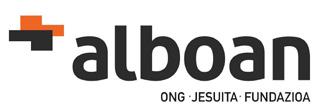Sustainability Report 2024
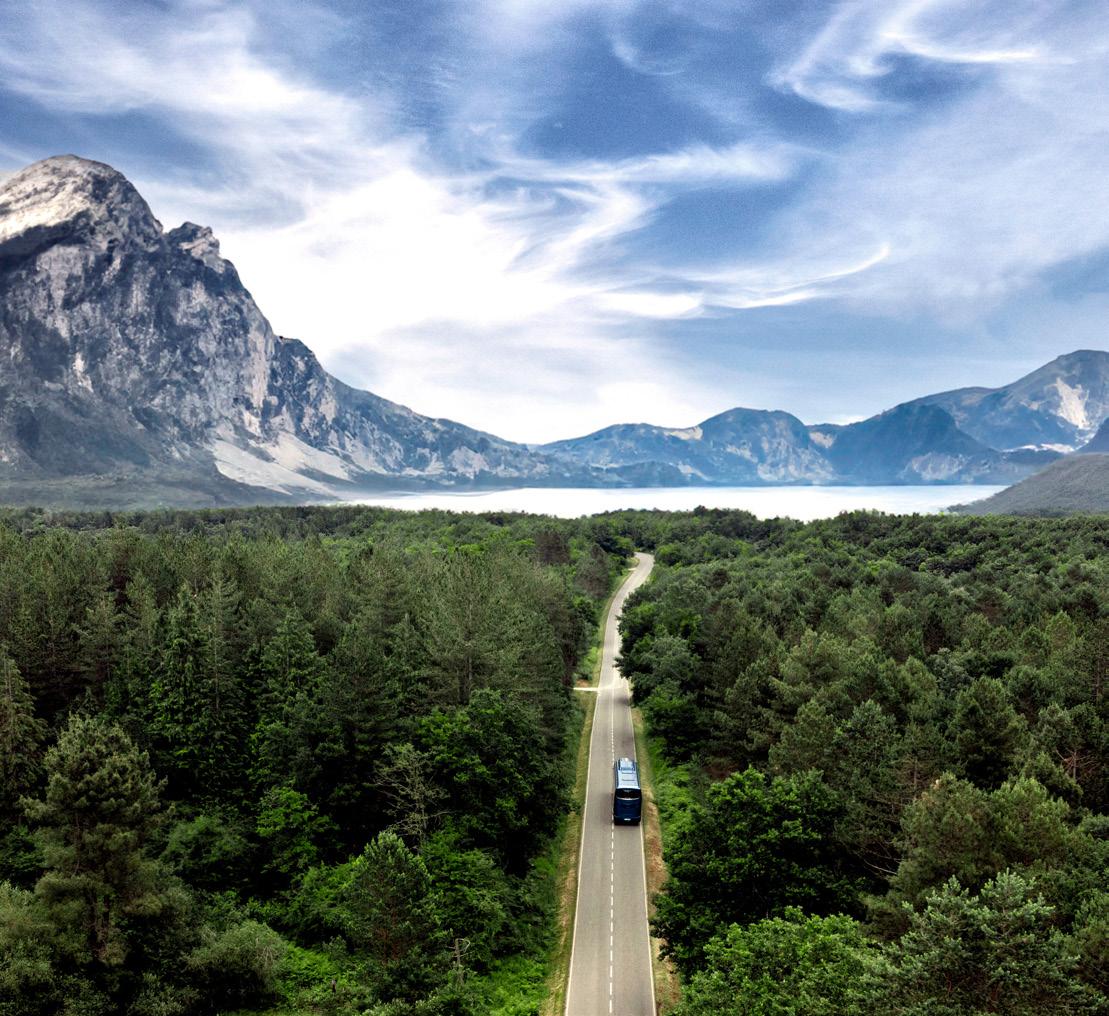

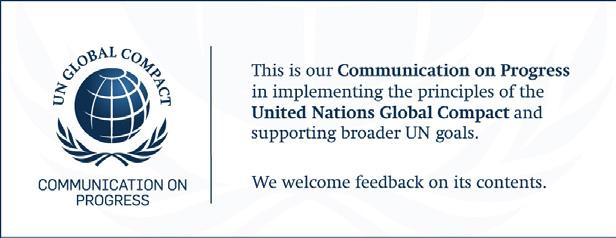
IRIZAR AND SUSTAINABLE COMPETITIVENESS
CUSTOMERS, PASSENGERS, CITIZENS PEOPLE EXTERNAL PARTNERS, SUPPLY CHAIN AND ALLIANCES ENVIRONMENT




IRIZAR AND SUSTAINABLE COMPETITIVENESS
CUSTOMERS, PASSENGERS, CITIZENS PEOPLE EXTERNAL PARTNERS, SUPPLY CHAIN AND ALLIANCES ENVIRONMENT

Imanol Rego CEO of the Irizar Group
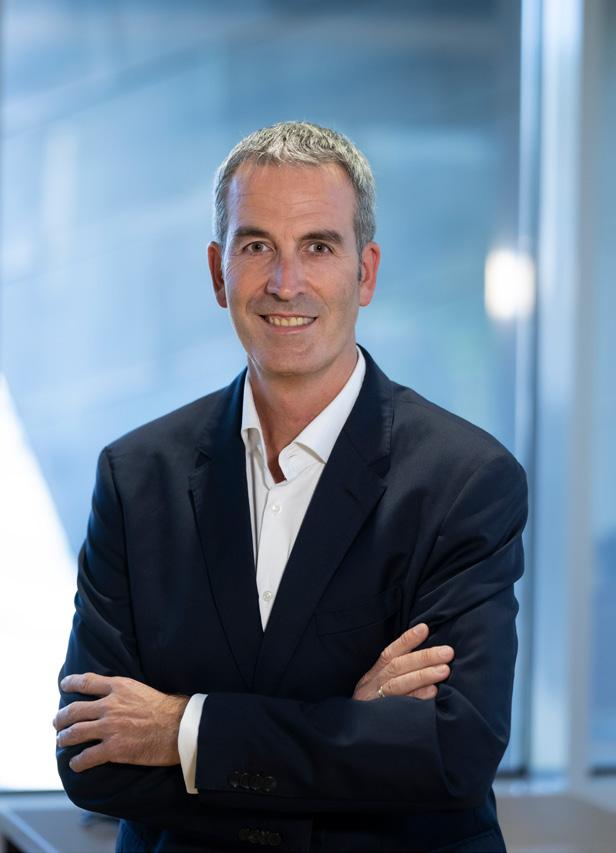
The Irizar Group is a leader in the bus and coach industry with an international presence in the passenger transport, electromobility, electronics, and electric motor and generator sectors, as well as energy and connectivity. All the companies in our Group base our strategy for the future on three main priorities: Brand, Technology and Sustainability. The Group provides technology and innovation for a better life and solutions to the new challenges of the energy transition.
Most of the Irizar Group’s turnover, despite its growing diversification, is fundamentally based on the manufacture and sale of coaches, buses and components. Irizar S. Coop. is the parent company of the Group and the main focus of this sustainability report, which is a space of transparency with our primary initiatives and progress on the activities that have an impact on sustainability to build a better future.
Sustainable Competitiveness, beyond being a global leader in sustainable mobility.
Irizar has a holistic vision of sustainability. Our commitment goes beyond providing solutions with a high technological value to operate collective transport in a more efficient and sustainable way.
Irizar was born in 1889, manufacturing horse-drawn carriages and stagecoaches. In 2024 we celebrated our 135 years, a magnificent indicator of sustainability. Since 1997, our mission has been seeking the satisfaction of all our stakeholders, people, clients, collaborators, society and the environment, to create wealth and employment.
In 2011, we started integrating Sustainable Competitiveness into Irizar because competitiveness is not possible without sustainability, or vice-versa. Our success depends on going beyond economic profitability
and legal compliance, within a company culture based on ethical principles. We direct all our efforts to seeking long-term Sustainable Competitiveness, which involves leadership by everybody to make changes happen, in economic-governance, social and environmental terms. We aspire to be global leaders in Sustainable Competitiveness.
The best evidence of our real commitment to Sustainable Competitiveness is maintaining employment during slumps in sales caused by external factors like the crisis and pandemic. We understand that economic development and job creation are fundamental to our commitment to Sustainability, even in the greatest difficulties.
Since we joined the UN Global Compact in 2013, our business model has been inspired by the major voluntary world leaders in corporate sustainability: The ten principles of the Global Compact (about human rights, labour standards, the environment and anti-corruption), and the Sustainable Development Goals (SDGs) of the 2030 Agenda. Respectively, they both help us focus on HOW to operate in a sustainable way, WHAT to do and WHY.
2024 was a year of growth and consolidation for Grupo Irizar. We attained record figures with 1,076 million Euros in billing and 3,490 people. The economic and business results show strength. They show the hard work and dedication of everybody who is part of Irizar who provide the maximum added value with the right technology, the value of a strong brand, agility and adaptability, personal relationships with clients, collaboration with suppliers and strategic alliances.
We are immersed in a paradigm change in our industry. We have been though a few revolutions. And now we are reinventing ourselves in terms of Sustainable and Intelligent Mobility (urban and medium/long
distance), which is comparable to when, in 1928, we manufactured our first mechanical drive vehicle after making horse-drawn carriages. It is total innovation (it is in our DNA), with a very important goal especially aligned with our high-priority SDGs. We are providing a solution to the new challenges in transport with the continuous launch of new products and technologies.
At Irizar, we work towards decarbonising Mobility in an efficient and sustainable way with our multi-technology and multi-energy range of products.
With the European goals of reducing polluting emissions by 55% in 2030 and to reach net zero emissions in 2050 on the horizon, we want to be part of the solution. Our strategy, with significant investment in R&D, is to reduce the impact of our vehicles, eliminate greenhouse gas emissions and noise emissions, and improve information for users. At the same time, we are improving passenger safety, connectivity, cybersecurity, artificial intelligence, and driverless vehicles. Passenger transport will be free of emissions, but a combination of technologies will coexist for a while longer.
innovating in aerodynamics and weight. The i6s Efficient, launched in 2022, won the Sustainable Bus Award.
• In 2011 we presented the first electric urban bus by the Irizar Group. Since then, Irizar e-mobility has been providing integral electromobility solutions for cities including both vehicles and their main components and systems.
• In 2021, we started mass producing the electric truck that responds to several market needs and makes it possible to drive in urban areas without creating noise or atmospheric pollution.
• In 2023, we returned to the technological vanguard by launching the first hydrogen coach in Europe, which was zero-emissions and designed for long-distance operation. The i6S Efficient Hydrogen won the 2024 Coach of the Year award in Spain.
• Additionally in 2024 we covered the intercity segment with the new Irizar electric vehicles.
sustainability: Economic-governance, social and environmental. To those ends, once again, we reaffirm our firm commitment to those principles and the United Nations SDGs.
In 2022, led by me and the Sustainable Competitiveness manager, Irizar made progress in integrating the sustainability strategy and the 7 high-priority SDGs of the 2030 Agenda, because the management team started participating in establishing and monitoring 24 KPIs, measuring their impact in regards to medium and long-term goals, to create the 2030 Irizar Agenda. They are grouped into 6 IMPACT AREAS: Climate, Resources, Trust and integrity, Equality, Decent work, and Extending sustainable development
We are decarbonising with solutions for the entire life cycle of our vehicles, from development, extracting the raw materials and their production and use, up to the end of their useful lives. We are a key actor in sustainable mobility that provides a multi-technology intelligent and connected range of sustainable Irizar vehicles: electric, hybrid, natural gas, biodiesel and hydrogen. We span all segments of the market from longdistance to urban. We can highlight:
• We are still developing the line of Efficient coaches, reducing consumption and emissions with internal combustion drive, and
In that way, we are paving the way towards a world of mobility that is better for everyone. For the change to happen at the pace we need all of us must work collaboratively to join forces, because the world cannot wait. Irizar will continue leading the changes needed to make it possible. We have no doubt that the future will include collective public transport as a fundamental solution for achieving sustainability, which is the major alternative for substantially reducing emissions. Our hope is to be able to contribute to building a better world and better life, making the Irizar Group an agent of change and finding solutions.
The chance to make a real impact and reinvent ourselves, creating value to help meet the ten principles of the Global Compact (for human rights, labour standards, the environment and anti-corruption), and the Sustainable Development Goals (SDGs) of the 2030 Agenda of the United Nations, is immense in the three dimensions of
We are convinced that our commitment to and activities related to sustainability inspire Trust in all our stakeholders and it creates a competitive advantage. At the same time, it lets us take on the challenges humanity and the planet are facing.
For all those reasons, but also just because it's the right thing to do, at Irizar sustainability is one of our highest priorities. We are excited to be able to contribute our grain of sand to the construction of a better and more sustainable world and a better life (“For a better life”), and to do so in the good company of all our stakeholders and society at large.
Thanks to everyone who is working with Irizar on building a better world!
Imanol Rego, CEO of the Irizar Group

Contributing to the SDGs and goals of the UN 2030 Agenda:


8.1
8.2
8.5
8.7
8.8

9.2
9.4
9.5
9.B.

11.2
11.6



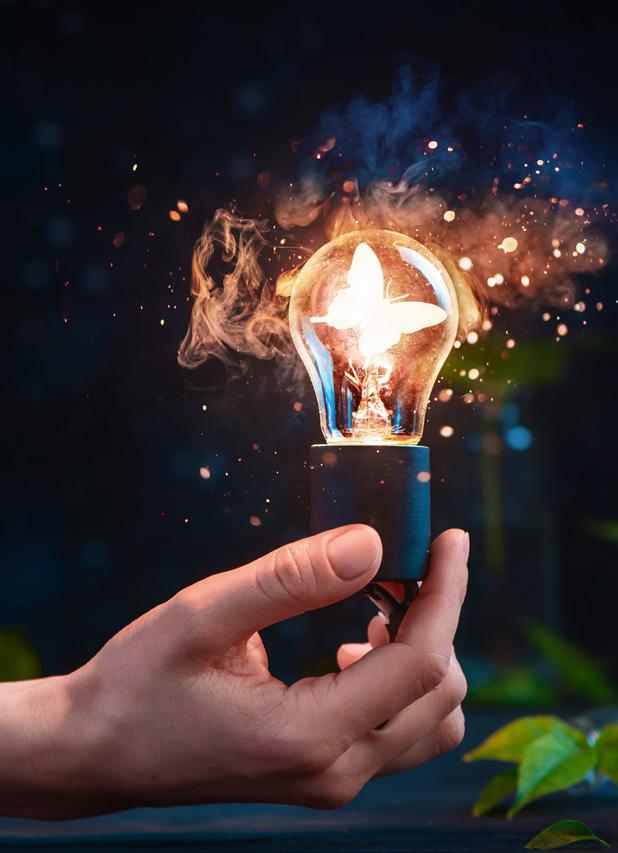

2.1. About us
• Irizar S.Coop. and its business Group
• Strategic Thoughts: Mission, Vision and Commitments
• Brand, Technology and Sustainability
2.2 Our Sustainable Competitiveness
2.2.1. Sustainability as a strategic pillar
2.2.2. Proud of our real commitment to Sustainable Competitiveness
2.2.3. Our global reference frameworks
• The 10 Principles of the United Nations Global Compact
• The United Nations 2030 Agenda and its 17 SDGs
2.2.4. We are a responsible organisation.
• We include Sustainability in our strategy and management
• We are moving Forward in Transparency, Good Governance and Integrity.
• We make strategic alliances and partnerships with the Global Compact to drive Sustainability
• We contribute to raising awareness about Sustainability throughout society.
2.3. Commitment to the Principles of the Global Compact 2.4 Committed to the SDGs of the UN’s 2030 Agenda
2.4.1. Including the SDGs in our 2030 Irizar Agenda.
2.4.2. Relationship between the SDGs and the chapters of this report
Although this Sustainability Report has been produced by Irizar S. Coop., we believe that it is important to have the Group's perspective: to better understand its content, and because there are shared values, strategies and management models.
One Group, six business areas






The Irizar Group is comprised of Six companies brands that have production operations in 11 Centres spread across Spain, Morocco, Brazil, Mexico and South Africa. They also have their own R&D Centre (Creatio) with a long-term focus on the applied research process and the technological development of proprietary products and systems.
evolution of the sales and employment of the Irizar Group from 2005 to 2024.
With 1,076 million Euros in billing in 2024, not only have the bad years from the Covid-19 effect been overcome, we also surpassed the 766 million Euros of 2019 and the 894 million Euros of 2023.
Most of the Irizar Group’s turnover, despite its growing diversification, is fundamentally based on the manufacture and sale of buses, coaches and components.
Irizar, S. Coop (Irizar) is the parent company of the conglomerate and its headquarters are located in Ormaiztegi (Gipuzkoa, Spain) where Creatio, the Group's Research and Development Centre, is also located.
6 leading companies in their sector and 22 companies of their own
11 production centres worldwide
The Irizar Group is a leader in the bus and coach sector with an international presence in the passenger transport, electromobility, electronics, electric motor and generator, connectivity and energy industries.
In section “2.2 “Our Sustainable Competitiveness”, you can see the Founded in 1889
Founded in 1889, today, Irizar is a well-established Group made up of 3490 people (in 2024), with a commercial presence in 90 countries on five continents and with 22 of their own companies. They are geographically and industrially diversified and in constant growth, and they are deeply committed to the brand, technology and sustainability, as well as the brand’s own products, including both electric buses and coaches and the rest of their products in the sectors it operates in.
In 2024, we celebrated our 135th anniversary, which certainly shows we are a sustainable company.


Irizar Brasil
In 1998, Irizar Brasil was created, in the town of Botucatu, with the objective of breaking into the Latin American market. Positioned in the luxury coach segment with the Irizar i6 and i6S models, Irizar Brasil is established as a project with a strong commitment to exports. From Brazil, the Group serves the markets of South America, Central America, Africa, and Oceania.
In 1996, the company Irizar Maghreb was established in Morocco. In 2002, the Irizar Century model was launched, and in 2008, a new plant was opened in Skhirat, with a production capacity of 1,000 coaches per year. In 2013, it began manufacturing buses for Europe.
Following the launch of the Irizar i6 in 2014, and the Irizar i6S in 2017, Irizar Morocco is consolidated as one of the most expansive projects at the international level, being market leader in the luxury coach segment.
Irizar Mexico
Irizar Mexico was founded in the city of Querétaro in 1999. It serves the highend market with the Irizar i5, i6, i6S, and i8 models and is the supplier of choice for the largest road transport and passenger companies. Its market share has grown and now stands at 66%.

Masats
Accessibility systems for public transport vehicles.
Creatio
Irizar Group's Research and Development Centre which was created in order to enhance the Group's applied research and technological development capabilities both for its own-brand products and for the main coachwork components.
Irizar Benelux
Created in 2018, it offers sales and after-sales service for integral electric buses and coaches throughout Benelux.
Irizar Southern Africa
Irizar Southern Africa was created in 2004 in the city of Centurion (Pretoria). The plant serves the markets of South Africa, as well as neighbouring countries such as Namibia, Zimbabwe, Botswana, Zambia, Malawi, and Mozambique, among others. It covers the luxury coach segment with the Irizar i6 and i6S.
Irizar Asia Pacific
Since 2006, Irizar has been present in Oceania, based in Melbourne, offering services to New Zealand and Australia.
Jema USA
Based in California, it offers customised services in the photovoltaic, storage, and advanced services sectors. Additionally, it has
Irizar
Wide range of biodiesel, natural gas (CNG and LNG) hybrid and conventional integral buses and coaches
Irizar e-mobility
Integral electromobility solutions for cities. 100% zero-emissions electric vehicles, charging systems, electric traction, energy management and storage
Alconza
Engines and generators for the marine, hydroelectric and industrial sectors
Jema
Power electronics applied to network and transport quality Power supplies for Big Science Renewable energy, storage and Smart grids Electronics for coaches
Hispacold
Climate control systems for buses, coaches and rail vehicles
items distributed around the US in each of these sectors.
Hispacold Mexico
Founded in 2002, it is dedicated to the manufacture and supply of air conditioning systems for buses and coaches.
Irizar UK
Founded in 2011, it distributes the full range of integral vehicles in the UK market.
Irizar France
Founded in 2011, Irizar Autocars offers sales and after-sales
service to the French market with the full range of Irizar integral, electric, and hybrid vehicles.
Irizar USA
Created in 2016 and based in Las Vegas, it covers the US market with the Irizar i6 model.
Irizar Italia
Created in 1993 and based in Rimini, it provides services and a complete after-sales network throughout Italy.
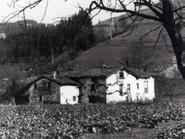
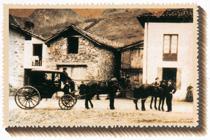



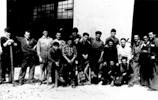



Irizar becomes a coperative

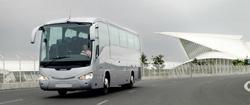
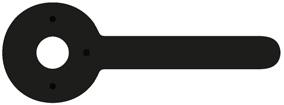
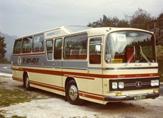
In the 90s, Irizar experienced strong growth and started their internationalisation process. Irizar Mexico, Irizar Brasil, Irizar Maroc, Irizar Asia Pacific and Southern Africa were created

Intense commitment to industrial and technological diversification Jema energy, Datik and Alconza join the group
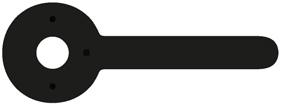

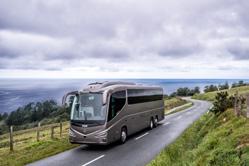
At the height of the crisis, a strategic revolution took place at Irizar and it became an integral coach manufacturer with a sustainable vision.


The full range of Irizar brand integral coaches was launched on the market and the electromobility division for cities was created.



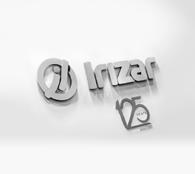
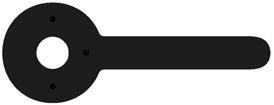




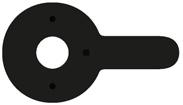

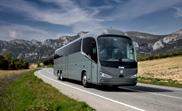

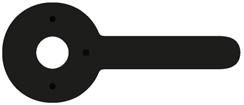

most e cient coach in Irizar’s history Up to 13% reduction in consumption and emissions. Sustainable Bus award Bus of the Year award in Spain


Our Strategic Thoughts are the fundamental principles that guide both the strategic decisions and the organisational culture of the Group. They are revised periodically and defined and shared by everybody in the organisation. In that process, aspects of the economic and social environment, the sector, market and competitors, technological evolutions in transport and digitalisation, as well as the ESG needs and expectations of the internal and external stakeholders are taken into account.
Specific meetings are held for everybody at Irizar to reinforce knowledge of the Strategic Thoughts. Likewise, annual assemblies are held in all the companies of the Irizar Group where the most important issue dealt with is strategy (including Sustainability).
More details of the strategic analysis process and participation of the people at Irizar S. Coop. can be seen in section 4.2.3 ”Participation in management and economic results” in chapter 4, about People.
Our Strategic Thoughts are extensive We are only presenting our mission, vision and commitments here.
Our mission is to continuously strengthen our business project and brand in order to grow and generate wealth and employment in our environment.
It is key to achieve a high degree of customer satisfaction by establishing a close relationship with them and offering them the guarantee of a sound project in which they can trust.
The flexibility to adapt to the needs of our customers by providing them with the products and services they require is a strategic factor that sets us apart from our competitors and enables us to earn their loyalty.
Furthermore, we strive to maximise satisfaction among Irizar Group employees, our external partners, and for society as a whole.
We work and will continue working in Irizar S. Coop.'s cooperative framework and in a framework of communication and participation in the management and results of the other group companies.
Our vision is to provide buses and coaches with a marked difference in safety, reliability, comfort and profitability for our customers, passengers and to society and set the standard in service, design, innovation, technology and Sustainability.
To also be a benchmark in providing value to customers in the group's other businesses.
Every day we strive to achieve a position of leadership that gets passed on in benefit of our customers. We work as a team with personnel who are committed to the customer and to the Group's strategy. We promote efficiency, communication, participation, selfmanagement and managerial excellence.
We create environments where everybody who is part of our projects can give their best according to their talent, abilities and aspirations. This is key to our future success.
It is fundamental to achieve a high degree of customer satisfaction by establishing a close relationship with them and offering them the guarantee of a sound project in which they can trust.
The flexibility to adapt to the needs of our customers by providing them with the products and services they require is a strategic factor that sets us apart from our competitors and enables us to earn their loyalty.
Furthermore, we strive to maximise satisfaction among Irizar Group employees, our external partners, and for society as a whole. We work and will continue working in Irizar S. Coop.'s cooperative framework and in a framework of communication and participation in the management and results of the other group companies.
Brand, Technology, and Sustainability are the three main building blocks on which the Irizar Group's future strategy is based. An inspirational framework that shows us the way to the future and defines our commitment to remain one of the world leaders in the sectors in which we are present.
Although we will deal with it in detail in chapter “3, Customers, Passengers and Citizens“, and “5, External Partners, Supply Chain and Alliances”, we'll briefly summarise what we understand by Brand and Technology.
• Our strategic lines include the development of Irizar brand and technology products and a clear commitment to increasing our technological capacity and industrial diversification.
• We offer customers and society high added value by providing cutting edge products and services created and developed through contributions from the entire group and aimed at the premium segment. We provide turnkey solutions for sustainable, efficient, intelligent, accessible, safe and connected public transport. Design and INNOVATION are part of Irizar's DNA.
• We have become an important leader in coaches and buses and we have established ourself in markets where we are currently present. We continue developing and deploying a wide range of more and more
sustainable products and technological solutions to suit all needs. We have a wide range of solutions that include zero-emissions urban buses and trucks chassis, and hybrid, diesel, biodiesel, HVO Coaches, biofuel and natural gas (CNG and LNG) coaches. It is a wide range of options that spans all segments of the market, including urban buses, medium and long distance suburban coaches for regular and discretionary and premium services in either a wholly Irizar branded version or in a combination of bodywork with chassis available on the market. And it is one we are expanding continuously. We can highlight the electric coach with a hydrogen fuel cell in 2023, and the 100% electric intercity coach in 2024.
• Creatio, the Irizar Group Research and Development Centre, enhances the Group's capacity for applied research and technological development for its products and systems. It combines the synergies and technological capabilities of the Group's companies and is the result of the Irizar Group's key strategy of ongoing commitment to industrial innovation.
• Innovation is one of the hallmarks of our corporate identity. It is part of our culture and extends to management, product, and service levels, as well as Sustainability, technology, and image. We encourage innovation and creativity not only in what we do, but also in how we do it. Accordingly, we are making constant progress as a whole Group and within each organisation that makes it up. We are not only increasingly more agile, flexible, and adaptable but better able to anticipate future challenges while adding value to our brand and stakeholders.

Sustainability will be discussed in depth from here on in the entire report and, apart from being a strategic priority and part of our mission, as we will see, it influences the focus and management of the other two.
With the universal concept of sustainability in mind:
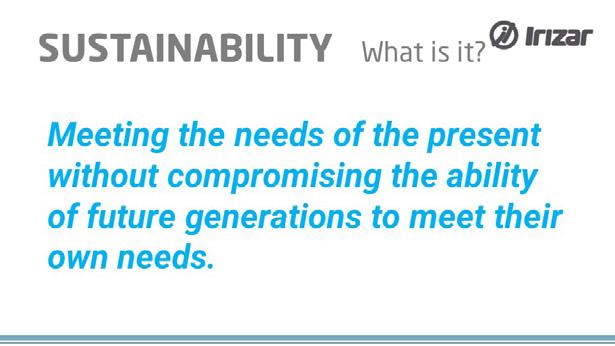
Our starting point is the definition of sustainability for Irizar that we made ours, with the ones used by the European Commission and World Economic Forum as a reference.


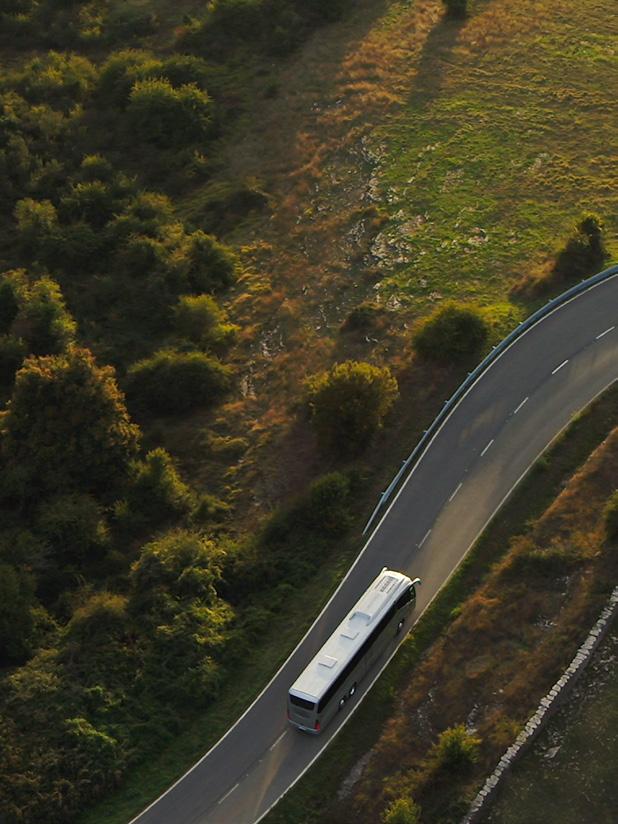
At Irizar we also call Sustainability Sustainable Competitiveness, to make clear our conviction that Competitiveness is not possible without Sustainability, or vice versa. We are convinced that in the long-term companies can no longer choose between profitability or Sustainability, there is no profitability without Sustainability.
For a number of years, Sustainability has been one of the three key priorities of our Group's future strategy, and it drives us forward and commits us to working by contributing to building a better world for everyone All within a culture and business approach of integrity that is governed by Ethical Principles.
To make that happen, as adjunct to the CEO, a new role was created in 2011 to make progress in Sustainable Competitiveness. We are starting to ask ourselves: What is sustainability? Can it help up be more competitive? How can we create value for our stakeholders? What are we doing and what can we do for Sustainability? Almost intuitively, we started with reporting for stakeholders.
(We already knew who our stakeholders were thanks to our preparation to win the European EFQM business excellence award in 2000. Results for: clients, people, society, and keysincluding financial ones)
We strengthened it later using the article “Creating Shared Value”, by Michael E. Porter and Mark R. Kramer (Harvard University). Porter started saying that, “Shared value is not social responsibility, philanthropy or even sustainability, it is a new way of achieving economic success. It’s not at the fringe of what businesses do, but at the heart of it. We believe it could lead to the next major transformation in business thinking.”
For years this commitment has been part of the culture of the people who make up the Irizar Group and of the projects and decisions that are addressed by the different companies of the Irizar Group. Our actions seek to promote it and integrate it into our strategy and operations in all the Group’s production plants and companies internationally.
Sustainability is required as an important competitiveness factor for sustainable growth and an essential competitiveness advantage for the future of Irizar.
Our future success depends on us going beyond the search for economic profitability and compliance with applicable legislation (local, regional, national, foreign, and international laws) and internal standards and regulations. All within a culture and business approach of integrity that is governed by Ethical Principles. We strive to create a true culture of Sustainability (economic-governance, social, and environmental), integrated at the Group level in the daily management of all the organisations that comprise it and in our relationships with all stakeholders (people, customers, passengers, citizens, external partners, the environment, and society in general).
We are convinced that our sustainable behaviour inspires TRUST in both leaders and stakeholders and generates a competitive
advantage, especially in times of change and uncertainty. At the same time, it allows us to address the governance, social and environmental challenges faced by humanity and the planet, at the same we contribute to the economic stability of the market.
In addition to the individual progress and initiatives in Sustainability for each Group company, the focus and long-term trajectory of continuous progress at Irizar S. Coop serves as a reference and facilitates strategic progress in the future at the same time that it motivates the implementation of sustainable actions by the rest of the companies in the Group and between them.


We keep focusing our efforts so Irizar can become a global leader in Sustainable Mobility for urban and medium and long distance transport, which is why we keep integrating sustainability as an indispensable value for the future into our strategic plans. But, beyond being a global leader in sustainable mobility, the Irizar Group has a holistic vision of sustainability Our commitment goes beyond providing solutions with a high technological value to operate collective transport in a more efficient and sustainable way.
As you will see in detail in the chapter about “Clients, Passengers and Citizens”, the main global trends (decarbonisation, urbanisation and digitalisation), have a radical impact on the transportation ecosystem which is being transformed deeply and more quickly than initially expected The concept of sustainable, intelligent, connected, safe and shared mobility is based on 3 key points:
• Decarbonisation: Reducing emissions, electrification, alternative fuels and hydrogen as an energy vector
• Safety – Driverless vehicles and
• Connectivity - Big Data.
We have no doubt that the future will include collective public transport as a fundamental solution for achieving sustainability, which is the major alternative for substantially reducing emissions because:

o A bus can transport as many people as 50 cars.
o Buses are the most used form of public transport in the world and the one with greatest capillarity
o It has been shown that cars are only used 5% of the time and that must be optimised.
o According to a study by the IDAE (Institute for Energy Diversification and Savings) and the emissions of our vehicles, the comparison of the carbon footprint between buses and coaches and other means of transport is very advantageous (g CO 2 per km passenger transported). (*)
(*) For electric modes the CO2 emissions associated with generating the electricity consumed during use are taken into account, even though at the point of use no polluting emissions or CO2 are generated.
In addition, they have a significantly lower acoustic impact than their thermal equivalents.
Because of that, at Irizar we do not rule out the fleet of buses and coaches in Europe increasing by 2050, with the largest increase in the urban and intercity segment.
Since we started building horse drawn carriages in 1889 we have seen several revolutions We are now reinventing ourselves in terms of Sustainable and Intelligent Mobility which is comparable to when in 1928 we manufactured our first mechanically powered vehicle. It is not exactly an incremental improvement. It is INTEGRAL INNOVATION with a very important goal especially aligned with 4 of our high priority SDGs:



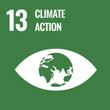
We are facing a paradigm shift in mobility that reinforces our commitment to INNOVATION, which is part of the DNA of the Group and focus is put on SUSTAINABILITY from an integral point of view.
Innovation is the only path for contributing to society with mobility products and solutions that can improve our lives (“For a better Life”)
Lowering the impact of our vehicles, eliminating GHG (greenhouse gas) emissions and noise pollution, improving information for our users, and improving passenger safety are our priorities. We believe that is the foundation upon which we can build all our sustainability activities that society today demands of us. And that is where we want to be. We are continuing to innovate, because innovation is in our DNA, and we stay close to our customers, adapting to their new circumstances. Accordingly, we are focusing on the entire life cycle of our vehicles: from their development, starting with extracting the raw materials, to production and use, up to the end of their life.
Along these lines, we are continuing to collaborate with our stakeholders in the generation of shared and sustainable long-term value, by including the three dimensions of Sustainability into our company culture: Economic-governance, social and environmental:
• Customers, passengers, citizens
• People (workers and cooperative members)
• External partners, Supply Chain and Alliances
• The Environment
• Society in general
It is a process aimed at including your concerns into our strategy and operations: social, environmental and ethical in regards to human rights (in every link of our supply chain), in order to:
• Maximize the creation of shared value for all the aforementioned stakeholders;
• identify, prevent and mitigate their possible adverse consequences and risks.

We know Sustainability is the strongest force for change in our generation. It is the future, not just for the well-being of Humanity and the Planet, but also for the economic stability of the market. Our success depends on going far beyond seeking economic profitability, complying with applicable laws (local, autonomous community, national, foreign and international laws) and internal regulations. All within a culture and business approach of integrity that is governed by Ethical Principles.
• Our firm commitment to Sustainability is led by the CEO, with the goal of making progress towards more sustainable business models that are driven or advanced by the Sustainable Competitiveness manager Furthermore, we understand that Sustainability management should not wait. We must make progress to achieve it in a very important way, not secondarily, and it must be led by the rest of the members of the Management Team to expand throughout the global management of the company into all the departments, areas and people involved. It means not just showing leadership inside the company but extending it to the value chain and, to the extent possible, throughout the industry and the entire organisational ecosystem.
The path to sustainability involves leadership by everybody in the Irizar Group to make transformations happen, not just limited to environmental issues but that also include transformations in economic, governance and social issues. Irizar’s commitment is to work along the lines: economic, social and environmental. And that involves a change of mentality throughout the whole organisation.
We are convinced that our sustainable action inspires confidence in both leaders and stakeholders and generates a competitive advantage in times of change and uncertainty and, at the same time, allows us to address the economic, social and environmental challenges faced by Humanity and the Planet.
In the following chapters (from 3 to 7) we'll see in detail how we generate value for each one of our stakeholders.
2.2.2.
Proud of our real commitment to Sustainable
We are convinced that to work for sustainable mobility, we have to do it while ensuring a fair transition. For us, that means jointly and coherently taking on the three dimensions of sustainable development (environmental, social and economic-governance), with a focus on people and human rights in everything we do to tackle climate change, digitalisation, economic crises, pandemics, and other external global challenges that arise.
We are proud of how we have tackled the challenges brought about by the 2010 economic crisis and the Covid-19 pandemic, among other things, thanks to the hard work and commitment of everybody who is part of the Irizar Group. Our goal is to keep being an attractive Group
for talent by creating high quality jobs with a company culture and behaviour that has integrity and is guided by Ethical Principles.

We understand that economic development and job creation are fundamental to our commitment to Sustainability, even amidst the greatest difficulties. The following graph is the best evidence of our real commitment to Sustainable Competitiveness (economic/ governance, social and environmental) and reflects consistency with our mission. It shows the coherence with our mission and our commitment to make a positive impact on the 2030 Agenda (especially on SDG 8 – Decent work and economic growth). Without a doubt, it is one of the best indicators of our Sustainability.
Despite the crisis and drop in sales of the Irizar Group in 2010 we maintained employment. And in 2020 and 2021, despite the severe impact of Covid-19 on our business, the decrease in employment was not very significant. We used the opportunity to reinforce communication and training so we could keep preparing for new future challenges. Fortunately, in 2023 we reached a record level of billing and employment. And in 2024 we are still surpassing it.
The transportation industry went through significant changes and faced significant challenges with the Covid-19 pandemic, because it caused a decrease in bus and coach manufacturing that affected us deeply. The economic recovery after the pandemic and the return to normality in the public transport sector made it possible for us to reach record levels of business in the Group.
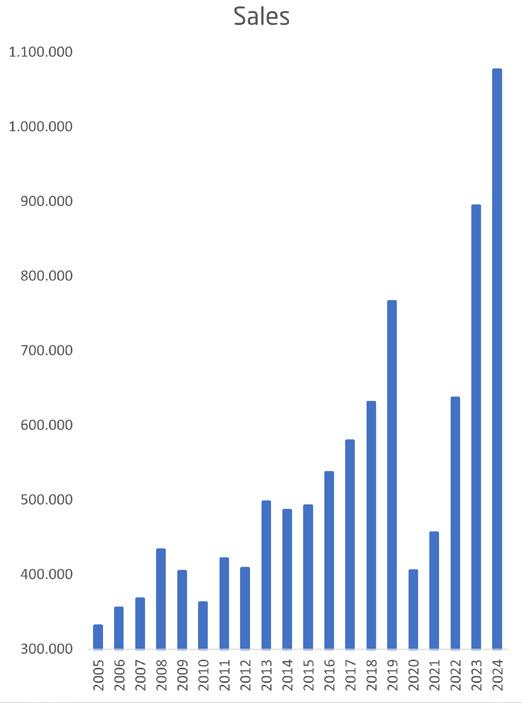
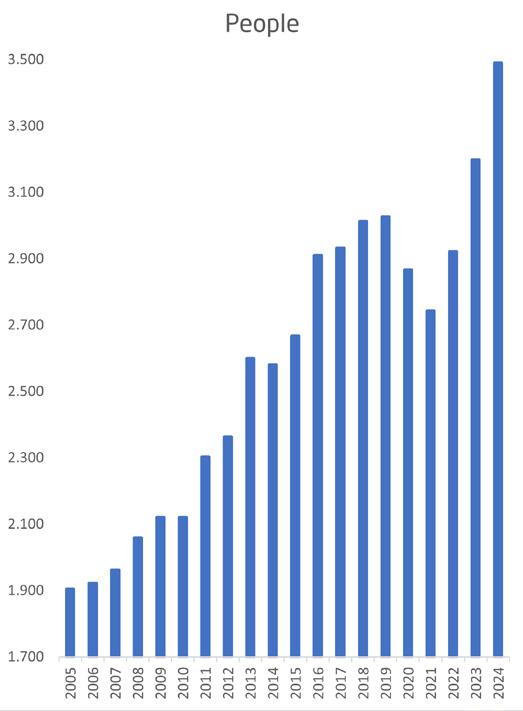
In this scenario, at Irizar we keep reinforcing three strategic lines for the future: Brand, Technology and Sustainability. In addition, it was a year of opportunities and progress in strategic positioning where we have kept reaffirming our focus on Sustainable Mobility as the guide for our future growth.
Our “For a better Life” purpose is still inspirational, and it shows the spirit of those of us who make up the Irizar Group.
Our sustainable business model is inspired by ETHICS and the greatest voluntary guidelines for corporate sustainability in the world: the 10 principles of the United Nations Global Compact and the 17 Sustainable Development Goals (SDGs) of the United Nations 2030 Agenda. Respectively, they both help us focus on HOW to operate in a sustainable way, WHAT to do and WHY.
The United Nations Global Compact promotes implementing 10 universally accepted principles in the areas of human rights, labour standards, the environment and the fight against corruption in the business activities and strategies of organisations. With more than 20,000 participants in more than 160 developed and developing countries that represent almost every sector and size.
At Irizar S. Coop. we have been adherents of the United Nations Global Compact since 2013 . Consequently, every year we draft a Sustainability Report where we renew our firm commitment to make progress in implementing the 10 Principles and contributing to the Sustainable Development Goals, at the same time we state the main initiatives and progress in the activities we have been doing with our stakeholders.
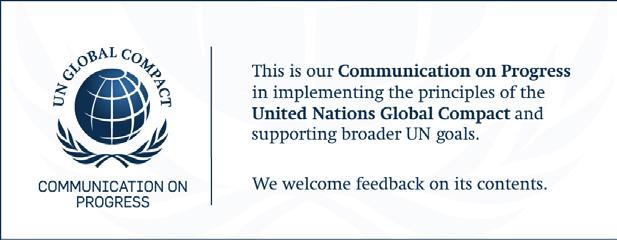
This report shows our transparency and we publish it in different internal and external media and in several languages at:
• Our website: https://www.irizar.com/en/sustainability and
• The United Nations website: https://unglobalcompact.org/what-isgc/participants/19510-IRIZAR-S-COOP-
The 10 Principles of the United Nations
The 10 Principles of the Global Compact are the essential values since the birth of this United Nations initiative in 2000. Basing businesses on those principles means more than mere standards compliance.

These 10 Principles are the reference framework for HOW to make progress in acting responsibly. They undoubtedly mark the way for us to manage risks better and avoid any negative impacts in the four main focus areas, with the aim of ensuring that our operations are conducted in a way that benefits both economies and societies worldwide.
• In section “2.3 Committed to the Principles of the Global Compact” we provide a table showing the chapters / sections of this Sustainability Report with the areas and
• in section “2.4.1. Including the SDGs into our 2030 Irizar Agenda”, we show the block of principles it is related with for each KPI.
The 10 Principles of the Global Compact are based on several Declarations by the United Nations and they have universal approval. They are articulated in four main areas:
• Human Rights: Principles 1 and 2 They are derived from the Universal Declaration of Human Rights
• Labour Standards: Principles 3, 4, 5 and 6 are inspired by the ILO's Declaration on Fundamental Principles and Rights at Work.
• The Environment Principles 7, 8 and 9 are based on the Rio Declaration on Environment and Development.
• Anti-Corruption: Principle 10, the last to be incorporated, is based on the United Nations Convention Against Corruption
In 2015, the Member States of the United Nations General Assembly approved the 2030 Agenda on Sustainable Development, consisting of 17 Sustainable Development Goals (SDGs) and different targets, to “eradicate poverty, protect the planet and ensure prosperity”. It encompasses all three dimensions of Sustainability: economic/ governance, social and environmental. Its goal is to make the world a more sustainable and prosperous place. The United Nations assigns a leading role to companies in its implementation. A new way to improve everyone's life, without leaving anyone behind.
Five years later, the UN, in its Annual Report on the status of the SDGs, confirmed that progress had been made, but not fast enough to meet the targets on time. Covid-19 increased inequalities in the world and made the need to apply the 2030 Agenda to make a sustainable and inclusive recovery possible even more patent.

• PEOPLE: End poverty and hunger in all their forms and guarantee dignity and equality.
• PEACE: Promote peace, justice and inclusive societies.
• ALLIANCES: Implement the Agenda trough a strong global partership.
• PLANET: Protect our planet's natural resources and the climate for future generations.
For more information about the 10 principles see: https://www.unglobalcompact.org/what-is-gc/mission/principles
Although reflecting our commitment to the 10 Principles is the main objective of this sustainability report, also:
In the coming years the goals will stimulate action in five spheres that are critically important for Humanity and the Planet.
• PROSPERITY: Ensure prosperous and satisfiying lives in harmony with nature.
The 2030 Agenda 2030 involves 17 Sustainable Development Goals and 169 targets to be met in 2030. The SDGs focus on us creating positive impacts, contributing to sustainable development and finding business opportunities.
Now is the time we need to move from economic value to shared value and align the success of the company with the success of the community. It's not philanthropy, but rather business intelligence because there won't be prosperous businesses without prosperous environments. That spirit of shared value is, in fact, what the 2030 Agenda (the United Nations plan for humanity) propagates. The UN gives companies a leading role in sustainable development because they believe that, as motors of the economy, companies have their hands on the lever to bring about systemic change through rethinking products and services or reorienting business, among other things. The 2030 Agenda is currently the framework for business Sustainability. We can be sure that when it goes out of force in seven years sustainable management that gives business benefits will continue, because it is perfectly projectable into the future.
The SDGs are the reference framework for WHAT to do (roadmap) and WHY we do it. They make us to think that doing what we are already doing is not enough, rather we need to also change HOW we do things. We need to transform, not just rebuild what was not working.
Further information on the SDGs: https://sdgs.un.org/goals
Our progress in our commitment to the SDGs is set out in Section “2.4 Committed to the SDGs of the UN 2030 Agenda”. In addition, the SDGs
and goals related with the content are specified at the beginning of every chapter about an interest group, as well as the KPIs for measuring
our impact and contribution to the 2030 Agenda and Principles of the Global Compact.

We are a responsible organization
Sustainability strategy and performance include corporate responsibility (which affects everyone and everything), and responsibility with each stakeholder (which is included in detail in the rest of the chapters of this Report).
We include Sustainability in our strategy and management
ETHICS is the basis of Sustainability. It will be possible if our business culture is guided by shared ethical principles: Principles that emanate from our group Mission, Vision and Commitments and that are present in decision making and that are the backbone of making our Sustainable Competitiveness possible.
• Sustainability is present in strategic decision-making and day-today management in line with the 10 Principles of the Global Compact (see the previous and following sections and the rest of the chapters).
• In 2018, we began our approach to the United Nations 2030 Agenda and recognized the timeliness of the Sustainable Development Goals (SDGs).
• Since 2020 we have been making progress in including them in our strategy and operations to contribute to achieving the SDGs as a roadmap to drive prosperity for People and the Planet. We have set priorities and are starting to work on 7 SDGs and 26 targets that have a high impact on our business activities and extensive value chain.
You can see more details about our commitment to the SDGs in section 2.4 and at the beginning of all the following chapters.
• At the annual assemblies, where everybody at Irizar S. Coop. participates, sustainability is always addressed within the global strategy and progress of the company (its dynamics can be seen in detail in chapter 4 about people). For example:
o Sustainability is an essential key competitiveness factor of the Irizar Group.
o In 2020 the new version of the Code of Ethics was presented for approval by all the members.
o Our high priority and very important SDGs from the 2030 Agenda were presented in 2020.
o From 2020 to 2024 sustainability was set forth as the axis around which the rest of Irizar’s strategies would revolve, especially for Sustainable Mobility.
• We continue to make clear progress in training and raising the awareness of people about sustainability. In 2021 and 2023, we can highlight training in Sustainability and SDGs/2030 Agenda for the management team and president of the Governing Council given by the Sustainable Competitiveness Manager. The involvement and leadership of the Management Team is fundamental for making progress towards putting sustainability in practice in a very important way, not just secondarily. Training in it will subsequently be promoted and it will also be spread to leaders and the rest of the people in the organisation. The commitment is important for achieving the goals set for the future.
• As we explain later in the chapter about “4. We create value for our people”, we do in depth reviews of the Strategic Thoughts every
three or four years where DAFO analyses are done taking into account economic-governance, social and environmental issues. That is done to set priorities and define actions with the goal of making the strategy be aligned with the expectations of all the stakeholders and thus guarantee their needs, sustainable growth for the company and creating value, wealth and employment, as our mission states.
The Irizar Group is exposed to risks that are directly related to the productive or commercial activities of its divisions or that result from external influences. These are risks that may prevent the Group, or any of its business areas, from achieving its objectives. Sometimes risks become opportunities, which must also be identified and put to use. Therefore, in the Irizar Group and all its business areas, risk and opportunity analysis is immersed in the culture, strategy, and management of each of the teams and processes. It is automatically integrated into strategic plans and decision-making to prevent illegal practices or those outside our framework of ethical action.
• We remain committed to dialogue with all of our stakeholders. It helps us to listen to their concerns and needs and identify future trends to build trust and therefore increasingly consolidate our relationship with them. At the same time, it is an ideal way of transparently showing and exchanging our assessments and our fields of action as well as the challenges we face in our management of sustainable growth. The debates are held in periodic meetings and using various channels of communication.
Our stakeholders include: worker cooperative members, clients/ passengers/citizens, suppliers/external collaborators, the environment and institutions and society as a whole.
• Priorities for Sustainability: We evaluate our ESG priorities periodically depending on their importance for our business and stakeholders and how they impact on the business model and the opposite. In short, we determine our priorities using a materiality analysis (done using various sources of information), to ensure that our sustainable strategy is aligned with the expectations and to facilitate a greater impact on all of them.
• The results of the sustainability priorities for 2021 to 2024 were examined in detail for this Report.
Our Prioritising Procedures:
o Analysis: We review the latest opinions about Sustainability issues for frameworks and good practices for (fundamentally the United Nations Global Compact), relevant non-gubernatorial organisations, industry bodies and academia. We analyse requests from our clients regarding Sustainability and new priorities. For example, as part of proposals or supplier compliance reviews.
o Benchmarking: We learn from other organisations through get togethers where we exchange experiences as well as through consulting information about recent and emerging ESG questions among our peers, competitors and other international organisations.
o External Consultations: We gather opinions from the primary stakeholders, including ecosystem partners, NGOs, academics, etc. about the proposed sustainability priorities and to be able to classify them in terms of importance.
o Internal Consultations: In a process led by the CEO and facilitated by the Sustainable Competitiveness Manager, we work
directly with the management team (and other relevant people and teams) to identify potential changes in our ESG priorities. A process of listening to people at Irizar was done between 2020 and 21 to understand what they were most concerned about. It was done using interviews and questionnaires as described in chapter “4 We create value for our people”.
Most of our Sustainability priorities are interrelated with each other and have continuity over time. We are showing our Sustainability Priorities for 2024 here.

0 GLOBAL GOVERNANCE (Transparency, Good Governance and Integrity)
1 TRANSPARENCY Sustainability Report + NEW GC Progress report (COP)
2 Awareness raising + TRAINING in Sustainability
3 KPIs – Leadership/management team commitment and monitoring for progress
4 Keep reinventing ourselves to achieve Sustainable and Intelligent MOBILITY
5 INTEGRITY: Companies and HUMAN RIGHTS Managing the most serious risks for people
6 INTEGRITY: Improve the culture of ETHICS AND COMPLIANCE
7 INTEGRITY: Improve the GENDER EQUALITY plan and harassment protocol
8 INTEGRITY: Make progress with the RESPONSIBLE SUPPLY CHAIN with suppliers and other external parties involved
• In December 2022 we decided to drive our progress in human rights forward to prepare ourselves for the future European sustainability due diligence directive for companies to respect human rights and the environment in global supply chains. To those ends, and with backing from top management, People Management and the Sustainable Competitiveness manager at Irizar, we participated in the Business & Human Rights Accelerator programme of the United Nations Global Compact that is designed to give companies the tools and knowledge they need to create a continuous due diligence process for human rights and make sure they are respected. That training facilitates our progress with our commitment to and practices regarding human rights, to prevent risks and avoid injury to People.


Since October 2023, the Spanish UN Global Compact has given us the opportunity to belong to a continuos learning group about human rights Since then, in addition to learning with experts and getting support materials, we can share experiences, knowledge and challenges with 45 other companies that are already working hard on human rights. Without a doubt, it will contribute to make progress more easily in integrating our commitment regarding human rights into our value chain, both in the strategy and in operations, to prevent risks and avoid injuries to people.
At the end of 2023 we included the following in our sustainability priorities: HUMAN RIGHTS - Managing the most serious risks for people As the first thing to put it into action, we agreed on the first draft of the Human Rights Policy for the Group which was agreed
upon by the president, People Management and the Sustainable Competitiveness Manager. In 2023, we shared it with the CEO of the Irizar Group to improve it and keep making progress with the next steps in 2024. Because of the turnover of the Governing Council in 2024, the implementation of the Group’s Human Rights Policy will start again in 2025.
In collaboration with the other corporate governance bodies, the top management keeps providing encouragement and being vigilant so the commitment and sustainable actions, beyond people who work at Irizar, are extended among the rest of the stakeholders (clients, suppliers, external collaborators, government, etc.).
We are making progress with transparency, good governance and integrity. Therefore, we rely on our open culture and our firm conviction that only business activities that respect corporate ethics and sustainability constitute the only possible foundation for achieving sustained business success beyond compliance with internal regulations and applicable legislation (local, regional, national, foreign, and international).
Throughout this chapter, we address in particular our common tools to facilitate our Good Governance.
• Along those lines. a first draft of the Code of Ethics was created in 2017. The improved version of our code of ethics, created by the Governing Council alongside the Management Team, was approved by all the worker-members in a General Assembly in 2020. The
new code of ethics was a new version of our Ethical Principles and guidelines for behaviour. It is the roadmap for everyday behaviour based on fundamental principles (Human Rights, Labour Standards, the Environment and the fight against Corruption).
In parallel, the Ethics and Compliance Committee was created to analyse all the communications they receive in a reasonable period of time.
• In 2024 we started the improvement of the ethics and compliance system Irizar(common cooperative values, code of ethics, crime prevention system, channels of communication, channels for reporting infractions, communicating incidents and actions), and the system for protecting personal data and guaranteeing digital rights The goal is to observe the evolution of patterns of sustainability, legal modifications or new risks that were not previously considered.
In summary the CODE OF CONDUCT includes:
1 INTRODUCTION
2
Compliance with the United Nations Global Compact
3.4.- Promote the image and reputation of IRIZAR
4 PEOPLE
4.1.- Equal opportunities and non-discrimination
4.2.- Prohibition of forced and arduous labour
4.3.- Prohibition of human trafficking and protecting foreign people
4.4.- Prohibition of child labour and protecting minors
5 HEALTH AND SAFETY AT WORK
6 INFORMATION MANAGEMENT
6.1.- Protecting privacy. Use of personal data
6.2.- Handling and protecting confidential information
6.3.- Protecting computer security and the prohibition of downloading illegal content
7 RELATIONSHIPS WITH THIRD-PARTIES
7.1.- Truthfulness and accuracy about IRIZAR’s financial situation
7.2.- Protecting free competition for the market and consumers
7.3.- Cooperation and transparency with the public administration
7.4.- Relationships along the value chain
8 ANTI-CORRUPTION POLICY
8.1.- Preventing public and private corruption
8.2.- Preventing money laundering and terrorist financing
8.3.- Imports and exports Prohibition of contraband
9 ENVIRONMENT
10 PROTECTION AND USE OF RESOURCES
11 APPLICATION OF THE CODE. COMMUNICATIONS AND MONITORING
11.1.- Entry into force
11.2.- Interpretation of the code of conduct
11.3.- Compliance Committee
11.4.- Non-compliance and notifying the internal information system
11.5.- Confidentiality of communications and prohibition of retaliation
11.6.- Processing communications
It is complemented by a crime prevention programme that includes a detailed analysis of all the legal risks that could hypothetically arise in the various business areas and companies that make up Irizar, and consequently, the possible non-compliances that could occur.
Its primary goal is to adopt as many measures as necessary to achieve regulatory compliance in all areas of activity.
In accordance with Irizar’s ethical guidelines and general code of conduct, one of the enforceable mechanisms also to prevent criminal liability for the legal person is the Ethics and Compliance Committee of the crime prevention policies and procedures, which is the body of Irizar, with independent powers of monitoring and control, whose task is supervision and operations. The Ethic and Compliance Committee reports their activities to the Governing Council in order to ensure compliance with the law and corporate regulations while carrying out their duties.
In addition to what can be foreseen in the codes, internal regulations and procedures established by Irizar, any doubt, suspicion of irregularity, reporting of a crime or evidence of one, must be reported to the Ethics and Compliance Committee. The reports will be, in every case, handled with strict confidentiality and anonymity, if the notifier so wishes.
Likewise, in aspects that may affect employees, like situations of discrimination, harassment, mobbing or occupational safety, among others, specific channels will be created for notification and handling any inappropriate behaviour that may occur in those areas.
The Ethics and Compliance Committee will analyse all the notifications they receive in a reasonable period of time. In the event they believe that a notification deserves closer attention, the committee will send the documentation to the relevant department so an assessment of the facts and determination of the measures to adopt can be done jointly.
The Irizar Code of Ethics is periodically reviewed and modified whenever legal modifications or new previously unforeseen risks arise.
Any improvement to the corporate and ethical values will be common for all the people in the companies of the Group.
• In section “4.5.1 Gender Equality”, in chapter 4 About People, you can see details about the improved equality Plan and in the sexual and the gender based harassment in the workplace Protocol.
Transparency contributes to improving our credibility, reputation and brand, which increases the confidence our stakeholders have in us. To those ends, we're making public all the information you need to know more about Irizar.
As we will see in the following chapters, we have multiple channels of communication with stakeholders, including our Sustainability Reports discussed in the following section.
We make strategic alliances and partnerships with the Global Compact to drive Sustainability
In addition to all the agreements and alliances that we will address in subsequent chapters of the Sustainability Report, we can highlight our double link with the United Nations Global Compact, around the world and in Spain.

At Irizar S.Coop, since 2013 we have been firmly committed to the United Nations Global Compact, the largest voluntary initiative for Corporate Sustainability in the world. We use it as a frame of reference for all our strategic advancement in sustainability and it strengthens our deep commitment to transparency through our annual Sustainability report and Communication on Progress (COP).
Since 2018, we have been partners of the Global Compact Network Spain (multi-stakeholder association that acts as a focal point for the United Nations Global Compact in Spain). Proactive participation enables us to show a greater commitment to Sustainability, interact with the main agents of change (not only at the Spanish level but also internationally), generate shared values between the company and its environment, learn and share best practices, and strengthen relationships with stakeholders.
.A Annual Sustainability Report and Communication on Progress (COP).
The Communication on Progress (COP) is an obligatory annual public statement by companies that participate in the UN Global Compact for their stakeholders. It has the following goals:
• Promote accountability for company Sustainability performance to help maintain the integrity of the UN Global Compact initiative
• Promote continuous learning and contribute to boosting performance in company Sustainability
• Improve stakeholder access to information about the implementation of the ten principles by participating companies and their contribution to achieving the Sustainable Development Goals (SDGs)
Until 2022 our sustainability report was the COP we presented to the Global Compact.
Since 2023, we have voluntarily been part of the new Communication on progress (COP) policy with updates added in 2022 in consonance with the mission of the United Nations Global Compact to “create a global movement of sustainable companies and organisations to create the world we want”, to show the progress made on their new online platform, to make detecting breaches easier and create goals for improving performance in terms of Sustainability every year-
The improved Communication on Progress requires us to present the following online (on the United Nations Global Compact website):
a. a statement by the general director that expresses continuous support for the United Nations Global Compact and b. filling out an online Questionnaire about the companies’ activities related with the ten principles and the SDGs.
c. In addition to those requirements, our 2022, 2023 and 2024 COP reports also include our 2022, 2023 and 2024 Sustainability Reports.
All of that is accessible at: https://unglobalcompact.org/what-is-gc/ participants/19510-IRIZAR-S-COOP-
The standardised questionnaire shows the progress made in the areas of governance, human rights, labour standards, the environment and the fight against corruption. It increases our transparency and we hope it lets the participating companies:
• Build credibility and brand value by showing our commitment to business sustainability, the ten Principles and the SDGs;
• Measure and show our progress in a coherent and harmonised way:
• Receive information, learn and continuously improve performance;
• Compare the progress of equivalent companies through access to one of the biggest free public sources of data about business Sustainability in the world.
B. Irizar interacts with other organisations and actors (Spanish and international).
As a member of the Spanish Global Compact Network, Irizar S. Coop. interacts with other organisations and actors (Spanish and international), for the purpose of creating shared value and strengthening relationships with stakeholders. They participate in various activities, like training sessions, work sessions organised by the Global Compact and the
Spanish government, open-doors days at Irizar to share experiences with companies, education centres and universities and SDG benchmarking to learn from other companies, among other things.
• For 2018, we can highlight our participation in a work session organised by the Spanish Global Compact Network and the Spanish government with the goal of:
a. Articulating and elevating the experience of the business sector insofar as the future action plan and national strategy for contributing to the 2030 Agenda and the sustainability of the Spanish government.
b. Specify the role of companies in sustainable development and help the Spanish government prepare its evaluation as a country for the high level policy forum of the ECOSOC held in July at the United Nations.
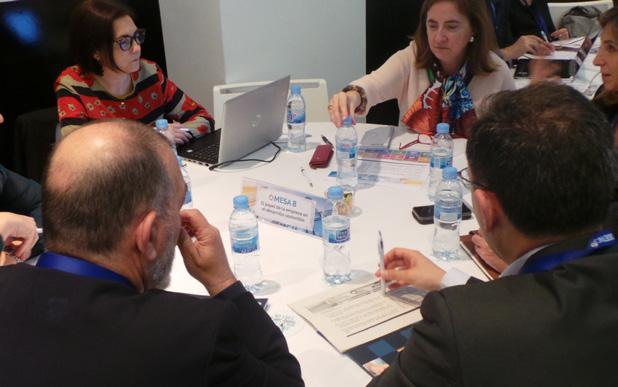
• In 2019, we celebrated 15 years of leadership in sustainability with the Spanish Global Compact Network, as it is the local network with the most signatories to the UN Global Compact and is a world benchmark, which is notable for its operability and strength. An event was held where we can highlight the participation of Cristina Gallach, High Commissioner for the 2030 Agenda of the Spanish government, with whom Irizar had the privilege of exchanging opinions about the 2030 Agenda and the need for alliances between the public and private sectors in order to achieve the SDGs.
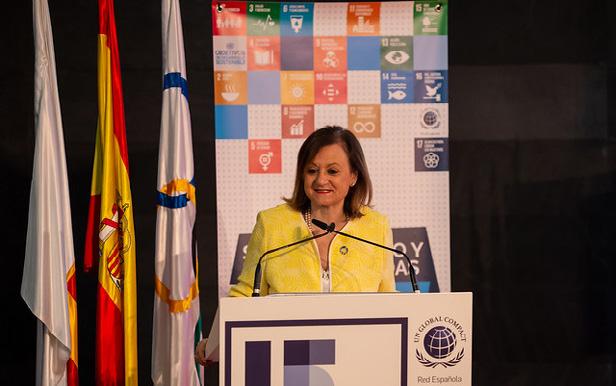
• For six months in 2021 we participated in the SDG Ambition accelerator programme from the United Nations Global Compact. It was a training programme to help us set ambitious SDG (sustainable development goal) goals and integrate them into our organisation. You can see more details in section “2.4. Committed to the SDGs of the UN 2030 Agenda”.
• As we discussed in detail above, from January to September 2023 representatives from Irizar participated in the Business & Human Rights Accelerator programme of the United Nations Global Compact.
Since October 2023, the Spanish UN Global Compact has given us the opportunity to belong to a continuos Learning Group about Human Rights In addition to learning with experts and getting support materials, we can share experiences, knowledge and challenges with 45 other companies that are already working hard on human rights. Without a doubt, it will contribute to make progress more easily in integrating our commitment regarding human rights into our value chain, both in the strategy and in operations, to prevent risks and avoid injuries to people.
C. Irizar collaborates with United Nations publications and declarations.
• In 2020, the CEO of the Irizar Group (along with 1000 business leaders from more than 100 countries) made their support for the United Nations and multilateralism visible and even signed an ambitious “declaration in favour of renewed global cooperation” as part of the commemoration of the 75th anniversary of the UN. The declaration maintains its relevance given the state of the world in 2021. The updated list of signatories is on the United Nations website. https://ungc-communications-assets.s3.amazonaws.com/ docs/publications/UN75_UnitingBusinessStatement.pdf

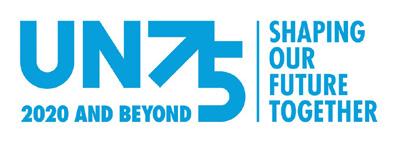
The 75th anniversary of the United Nations comes at a time of unprecedented disruption and global transformation, serving as a stark reminder that international cooperation must be mobilized across borders, sectors and generations to adapt to changing circumstances. This message emerged loud and clear from the hundreds of thousands of people who participated in global dialogues initiated by the UN this year.
In the face of the COVID-19 pandemic and converging crises — including climate change, economic uncertainty, social inequality and rising disinformation — public and private institutions need to show they are accountable, ethical, inclusive and transparent. This is the only way to strengthen public trust and achieve a more sustainable future for all.
Over time, the UN has sought to unite stakeholders everywhere to tackle the world’s greatest challenges. Yet our multilateral system is being threatened by those who want to go it alone rather than work together.
We, the business peoples, recognize that peace, justice and strong institutions are beneficial to the long-term viability of our organizations and are foundational for upholding the Ten Principles of the UN Global Compact and achieving the Sustainable Development Goals (SDGs).
In the spirit of renewed global cooperation, we commit to:
▪ Demonstrate ethical leadership and good governance through values-based strategies, policies, operations and relationships when engaging with all stakeholders
▪ Invest in addressing systemic inequalities and injustices through inclusive, participatory and representative decisionmaking at all levels of our business
▪ Partner with the UN, Government and civil society to strengthen access to justice, ensure accountability and transparency, provide legal certainty, promote equality and respect human rights
In making that commitment, we also call on Governments to:
▪ Protect human rights, ensure peace and security, and uphold the rule of law so that businesses, individuals and societies can flourish
▪ Create an enabling environment to serve the interests of people and planet, prosperity and purpose, through strengthened international cooperation and national legal frameworks
▪ Enhance multilateralism and global governance to combat corruption, build resilience and achieve the SDGs
Now is our opportunity to learn from our collective experiences to realign behind the mission of the UN and steer our world onto a more equitable, inclusive and sustainable path. We are in this together — and we are united in the business of a better world.

• In 2022, the Spanish UN Global Compact remarked in their interesting interactive publication “SDG Year 7: Innovation to achieve the 2030 Agenda”, which was presented in September 2022 to celebrate the 7th anniversary of the 2030 Agenda, on Irizar’s Sustainable and Intelligent Mobility with a video by us.
It was gratifying to be one of three organisations chosen in all of Spain in the sector and be able to talk about our experience in innovation to contribute to making the SDGs of the 2030 Agenda a reality, which are not add-ons, rather they are our business.
They help us focus what we do so we can be a global actor in sustainable mobility, because for Irizar it is a very important goal especially aligned with four of our high priority SDGs:
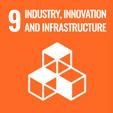


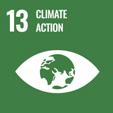
All of that can also be seen in chapter 3 about clients, passengers and citizens.


You can see the complete publication here: https://www.pactomundial.org/biblioteca/ods-ano-7-innovacionpara-lograr-la-agenda-2030/?utm_source=blog&utm_medium=referral&utm_campaign=ODS-7-publicacion
Don’t miss our video! https://www.youtube.com/ watch?v=2xRpjESqSpM
• At the proposal of the Spanish UN Global Compact, in 2023 Irizar participated in the “Business Ambition and Innovation: Keys for accelerating the impacts of Sustainability” seminar organised by the Global Compact and 3M. At the “Accelerating the 2030 Agenda contribution with ambition” round-table, the Sustainable Competitiveness Manager addressed the issue of innovation for Sustainable and Intelligent Mobility, which is a key issue for Irizar insofar as the new challenges the future of mobility holds for us. Speakers from several organisations also participated in the seminar, as well as high-ranking representatives from the Spanish UN Global Compact.
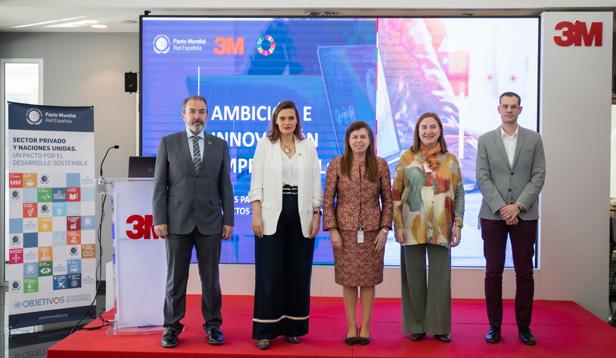
• By request of the Spanish UN Global Compact, because we are seen as leaders in integrating SDGs into our 2030 Irizar Agenda, in 2024 our Sustainable Competitiveness manager was a speaker at the event about the “implementation of the 2030 Agenda in Basque companies”.
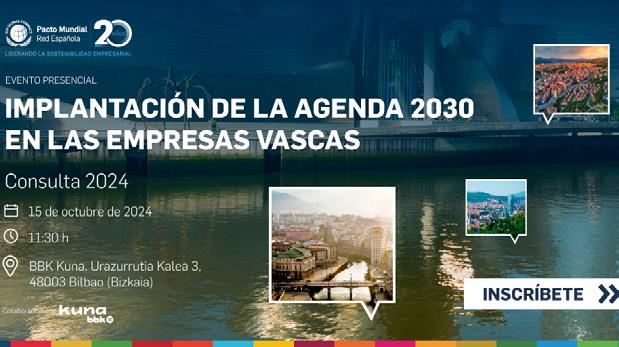
We had the privilege of being able to share our Sustainable Competitiveness and 2030 Agenda journey with organisations in the Basque Country. We were also accompanied by the social innovation manager at the General Secretariat of Social Transition for the 2030 Agenda in Presidency-Lehendakaritza of the EuskoJaurlaritzaBasque government, and other participants.
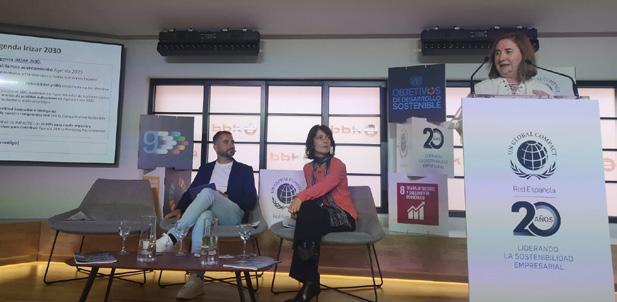
publicises and
Every year Irizar participates in the SDG support campaigns promoted by the Global Compact To publicly reinforce the value of their commitment to the United Nations 2030 Agenda, in 2023 Irizar joined the #ODSporbandera campaign launched by the Spanish UN Global Compact. The campaign is part of the #Togetherforthesdgs international initiative driven b y the UN Global Compact that several countries around the world participate in with the goal of having different actors from around the world act out their commitment to the sustainable development goals (SDGs) on the date of the midway point of their lifespan.
In that way, the flag of the SDGs is raised as a powerful emblem representing the commitment to a future that is sustainable and prosperous for everyone. It is a gesture independent of nationality, affiliation or position that seeks to synchronise efforts and goals, uniting a commitment that is much larger than everything that separates us. It is a flag that inspires us to move forward together. By raising the flag, Irizar is making a commitment more actively than in editions prior to achieving results, giving priority to the well-being of people and the planet. Along those lines, Irizar has established a number of commitments and best practices aligned with their strategy.

Sustainable development involves every person on the planet, which is why in 2024 Irizar and Irizar e-mobility raised the SDG flag again to celebrate the 9th anniversary of the 2030 Agenda The Sustainable Development Goals are our roadmap to reach a sustainable future, so we wave the SDG flags from the Global Compact to show our commitment, and we are excited to contribute our grain of sand to help create a more sustainable world.
• Also in 2024, we joined the campaign to celebrate the 20th anniversary of the UN Global Compact, the UN initiative that is the leader in corporate sustainability. At Irizar S. Coop. we ratified our commitment to the ten principles and the SDGs, which guide us to continue #LiderandoconImPacto (leading with the Compact) every day so our planet can be the home we want, where we have justice, peace and a healthy ecosystem for future generations.


In 2024 Irizar joined the Basque Alliance for the SDGs without hesitation, and signed the DECLARATION for a Basque 2030 Agenda Social Contract. Basque institutions and a wide array of academic, scientific and economic agents and others from Basque civil society have a firm commitment to the Sustainable Development Goals. International institutions have recognised the pioneering and leading drive in the Basque Country to pursue the goals.
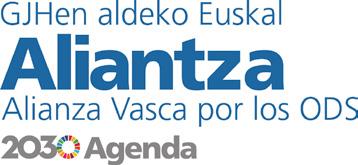
We have a close working alliance with the General Secretariat of Social Transition and the 2030 Agenda - Lehendakaritza/presidency of the Basque government. And we periodically participate in the Foros Guneak alongside other organisations.

It is a pleasure to participate (learn and share), and it is coherent with what we were already doing.
We contribute to raising awareness about Sustainability throughout society
Beyond the dynamic collaboration with the Global Compact, we lead or participate in various actions and forums to contribute to awareness raising and education for our stakeholders and society as a whole. To the dynamics shown here with a global vision of sustainability, we can also add others that are more related with people from Irizar, clients, suppliers or the environment, which are shown in later chapters.
A. Mainly since 2018 and in different ways, we contribute to awareness raising and training for our stakeholders and all of society:
• We proactively add our grain of sand to the Agenda Euskadi Basque Country 2030 promoted by the Basque government for the Basque contribution to the 2030 Agenda.
• We share our sustainability experience regularly.
a. In open-doors events at Irizar (with companies, education centres and universities),
b. through benchmarking in sustainability and SDGs to learn and share with other companies,
c. we participate in various external forums related with sustainability in university and business settings. Among them we can highlight the event we participated in as speakers at “Responsible business and strategic CSR management”, held at the Deusto Business School. We talked about what the step from seeing social responsibility as philanthropy to Sustainable Competitiveness was like at Irizar and seeing responsible business as the way to coherently integrate sustainable development into our entire management system.
B. Since 2021, the Sustainable Competitiveness manager at Irizar was invited to participate every month in the Ethics Applied to Management Seminar at the university of Deusto where alongside academics and managers from other organisations issues that, from their experience, are tackled that are key to integrating ethics into companies. The seminar is dynamised by the DIRECTICA learning community, which coordinates the transfer team of the Centre for Applied Ethics on which people in management roles participate on in a personal capacity.
With the understanding that ethics is the basis of Sustainability, it is a privilege to be able to learn from experts and people from different organisations and share points of view. The focus of the Centre of Applied Ethics of the university of Deusto is notable: no relativism or dogmatism, eclectic, concepts and organisational culture.
In 2022 the DIRECTICA Conference II was held with an external audience in the auditorium at the university of Deusto, Bilbao. Begoña Román Maestre, philosopher and expert in organisational ethics, helped us understand the challenges presented to companies by the current crisis and the possible approaches to analysing their responses to them ethically.
After her presentation, at the request of the director of DIRECTICA the Sustainable Competitiveness Manager shared her thoughts alongside the speaker and facilitated dialogue with attendees of the event.
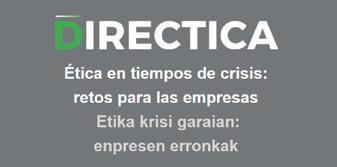
We participated in a session with the expert Gemma Galdon Clavell in 2023 organised by the Centre of Applied Ethics at the University of Deusto about “The ethical challenges raised by artificial intelligence”, which is more and more important and is making a bigger and bigger impact on sustainability.
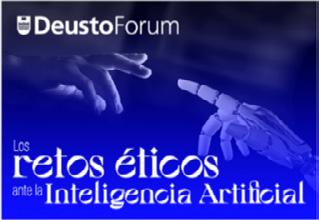
In 2024 the VII Ethics Conference was held with an external audience in the auditorium of the university of Deusto, Bilbao. The importance and urgency of combatting climate change and facing other environmental challenges we face as a global society has been amply recognised and it is being promoted in many institutional spaces and the current 2030 Agenda and SDG framework. In the workshop, we added a perspective that is already widely recognised as being inseparable from sustainability. It is known in a very generalised way as Just Transition (JT), and it refers to the attention that must be paid to the potential negative impacts that sustainability strategies may have in specific areas.

The Sustainable Competitiveness manager from Irizar shared:
• The fundamental bases which we apply when carrying out our sustainability strategy (HOW we do things in terms of governance)
• How we identify and prevent potential NEGATIVE IMPACTS caused by our sustainability strategy, and
• Which ones we recognise as risks and how we are facing them

C. In 2024, the Sustainable Competitiveness manager participated in the TRANSITAS project, (integrating responsible innovation tools for a just transition in Gipuzkoa), promoted and financed by the regional government of Gipuzkoa and coordinated and led by the Center of Applied Ethics at the University of Deusto and part of the learning community in the transition laboratory.
The tool for building an ethical agenda was a Transition Laboratory made up of agents from businesses, academia and innovation that made it possible to detect opportunities, threats and the measures necessary for a just transition scenario and anticipate the possible negative effects of some transformations at a sectorial level, inspired by Gipuzkoa’s commitment to triple sustainability.
A transition laboratory is an open innovation ecosystem centred on users or participants. And they are based in a systematic focus on co-creation with users where the practices and knowledges created are integrated into real communities and settings, as well as local and regional social challenges. In this case, it led to building shared visions around the concept of JT and corroborate the propositions of the ethical agenda for Gipuzkoa in regards to the just transition and to generate knowledge and practical proposals for professionals and organisations.
Centro de Ética Aplicada
Etika Aplikatuko Zentroa Centre for Applied Ethics


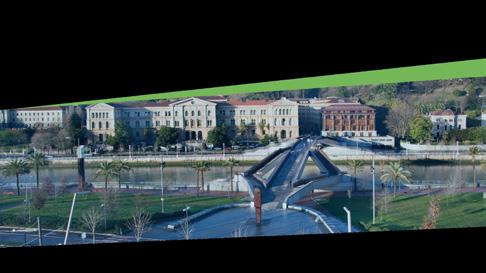
The just transition is a multi-dimensional and holistic approach for navigating towards the change to a low carbon economy and climate resistant society that strives to be equitable, inclusive and sustainable. At its core, the just transition seeks to guarantee that the measures taken to tackle climate change not only mitigate adverse climate effects, but also promote dignity, well-being and universal human and labour rights.
This approach takes a wide range of social, economic and environmental factors into account, and extends beyond merely reducing greenhouse gasses to include the creation of sustainable and dignified employment opportunities, respect for fundamental human rights and promoting effective social dialogue. The social dialogue is essential to enable significant participation of all the stakeholders, including workers, communities, companies, and defenders of rights in decision making related with energy transition and climate change adaptation policies.
The just transition is based in recognising that the impact of climate change and responses to it are not neutral, in the same way that the technology behind it is not, even though they affect different groups unequally, especially the most vulnerable populations. Consequently, it emphasizes the need for corrective measures that tackle those inequalities and promote an equitable distribution of the costs and benefits of the transition.
In the area of business, the just transition implies responsible behaviour that respects human and labour rights in accordance with international guidelines and principles. Companies are called on to play a proactive role in the transition, not just to mitigate risks and costs, but also to make use of the opportunities for innovation and sustainable development that climate action offers. Integrating financial and technological strategies that underline the climate transition is a crucial aspect for long-term business resilience and productivity.
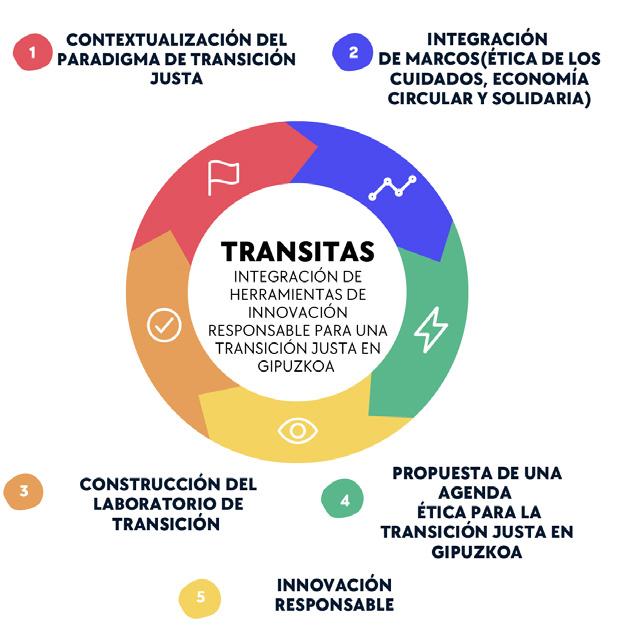
D. Our involvement in education is especially relevant. In 2022, 2022 and 2024 the Sustainable Competitiveness manager gave DYNAMIC workshops about our focus on sustainable competitiveness with:
• The University of Deusto: Final year students in business administration and management alongside double majors in law and computer science.

• Luzern HochSchule: Professionals studying in Switzerland who take the opportunity of their exchange trip with the Escuelas de Negocios de Europa In that case, they are accompanied by the university of Deusto to our facilities.

• Students in the USAC programme from 6 universities in the USA University of Nevada, Reno; University of Nevada, Las Vegas; University of Cincinnati; Colorado State University, Fort Collins and Boise State University.

Everything starts by sending them a SUSTAINABILITY DOSSIER (it is a summary of concepts and trends that is valuable for understanding the current situation and future trends of sustainability), along with a CHALLENGE that they have to do in groups and give a response in the meeting.
E. In 2024, the Sustainable Competitiveness manager was a speaker at more sessions related with the 2030 Agenda in fields of business and education, because sharing our experience in sustainability with people and organisations is the way to extend awareness and stimulate actions beyond our natural capacity for influence among
REPORT 2024
stakeholders. Sharing: Sustainable Competitiveness and the 2030 Irizar Agenda.
• With the ROAD TO SDG project driven by the Logistics and Mobility Cluster of Euskadi, to train organisations associated with the cluster while starting out and help them make progress with their commitment to the SDGs.
The attendees were very diverse, including good clients, but especially notable was the participation of the education sector, which are without a doubt the ones that are best positioned to keep deploying sustainability and the SDGs to new generations. The warm thanks from Arangoya (a vocational training centre in Bilbao that teaches the advanced transport and logistics cycle), and others, was very gratifying: “The other day, several professors had the chance to listen to you in the last ROAD TO SDG session, and we wanted to give our thanks, because it was a very interesting session.” As teachers, we’re preparing content in this subject to teach to our students. Thank you very much!“
• In the “Strategic Integration, Monitoring and Communication of the 2030 Agenda and SDGs” university specialisation programme. Very special, because for the first time it is a programme with all three universities: the University of the Basque Country (UPV/ EHU), the University of Deusto and Mondragon Unibertsitatea. And it has support from the Basque government.





D./Dña. Mentxu Baldazo jaunak andr eak
Euskal Herriko Unibertsitatea (UPV/EHU)
Deustoko Unibertsitatea (UD) eta Mondragon
Unibertsitatearen (MU) Be ezko Espezialista
titulua den eta Eusko Jaurlaritzaren Trantsizio
Sozialaren eta 2030 Agendaren Idazkaritza
Nagusiaren laguntza duen “2030 Agendaren eta
GJHen Integrazio Estrategikoa, Jarraipena eta
Komunikazioa” izeneko graduondokoan pa te
hartu du hizlari moduan
Irakasgaia: “2030 Agenda eta Garapen
Jasangarrirako Helburuak Integratzeko
Jardunbide Egokiak”
Jarduera Hizlaria
Iraupena 1 ordu
Ikasturtea: 2023/2024
Ha participado en el Título propio de Especialista universitario “Integración Estratégica, Seguimiento y Comunicación de la Agenda 2030 y ODS ” impartido por la Universidad del País Vasco (UPV/EHU), Universidad de Deusto (UD) y Universidad de Mondragón (MU) con el apoyo de la Secretaria General de Transición Social y Agenda 2030 del Gobierno Vasco, en calidad de ponente
Asignatura “Buenas prácticas para la Integración de la Agenda 2030 y Objetivos de Desarrollo Sostenible”
Actividad: Ponente
Duración: 1 hora
Curso académico: 2023/2024
Hau guztia Bilbon, 202 4ko apirilaren 24an ba eztatu dut edonon eta edonori ag er ahal d ezai on Y para que conste a los efectos oportunos, firmo este certificado en Bilbao a 24 de abril de 2024.
Estíbaliz Sáez de Cámara Oleaga Graduondokoaren z uzendar akademikoa / Directora académica del Posgrado
Although in this 2024 Sustainability Report we can reflect Irizar's commitment to each Principle of the United Nations Global Compact in more sections, this table shows the relationship with those where it is most relevant.

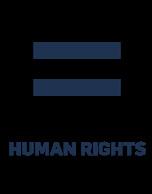
Principle 1
Businesses should support and respect the protection of internationally proclaimed fundamental human rights within their sphere of influence
Principle 2
Businesses should ensure that their companies are not complicit in human rights abuses
Principle 3
Businesses should uphold the freedom of association and the effective recognition of the right to collective bargaining

Principle 4
Businesses should support the elimination of all forms of forced or compulsory labour
Principle 5
Businesses should support the abolition of child labour
Principle 6
Companies must back the abolition of discriminatory practices at work and in employment.
FOR
2 Irizar and Sustainable Competitiveness.
4 We create value for our people.
7 We create value for Society.
5 Irizar and Sustainable Competitiveness.
3 We generate value for our clients, passengers and for citizens.
6 We generate value for our external collaborators, supply chain and alliances.
4 We generate value for our people – Member Council, regulations for internal arrangements and collective agreements.
5 We generate value for our external collaborators, supply chain and alliances – Sustainability requirements for our suppliers.
4 Irizar and Sustainable Competitiveness.
5 We create value for our People - People. Key actors in Sustainable Competitiveness – Commitment to high quality employment .
6 We generate value for our external collaborators, supply chain and alliances – Sustainability requirements for our suppliers.
4 Irizar and Sustainable Competitiveness .
5 We create value for our People - People. Key actors in Sustainable Competitiveness – Commitment to high quality employment.
6 We generate value for our external collaborators, supply chain and alliances – Sustainability requirements for our suppliers.
4 Irizar and Sustainable Competitiveness.
5 We create value for our People - People. Key actors in Sustainable Competitiveness - Gender equality, diversity and social inclusion.
6 We generate value for our external collaborators, supply chain and alliances – Sustainability requirements for our suppliers.
2 Irizar and Sustainable Competitiveness.
Principle 7
Businesses should maintain a preventive approach to environmental challenges
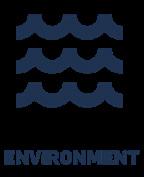
Principle 8
Businesses should undertake initiatives to promote greater environmental responsibility
3 We generate value for our clients, passengers and for citizens – Race to Zero –Decarbonisation: in internal combustion vehicles with hybridisation, zero-emissions electromobility and green hydrogen as an energy vector.
5 We generate value for our external collaborators, supply chain and alliances – Decarbonisation: of internal combustion vehicles with hybridisation, zero-emissions electromobility and green hydrogen.
6 We create value for the Environment.
2 Irizar and Sustainable Competitiveness.
3 We generate value for our clients, passengers and for citizens –Decarbonisation: in internal combustion vehicles with hybridisation, zero-emissions electromobility and green hydrogen.
5 We generate value for our external collaborators, supply chain and alliances – Sustainability requirements for our suppliers
6 We create value for the Environment.
Principle 9
Businesses should encourage the development and dissemination of environmentally friendly technologies
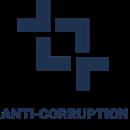
Principle 10
Businesses should work against corruption in all its forms, including extortion and bribery
3 We generate value for our clients, passengers and for citizens – Reducing emissions, electrification and alternative energy sources.
6 We create value for the Environment.
2 Sustainable Competitiveness - Our Sustainable Competitiveness.
4 We create value for our People - People. Key actors in Sustainable Competitiveness - Communication, transparency and participation.
5 We generate value for our external collaborators, supply chain and alliances – Sustainability requirements for our suppliers.
Below, in section “2.4.1. Including the SDGs into our 2030 Irizar Agenda”, we show the block of principles it is related with for each KPI.

We make a direct impact through our operations
Summarizing what we have already addressed earlier in this chapter regarding our Commitment to the SDGs of the 2030 Agenda:
In 2018 we began our approach to the United Nations 2030 Agenda and we made our commitment to contributing to the SDGs public.
In 2020 we made progress in incorporating our contribution to achieving the SDGs, which are the roadmap for driving prosperity for people and the planet, into our strategy and management.
1. Even though our goal is to contribute to achieving the 17 SDGs, upon analysing our strategy for generating value for our stakeholders, we believe that Irizar, because of the nature of our business and extensive value chain, can have a greater capacity for influencing the SDGs, which is explained below.
2. At the 2020 summer assembly (where we dealt with global strategy and company progress and that was open to everybody at Irizar A. Coop.), the CEO presented the 7 Sustainable Development Goals (SDGs) of the 2030 Agenda that have been chosen by Irizar as high priority and transversal.

Promote sustained, inclusive and sustainable economic growth, full and productive employment, and decent work for all people equally

Build resilient infrastructures, promote inclusive and sustainable industrialisation and drive innovation
These are the foundations of our commitment (with Ethics, Law and Human Rights), spanning all internal areas and all stakeholder groups


Achieve gender equality and empower all women and girls Promote just, peaceful and inclusive societies

Make cities and human settlements inclusive, safe, resilient and sustainable

Guarantee sustainable consumption and production patterns
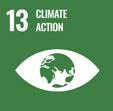
Adopt urgent measures to combat climate change and its effects

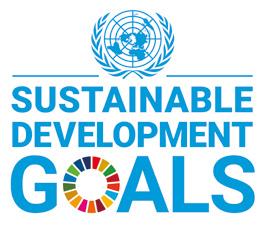
Irizar supports the Sustainable Development Goals.





Manage chemical waste and products
Achieve full employment and decent
Prevention, reduction, recycling and reuse of waste
Adopt sustainable business practices Ensure


The 7 priority and very important SDGs are those that, due to their importance and impact, we are going to pursue with the greatest ambition to work on Irizar's commitment to achieving the 2030 Agenda. To those ends, we chose 26 goals for each one in order to set the most ambitious goals and indicators possible aligned with the 2030 Agenda and make progress towards achieving them.
The SDGs are interrelated, so when we take action on the priority and very important SDGs we also make an impact on the rest, which we call secondary SDGs, in an indirect way through our operations (to a greater or lesser extent), or because their essence is contained in other SGDs that have already been dealt with.
In 2021 and 2023, as we explained in “2.2.4 We are a responsible organisation”, we can highlight training in sustainability and SDGs/2030 Agenda for the management team and president given by the Sustainable Competitiveness manager. The involvement and leadership of the management team is fundamental for making progress towards putting sustainability in practice in a very important way, not just secondarily. Training in it will subsequently be promoted and it will also be spread to leaders and the rest of the people in the organisation. The commitment is important for achieving the goals set for the future.
For six months in 2021 we participated in the SDG Ambition accelerator programme from the United Nations Global Compact, as we mentioned in section “2.2.3.. We are a responsible organisation”, alongside more than 700 international companies. It was a pioneering training programme with a new methodology to help us set ambitious SDGs (sustainable development goals) and integrate them into the centre of our strategy and operations and measure our progress, so we can definitively contribute to the prosperity of people and the planet.
In addition to Irizar representatives participating in the programme, the CEO of the Irizar Group reaffirmed our commitment as a high level “ambassador” in monitoring our progress.
Further information on SDG Ambition can be found at: https://
unglobalcompact.org/news/4593-09-21-2020. And in the dossier created by the Spanish Global Compact Network: https://www. pactomundial.org/biblioteca/sdg-ambition-resultados-i-edicion/
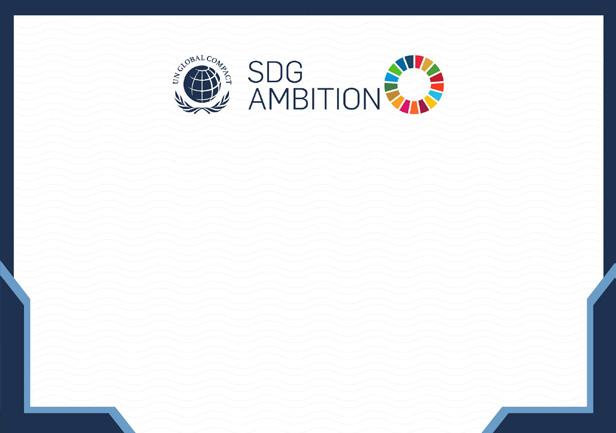
This certificate is awarded to
in recognition of your completion of the
including possible indicators, data up to now and goals/commitments. It facilitates understanding the scope of every SDG better and focusing the groundwork they require better, because the 2030 Agenda is an action plan that favours people, the planet, prosperity, peace and collective work. In addition to contributions by the Sustainable Competitiveness manager, the draft of the table includes contributions by the CEO, Environment and External Communications.
It was centred on our high priority (8, 9, 11, 12 and 13) and very important (5 and 16) SDGs, including their relationship with the PRINCIPLES of the Global Compact, and for every GOAL decided upon, an inventory of possible qualitative or quantitative contributions/INDICATORS:
• Some indicators will only be for tracking progress.
• However, the ones we deem to be the most relevant/ indispensable should have realistic but ambitious GOALS based on what are called “SMART goals” (specific, measurable, achievable, relevant and time-related).
• And with a time limit: DATE and taking the baseline of the commitment into account (a point or period in time from which measurements are made).
2.4.1.
In the first quarter of 2021 we did an exhaustive analysis of possible indicators we could use to make progress in integrating the SDGs into our 2030 IRIZAR AGENDA. It is a BASE document in table format to facilitate setting SDG GOALS and high priority + very important goals,
• There are also columns for data from the most recent years that are used to help see the progress and set goals.
The SDG indicators and goals are not an annual management plan and, even though we can set annual goals, the idea is to set longterm milestones and intermediate goals/deadlines to show our commitment to the 2030 Agenda.
At the end of 2021, with the active involvement of the CEO, we defined priority actions to start our contribution to the high priority and
transversal SDGs Setting related goals, indicators, objectives and deployment with various managers and teams from the affected areas: CEO, Product Development (innovation and engineering), the Environment, Purchasing and relationships with Suppliers, Production, People-HR and other entities in the cooperative, etc.
In late 2022, led by the CEO and facilitated by the sustainability manager, Irizar S. Coop. took an important step in their progress towards integrating Sustainability and the SDGs of the 2030 Agenda into their business strategy. With the conviction that greater involvement of management is the way to make things happen in Sustainability, the entire Management Team started participating in setting 24 KPIs for measuring our impact and to set specific medium-term goals starting in 2023 to contribute to the 2030 Agenda and the principles of the Global Compact.
Our commitment can be encapsulated in INDICATORS (priority KPIs) for measuring IMPACT, many of which have realistic but ambitious GOALS centred on our 7 priority and very important SDGs, as well as the principles of the Global Compact.
They are grouped into 6 IMPACT AREAS: CLIMATE, RESOURCES, TRUST AND INTEGRITY, EQUALITY, DECENT WORK, and EXTENDING SUSTAINABLE DEVELOPMENT
In late 2023, the KPIs were integrated into the long term and yearly strategic plan, operations, including monitoring by the CEO with the management team, the president and the Sustainable Competitiveness Manager. To those ends, for every KPI we specified:
• A manager or managers for the OBJECTIVE: Given that most of the KPIs are very important, we have tried to specify all the related managers, and who is expected to respond to progress.
• A person/area provides DATA task or knowledge: The same as the managers, there can be several areas/people, so we have determined who provides the data.
• FREQUENCY of reviews and who.
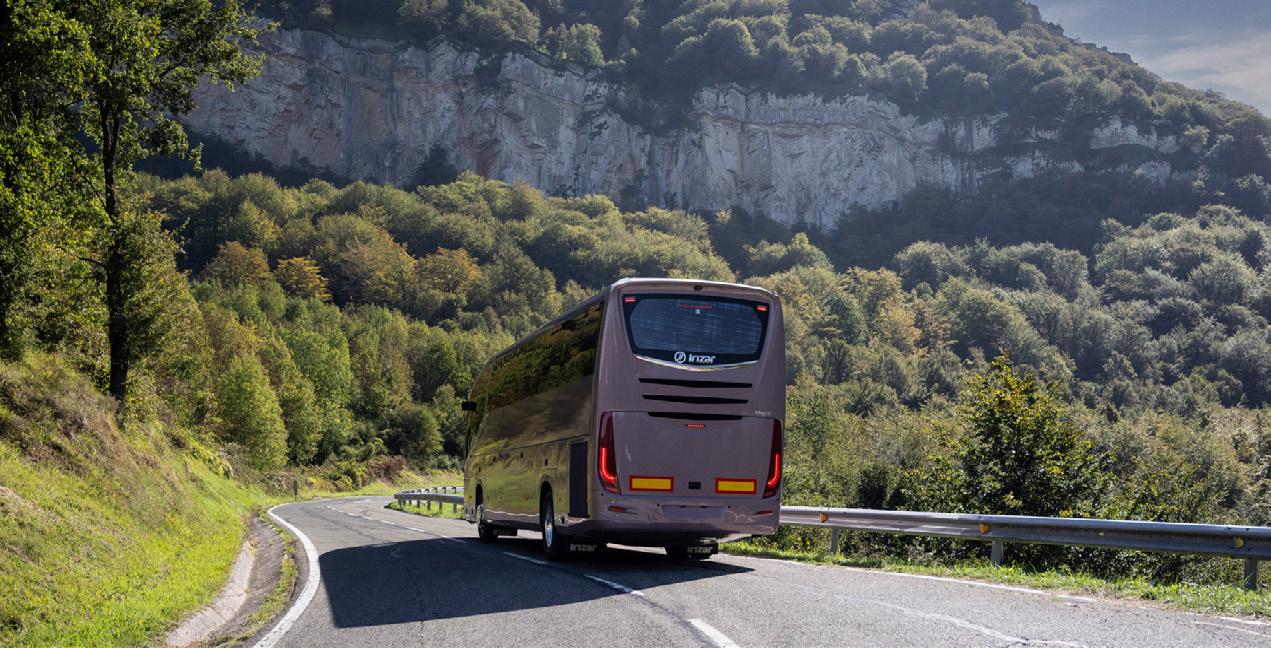
All the KPIS are shown here, although in following chapters we will take another look at the KPIs most closely related with every stakeholder group.

Take action for a positive climate world.
Continuously investing and developing innovative solutions that provide immediate and long-lasting decarbonisation results. Especially for reducing the GHG of our vehicles for all the years our clients use them.
The actions and details related with KPI 1, 2 and 3 are discussed in chapter 3. KPI 3 is also discussed in chapters 4, 5 and 6, and KPI 4 in chapter 6.
Be efficient in resource usage.
Behaving responsibly and making the most of technology to preserve our planet.
The actions and details related with KPI 5 and 6 are discussed in chapter 3. KPI 7 and 8 are discussed in chapter 6.
Live up to our principles of trust and integrity.
Keeping ourselves, and everyone around us, to high social, governance, and ethical standards.
The actions and details related with KPI 9, 10 and 11 are discussed especially in chapter 2 and 4. KPI 12, 13 and 14 are discussed in chapter 5.
Create equal opportunities for everyone. Ensuring that everybody is valued, work in an inclusive environment with equal opportunities regardless of gender to develop and give the best of them self.
The actions and details related with KPI 15, 16 and 17 are discussed in chapter 4.
Productive work for women and men under conditions of liberty, equity, safety and human dignity.
The actions and details related with KPI 18, 19, 20 and 21 are discussed in chapter 4.
Train people at Irizar and other external people/ organisations in Sustainability and raise their awareness of it Commitment to collaboration for development.
The actions and details related with KPI 22 and 23 are discussed here in chapter 2. KPI 22 is also discussed in chapter 4. KPI 23 is also discussed in chapters 3, 5, 6 and 7. And KPI 24 is discussed in chapter 7.
PRINCIPLES OF THE GLOBAL COMPACT SDGs

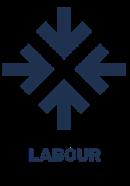




1. Increase the Sustainability of the vehicles sold (lower GHG emissions)
hydrogen, 100% electric, hybrid, LNG/CNG, low fossil fuel consumption (i6s efficient and i4 lightened)
In addition to vehicles sold by Irizar S. Coop. the indicators for KPI 1 also include ones from Irizar e-mobility, thus having a greater scope than the KPIs that are only for Irizar S. Coop.
2. Promote R&D to make progress in Sustainable and Intelligent Mobility
Decarbonization,
• Safety -- Driverless vehicles and
• Connectivity - Big Data
3. Reduce TOTAL GHG emissions
Includes:
Scope 1 and 2:
CATEGORY 1: Direct GHG emissions and removals
CATEGORY 2: Indirect GHG emissions caused by imported energy
Scope 3:
CATEGORY 3: Indirect GHG emissions caused by transport
CATEGORY 4: Indirect GHG emissions caused by products Irizar uses
CATEGORY 5: Indirect GHG emissions associated with the organisation’s use of products
4. Origin of electricity from renewable Renewable energy systems
% UNITS sold of MORE SUSTAINABLE vehicles /total yearly sales
% UNITS sold of MORE SUSTAINABLE vehicles / total average yearly sales of last 5 years
% R&D for vehicles that are MORE SUSTAINABLE AND INTELLIGENT
/ TOTAL R&D
% renewable electrical energy consumption and/or high-efficiency cogeneration / total electricity consumption
PRINCIPLES
COMPACT


5. Eco-innovation Environmental Product Declaration (EPD) and/or Life Cycle Analysis (LCA)
In addition to vehicles sold by Irizar S. Coop. the indicators for KPI 1 also include ones from Irizar e-mobility, thus having a greater scope than the KPIs that are only for Irizar S. Coop.



6. Recyclability and recoverability rate of vehicles at the end of their useful life (only for models that have an EPD)
products sold with environmental labelling (LCA/EPD) / range of products manufactured
7. Reclaimed waste (using reuse, recovery and recycling processes)
Sum of waste bound for waste manager and bound for our IZIR brand
8. Improving electrical energy efficiency in our centres Kwh consumed / working days / units billed tCO2 / working days / units billed
BASE YEAR: year data in blue if shown in OBJECTIVE later
PRINCIPLES OF THE GLOBAL COMPACT





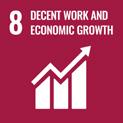
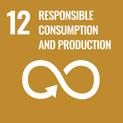
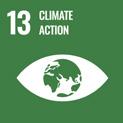

9. Level of confidence of people at Irizar to report unethical behaviour
10. Train/raise awareness of people at Irizar CULTURE ethics and legal compliance:
• Code of ethics, ethics and compliance System
people trained /
• Crime prevention system
• System for protecting personal data and guaranteeing digital rights
• New hires trained in the code of ethics and ethics and compliance system
11. Training people from companies from the Irizar Group in ethics and legal compliance:
companies trained / Total
a. Branch offices
b. Other coach companies in the Group
c. Rest of Group companies
BASE YEAR: year data in blue if shown in OBJECTIVE later
PRINCIPLES OF THE GLOBAL COMPACT
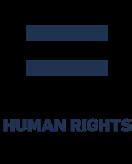








12. Making progress towards a supply chain Manager with SUPPLIERS committed to sustainability
Strategic suppliers (A + B) with a SUSTAINABLE CONTRACT
a. New suppliers with SUSTAINABLE CONTRACTS
b. A+ B strategic suppliers
c. Suppliers with the most risk of infringement
o in human rights (to be specified)
o environmental (to be specified)
13. Evaluate/monitor our SUPPLIERS with higher sustainability priority
• Questionnaires ANALYSED from environmentally vulnerable suppliers
Suppliers with the highest risk of infringement:
• in human rights
• environmental
14. Making progress towards a supply chain Manager with a commitment to sustainability from other external involved parties:
a. distributors
b. commercial partners
c. clients...
BASE YEAR: year data in blue if shown in OBJECTIVE later
Decided in 2024, pause sending the environmental questionnaire and prioritise including new clauses in purchasing contracts
PENDING specification of priority suppliers human rights + MA Set objectives according to human rights + MA priorities
PRINCIPLES OF THE GLOBAL COMPACT


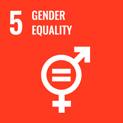

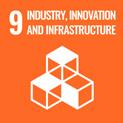

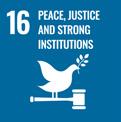
15. Increase gender diversity in:
a. hiring
b. the Management Team (group 1+2)
c. Management area/ middle management (group 4+5+6)
d. Governing council
16. Reduce the wage gap between women and men
Group 1 + 2 (CEO + Management Team)
Group 3 (management)
Group 4 (technicians)
Group 5 (administrators)
Group 6 (direct personnel)
17. Train/Raise awareness of People at Irizar in Gender equality Gender Equality Plan Harassment Protocol, etc. • New hires trained in gender equality
BASE YEAR: year data in blue if shown in OBJECTIVE later
PRINCIPLES OF THE GLOBAL COMPACT
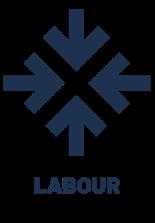
The International Labour Organisation (ILO) defines decent work as: “productive work for men and women under conditions of freedom, equity, safety and human dignity”.

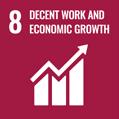

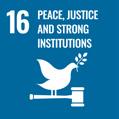
18. Providing a safe and healthy work environment
a. Reduce the frequency rate of accidents
b. Reduce the incident rate of accidents
19. Worker partners
Differential factor compared to NON-cooperatives
AVERAGE
20. Pay ALL our workers at least a living wage
Global Compact definition of a living wage: https://bhr-navigator.unglobalcompact.org/ issues/living-wage/ % salary / living wage
Compared with the metal collective bargaining agreement for the most common positions: - engineer or university graduate (MOI) and - product technician (MOD)
21. Increase the people’s level of commitment
(Includes: Expectations, commitment and feeling) Average % value Survey / Total workforce (0-100%)
PRINCIPLES OF THE GLOBAL COMPACT












22. Train/raise awareness of people at Irizar in Sustainability:
- BASIC Definition, 10 principles and SDGs
- Human and labour rights
- Environment - Etc.
Prioritising:
• Management Team
• Managers of: areas, processes or relevant teams
• Governing Council
• Other indirect staff
• Rest of people at Irizar
• New hires % people with BASIC training
23. Contribution to improvement in the Sustainability of other people and external organisations (public and private).
Outside of Irizar S. Coop.
We share our knowledge and experience with Sustainability in numerous forums, and awareness raising and training activities with:
• Priority stakeholders (to be specified): clients, suppliers, distributors, etc.
• Group coach companies
• Other Group companies
• Students, external organisations and other people in the social environment
24. Social Commitment to Cooperation Development Activities
Includes: NGOs and associations that do work to benefit education, health and gender equality and to eradicate poverty, hunger and inequalities % € Development cooperation activities
BASE YEAR: year data in blue if shown in OBJECTIVE later
/ € total designated for notfor-profit activities
The goal of making Sustainability strategic at Irizar is to inculcate responsible behaviour at all levels of the organisation and ensure that the SDGs are progressively integrated into all areas of the company.
These commitments are what will allow us to achieve a greater positive impact on all our stakeholders.
Without a doubt, the shared leadership of everybody at Irizar is focused on deploying and involving the entire organisation more easily.
2.4.2.
Relationship between the SDGs and the chapters of this report
The following table shows how the SDGs relate (to a greater or lesser extent) to the chapters of this report.



















Contributing to the SDGs and goals of the UN 2030 Agenda:





8.1 Maintain economic growth
8.2 Raise productivity through diversification, technology and innovation.
9.2 Promote inclusive and sustainable industry
9.4 Modernise infrastructure, clean technology
9.5 Increase in scientific research, technological capacity.
11.2 Provide access to public transport
11.6 Reduce environmental impact in cities

12.6 Adopt sustainable business practices
12.8 Ensure education for sustainable development
12.B. Achieve sustainable tourism
13.1 Strengthen resilience and adaptation
13.3 Improve environmental education and awareness 16.5 Reduce corruption and bribery
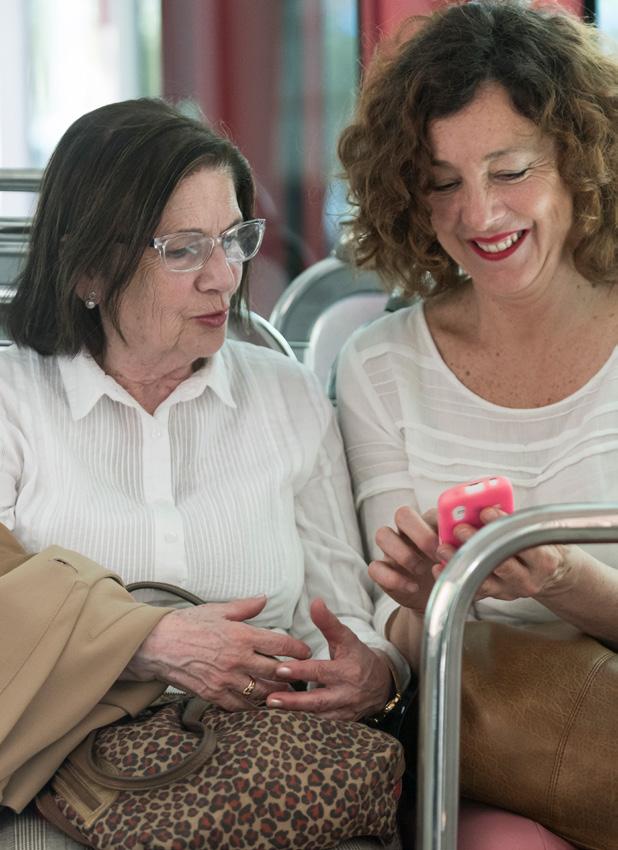

3.1
A Key Actor in Sustainable and Intelligent Mobility
• Global forces that are revolutionising sustainable transport.
• Sustainable transport technologies
• Our vision of Sustainable and Intelligent Mobility
• Commitment to clients, passengers and citizens, integrated with the SDGs of the 2030 Agenda
• Innovation, it's in our DNA.
• PERTE VEC "CAPITAL"
• Irizar in “SDG Year 7 Innovation for achieving the 2030 Agenda”
• Race to Zero
• European leader in eco-innovation
3.2
The customer, at the heart of our strategy
• Irizar customer-oriented
• Supporting them from start to finish
• Their opinion and expectations are fundamental.
• Clients are the key factor in our future projects
• The customer, integrated in internal processes.
• Always informed
• Quality and After Sales Forums. Satisfaction surveys
• Driver training
• Meeting us at international fairs
3.3
Decarbonisation: in combustion vehicles
3.3.1. The Irizar i6S Efficient: the most efficient coach in Irizar's history
3.3.2. The Irizar i8 Efficient, the flagship of our range.
3.3.3. Irizar i4 lightened: efficient, sustainable and profitable
3.3.4. Integral Irizar brand coaches, new generation Efficient even more efficient
3.3.5 Natural gas (CNG and LNG) coaches
3.4
Decarbonisation: with hybridisation
3.5
Decarbonisation: Electromobility at the Irizar Group, zero-emissions
3.5.1. Integral electromobility solutions
3.5.2. Range of electric urban vehicles
3.5.3. New Irizar i3 electric intercity
3.5.4. Irizar batteries
3.5.5. Second life and battery recycling
3.5.6. Careful management of resources
3.5.7. Charging infrastructures
3.6
Decarbonisation Green hydrogen as an energy vector
3.6.1. Long distance electric coaches with green hydrogen fuel cells
3.6.2. Electric trucks with green hydrogen batteries
3.7
Safety and Driverless Vehicles
3.7.1. Passenger safety comes first
• Active Safety
• Passive Safety
• Solutions for preventing the spread of viruses on public transport
• New Driving Assistance Systems.
3.7.2. Cybersecurity
• Connected Intelligent Vehicle (CIV)
• UN cybersecurity regulations for vehicles 155 and 156
• CIBERBUS project
3.7.3. Towards driverless vehicles
• Previous advancements
• DIGIZITY
• SHOW
3.8
Connectivity - Big Data
3.8.1. Fleet manager
3.8.2. Maintenance

Buses and coaches play a crucial role in achieving the sustainability goals of the European Green Deal, and in the efficient transition towards decarbonisation and climate neutrality by 2050. Buses are one of the modes of transport that generates the least greenhouse gasses. And, as you can see on the chart in the “Our Vision of Sustainable and Intelligent Mobility” subsection, in terms of CO2 emissions, over their entire life cycle buses generate less emissions per passenger and kilometre than any other mode of ground or air transport, except electric bicycles. In fact, figures from the European Environment Agency show that almost all CO2 emissions associated with road transport are not produced by bus transport.
Sustainable Mobility has become one of the transport priorities of the future, a motto that we make our own and that is an element of the strategic decisions that we are adopting in the Irizar Group.
Today, after 135 years, we understand our ability to respond and adapt successfully to different challenges, by making a continuous effort to position ourselves at the forefront and improve the experience, safety and sustainability of public transport and by offering a customised service and quality. We also understand our flexibility in meeting the needs of our customers and our commitment to remaining closer than ever to everyone, to offer the best of ourselves.
The main global trends have a radical impact on the transport ecosystem that will be fundamentally transformed in the coming years. We believe that this change will be deeper and will happen faster than previously thought in the sector.
At Irizar we aspire to be a leader in the change towards a sustainable transport system. We rely on our financial strength and experience
ECOSYSTEM OF FUTURE TRANSPORT
GLOBAL FORCES TRANSPORT TECHNOLOGIES
• Sustainability / Decarbonization
• Urbanization
• Digitization
• Reducing emissions, electrification, alternative fuels and hydrogen as an energy vector
• Driverless vehicles
• Connectivity
in mobility which makes it easier to continue following the path of innovation, contributing our knowledge in the development of new technologies, solutions and services that guarantee a more sustainable future in economic, social and environmental terms.
The following is an in-depth review of the strengths and technologies of the transport ecosystem that we are approaching. In the following sections we explain how we are facing the three major trends in the sector at Irizar.
A climate crisis, urban population growth, and technological disruption - three of the global forces shaping a sustainable transportation revolution. We live in a period of unprecedented change. The upheaval caused by Covid-19 is just one example of the many challenges facing the world, from growing social inequality to the threat of climate change. The political landscape is equally volatile. Meanwhile, global initiatives such as the European Commission's Green Deal are accelerating the transition to a sustainable low-carbon economy.
The escalating climate crisis is a major threat to the ecosystem and society of our planet. The transport sector is one of the world’s highest energy consumers and it contributes 23% of energy-related greenhouse gas emissions and 18% of all anthropogenic emissions in the world economy. To achieve the goal of the Paris Agreement and avoid catastrophic increases in global temperatures, radical action
is required from both government and business to decarbonize the transportation sector.
The European Green Deal puts the energy and green transition at the heart of political action. The objectives of the programme include achieving a CO2 emissions free EU in 2050 and the development of clean, reliable and affordable energy. To achieve this, it establishes a wide package of measures that enable, among other things, advances in transport sustainability. Currently, transport consumes a third of all final energy in the EU, with most coming from oil. Accordingly, it is responsible for a quarter of greenhouse gas emissions. The objective is, therefore, to reduce the emissions from road transport, trains, boats and aeroplanes by promoting the use of cleaner, more efficient and healthy public and private transport.
At the same time, the world must guarantee that this transition is managed in a way that benefits all of society so that no one is left behind, in line with the UN 2030 Agenda for sustainable development to which Irizar is committed.
As public awareness increases and carbon legislation and policies evolve, demand from transport service providers and users for cleaner and fossil-free forms of transport grows. And it will grow more and more because, while not everything is urgent, taking care of our planet is.
The world is experiencing the largest wave of urban growth in history and 2.5 billion people are expected to live in cities by 2050. This population growth is far outpacing the growth of public transport
services. As cities grow and become more populated, so does the pressure on urban transport infrastructure, thus increasing the risk of air pollution and other major health and environmental impacts, such as traffic noise and an increased risk of traffic accidents. There is also the risk that access to transport services will become more limited, disproportionately affecting people from vulnerable groups.
The challenges of urbanization demand resilient transportation infrastructure and solutions that keep people and goods moving, and ensure that the cities of the future are healthy, safe, inclusive, and liveable.
We are living through the fourth industrial revolution, an era of radical and disruptive technological change, in which digital trends such as the Internet of Things, robotics, virtual reality and artificial intelligence are transforming the way we live and work.
Digitization is impacting business models within the transport sector, so that products, production processes and supply chains have to be more interconnected. Emerging technologies drive innovation and create new opportunities and risks, such as challenges to personal integrity, cybersecurity and ethical dilemmas throughout the value chain.
These global forces are creating an urgent need for sustainable transport that is clean, safe, efficient, inclusive and resilient.
Likewise, they are shaping the tools and technologies that the transportation industry is using to respond to this demand. There are new technologies that, together, are accelerating the shift towards a sustainable transportation system that is electrified, uses alternative fuels and hydrogen as an energy vector, and is autonomous and connected.
Electrification is essential in a sustainable and decarbonized transportation system. Electric vehicles run cleanly and quietly, with zero particulate and NOx (nitrogen oxides) emissions and a very low total carbon footprint (electricity from fossil-free energy sources. Battery technology is improving rapidly and other solutions, such as fuel cell technology, are being developed. One relevant issue is the origin of the electrical energy used. It is important that the origin is renewable, so alliances between clients and energy suppliers become more important.
While electrification has significant benefits for our climate and air quality, it also brings new sustainability challenges. It puts increasing pressure on the battery raw material supply chain, creating environmental and human rights risks. To be truly sustainable, these risks must be managed carefully.
The mass adoption of electric vehicles depends on an infrastructure with widely available charging solutions. Those of us in the transport industry must play an active role in developing that infrastructure and work in association with infrastructure suppliers, electricity producers and governments.
In regards to heavy urban transport (where our buses are used), electrification using batteries is the clear choice. In intercity and long distance transport (where our coaches are positioned), hydrogen is expected to become a strong competitor with the technologies mentioned above.
Hydrogen was identified as a potential solution for a clean fuel for the future decades ago. Previous attempts were thwarted by abundant oil reserves, low fossil fuel prices, and the advancement of batterypowered light electric vehicles, which, among other issues, dampened expectations of hydrogen deployment.
We are experiencing a transition towards an era of sustainable energy gases, and it is expected that during the second half of the 21st century their consumption will exceed both coal and oil and, by the end of the 21st century, energy gases (methane and hydrogen) will have consolidated, like coal at its peak, more than 75% of the world energy market.
Among the sectors where hydrogen has a higher potential for use is mobility (as an alternative to electric batteries). The advantages of hydrogen are low emissions, range and recharging speed, as well as efficiency and maintenance costs. The main advantage of these vehicles is their range, because of the energy density of hydrogen.
Two of the important points for using hydrogen as a relevant agent in the energy transition will be transforming the production model to use processes based on renewable energy that create what is called “green hydrogen” and “blue hydrogen”.
The hydrogen market is still being defined today, with different players in its value chain. At Irizar we are already actors in it.
Sustainable transport depends on sustainable energy. While electrification is playing an important role in meeting this need, several studies show that renewable fuels are key to decarbonizing in the here and now, at the pace required to meet the goals of the Paris Agreement. It is a solution that provides greater flexibility in the scalability of the supply network.
Renewable fuels such as biofuel, biodiesel and HVO (Hydrotreated Vegetable Oils = diesel from hydrotreated vegetable oils that eliminate the emission of sulphides), in combination with energy efficient combustion propulsion systems, or used in conjunction with electricity in hybrid propulsion systems, can reduce a vehicle's total well-to-wheel carbon emissions by up to 90%, compared to fossil diesel.
Because biofuels (and agricultural waste) can come from organic material, they also back circular models of energy storage.
Rapidly increasing the use of renewable fuels is key to achieving the carbon reductions we need to see in the short term. As almost all vehicles on the road today can already run on renewable fuels, the potential reduction in emissions is enormous, and it also provides the profitability of sustainable solutions for transport providers.
The rapid evolution of artificial intelligence and other technologies has paved the way for driverless transportation. Automation has great potential to transform mobility.
Safety is also an important factor. Likewise, highly automated vehicles could revolutionize public transport services, by reducing congestion, improving access to mobility and making our cities safer and more liveable.
Vehicles with high levels of automation are already being tested and, at the same time, automated buses are operating in urban or suburban settings in several European cities.
Digitization is bringing tremendous growth in vehicle connectivity, with vehicles continually producing and sharing data. Connectivity can be a key enabler for driverless transportation, allowing vehicles to communicate with each other and with the surrounding road infrastructure, making transportation smarter and more efficient.
Connectivity also brings significant benefits to transportation logistics, with real-time data allowing users and manufacturers to track how vehicles are being used and operated with much greater precision, enabling more efficient flows. Connectivity also enables maintenance times to be optimized, maximizing uptime, reducing fuel consumption and improving overall efficiency.
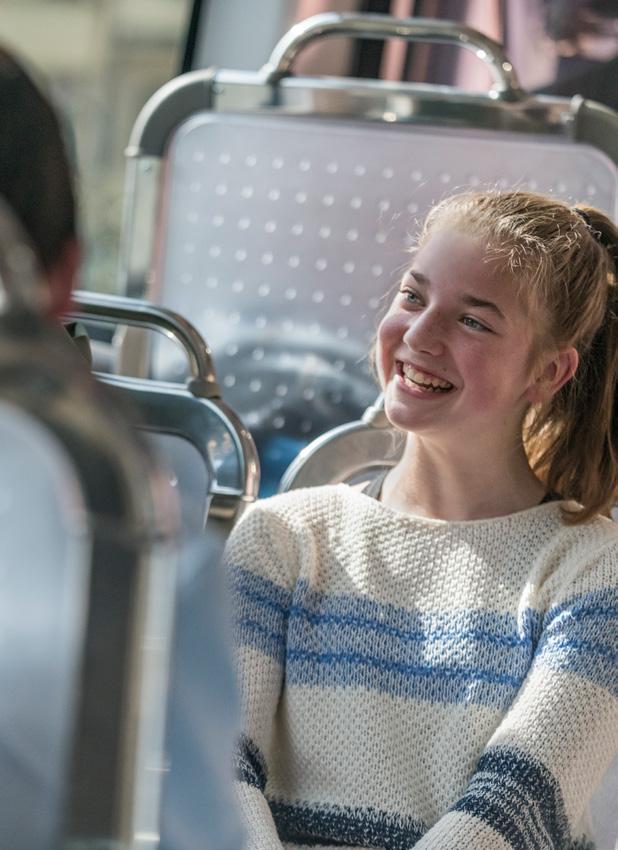
The transport of the future will be different from what we see today. Technology at the service of public needs and sustainability goals will undoubtedly bring about disruptive changes, some of which can predicted while others are yet to be discovered.
Our current vision sees the mobility of the future as sustainable, safe, smart and connected, with the presence of vehicles powered by different energy sources, increasingly efficient and with different levels of range and services that will improve people's experience.
At the Irizar Group we aim to become a key player in facing these challenges, putting our capacity and technology at the service of society, forging alliances (suppliers, network of local technology centres, institutions, universities, training schools, etc.) and seeking out partners. It ratifies our commitment to the health and well-being of people, the environment, and to creating better urban environments.
We are committed to mass public mobility, to reducing the level of polluting emissions, connecting means of transport for better fleet management, improving information to users and introducing new technological developments to enhance the safety and experience of passengers.
In this context, technology is key and our Group positioning strategy is to drive innovation and the creation of our own high technology in strategic sectors with the aim of providing pioneering solutions so that we can anticipate successfully future challenges and positively impact
on wealth creation and employment and the development of society and the economy.
Al of that will demand high flexibility and capacity for adaptation. Our current and future development hinge on the following keys:
Change is coming in urban environments towards smart cities that are more liveable and sustainable and where mobility and transport play a crucial role.
In the markets we operate in we're working with our clients and other partners to make collective passenger transport a sustainable reality. Irizar has become a major leader in coaches and buses and they are consolidated in markets where they are currently present.
Passenger transport will be emission-free, but for a while there will be a combination of transitional technologies, ranging from electric powered, or propulsion by natural gas or hydrogen. The latter, alternative and green source of energy is mostly for long distance vehicles.
In this sense, Irizar is continuing to make progress in offering alternatives that reaffirm our commitment to sustainability that began years ago. We have a wide range of solutions that include zeroemissions urban buses and trucks, zero-emissions (class II) intercity coaches, and hydrogen, hybrid, diesel, biodiesel, HVO, biofuel and even natural gas (CNG and LNG) coaches. It is a large catalogue of choices that spans all market segments, including urban buses, suburban and medium and long-range coaches for regular, discretionary and premium services.
This coach manufacturing strategy does not prevent us from continuing to work closely with chassis manufacturers, with whom we have common interests, and with whom we continue to increase our presence in both European markets and in the rest of the World.
Another of the great challenges of the future is the generation of clean, inexhaustible energy, without radioactive waste or the use of non-renewable fuels. At the Irizar Group, we are positioned in three business areas: nuclear fusion, renewable energies and energy storage and management, which is indispensable for reaching the zero-emission goals. Developing low-emissions technologies in passenger transport requires, in turn, institutional support for developing infrastructure.
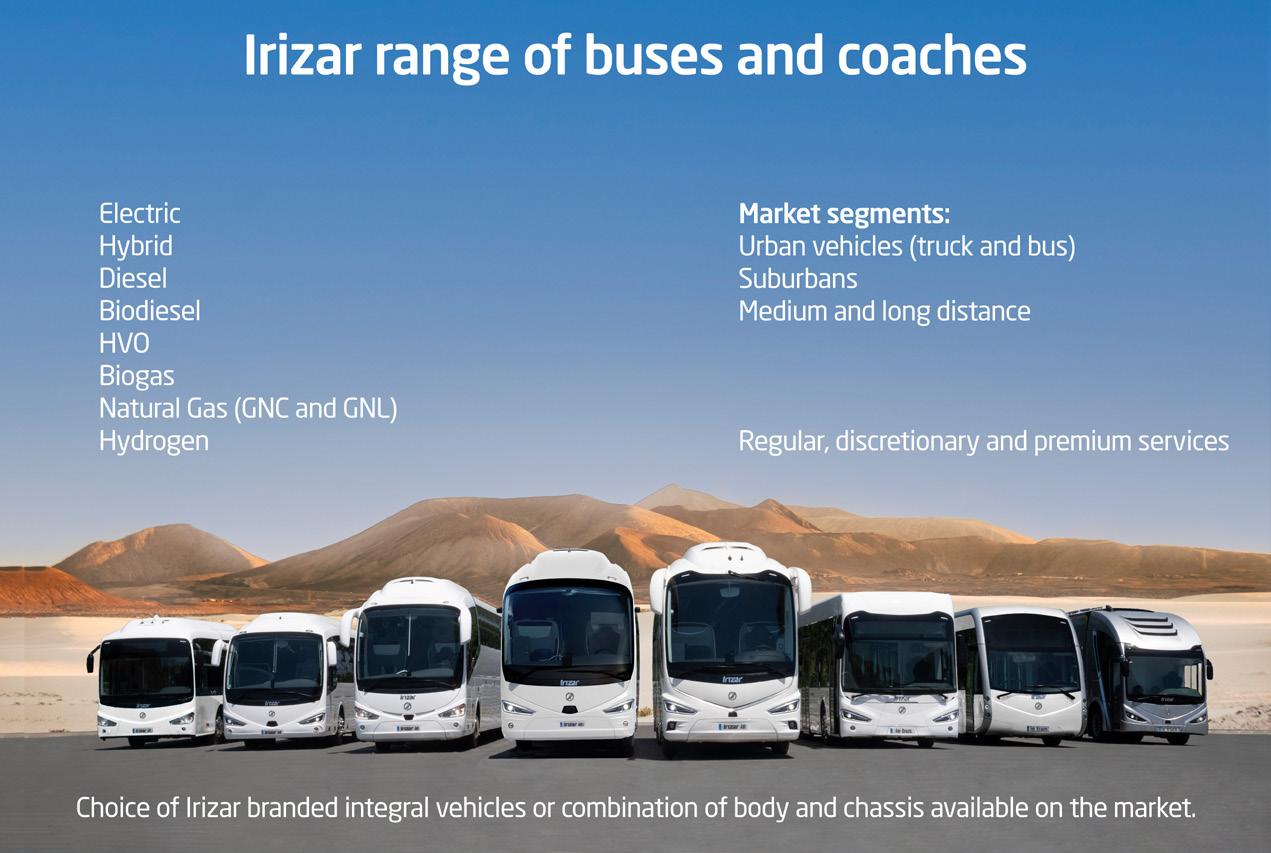
HEV (soft hybrid), PHEV (plug-in hybrid), BEV (electric) and FCEV (hydrogen) buses and coaches are expected to account for the majority of vehicle registrations in Europe in 2035.
Promoting the use of public transport and researching and improving alternative fuels are the main challenges that we chose to prioritise some time ago. Public transport is a fundamental economic sector , both for the contribution of the wealth and employment it generates, and for its dynamic nature in society, facilitating the mobility required by daily life. It has a beneficial impact on the health system, due to better air quality and reduced noise emissions.
Collective public transport is the major alternative for substantially reducing emissions, because:
• A bus can transport as many people as 50 cars.
• Buses are the most used form of public transport in the world and the one with greatest capillarity .
• It has been shown that cars are only used 5% of the time and that must be optimised.
• According to a study by the IDAE (Institute for Energy Diversification and Savings) and the emissions of our vehicles, the comparison of the carbon footprint between buses and coaches and other means of transport is very advantageous (g CO 2 per km passenger transported).
If the pandemic years are disregarded, there has been a significant increase in coach registrations in Europe, which went from 23,803 units in 2015 to 29,339 in 2024. (*) For electric
Because of that, at Irizar we do not rule out the fleet of buses and coaches in Europe increasing by 2050, with the largest increase in the urban and intercity segment.
As we put forth in chapter 2, about Irizar and Sustainable Competitiveness, in 2023 we kept improving our impact on the highpriority KPIs in our commitment to the SDGs of the 2030 Agenda. Consequently, we have decided to prioritise our sustainable value contribution to our clients, passengers and citizens in:
A. CLIMATE: three KPIs for: - Increasing the sustainability of the vehicles sold - Boosting R&D for products to increase Sustainable and Intelligent Mobility and - Reducing scope 3 category 5 indirect GHG emissions associated with the use of our vehicles by clients (the latter can be seen in detail in the chapter about the environment).
B. RESOURCES: two KPIs for: Eco-innovation (models with an environmental product declaration - EPD) and recyclability and recoverability rates for those vehicles at the end of their useful lives.
F. EXTENDING
We’ve defined a KPI with our commitment to contributing to improvement in external (public and private) people and organisations, extending our commitment to sustainability beyond our own organisation, fundamentally to our stakeholders. Sharing our knowledge and experience with sustainability in various forums, as well as through sustainability and awareness raising activities, at the same time that we encourage our clients to buy more sustainable vehicles.

PRINCIPLES OF THE GLOBAL COMPACT SDGs






1. Increase the Sustainability of the vehicles sold (lower GHG emissions)
hydrogen, 100% electric, hybrid, LNG/CNG, low fossil fuel consumption (i6s efficient and i4 lightened)
In addition to vehicles sold by Irizar S. Coop. the indicators for KPI 1 also include ones from Irizar e-mobility, thus having a greater scope than the KPIs that are only for Irizar S. Coop.
2. Promote R&D to make progress in Sustainable and Intelligent Mobility
Decarbonization,
• Safety -- Driverless vehicles and
• Connectivity - Big Data
3. Reduce TOTAL GHG emissions
Includes:
Scope 1 and 2:
CATEGORY 1: Direct GHG emissions and removals
CATEGORY 2: Indirect GHG emissions caused by imported energy
Scope 3:
CATEGORY 3: Indirect GHG emissions caused by transport
CATEGORY 4: Indirect GHG emissions caused by products Irizar uses
CATEGORY 5: Indirect GHG emissions associated with the organisation’s use of products
BASE YEAR: year data in blue if shown in OBJECTIVE later
% UNITS sold of MORE SUSTAINABLE vehicles /total yearly sales
% UNITS sold of MORE SUSTAINABLE vehicles / total average yearly sales of last 5 years
% R&D for vehicles that are MORE SUSTAINABLE AND INTELLIGENT
/ TOTAL R&D
ISO140641:2019

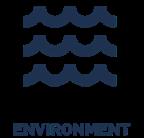



YEAR: year data in blue if shown in OBJECTIVE later PRINCIPLES
5. Eco-innovation Environmental Product Declaration (EPD) and/or Life Cycle Analysis (LCA)
In addition to vehicles sold by Irizar S. Coop. the indicators for KPI 1 also include ones from Irizar e-mobility, thus having a greater scope than the KPIs that are only for Irizar S. Coop.
with
and/or LCA
products sold with environmental labelling (LCA/EPD) / range of products manufactured
recyclable
(Tm)
6. Recyclability and recoverability rate of vehicles at the end of their useful life (only for models that have an EPD)












23. Contribution to improvement in the Sustainability of other people and external organisations (public and private). Outside of Irizar S. Coop.
Sharing our knowledge of and experience with Sustainability in forums and training and awareness raising activities:
• High priority stakeholders Clients, suppliers, distributors, etc.
• Group coach companies
• Other Group companies
• Students, external organisations and other people in the social environment
The strategy based in developing new ideas, that entrepreneurial attitude backed with tool that made us more and more competitive, that boldness in taking on risks or the capacity to learn from mistakes were nothing other than manifestations of the innovative “gene that, for the 135 years of Irizar Group history, have defined our brand, culture and identity.
For us innovation means investing in knowledge, talent and new products and services, new processes, new sustainable technologies and new developments. But it's also the key instrument that lets us make progress in our organisational culture and day to day management, and it makes us not only more agile, flexible and adaptable, but also more capable of overcoming future challenges in a way that will make us always be the preferred choice of our clients.
New times have definitely made us innovate, because the social-health and economic crisis made us provide short-term responses to protect, above all, the health and safety of people and their families and, in the medium and long-term, guarantee the sustainability of the business and creation of value. But it also offers us an opportunity to re-focus and redefine our strategic plans, putting our sights on the major challenges that the energy transformation and new Sustainable and Intelligent Mobility bring us. And, in that scenario, innovation once again becomes key.
From our position at the centre of the energy and sustainability transition, two ideas should be made very clear. People are the linchpin on which our energy strategy hinges. And the innovation we advocate calls for strengthening ties and creating a collaborative fabric among suppliers, local technology centres, institutions, universities and training schools that we can provide pioneering solutions that positively impact the development of society and the economy with.
In that context, the Irizar Group's strategy to drive innovation and create our own technology in future strategic sectors in which we can provide pioneering solutions that positively impact the creation of wealth and employment and develop an industrial fabric in the longterm becomes especially important. The well-known Next Generation funds are a major opportunity to bring European industry back into the technological vanguard.
One of the strategic decisions we've made in the Irizar Group has to do with the role buses and coaches play in achieving the sustainability goals of the European Green Deal and the efficient transition towards decarbonisation and climate neutrality by 2050.
We are committed to mass public mobility, to reducing the level of polluting and noise emissions, connecting means of transport for better fleet management, improving information to users and introducing new technological developments to enhance the safety and experience of passengers.
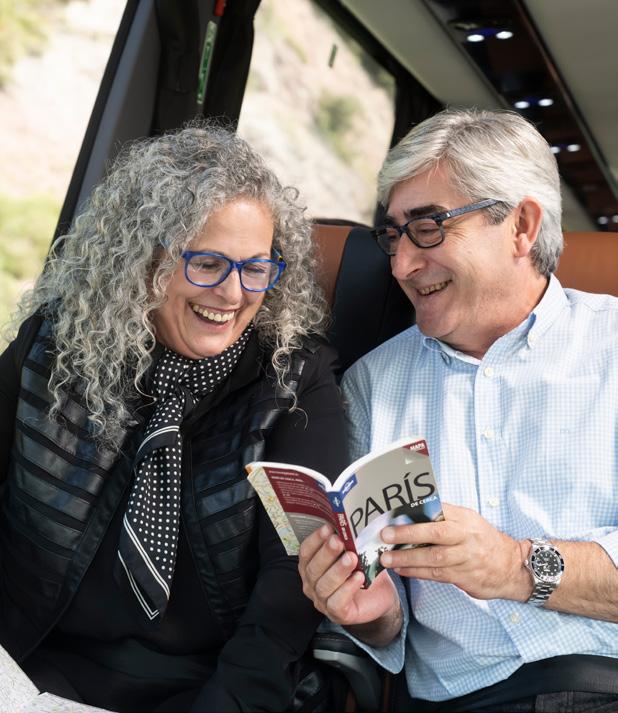
In short, Irizar lives and breathes innovation, it is in the environment, it is in our DNA It’s vital to be a global actor in Sustainable Mobility and be one step ahead of the current and future needs of our stakeholders. And go beyond profitability and try to make a positive impact on people and the planet.
To those ends, we’re focusing on INTEGRAL
• in WHAT we do (products, services),
• HOW we do it (management models, Global Compact focus, alliances, etc.) and
• WHY we do what we do (mission: create wealth and employment and commitment to stakeholders; long-term economic sustainability and ESG sustainability; with a positive impact on the 2030 Agenda). The 7 Sustainable Development Goals we have prioritised are not extras, they are our business.
For Irizar, Sustainable Mobility is a very important goal especially aligned with 4 priority SDGs:
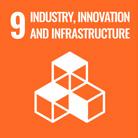
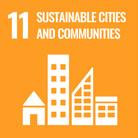
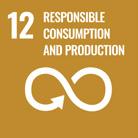
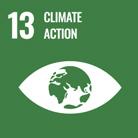
Not innovating is only viable to survive in the short-term. Innovating in a sustainable way is indispensable to live into the medium-long term.
Since 1889 when we started manufacturing horse drawn carriages we’ve seen several revolutions. We’re now reinventing ourselves in terms of Sustainable and Intelligent Mobility, which is comparable to when in 1928 we manufactured our first mechanically powered vehicle. It is not exactly an incremental improvement: it is total innovation.
Our primary CHALLENGE is to keep developing “traditional” projects alongside new ones focused on zero-emissions, which IMPACTS all areas of the organisation, in addition to the RISK/UNCERTAINTY of how future technologies will evolve. In other words, it entails the COMPLEXITY of managing a future with a multitude of technological solutions that will involve making decisions without knowing whether the future will go in that direction, be it electric platforms, CNG/LNG, hydrogen fuel cells or something else.
It’s not an obstacle, rather it’s a CHALLENGE that will help us innovate faster. We’ll innovate in the sustainability of our products, making the most of our collaborations/ALLIANCES with other relevant actors in our value chain.
Throughout our sustainability report, and especially in this chapter, we cover our main R&D projects, but the one we are going to discuss next deserves a special place in innovation.
The Irizar Group continues leading the CAPITAL project (technological capacity building and industrial development of the bus value chain and associated infrastructure for decarbonizing the transport sector with zero-emissions solutions), with economic assistance approved by the PERTE VEC "CAPITAL" (Strategic Project for Economic Recovery and Transformation for developing connected electric vehicles). We are part of an ALLIANCE with more than 21 domestic companies for promoting another sustainable leap. There are Spanish companies from seven autonomous communities where 61% of the members are SMEs and Iberdrola is our energy partner.
The CAPITAL project of the Irizar Group has several specific goals centred on decarbonisation and sustainability in transport. Here are some of the primary goals:
1. Decarbonise transport: Develop buses and industrial vehicles that are 100 electric for urban and intercity uses, thus reducing carbon emissions
2. Use hydrogen: Implement hydrogen as a viable solution for collective transport, promoting alternative clean energy sources
3. Technological innovation: Create new designs and technological solutions for sustainable vehicles, covering the entire vehicle value chain
4. Industrial collaboration and development: Promote collaborations with companies for developing essential components and associated infrastructure.
5. Investment in Sustainability Make an investment of more than 63 millions of Euros for moving towards a more electrified and sustainable Spain.
These goals seek not just to improve the efficiency and sustainability of transport, but also to drive innovation and collaboration in the sector.
in 2024 and 2025 we worked on electric and connected vehicle R&D+i for both products and manufacturing and digitisation processes. Among the sub-projects tackled we can highlight:
A. Electric urban coach (BEV class II)
• The platform was lightened to lower consumption, improve efficiency, etc.
• More efficient and sustainable materials were used.
• A powertrain was developed for an intercity profile with different battery technology.
• Processes were improved to reduce their environmental impact (digitisation, AI, digital twin).
• Opportunities for automating processes were identified.
• A new, more efficient, HVAC concept
• Sub-assembly manufacturing with regular suppliers was developed.
B. Hydrogen truck (Irizar ie truck hidrógeno)
• Lightened by 2000 kg
C. Long-distance hydrogen coach (Irizar i6S hidrógeno)
• Aerodynamic analysis
• Analysis of component placement to improve weight distribution
• Complete structural calculation and dynamic analysis
• RLDA
D. A new generation of batteries, taking the evolution of technologies into account
Irizar in “SDG Year 7 Innovation for achieving the 2030 Agenda”
In 2022, the Spanish UN Global Compact highlighted their interesting publication titled “SDG Year 7. Innovation to achieve the 2030 Agenda”, presented in September 2022 to celebrate the 7th anniversary of the 2030 Agenda, on Irizar’s Sustainable and Intelligent Mobility with one of our videos. We were one of three organisations chosen in all of Spain in the sector and we talked about our experience in innovation to contribute to making the SDGs of the 2030 Agenda a reality, which are not add-ons, rather they are our business They help us focus what we do so we can be a global actor in sustainable mobility, because as we said at the beginning of this section, for Irizar it is a very important goal especially aligned with four of our high priority SDGs: SDG 9, SDG 11, SDG 12 and SDG 13.

To see the complete publication: https://bit.ly/pactomundialorg
To watch our video: https://www.youtube.com/watch?v=2xRpjESqSpM

The impact that CO2 emissions from transportation means have on global warming is a fact. Therefore, every day, we continue to focus all our efforts on advancing and investing in the creation of different technologies in order to offer pioneering solutions to the different mobility needs for the future worldwide. Reducing the impact of our vehicles and eliminating greenhouse gasses and noise emissions is our priority. All this in line with the Paris Agreement and the European Green Deal.
Fit for 55 – Goal 55: European climate legislation makes achieving the EU climate goal of reducing emissions in the EU by at least 55% from now to 2030 a legal obligation. The EU countries are working on new legislation to reach that goal and make the EU climate neutral from now to 2050.
VECTO is the standard simulation tool developed by the European Commission. It will be required to use it for determining CO2 emissions and fuel consumption in the use phase of every heavy vehicle (trucks, buses and coaches). At Irizar we have actively collaborated with the European Commission on the development of this project since 2019. In addition, we are making significant investments in a new generation of vehicles to reduce the level of CO2 emissions (fuel consumption), staying one step ahead of future standards and regulatory demands.
The monitoring phase has been running since early 2024. All vehicles registered in the EU will have to be fully certified, and their CO2 emissions derived from a simulation done with the VECTO tool and supported by consumption and emissions data of the real components used for each vehicle must be declared.
To achieve that, since 2023 Irizar has had official licenses for bus, coach and truck use cases. In addition, the iCert computer system has been developed so the calculation process can be automated using digital information provided by suppliers and minimising the risk of human error. The simulations carried out show that Irizar vehicles obtain higher values than the competition, for both bodywork and the powertrain for the integral vehicles.
Road to Zero is the standard for EU emissions for auto-mobiles, vans, buses and trucks. The future “post Euro-6 / VI” standard gives the European Union the opportunity to eradicate pollution from road transport, regain technological and regulatory leadership, and align standards with its new “Zero Pollution Ambition” with zero emissions of net greenhouse gas by 2050.
European timetable for gradually eliminating polluting vehicles with internal combustion engines
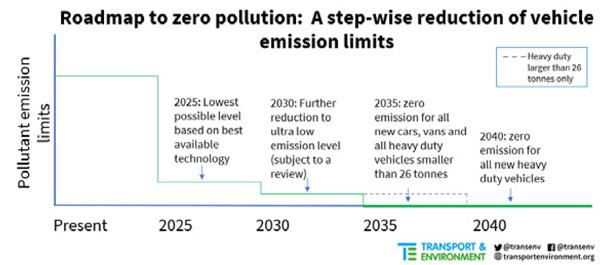
In this area, alongside large European brands Irizar participates in several domestic and European research and development projects for a new generation of vehicles that pollute less. The main lines of research are currently focused on aerodynamic improvements; reduction of weight; incorporation of new technologies and materials, HVAC systems, efficiency of the powertrain, and electrification, renewable fuels, control, and efficiency of all auxiliary components.
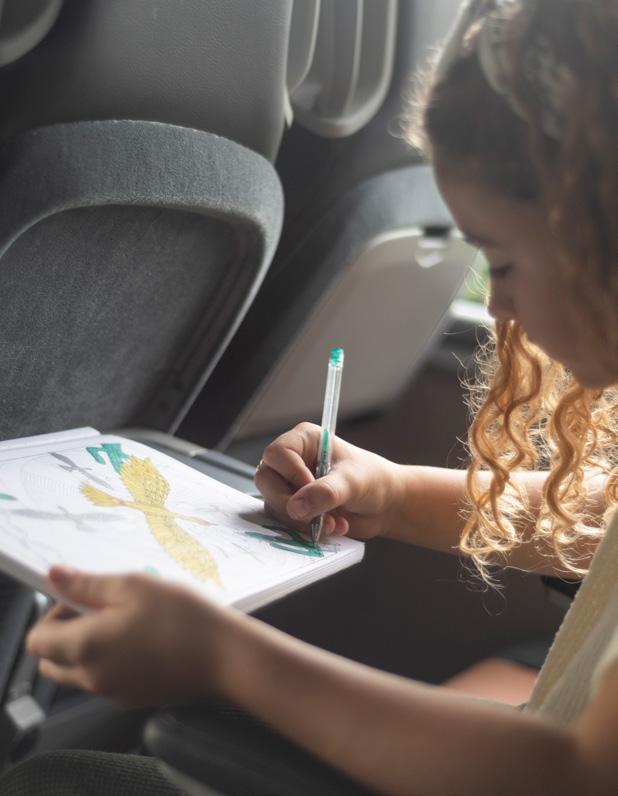
Irizar participates in the LONGRUN project that is centred on long-distance coaches and trucks. The innovations are developed in the areas of electrichybrid drive, motors and after-treatment systems for alternative and renewable fuels, electric motors, smart auxiliary systems, generating and storing energy with a renewable origin and power electronics.

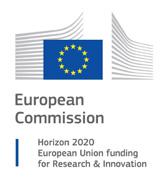
• It started in early 2020 within a consortium of 30 organisations from 13 European Union Countries for developing efficient and environmentally friendly long distance power train systems for heavy trucks and coaches.
• This project was subsidised by the Horizon 2020 (H2020) framework project of the European Union aimed at research and innovation. The primary mission of LONGRUN is to reduce CO2 emissions in the heavy transport sector and contribute with tangible results to the EC review of CO2 emissions standards.
• After doing the test and validation phase for reducing the emissions of the Irizar prototype unit in 2022, the project was successfully finalised in 2023. The hybrid demonstration vehicle provided by Irizar met the goals of the project for long-distance applications, lowering fuel consumption and CO2 emissions between 15% and 30% relative to a reference diesel vehicle.
• The project ended in 2024 with good feedback from the European Commission and it was determined that the parallel hybrid powertrain technology is a technology with a lot of potential for medium and long distance.
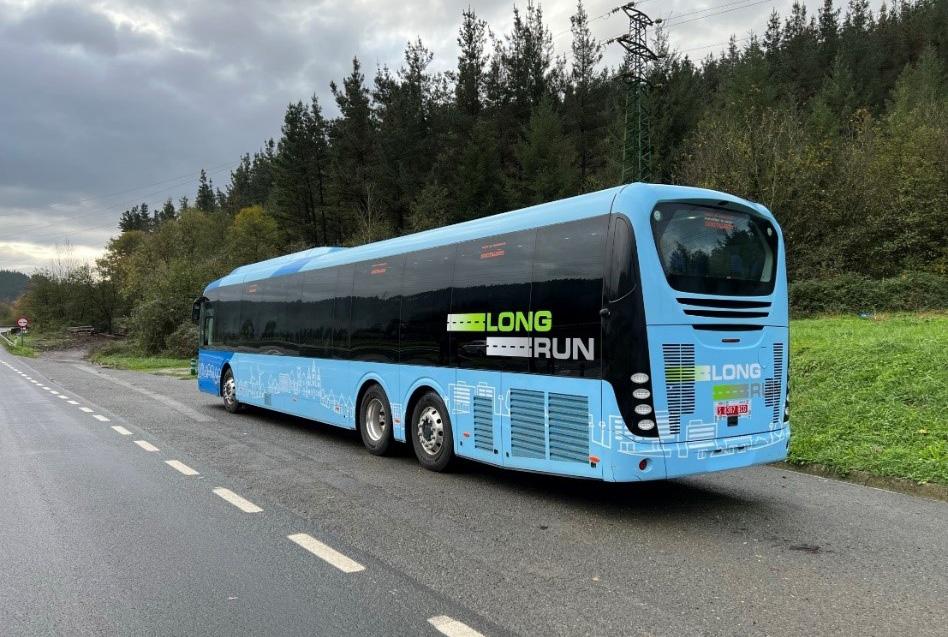
As we mentioned previously, we currently offer a COMPLETE RANGE OF integral, conventional, electric and hybrid VEHICLES always meeting the needs of each customer and we are continuing to invest in alternative technology for the future, such as hybrid technologies with electric autonomy and alternative combustion engines, like biodiesel, HVO, biofuel and natural gas (CNG and LNG).
An extensive range of options covering all market segments, urban and suburban buses and medium and long-distance coaches for both regular and discretionary services and Premium.
We like future challenges, and because of that:
• We have several mobility projects under way with electric vehicles that use hydrogen fuel cells.
• We’re already working on electrifying our intercity and long-distance (class II and III) coaches. After launching the new Irizar i3 electric in 2024, work is being done on developing the NF (normal floor) version.
• We take a strategic position to improve efficiency and reduce emissions for Irizar brand internal combustion vehicles. A show of that is the GEN3 project in 2024, which is discussed in section “3.3.3. Irizar brand integral coaches ”.
• And we’re prepared for when synthetic fuels become a reality.
As you can see in detail in section “3.3. Decarbonising combustion vehicles”, in addition to working on lowering the fuel consumption and GHG emissions of our vehicles through drive technologies and alternative fuels, we also constantly innovate in aerodynamics and coachwork weight.
MORE GHG
EMISSIONS
COMBUSTION Diesel Biodiesel
HVO (hydrotreated vegetable oil)
Natural Gas / Compresses Biofuel (CNG)
Natural Gas / Liquid Biofuel (LNG)
HYBRIDISATION Hybrid
ELECTRIC Electric zeroemissions
ZERO GHG EMISSIONS
HYDROGEN
Electric with range extender (CNG)
Hydrogen with fuel cell
At Irizar, we have spent years relentlessly advancing in research and development in new coach manufacturing technologies and new materials, to be a European leader at the forefront of eco-innovation and eco-design during the entire product life cycle.
Ecological design implies the integration of environmental aspects from the very conception of the product in order to limit its impact on the environment. This integration, based on a global approach, must take into account all stages of the product life cycle and the mechanisms aimed at reducing its environmental impact, identifying technologies, ways to improve the choice of materials, and encouraging the use of clean materials.
Programme under the International EPD based on the following reference standards. UNE-EN ISO 14040:2006 (Environmental management. Life cycle analysis Principles and reference framework), UNE-EN ISO 14044:2006 (Environmental management Life cycle analysis Requirements and guidelines), UNE-EN ISO 14025: 201 (Environmental labels and declarations. Type III environmental declarations. Principles and procedures. and Product Category Rules for preparing Environmental Product Declarations for Public and private buses and coaches (PCR 2016-04).
This Product Environmental Declarations project has been carried out on the Irizar integral i4 model, at 13 metres long, 55 seats, DAF MX 11 E6 diesel engine and ZF robotised gearbox.


VERIFICATION STATEMENT CERTIFICATE CERTIFICADO DE DECLARACIÓN DE VERIFICACIÓN
Certificate No. / Certificado nº: EPD03201
TECNALIA R&I CERTIFICACION S.L., confirms that independent third-party verification has been conducted of the Environmental Product Declaration (EPD) on behalf of:
TECNALIA R&I CERTIFICACION S.L., confirma que se ha realizado verificación de tercera parte independiente de la Declaración Ambiental de Producto (DAP) en nombre de:
IRIZAR, S.Coop. Zumarraga bidea, 8 ORMAIZTEGI (Gipuzkoa) - SPAIN
for the following product(s): para el siguiente(s) producto(s):
Environmental Product Declaration (EPD) for the Irizar i4 integral coach
After more than four years applying life cycle analysis (LCA) methodologies and establishing Product Category Rules (PCR) to assess the environmental profile of combustion and hybrid and electric buses, in 2019 Irizar was awarded the First Environmental Product Declaration (The International EPD System), which makes it the first company in the sector worldwide to achieve this certification.
Environmental Product Declarations (EPD) have been developed in accordance with ISO 14025 and they add a new dimension in the market, given that they enable information to be provided on the environmental performance or scope of products and services. They are created and registered in the context of the Type III Eco-Labelling
In this sense, in addition to the carbon footprint of this coach, we have made a map of its constituent materials (which including, among others, the recyclability and impact on the CO2 emissions of each one.
An EPD declaration provides game-changing advantages for clients and markets, because the coach is evaluated in terms of environmental impact over the course of its life cycle, as well as the energy consumption renewable fossil resources in every stage of the life cycle, and polluting emissions or hazardous substances in manufacturing, in a neutral scientific way. It also evaluates the environmental benefits of the product and environmental management or eco-design systems in the organisation or the way to manage the end of life of the product. Furthermore, it contributes to establishing measures aimed at reducing CO2 emissions and other pollutants of our products, based on the use of materials that are more respectful of the environment, weight reduction, and fuel consumption. Efficient and sustainable driving habits also result in the achievement of these objectives.

IRIZAR I4 INTEGRAL COACH AUTOCAR IRIZAR I4 INTEGRAL
with registration number EPD-IES-0001571 (S-P-01571) in the International EPD® System www.environdec.com)
con número de registro EPD-IES-0001571 (S-P-01571) en el Sistema International EPD® www.environdec.com)
it´s in conformity with: es conforme con:
ISO 14025:2010 Environmental labels and declarations. Type III environmental declarations.
General Programme Instructions for the International EPD® System v3.0.1.
PCR 2016:04 Public and private passenger buses and coaches v2.0.2
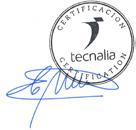

As we had planned, in 2024 we reviewed and updated the EPD for the Irizar i4 integral coach, based on the same standards of reference. The most relevant conclusions, using the total Global Warming Potential (GWP) category as a reference, taking into account the changes that have been made by stages, have the outcome:
• In the upstream they have resulted in a 34% reduction in this phase, going from 0.0006 kg CO2/passenger km to 0.0004 kg CO2/passenger km.
• At the core they have resulted in a 63% reduction in this phase, going from 0.0002 to 0.0001 kg CO2/passenger.
• In the downstream they have resulted in a 14% reduction in this phase, going from 0.0221 to 0.0190 kg CO2 eq/passenger km.
In conclusion, we obtain an impact reduction of 15% for the model i4 integral 2024 in comparison with its reUUnovada version and its adaptation of criteria.
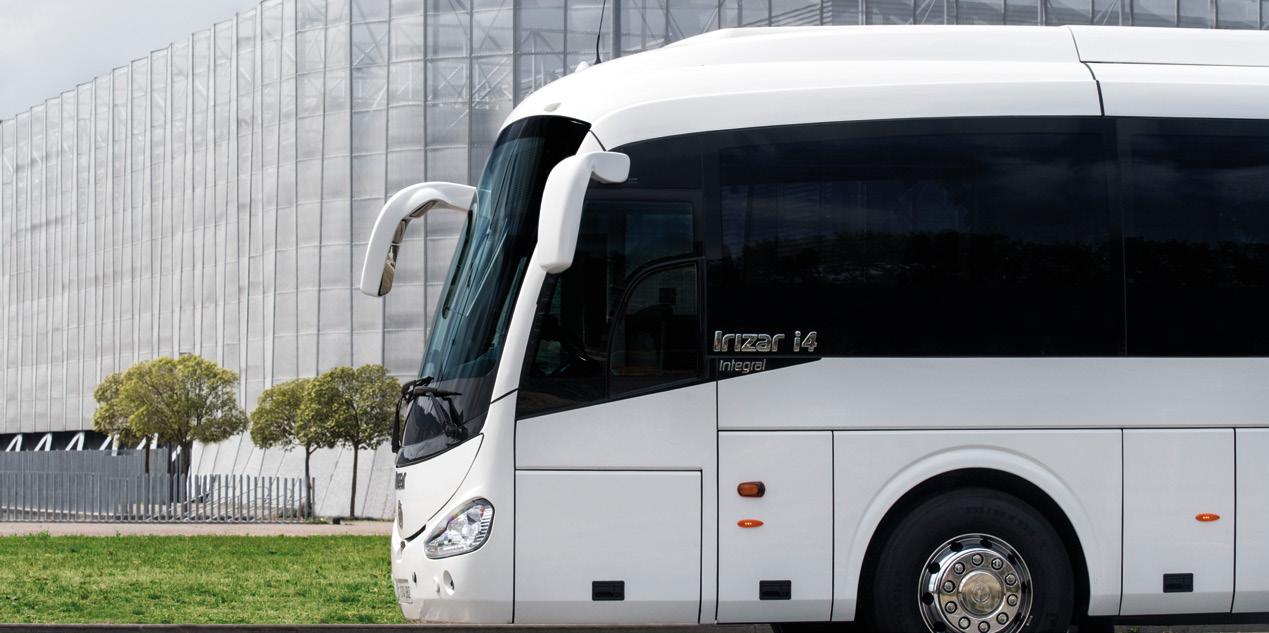
The life cycle analysis (LCA) of another one of our products, the 12m ie bus NG electric bus, the flagship product for the electromobility plant, was begun in 2020 and was done using the following reference standards: UNE-EN ISO 14040:2006 (Environmental management. Life cycle analysis Principles and reference framework) and UNE-EN ISO 14044: 2006 (Environmental management. Life cycle analysis Requirements and guidelines). In 2021, we kept working until we obtained the environmental product declaration (EPD) for the bus, which included calculating the main environmental impacts our product creates during its lifetime, as well as recyclability and recoverability rates for the bus when the end of its useful life arrives.
We did the environmental product declaration (EPD) for the Irizar i6S Efficient integral coach in 2024, based on the same standards and PCR as for the two previous models.
This environmental product declaration (EPD) project has been done on the 12.20 metre long Irizar i6S Efficient integral model with 55 seats, and a DAF TRX E6 (MX11) diesel engine.


ENVIRONMENTAL IMPACT
1 passenger .km
The main conclusions we obtained were:
The total global warming potential (GWP) of the entire life cycle of the coach is 0.0167 kg CO2 eq/passenger.km.
The upstream contributes 1.84% of that impact (0.0003 kg CO2 eq/passenger.km), while the core contributes 0.35% (0.0001 kg CO2 eq/passenger.km).
The downstream is the phase that contributes most to the impact, with 97.80% (0.0163 kg CO2 eq/passenger.km).
The slow charge Energy pack has been designed so the vehicle can travel the maximum number of kilometres and complete the operation with a single daily charge.
We’ve been applying life cycle analysis (LCA) methodologies to the Energy 54Ah y Energy 65Ah batteries since late 2022 so we can measure the environmental impacts associated with their entire life cycle and work on optimising them.
The LCA is done based on reference standards: ISO 14040:2006 (Environmental Management: Life cycle analysis Principles and reference framework) and ISO 14044:2006 (Environmental Management: Life cycle analysis Requirements and directives) and including the following phases:
• Definition of goals and scope
• Life cycle inventory analysis
• Evaluation of life cycle impact
• Interpretation of the results
In 2024, we started working to do the LCA and EPD for the generation of the Irizar electric bus which let us quantify the improvement in the environmental performance of our bus as a result of applying eco-design strategies, like weight reduction or improvements in energy efficiency.
In 2024 we also worked on doing the LCA for the GEN3 batteries addition to an LCA for a model of second-life battery that will be used for static storage after being used in buses.
In 2025, work is expected to be done on the LCA for the FuellCell battery. Consequently, Irizar will have an LCA for more than 50% of their batteries.
Our goal is to keep extending eco-innovation to the rest of the range of Irizar Group vehicles.


CERTIFICADO DE DECLARACIÓN DE VERIFICACIÓN
Certificate No. / Certificado nº: EPD03202
TECNALIA R&I CERTIFICACION S.L., confirms that independent third-party verification has been conducted of the Environmental Product Declaration (EPD) on behalf of:
TECNALIA R&I CERTIFICACION S.L., confirma que se ha realizado verificación de tercera parte independiente de la Declaración Ambiental de Producto (DAP) en nombre de:
IRIZAR, S.Coop. Zumarraga bidea, 8 ORMAIZTEGI (Gipuzkoa) - SPAIN
for the following product(s): para el siguiente(s) producto(s):
I6 EFFICIENT INTEGRAL COACH AUTOCAR I6 EFFICIENT INTEGRAL with registration number EPD-IES-0015587 in the International EPD® System www.environdec.com) con número de registro EPD-IES-0015587 en el Sistema International EPD® (www.environdec.com)
it´s in conformity with: es conforme con:
ISO 14025:2010 Environmental labels and declarations. Type III environmental declarations
General Programme Instructions for the International EPD® System v3.0.1.
PCR 2016:04 Public and private passenger buses and coaches v2.0.2
UN



We're a consolidated industrial project with enormous challenges ahead. The project is based in ethics, transparency and integrity. It's made up of people deeply committed to the clients and innovation is our badge of identity. Out of the conviction that the future will include providing sustainable solutions and our faith in personal talent, we're putting all our effort into becoming the perfect partner to work alongside transport operators in the future.
Public transport by road is, and will be, key to guaranteeing mobility services and meeting sustainability goals. Consequently, as we said above, we continue to believe in collective public transport to reduce pollution from noise and emissions and make possible the connectivity of means of transport for better fleet management and improve information for users and incorporate new technological developments with the goal of increasing passenger safety. We judge this to be the foundation on which to build all the future projects that operators and society demand of us.
We're positioned in all segments of passenger transport, including occasional transport and urban, medium and long distance inter-urban and premium transport. And we're leaders in the sustainable mobility sector. Our commitment to providing high added value to its customers, passengers and citizens is clear in such important aspects as design,
customization, safety, operating cost, technology and sustainability.
Our main strategy is customer satisfaction and loyalty. Consequently, Irizar means, above all, closeness. We work alongside our clients from defining the product and service they need until the product end of life, providing the guarantee of a robust project they can trust. The flexibility to adapt to their needs and personalisation without limit are factors that set us apart to obtain loyalty. To create long-lasting and solid relationships with clients, a high priority is put on collaborating with partners in the long term and making relationships that are sustainable and beneficial for both sides.
Continuing another year along the lines of personalising our products to our clients’ requirements, in 2024, 5% of the vehicles manufactured were for public tenders from different countries, which involved developing different solutions in order to meet the conditions of the tenders. Furthermore, on top of those personalisations, we should add that they were developed on low-emissions chassis, like the hybrid and liquid and compressed natural gas vehicles.
The rest of our production in 2023 centred around long-distance products, where high demand for the Irizar i6S Efficient product stood out. It accounted for 67% of production, which shows the success it is having on the market, despite being a new product.
Like previous years, we continued our meetings with institutional entities to explain different alternatives for reducing emissions in the future. We have been with transportation directors from several autonomous communities, directors of provincial institutions, regional and city governments and, at a national level, the Ministers of Industry and Transport. We have also contacted significant actors in mobility in the EU.
We showed them the technologies available so they could learn about them and take them into account when they launch public tenders.
Within ASCABUS, the Spanish association of manufacturers of bodies for buses and coaches, which we belong to, we shared:
• An analysis of the current fleet of coaches owned by the state,
• its evolution during the pandemic,
• the situation of all of its associates,
• the activities we’ve done with institutions to apply for direct and indirect aid for the sector, and
• medium and long-term perspectives.
We have a very close relationship with CONFEBUS (Confederación Española de Transporte en Autobús), and we share our future strategy for Sustainable and Intelligent Mobility with them. It is the organisation that represents bus transport companies of all sectors (regular, urban, discretional, school, tourist, bus station transport, etc.) and all sizes in Spain. It has more than 30 federated territorial and sectorial organisations and more than 2500 associated companies (including some of our current and potential clients).
Also, fundamentally for Irizar e-mobility, we have a very close relationship sharing challenges and strategies for Sustainable and Intelligent Mobility with the UITP (The International Association of Public Transport).
In 2024 we participated in the Ruta Mexico Forum organised by the UITP. It was an event where the participants discussed the importance of high quality public transport as central to urban and metropolitan mobility. The director of Irizar México participated in the forum, highlighting the importance of public-private collaborations to drive electromobility policies that make a faster transition possible.
Also in 2024, Irizar e-mobility was present at the ATUC conference (association of urban and metropolitan public transport), where the most important Spanish operators are concentrated.
We can also highlight Irizar e-mobility’s participation as a speaker at round table events:
• “The Energy Transformation of Transport as a Lever for Change in the Industry” Where we can highlight that: “We are focused on decarbonisation, electrifying cities and reducing the consumption and emissions of our vehicles” The future will be multi-technology and we are prepared for it. We are still deeply committed to sustainability” The speaking event was organised in the framework of the Global Mobility Call fair at IFEMA MADRID.
• The greencounterVG forum in Vitoria It was an event organised by the DIARIO DE NOTICIAS DE ÁLAVA newspaper where companies, institutions and organisations debated about how to create more sustainable and efficient cities. The Commercial Director of Spain and Portugal for Irizar e-mobility participated in the “Smart Society” round table. “All the steps we’ve been taking in social well-being will let us leave a better society for our children.”
• At the World Bank conference about sustainable transport and mobility, “Transforming Transportation”. It was a conference organised by ICEX, Spain Exportation and Investments and the Economic and Commercial Office, held in Washington. Irizar e-mobility had the pleasure to participate in the round table organised by EMT Madrid with the theme, “Decarbonising Urban Transport: from strategy to fleet technology. The principal agents of change in Spain”, where, among other things “the future looks multi-technology and Irizar is ready for it”, can be highlighted.
For decades our flexibility and high capacity for personalisation and adapting to our clients' needs has made it possible for us to offer a large number of choices geared towards converting premium or high end vehicles into multi-use vehicles.
More and more, vehicles are designed that adapt to your space and purposes where everything is possible, like large living rooms, training and meeting rooms, kitchens, dining areas and leisure, entertainment and rest areas, mobile classrooms, exhibitions, massage spaces, health services, ambulances or mobile libraries. The possibilities are endless.
Clients are looking for functionality and comfort because, in many cases, they spend a lot of time travelling and their coach becomes like a second home. For that reason, in addition to maximum safety, reliability, profitability, comfort, luxury and the latest technological advancements, at Irizar we devote a lot of internal and external resources to designing, developing and making the adaptations needed to meet the demands of a more and more demanding market.
In 2024, Irizar kept a leading position in developing solutions that were special and customised to client requirements. Good examples of that kind of project are the ones done for two cycling teams in France and an i8 with preparations to provide mobile IC services in Jamtland, Sweden.

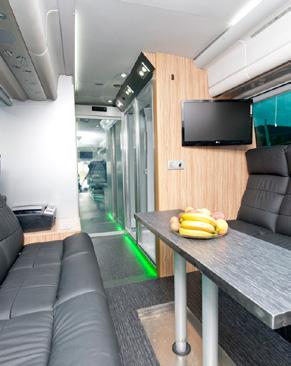
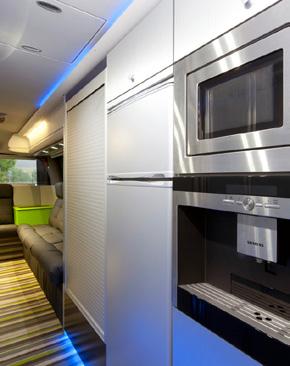
At Irizar we offer personalised solutions designed and created to offer the best service: financing, repair and maintenance contracts and pickup of your used vehicle. We have a help desk in every European country and another central one that answers calls 24h a day 365 days a year. Customers can therefore enjoy close follow-up and advice that translate into optimization of vehicle reliability and availability.
The coaches have remote diagnostic systems to anticipate and plan management of spares and repairs. Likewise, they monitor the driving style of the vehicles, helping our clients to define good practice patterns for reducing fuel consumption and environmental pollution.
Aware that fuel is one of the greatest expenses for operators, we make every effort to reduce consumption and the entire TCO (total cost of operation). The reputation of the Irizar brand makes the residual value of our vehicles among the highest in the market, which improves the TCO of the vehicles.
We maintain close direct contact with our clients through the repairmaintenance and original spares programmes that contribute to improving vehicle efficiency, reducing stoppages, lowering TCO and lengthening vehicle life cycles.
We launched a website for second hand vehicles in 2021 so the vehicles our clients want to renew can have a second use by being reused. We put used vehicles from all our distributors on the website, which helps give a second life to the vehicles.
Their opinion and expectations are fundamental
We have the involvement of passenger transport operators that integrate their vast experience and knowledge, as well as their needs and expectations, in our innovation projects, making them participants in the design and development of future solutions.
At the same time we maintain alliances for keeping regular clients, we work on increasing our client network by bringing in new clients.
We are also striving to involve ourselves with our customers to share opinions and experiences, and discuss their sustainability concerns (economic-governance, social, environmental) and their vision of the future. Our goal is to achieve a productive dialogue that benefits both parties.
The customer, integrated in internal processes
At Irizar, we have Customer Relationship Teams deployed all over the world and Customers Line Teams in the internal processes of the organisation. The objective of all this is to channel their needs to guarantee the development of products and services of the future.
The customer relationship teams maintain direct and close daily relationships with them, making them the main source of information and knowledge as regards their current and future needs. This knowledge flows and is shared throughout the organization through different channels and processes.
The dynamics of the Customer Line Team (ELC) is one of the most important at Irizar. Each ELC is made up of all the teams of Irizar people involved in operations until they deliver each bus to the customer: customer relations, purchasing, supplies, product and process engineering, production, quality... All of them are responsible for complying with or improving the expectations of customers who, in turn, are naturally included in this process.
We held quarterly meetings of the Customer Line Team (ELC) for decades and up to 2022, except in 2020 and 2021 because of the Covid-19 restrictions. A quarterly review of daily activities in reference to the annual goals, presented by members of the Management Team and other managers from different teams and operational areas, was done at the meetings. The CEO used the opportunity to spend time with everyone in the organisation and give them the chance to channel and express the concerns and issues that affect them as workers. All dissatisfactions, suggestions or proposals are collected so they can be analysed and action can be taken to resolve them.
As we described in detail in chapter 4 about “People”, after the organisational changes we went through at Irizar, since November 2022 the meetings have been renamed. They are now called “Building the Irizar of today and tomorrow”, with the goal of leading the re-dynamisation of the organisation to catalyse the development of the brand, technology and sustainability. They are also led by the CEO and other members of the Management Team participate actively, DRIVING the re-motivation of the organisation to bring about an improvement in the organisation’s performance and capabilities to take on new challenges (taking sustainability into account as well as technological evolutions in mobility and digitalisation), that are going to bring about very deep technological changes in products, services and ways of working. It is all focused on the present and future needs of clients, passengers and citizens, alongside the other stakeholders.
We have a very close relationship with our customers. Through meetings, communication and marketing campaigns, we keep them constantly informed about our new products and services and also about the initiatives and results achieved in other sustainability issues.
We launched the new Irizar website in 2023, and it has a specific section about Sustainability.
The monthly quality forum for product quality, is made up of the heads of the Senior Management of the organisation (CEO, General Director, Industrial Director, Director of Production, Commercial Directors, Purchasing Manager, Product Innovation Manager, Product and Process Engineering Managers, After Sales Manager, Quality Manager, and other Commercial Equipment and Industrial Department personnel). It’s an open forum, in which all Irizar people are invited to participate.
In addition to exhaustive monitoring of the quality and environmental objectives set out in the annual plans, a review of the corrective actions of the main incidents presented by customers in different markets is also carried out. The most significant incidents are transferred to the quality forum after being evaluated in the after-sales forum. The conclusions and decisions taken at these meetings are shared with the commercial teams, after-sales team and Quality Managers of the other Irizar Group external plants in a constant search to share learning and synergies.
There has been a notable improvement in product quality that we have gradually been observing in recent years and that was reflected also in
2025. The improvement is due to several key factors:
• Management of the communication channels / analysis of warranties of our technical services: Optimising the way we process and analyse guarantees, which lets us provide better technical support and resolve problems in a more efficient way
• Managing supplier guarantees: Optimising complaint, documentation, support and communication processes with the industrial area, which has resulted in a better collaboration with our suppliers and higher quality of the products we receive.
• Managing communication and analysis of market incidents: We have implemented more effective systems for communicating and analysing incidents that happen in the market, which lets us act rapidly to resolve problems and improve our products continuously.
Except during the pandemic period, we did previous client surveys and we will consider doing it in the future for continuous improvement: We wanted to check if we are meeting their expectations in terms of products and services and Sustainability (ESG) and consequently improving those aspects that customers consider weaker and promoting the aspects they judge to be most important for the future.
We have in-person after-sales training systems for drivers and repair/maintenance technicians for Irizar vehicles. The training is also complemented by online training on iService (the Irizar after-sales web platform).
Adapting the kind of driving to the kind of vehicle and route is essential. We are still teaching all the eco-driving courses that our customers demand, examining the impact that optimal driving habits have on fuel
consumption savings and, consequently, on environmental impact. Objective comparisons of fuel consumption analyses carried out on monitored vehicles show considerable reductions from efficient driving. These courses not only contribute to reductions in operating costs, but also help achieve safer and more efficient driving techniques. With the continuous technological advances that Irizar is implementing in its vehicles and its influence on the safety - comfort - efficiency of the vehicle, training is highly valued by the operating companies and their drivers.
In addition to training, since 2019 “efficient driving manuals” have been included in all coaches along with vehicle documentation.

Irizar at FIAA / presentation of the class II electric i3 and new generation of integral vehicles (Madrid) - October 2024
At FIAA, the Irizar Group is showing their high capacity for innovation and technology by presenting their new line of efficient and sustainable vehicles, as well as a plethora of new technologies that will be key to the future of mobility and decarbonisation
Irizar and Irizar e-mobility showed four latest generation Irizar vehicles: The new class II electric Irizar i3, a new generation Irizar i6S Efficient unit, an i6S Efficient Hydrogen unit, and an Irizar ie tram urban electric vehicle.
All the important innovations insofar as technology, design, sustainability and consumption reduction of these models will be discussed in the following sections about each one.
Sustainability, as a fundamental pillar of our strategy for the future, goes beyond the scope of transport. To show our firm commitment, the FIAA stand had an exclusive space for sustainability where our commitment to decarbonisation could be seen, in addition to the complete range of Izir products, our circular economy brand made up of products created using surplus materials from our production. For the first time, we’re presenting a range of products that have gained a second life through recycling our waste material. They’re products,
including backpacks, wallets, laptop cases and a lot more, made by hand in collaboration with various brands and associations within this project, which focuses on inclusive and responsible production. You can find more details in chapter 6 about the environment.

Irizar at Intermobility and Bus Expo (IBE) / presentation of the class II electric Irizar i3, and a new generation of integral vehicles (Rimini, Italy)
- November 2024
At the IBE international fair the Irizar Group presented the new electric Irizar i3 class II vehicles, as well as the new generation of even more efficient integral vehicles.
Irizar and Irizar e-mobility showed four latest generation Irizar vehicles: The new class II electric Irizar i3, a new generation Irizar i6S Efficient unit on a Scania chassis, a three axle i8 unit, an Irizar i6 unit and an Irizar ie tram urban electric vehicle.
All the important innovations insofar as technology, design, sustainability and consumption reduction of these models will be discussed in the following sections about each one.
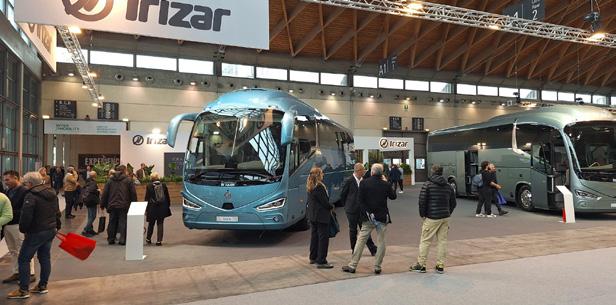
Irizar at Persontrafik (Gothenburg- Sweden) - November 2024
Once more, the Irizar Group showed their high capacity for innovation and technology at the Persontrafik fair in Gothenburg. They showed three latest-generation Irizars: One Irizar i8 that will be delivered to Interbus, and two Irizar i6S Efficient, one for Mohlins Bussar and another one for Vänerbuss. All of them were on the Swedish highways after the fair.
All the important innovations insofar as technology, design, sustainability and consumption reduction of these models will be discussed in the following sections about each one.
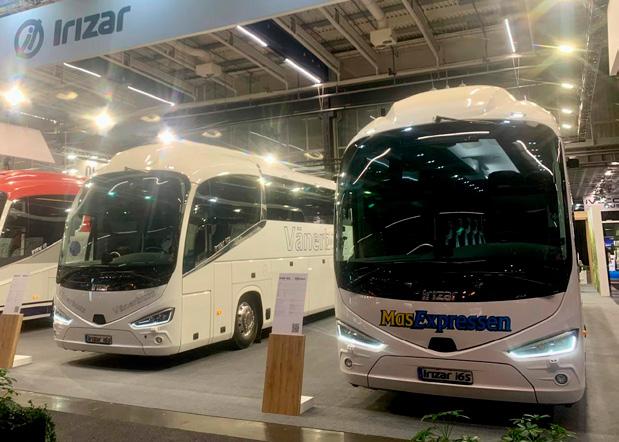
Irizar at Euro Bus Expo (Birmingham – United Kingdom) - November 2024
Once more, the Irizar Group showed their high capacity for innovation and technology at the Euro Bus Expo, in Birmingham.
They showed three latest-generation Irizar vehicles: One Irizar i8, one latest-generation Irizar i6S Efficient, and one Irizar ie tram electric vehicle. All of them hit the roads of the United Kingdom after the fair.
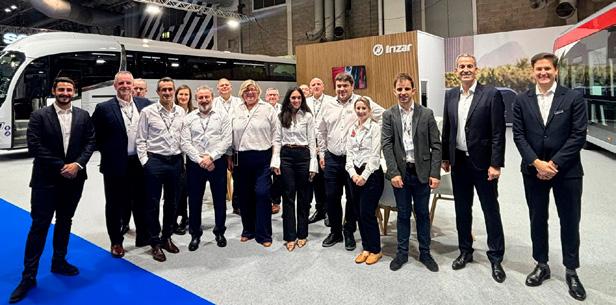
November 2024
Once more, the Irizar Group showed their high capacity for innovation and technology at the Autocar Expo fair in Lyon. Irizar showed two latest-generation Irizar i6S Efficient vehicles.
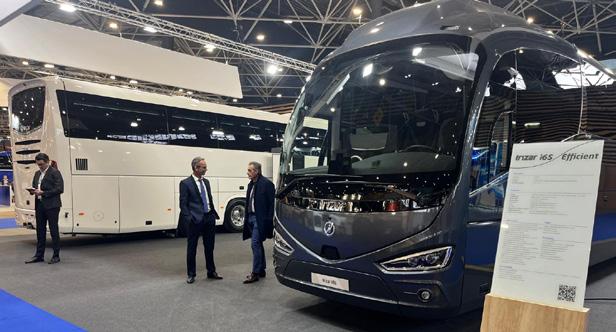
e-mobility at Mubil Mobility Expo (Irún) - April 2024
Irizar e-mobility participated in the fourth edition of Mubil Mobility Expo, which has become the professional meeting point for the value chain of sustainable transport understood as clean, accessible, safe and connected.
They showed all their new products and the technological advances they have been implementing for sustainable urban mobility, like the new generation of buses with improved safety that integrate the new GSR2 ADAS standards, and the renewed generation of batteries with lower consumption and a longer range.
Also, like other editions, attendees could try a 12 metre long Irizar ie tram. All the characteristics of this model will be discussed in the following sections.
In addition, at the fair Irizar e-mobility will participate in a round table discussion about self-driving vehicles with the theme “Decoding the New Era of Transportation: the future is self-driving”, where they will show advances and experience in the field of automated vehicles in relation to the projects they are currently involved in.
The stand at this edition had an exclusive space for environmental sustainability where our commitment to decarbonisation could be seen, in addition to the complete range of Izir products, our circular economy brand, made up of products created using surplus materials from our production. You can find more details in chapter 6 about the environment.
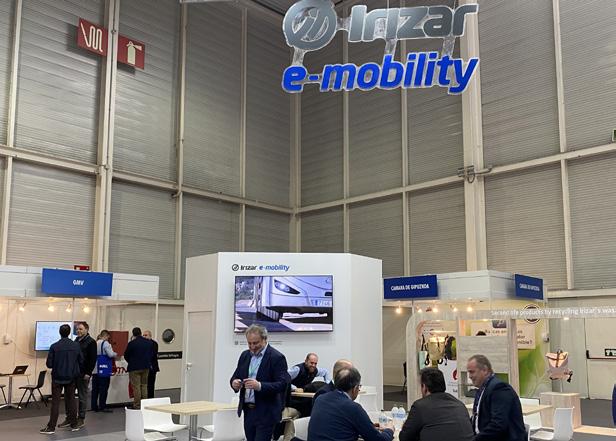


Irizar e-mobility at European Mobility Expo 2024 (Strasbourg) - October 2024
European Mobility Expo is an biannual event focused on public transport, where the main companies and bodies in the sustainable transport sector get together. Irizar e-mobility was present at the fair with a 12 metre long Irizar ie tram, the company’s flagship vehicle.
Since the beginning of the year, the company is delivering their new generation of electric buses to their clients. The new generation has improvements that we will discuss in the following sections.
Irizar a other bus and coach fairs - 2024
TRANSEXPO (Kielce - Poland): Irizar and Irizar e-mobility participated in this fair via our distributor Wanicky and our partner SCANIA.
Mobility Move (Berlin): Irizar e-mobility participated in this fair with our 12 metre long, 100% electric and zero-emissions Irizar ie bus vehicle.
Thun-Expo (Switzerland): Irizar e-mobility participated in this fair.
Journées AGIR (Montpellier – France): Irizar e-mobility participated in this fair.
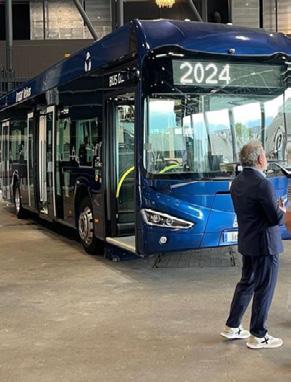

In this section, in addition to the options for contributing to decarbonising internal combustion vehicles that were already there in previous years and that we will address later (integral coaches and natural gas coaches), we are proud to highlight the new generation of coaches that are efficient, sustainable and profitable.
As we mentioned in section 3.1. “Race to Zero”, in addition to working on lowering the fuel consumption and GHG emissions of our vehicles through using alternative fuel and drive technology, we also innovate constantly in aerodynamics and chassis weights, depending on the functionality the vehicle will have.
• On long distance coaches the proportion is: 70% aerodynamics and 30% weight
• On short distance or intercity coaches the proportion is: 40% aerodynamics and 60% weight, because it increases braking
The outcome of our innovations along those lines were released on the market in 2022: the Irizar i6S Efficient and the Irizar i4 lightened. These innovations will be extended to the rest of our product line.
3.3.1.
In May 2022 Irizar presented a new generation of the Irizar i6S model that is more efficient, sustainable and profitable. With the new Irizar i6S, consumption and emissions have been reduced up to 13% weight is down to 950 kg and the aerodynamic coefficient is 30% lower. That makes it a latest generation vehicle designed to provide maximum efficiency to operators, the best experience to passengers and a commitment to sustainability.
Irizar thus showed its firm commitment to its customers and society, to whom its products and services provide high added value whilst not ignoring fundamental elements like design, personalisation, safety, reliability and sustainability.

Aerodynamic coefficient improved by 30%
Excellent aerodynamic performance is the key to this new generation of coaches. Part of the front of the vehicle and roof has been modified. In addition, the curve of the windscreen and the rest of the front windows have been worked on to reduce air resistance to the minimum.
Furthermore, the Irizar i6S Efficient has the option to replace the rearview mirrors with digital vision cameras with the two-fold goal of providing wide-angle vision in any weather conditions and contributing to aerodynamic savings. These modifications provide substantial improvements in the driver's direct and indirect field of vision, which increases the safety of the vehicle, especially in low visibility situations.
Another major challenge was reducing weight. The weight of every component was analysed and reduced. And the weight of the vehicle has been redistributed with the goal of improving weight distribution. High strength steel and lighter composite materials were used instead of traditional structural materials.
Thanks to those innovations we've been able to increase the space for passengers to improve ergonomics and comfort. We've also reduced noise and vibrations to the minimum. The cockpit has likewise been redesigned to be more comfortable and ergonomic and have a larger field of vision. The new line of Hispacold climate control devices is more compact, efficient and lighter. That lets us make the travelling experience in this new Irizar as comfortable as possible.
The Irizar i6s Efficient is an efficient coach that is connected, safe and designed for the sustainable mobility of the future.
It has a new multiplexed architecture and communications protocol that can provide self-diagnosis services in real time. Irizar technology makes preventive maintenance and online monitoring for remote diagnostics possible.
With the connectivity systems, all the data and usage statistics for the vehicle are stored in the cloud to maximise profitability, optimise route planning and minimise maintenance costs.
The Irizar i6s Efficient has the most advanced active safety systems for preventing accidents. Moreover, the vehicle has a reinforced structure that improves its response to torsion, flexing and head-on collisions, also improving its passive safety. We've increased and improved the driver's field of vision. In addition, the digital camera system gives a panoramic view in all conditions and situations, even at night or in the rain.
Having the electronics in the central console, the accessibility of the controls and the virtual dashboard let drivers interact with the vehicle and quickly obtain all the information they need and administer the entertainment and comfort system.
Like all Irizar buses and coaches, the i6S efficient has been developed using the most advanced technology in design, materials, components and production processes. Fatigue and durability testing was done on it at one of the most prestigious research institutions in the world to ensure its reliability and quality.
Exhaustive aerodynamic studies and tests using simulators and measurements in real circuits have shown an exceptional 30% improvement in the aerodynamic coefficient and a reduction of up to 13% in consumption and emissions. Those demanding tests are proof of the solutions that make the i6S Efficient a market leader in consumption and sustainability.
As always at Irizar, we adapt to the specific demands of each market and client. And we offer the possibility to personalise vehicles with endless configurations for either right or left hand driving.
The i6S efficient is prepared for diesel, biodiesel, natural gas and biofuel, and it's designed to be adapted to future zero-emissions models. The versions adapted to each market will be presented in every country in 2022.
With the goal of maximising passenger comfort, in 2024 Irizar developed adjustable headrests for the seats in the Irizar i8 and Irizar i6 plus. Passengers will have an improved travel experience with this new option.
In addition, the Irizar i6 plus seat has the option to include an all-aged three point seat belt for more safety and comfort for travellers of all ages and heights.
The award received in 2022 was a recognition of the work done by the people at Irizar on what has been one of the largest innovation projects in recent years. It was a push towards our firm goal to tackle the new challenges we are facing today and make Irizar a key actor in the sustainable mobility of the future.

At Busworld 2023, and later at FIAA and Rimini 2024, we presented a new generation of Efficient vehicles with an additional reduction in consumption of up to 5%, an improvement in weight optimisation, and that also meets all the new GSR and cybersecurity standards (R155 and R156).
It is an improved line of vehicles that focuses on efficiency and has a new cockpit with a new steering wheel, updated keys and a new version of the dashboard with an updated design and the option to night mode for driving. At the same time, the new HMI for the Irizar i8 and Irizar i6S models come with a renewed design and a more ergonomic and adapted integration of driver needs. In addition, the digital camera system available for this range provides better visibility under any weather conditions.
In addition to the hydrogen version, the Irizar i6S Efficient is currently available with diesel, biodiesel, natural gas and biofuel technology.
We’re not saying it, our clients are.
The fatigue trials and durability tests done at Idiada, one of the most prestigious applied research institutions in the world, guarantee their efficiency, reliability and quality.
In 2023, we reached 1000 Irizar i6S Efficient units on the road around the world in the most demanding operating conditions, with notable results in reliability and consumption.
The Irizar i6S Efficient has an especially significant presence in countries like Spain, France, Italy and Portugal The significant value added by lower consumption and the innovative design of the new Irizar i6S Efficient are key to Irizar’s geographic expansion into regions like Scandinavia, Germany and the Baltic states, and we keep expanding into markets around the world.
3.3.2.
The Irizar i8 Efficient, the flagship of our range.
The Irizar i8, the brand’s flagship is a leader in comfort, design and innovation.
Following our strategy of technological innovation and development, in 2024 the Irizar Group presented their line of sustainable buses at the ExpoForo international fair in Mexico, which included the worldwide launch of the Irizar i8 Efficient.
The new version will incorporate all the improvements of the Efficient line. It provides important innovations in comparison with the previous model, in terms of technology, sustainability and consumptionemissions reduction, making the Irizar i8 an even more sustainable vehicle.
The new Irizar i8 Efficient has a weight reduction of 550 kg, a 25% aerodynamic improvement, and a reduction in consumption and emissions greater than 8%. In addition, it has other updates from the Efficient line, for example the digital camera system.
Today, of all the Irizar vehicles on the road around the world, the Irizar i8 has a special presence in Mexico, where it is the leading vehicle for long-distance VIP services. That is why the new Irizar i8 Efficient had its worldwide launch there.
This has been possible thanks to the cooperative work between the Irizar teams in different centres. The projects were steered from the industrial area of Irizar S. Coop. with the goal of extending the Efficient line to more models and other group production plants on other continents.

In February 2022 Irizar launched new generation of the Irizar i4 model coach that is more efficient, sustainable and profitable. The Irizar i4 is a versatile vehicle that is also a perfect intercity coach for school or company transport or discretionary use. The different versions of this vehicle (H, M, L) strike a perfect balance between accessibility and luggage compartment capacity, according to the needs of each operator.
The new generation Irizar i4 coach now offers significant new features that mainly focus on a major reduction in weight and optimal per axle load distribution. The result is a lightened vehicle with a weight reduction of up to 955 kg, depending on the configuration chosen. It is a highly efficient, sustainable and profitable coach that because of its structural redesign and the development of new technological solutions and innovative optimisations, provides significant fuel savings up to 5% and, consequently, improvements in the reduction of CO2 emissions.
The implemented solutions include the use of high-strength steel and composite materials to replace traditional structural materials, as well as new seats, with weight optimisation and greater space between them, thus enhancing passenger comfort and experience. The innovations implemented have made it possible to offer new seat distributions that provide versatility and maximum adaptation to client needs. As
important safety measures, a radar system can optionally be installed in the central part of the front. The Irizar front headlights with FullLED option offer up to 30% more light capacity. The rest of the lighting elements are also LED technology.
This latest generation Irizar i4 is available with diesel, HVO and B100, hybrid and biofuel or natural gas (CNG or LNG) propulsion systems, depending on whether it is an integral Irizar model or a combination of chassis and bodywork. Thus, the Irizar i4 provides a wide range of configuration options and advanced safety systems as well as excellent ergonomics and accessibility for the driver. And it has become a highly efficient, sustainable, profitable and multi-purpose vehicle that, without a doubt, fulfils metropolitan and inter-city service or school and company transport demands.
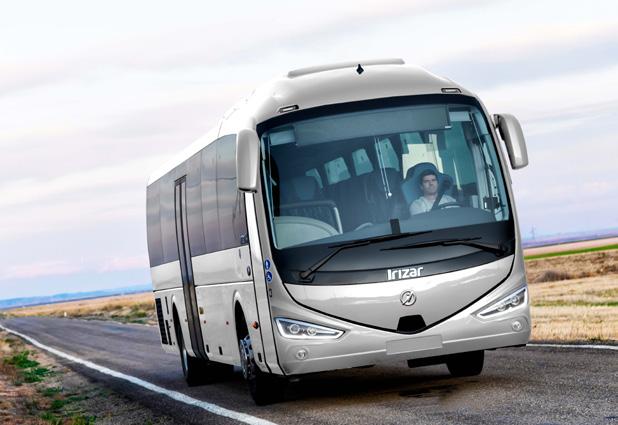
3.3.4. Integral Irizar brand coaches, new generation Efficient even more efficient
The best representation of the Irizar brand are our integral buses and coaches. And we only supply engines that comply with Euro 6E emissions. Supplier tests of the powertrain in these vehicles show very competitive results in performance, efficiency and sustainability.
Creating integral coaches (diesel, biodiesel and HVO) is a substantial improvement that translates into:
• a 6% reduction in fuel consumption and CO2 emissions
• on-demand power technology that reduces consumption more, increases the life of components and lengthens maintenance intervals
• improved manageability, distribution and weight reduction
• reduction of noise and vibration
• Lower repair and maintenance costs: Improved access to the engine compartment and long service intervals (without changing oil filters, etc.)
• Increased passenger capacity and comfort
• Maximum comfort for the driver
• Smart technology that makes predictive driving possible so driving can be adapted to the topography and condition of the road and the most intelligent gear changing strategy can be used. And as a consequence of all this: it increases the residual value of the vehicles and improves the Total Operational Cost (TCO) by 5%.
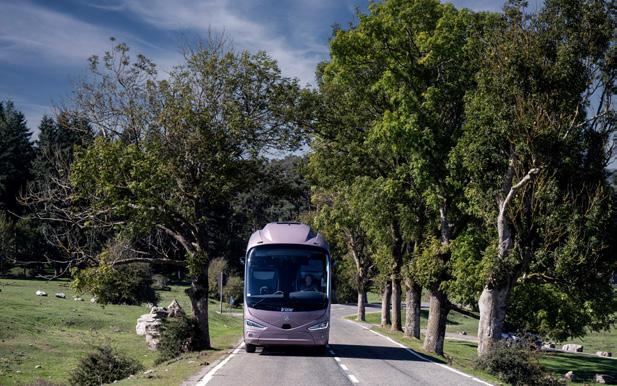
Since July 2024, we are offering a new generation of the GEN3 powertrain that has multiple improvements over the previous version:
• Engines: New engines that can improve fuel consumption and have reduced weight. Better engine braking performance
• Transmission: A new transmission that can reduce fuel consumption and CO2 emissions, and has improvements in software and comfort
• New Electronic Systems: New safety and security systems, ADAS, GSR, connectivity and cybersecurity
• New Smart Controls in the Cockpit: New keys on the dash and steering wheel, light controls, steering wheel cams and an electric hand brake
• NVH: Noise, vibration and harness (comfort): New clutch and new motor brackets to improve the coach’s comfort Complete dynamic study of the vehicle
• Weight Reduction: The Gen3 powertrain has been reduced around 135 additional kilos, which can be added to the reduction achieved in the i6 Efficient and the previous powertrain.
• Standardisation of Layouts: Components are laid out the same way regardless of the coach model to ensure repetitiveness, quality and simplification in after-sales
• New Third Axle Steering System: A new more reliable and efficient system that makes standardisation possible
• Powertrain Aerodynamics: Improvements to the aerodynamics of the motor enclosures-encapsulations in search of improved aerodynamics and optimal recirculation of hot air from the motor.
The new range of integral Efficient vehicles launched in 2024 surpasses all the limits of efficiency achieved in the last two years and it has an additional reduction of consumption.
The new generation also meets all the GSR2 and cybersecurity (R155 and R156) standards. It is an improved line of vehicles that focuses on efficiency and has a new cockpit with a new steering wheel, updated keys and a new version of the dashboard with an updated design and the option to night mode for driving. At the same time, the new HMI for the Irizar i8 and Irizar i6S models come with a renewed design and a more ergonomic and adapted integration of driver needs.
In addition, the digital camera system available for this range provides better visibility under any weather conditions.
In 2020 Irizar, as a result of its effort to offer innovative and sustainable mobility solutions, incorporated compressed natural gas (CNG) and liquefied natural gas (LNG) into its range of renewable fuels.
The environmental benefits provided by the coaches with this technology include:
• Reducing emissions of CO2 around 25%, NOx up to 60% and particles above 98%
• They have better thermal performance than diesel and vibration and noise emissions are also minimised between 4-5 dB.
• Insofar as the operating cost (TCO), the reduction is estimated to be up to 35% depending on the difference between the cost of petrol and of diesel.
• The maintenance cost remains similar to that of a conventional diesel vehicle.
The vehicles have a range of up to 500 km in the CNG version and up to 1000 km for the ones with LNG technology. The driver has a gas control screen to comply with all safety protocols. This is used to detect leaks and monitor the start-up of the water additive aerosol fire extinguishing system. These vehicles comply with Regulation R/66.02 even with 700 kg of extra weight on the roof and with the thermal safety and mechanical safety protocols, in accordance with Regulation 110.
We are still committed to hybridisation with a line of hybrid vehicles striving for better performance:
• The capacity to drive in zero-emissions mode to anticipate the zero emissions zone needs of cities (SDG 11), and
• expand the hybrid range to long-distance vehicles
As the outcome of our collaboration alliance with various chassis brands, we launched new hybrids on chassis with Euro6E internal combustion engines that are homologated to run with fossil diesel, biodiesel and HVO, on the market in 2020. These coaches offer:
• A 30% reduction in consumption in comparison with a conventional diesel coach
• which lets our clients have significant fuel savings (7000 litres/year)
• a proportional reduction in CO2 emissions (up to 30%) Estimating a 25% fuel savings, it would be a reduction in CO2 emissions equivalent to 304,000 kg during its useful life (70,000 km/year for 15 years), and
• Less noise and a great driving capacity
In addition to that, it all contributes to lowering the TCO.
Thus, we are expanding the range of ecologically and economically sustainable solutions for our clients.

3.5
DECARBONISATION:
Irizar Group electromobility, zero emissions
Irizar e-mobility: a leader in the sector
In 2011, we started our electromobility business line, under which, we combined the knowledge and experience of the entire Irizar Group. Our strategic commitment to innovation in sustainable mobility for the future and the transformation of cities. We intend to contribute to improving
the quality of life and health of citizens with more efficient, cleaner and accessible transport, and making urban environments more sustainable.
Irizar e-mobility has become a European leader in turn-key mobility projects. Large cities have relied on their electromobility solutions, and there are hundreds of electric Irizar buses driving around their streets and neighbourhoods. Furthermore, the company has entered the international market. In Mexico, for example, 32 ie trams are already in operation.
Irizar e-mobility is committed to turnkey electromobility solutions with the aim of offering sustainable, efficient, accessible, safe and connected public transport. Hence, its active commitment to the environment, the well-being and health of people and to the creation of better urban environments with a special emphasis on reducing emissions, noise pollution, and increasing efficiency, in low consumption that has an impact on lowering costs.
The challenges, now generating success in the implementation of electromobility solutions of the Irizar Group, serve as experience on this path towards sustainable and smart urban mobility for the future.
At Irizar we provide personalised integral electromobility solutions for cities, both in regards to manufacturing zero-emissions vehicles and manufacturing and installing the main infrastructure systems needed for charging, drive systems and energy storage. We implemented all
of that using in house technology and with the Irizar guarantee and quality of service.
The range of products includes 10, 12 and 18 metre urban buses that have been on the road since 2014 in several cities.
All with the goal of providing operators with the additional advantage of having a single interlocutor for all phases of the project, including detailed consulting, integral vehicle service and after-sales service, and customised repair and maintenance (R&M).
Our product range includes 10, 12 and 18 metre city buses, which have been operating since 2014 in various European cities, as well as other electric vehicles for cities like the Irizar ie truck, all of which are zeroemissions.
Our buses are characterised by being exceptionally quiet and not generating emissions but also for their accessibility and modern and innovative aesthetic design.
The entire range of buses uses our latest generation batteries. The Irizar e-mobility battery portfolio provides an optimal solution for both slow charging and ultra-fast opportunity charging operations.
We can provide up to four positions for interoperable charging points using a combo 2 hose, in addition to a charging solution using an inverted pantograph or one mounted on the roof.
This year we delivered our 1000th bus It’s a significant number, considering our company was created barely eight years ago.
In the words of Iñigo Etxeberria, the General Director of Irizar e-mobility, “1000 vehicles is more than a number for us. It means effort, teamwork, and commitment by all the people who are part of this great company. We’re a medium-sized company with local production that competes in an international market with major brands. That figure drives us and motivates us to keep growing and evolving in the sector.”
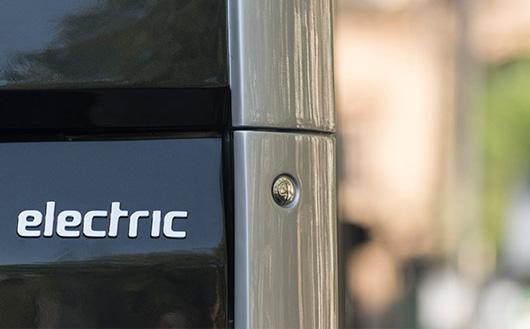
Irizar ie tram
A tram on the pavement that leaves no one indifferent

The Irizar ie tram is a 100% electric, zero-emission bus with the appearance of a tram that combines the large capacity, ease of access and internal configuration of a tram with the flexibility of a city bus. Available in 12 and 18 metres
Its futuristic design calls attention to itself wherever it goes, and it’s an icon of urban electromobility. You can see it on the streets of London, Barcelona or Madrid, etc. Its design fits perfectly into modern cities that strive for more liveable and environmentally friendly environments.
The Irizar ie tram won the “Muévete Verde” prize in the “Decarbonising Transport category”.
In September 2024, the vehicle was awarded with the “Muévate Verde” prize by the city of Madrid and the Municipal Transport Company of Madrid in the “Decarbonising Transportation” category. Its innovative design has made possible the success of the first Bus Rapid line in Madrid, which was implemented by the city government and the EMT.
Muhammad Yunus, Nobel Peace Prize laureate on an Irizar ie tram in Mexico
The universal recognition Yunus has received by winning the Nobel Peace Prize was for founding Grameen bank, which gives microcredits to poor people, and fundamentally women. The Irizar ie tram was displayed at the Smart City Expo Latam Congress in Mérida at the ADO Mobility stand.
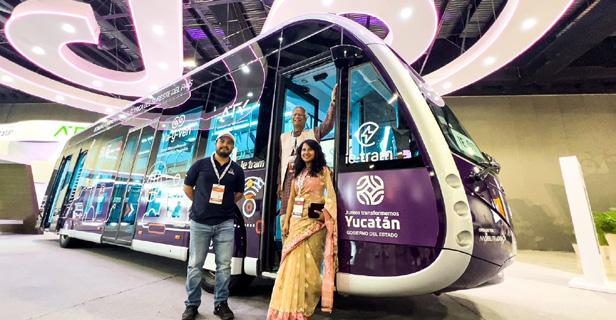
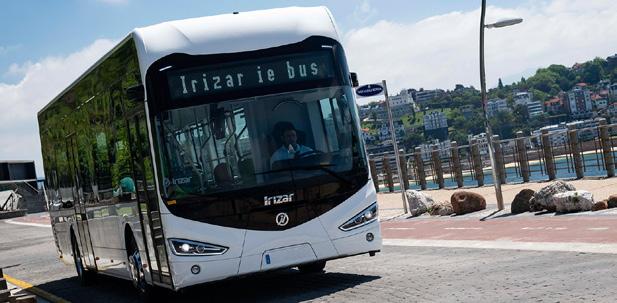
The bus’s meticulous design inside and out makes a more attractive, reliable and safe vehicle. Available in 10, 12 and 18 metres
The front end, with a more pronounced and elegant touch, is increasingly similar to the aesthetic features of Irizar products. When it comes to the interior design, although the standard version has a more conventional specification, some of the Irizar ie tram options may be incorporated, including large windows, side lighting or screens above the windows, among others.
18 m Articulated Bus – Eliminates 120 tons of CO2 from the atmosphere every year CO2
The electric buses have an estimated carbon footprint of 8.45 gr CO2 eq/km.p. (kilometre travelled and passenger). Compared to a conventional combustion bus, emission of around 800 tons of CO2 is prevented during its entire useful life.
This figure is the difference between the emissions associated with the electricity consumption of batteries and burning fossil fuels.
86% reduction in the carbon footprint compared to a conventional diesel bus.
The electric technology makes the noise of the combustion engine disappear, which means there are no exterior sound emissions to annoy pedestrians when the bus is stopped and starting (0 dBA). When driving, noise emission is reduced by 20%.
A study conducted in Sweden in 2014 by the Swedish company Koucky & Partners A.B and entitled *“Quieter buses socio-economic effects” concludes that replacing 240 conventional buses by electric buses reduces noise pollution by 1.3 dBA, which translates into an annual socio-economic saving of €52,650 per kilometre, with a reduction in costs of 27%.
Irizar ie truck Versatility and power
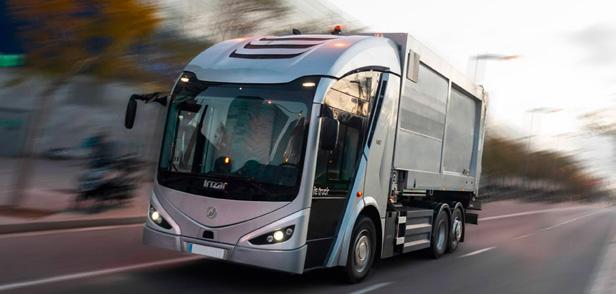
The global vision of the electrification of cities and the search for synergies with freight infrastructures together with the technological capability created in the Group has allowed us to extend our range of products to industrial vehicles for cities.
The Irizar ie truck is a 100% electrical truck which responds to different market needs and enables it to move around cities and urban environments without atmospheric or acoustic pollution. The result is a cleaner city and more sustainable environment for citizens. It will initially be used for collecting municipal waste, however it is highly versatile and can have multiple uses: last mile delivery, dry food, refrigeration, crane, dump truck, etc.
The currently existing versions include zero-emissions trucks or ones with a range extender for using outside the city if more range is needed.
The Irizar ieTruck is not a conventional truck: Its aesthetics, which break with the aesthetic concepts of the current trucks, recalls the Irizar brand’s product lines. The main attributes of this product, designed to operate in urban environments, are its smooth and innovative aesthetic design, operator safety and ergonomics, technology and flexibility for adaptation to market needs.
Mass production started in 2021, and in 2022 we made the first deliveries of vehicles produced for urban waste collection in various European cities. In 2022, the European sales network for the truck was also strengthened in countries such as France, Germany, Switzerland, Austria and Spain.
We’re very happy with its behaviour, because in conversations we have had in several cities the drivers have expressed their satisfaction with the lorry because of:
• The ergonomics, driver’s seat and cabin
• The ease of driving and manoeuvrability
• Accessibility
• Its silence, without the noise of other drive systems
Until 2022 it was manufactured at our Ormaiztegi facilities. But, since the start of 2023 it is manufactured in a new production plant near the parent plant that has capacity for 60 trucks a year.
The Irizar ie truck has significant R&D activity associated with several projects we participate in, such as:
1. The PERTE VEC "CAPITAL" project led by the Irizar Group (see “ Innovation, it’s in our DNA” in section 3.1)
2. The global e-WASTE project, financed by the SPRI, that we participated in recently with a consortium with other companies and research centres to improve mobility in cities. That project ended in 2022 and was focused on providing cities with a novel environmentally sustainable waste collection service based in research into new electromobility techniques. The outcome of that project was a new hybrid truck that uses intelligent algorithms to ensure its 100% electric operation in urban centres. New batteries for the ie truck have been developed in parallel. In addition, it has facilitated the acquisition of the knowledge needed to deploy charging points for heavy industrial vehicles domestically and internationally.
3. The NextETruck European project that we participated in as part of a consortium of 18 organisations, which included several companies from the Irizar Group. The goal of this project, which was started in 2022 is to reduce consumption, increase range and increase battery recharging power in order to decrease charging times for future electric trucks.

The IMPACT the project seeks is to:
• Build concepts adapted to regional medium freight transport with at least a 10% increase in energy efficiency in comparison with reference electric vehicles from the highest range currently available
• Develop new fleet management and charging infrastructure tools to achieve the total electrification of zero-emissions electric vehicle operation, while safeguarding energy efficiency
• Prepare demonstrations of fast-charging concepts and infrastructures
• Provide new business models to increase acceptance by end users and promote adoption of the project's solutions in the market
• Contribute to climate goals, especially for local air quality
In 2024 the project was primarily focused on developing solutions. In 2025, we expect to implement them on a truck and do the necessary tests and validations.
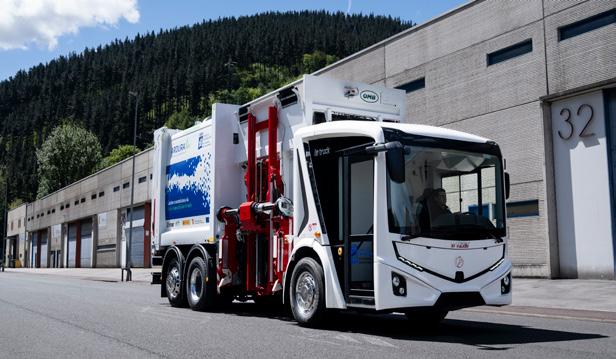
In 2023 we presented the new generation of the zero-emissions Irizar ie truck that is lighter, more versatile and more sustainable. The new version was exclusively designed to meet the needs of cities and urban environments. Among its advantages, we can highlight:
• Lower consumption, emissions and weight: The knowledge and experience gained from the first generation of the truck has enabled the effective redesign and optimisation of the new version of the truck, which is up to 2000 kg lighter in the 6x2 version and around 1400 kg lighter in the 4x2 version. That leads to an important reduction in fuel consumption and emissions, as well as a much lower TCO for the operator or end customer.
• In addition, the new (lower and shorter) cabin design improves versatility, optimising for all possible uses even more. Furthermore, it is still the vehicle with the lowest access height on the market, (with a single 370 mm step), with which safe transport for the driver and their companions can be guaranteed.
• As with the entire Irizar range, safety and full compliance with ISO 16121 and VDV 234 remain essential when finding the best position for the driver, where ergonomics and visibility are paramount for safe driving.
• Designed for different industrial uses with Irizar technology The new lower and shorter cabin further reinforces the idea of flexibility and versatility, optimising integration with any kind of body to the maximum. The Irizar Group is currently able to provide vehicles for all kinds of containers, including for dry and refrigerated food and material distribution, fuel transport, street cleaning and sanitation with tank trucks, transport for people with reduced mobility, tipper or normal flatbed trucks with or without a crane, etc. And all of that is done with the Group’s own technology that has been used for years
on the brand’s electric buses. The Irizar Group's technological capacity and its collaboration with the best research centres have enabled the development of this top-level industrial vehicle, with turnkey services and solutions, positioning the Irizar Group at the forefront of European technology. This vehicle is fitted with the Group's third generation higher energy density batteries for more on-board power using less volume and weight. As a result, this new generation battery stores up to 512 kWh and provides up to 400 km of range, depending on the use.
Latest-generation batteries were added in 2024, including the Gen3 batteries manufactured and developed by Irizar e-mobility and the LFP batteries supplied by Irizar e-mobility. The use of one technology or the other is conditioned by the use of each truck and its functional and technical requirements.
In 2024, work was also done on incorporating ADAS devices to comply with GSR2. The systems or functionalities that are new or updated are:
• AEBS: Advanced emergency or automatic emergency braking system (update)
• LDWS: involuntary lane change warning (update)
• BSIS: detection and warning of obstacles in the blind spot (new)
• MOIS: detection and warning of pedestrians or cyclists in front of the vehicle (new)
• ISA: intelligent speed assistant (new)
• Reverse detection
• DDAW: drowsy driver detection and alert
• Breathalyser lock
• Cybersecurity requirements
Irizar presented the new class II integral electric Irizar i3 for the first time at the FIAA fair in 2024. Irizar’s electromobility range has reached the intercity sector with a completely new design for a silent zeroemissions vehicle that expands the new Efficient range.
The new electric Irizar i3 has a completely cutting edge design. With a more aggressive front and sharper lines, it is aligned with the rest of the range of Irizar vehicles. It is a low entry vehicle completely designed for the sustainable future of the intercity environment: silent and zero-emissions. In addition, all the structural materials in this new design have been analysed. Thanks to the use of lighter and stronger components a 1000 kg weight reduction has been possible. Its range stands out, which is up to 400 km with a single daily charge, to facilitate operations of all clients. In addition, it maximises seated and standing passenger capacity and keeps the same performance and features as the internal combustion vehicle.
The dashboard has been redesigned, and its features have been improved and driver comfort has been maximised.
The vehicle meets the highest standards of safety in the framework of the new GSR2 regulations by including advanced components, like cameras and radar, to ensure driver and passenger safety. We comply with the R155 and R156 European regulations for cybersecurity management systems and vehicle software updates. We can thus guarantee that the systems work as expected, and we can mitigate the security risks that arise.
Furthermore, the electronic architecture of the vehicle makes it possible to do data analysis for detecting incidents and implementing preventive maintenance measures.
The bodywork of the new electric Irizar i3 is available in an integral selfsupporting configuration and with different electric chassis. In addition, the new Irizar i3 platform is still available with the rest of the drive technologies (diesel, biodiesel, HVO, hybrid and gas).
A platform has been designed that can withstand the forces created by the batteries on the roof, guaranteeing a good travel experience and comfort for passengers and drivers alike.
The Irizar i3 electric has superior performance and power comparable to a traditional internal combustion vehicle, guaranteeing a good travel experience and comfort for passengers.
Batteries are the cornerstone of an electric vehicle. The range, price, charging speed and useful life of the vehicle depend on them.
Our energy management and storage solutions, developed and manufactured in our Aduna, Gipuzkoa plant are designed to cover the needs of today’s European market and to offer the best solution for each of the operator’s requirements.
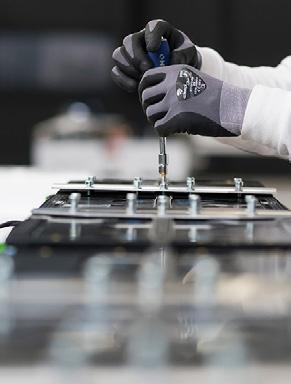

We provide different modular solutions based on Lithium ion technology:
• Slow charge (Energy Pack): Designed so that the vehicle can travel the maximum number of kilometres and complete the operation with a single daily charge. Its design enables us to find a balance between vehicle range and number of people.
• Rapid charge (Nano Pack): The perfect coupling of vehicle range and charging capacity. Ideal for mixed operations, where the vehicle has sufficient range to operate during peak hours. The load can be both slow and fast.
• Ultra-fast charging or opportunity charging (power pack) The solution for a 24/7 operation with charging of up to 600 kW.
In 2022, we worked on expanding the products we have on the market with several kinds of batteries with the goal of giving clients a total solution adapted to the operations the vehicles will do.
3.5.5.
The Irizar battery pack is a highly recyclable product. Using a controlled process, the handling of all their components is ensured, in addition to having the possibility of being used for other purposes. At the same time, Irizar is constantly searching for and researching more and more efficient products with the least possible environmental impact.
Irizar provides a second life to batteries under a partnering agreement with Ibil that lets the batteries we install in our electric buses to be reused after their useful life in the buses is over as energy storage devices. And the power electronics associated with that use can also be reused in the charging infrastructures Ibil is developing and deploying at Repsol service stations, among other places.
Irizar e-mobility, in collaboration with the Cidetec Technology Centre, participates in projects related to the analysis of the second life of batteries, which are used in urban electric buses. It is estimated that these batteries will reach their end of life at an approximate SoH (State of Health) of 80%. They must then be replaced and repurposed for other uses with less demanding electrical specifications, such as stationary applications including electrical storage for photovoltaic systems or electric vehicle charging systems. In parallel, the issue of recycling is also being addressed in collaborations with several European companies, to ensure final treatment of each component, controlling each process for safety and environmental aspects.
For urban electric buses, the service life of batteries can reach up to 1015 years, depending on daily loads and the high powers to which they are subjected. After this time, the batteries must be replaced so that the vehicle maintains its original functionality. The end of the first life, however, does not mean that the batteries have lost all their charging capacity. So, far from discarding the batteries and in service of their commitment to the environment and the circular economy, sustainable reuse in charging station storage applications will be introduced for stabilising energy demands when vehicles are charged at high power.

The first charging station for electric vehicles with second life batteries from Irizar e-mobility

As an outcome of the collaboration agreements with Ibil, the first charging station for electric vehicles developed in conjunction with Respol that uses energy storage using recycled batteries from Irizar e-mobility started operating in 2021. The 50 kW charging point was installed in a Repsol service station on the N-I road where it goes through the city of Tolosa in Gipuzkoa.
It is a project that also had the collaboration of Ingeteam, Cidetec and Gureak The latter company employs people with disabilities from Gipuzkoa and they carried out the entire industrial assembly of the storage module. The project also had support from the Basque government and the Provincial Government of Gipuzkoa through the Hazitek and Smart Mobility Industry R&D programmes, respectively.
This technological and industrial development simplifies and facilitates the installation of 50 kW charging points in locations that do not have
enough electrical power or where the cost of investment in the grid makes other alternatives infeasible.
These are the main advantages this project provides:
• It makes it possible to install quick charging points (50 kW) in places where it would otherwise not be feasible because of a lack of sufficient electrical power or where, even if it is viable, the technical difficulties of connecting to the grid would require an excessive increase in investment.
• The power of the grid needed to provide services is reduced by 70%. A 50 kW quick charging point can thus be put into operation using only a 15 kW grid connection.
• They can be installed almost anywhere because of the small footprint of the storage module, which is less than a square metre.
• Infrastructure operating costs can be lowered significantly, by up to 50% primarily due to needing a lower power service.
• It provides a second life to electric bus batteries and promotes sustainability and the circular economy.
The technical difficulties of installations in places where installing electric charging points is ideal in terms of mobility, like service stations, can be overcome with an innovative solution that provides range and efficiency to the charging system and it also integrates with local distributed generation and self-consumption. Installing this charging station is another step forwards in Irizar e-mobility's commitment to the circular economy.
We are currently embarked on a project for giving batteries a second life with which several UBPs from the market are being used to
manufacture a large energy accumulator to be installed at an electric bus charging point in the client’s garage, where the batteries came from. Connecting the accumulator to solar panels in a later phase is being considered to maximise the potential environmental benefits of the project.
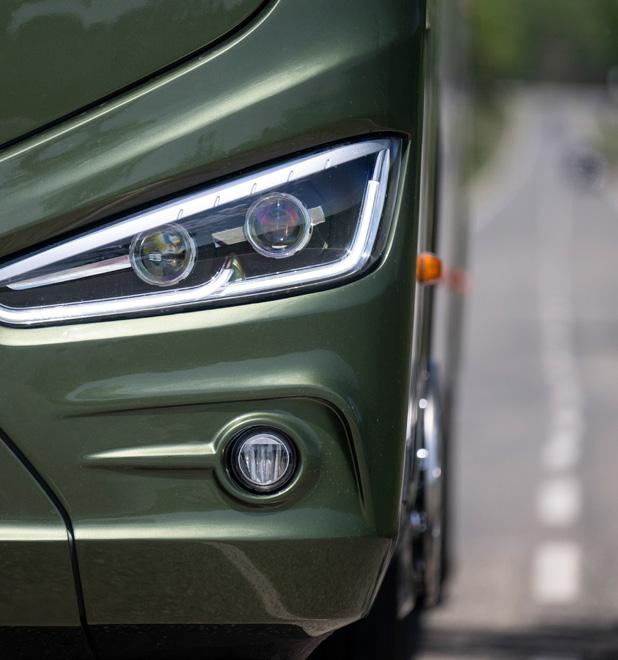
3.5.6.
In addition to manufacturing zero-emission electric vehicles for their use phase, our focus is also on reducing CO2 emissions and other pollutants throughout the life cycle of our electric vehicles. We focus our efforts on optimising the efficiency of three key aspects that contribute to the bus's global environmental impact: the drive system and batteries, the raw materials used and the management of all the components to the end of its useful life The components used comply with the European Union REACH (Registration, Evaluation, Authorisation and Restriction of Chemicals) regulation, which addresses the production and use of chemical substances and their possible impacts on both human health and the environment.
In addition, we have also modified our method of manufacturing buses, prioritizing the ability for components to be removed and recycled, changing the traditional welding system with a new method based on modular screw-in of the aluminium structure, with vehicle recyclability rates greater than 90% and recoverability rates around 97%, in accordance with standard ISO 22628 “Road vehicles. Recyclability and recoverability calculation method”. That data was obtained from the Environmental Product Declaration done in accordance with the ISO 14025:2010 and PCR 2016:04 standards for public and private buses and coaches, and it was audited and verified by an external and independent third party.
Our charging solutions are interoperable. They adhere to the interoperability standards set forth in ISO 15118, DIN70121, OCPP 1.6 CE mark, EMC. 61000-6-2, 61000-6-4, IEC 61851, IEC 61000
We offer a range of smart charging options to provide solutions to the different conditioning factors clients face in terms of power limits, as well as space and operating restrictions.
• In-depot charging. Available from 50 kW to 150 kW in outdoor and indoor models Up to three vehicles can be charged simultaneously with these chargers.
• Pantograph in depot With this solution, we’re making it possible to completely automate slow charging in garages by using pantographs. This alternative reduces the presence of cables on the floor and, therefore, improves the safety of the operators.
• Smart charging system. This is a custom solution that efficiently manages all the charging conditions/restrictions in the depot. It identifies the different charging needs of a fleet to optimise the total power required.
• Opportunity charging. Recommended when the vehicle has a reduced range and needs to charge during journeys and can be operational 24/7. The power of the chargers varies between 450 kW and 600 kW for both pantographs mounted on the roof and inverted pantographs.
In conjunction with Jema Energy (an Irizar Group company), Irizar participates in the ASSURED project (smart and fast charging infrastructure for large vehicles). This project addresses "the integration of electric commercial vehicles into the fast-charging infrastructure" of the Green Vehicle work programme. A consortium of 40 participants from 12 EU member countries will carry out the work. The general goal of ASSURED was to analyse the needs of cities, operators and end users to determine the characteristics and requirements of the new generation of heavy vehicles (like buses), medium load trucks and light vehicles for operating in urban settings. Thus, we managed to obtain results for cost improvement, developing the new generation of modular high-voltage charging systems for electric vehicles and developing innovative charge management strategies. Thanks to the ASSURED project, we enabled the possibility of charging electric vehicles using an inverted pantograph.
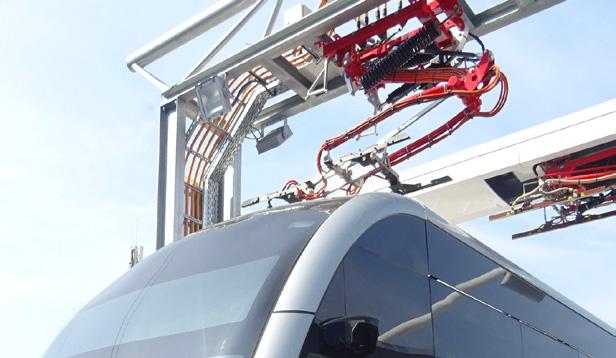
3.6
Green hydrogen as an energy vector
3.6.1. Long distance electric coaches with green hydrogen fuel cells
Because Innovation is in our DNA, we continue developing new generations of coaches with cutting-edge technical solutions to provide maximum energy efficiency and performance, allowing operators to reduce fuel costs and CO2 emissions. Other attributes such as the safety, availability and reliability of the vehicle, as well as comfort, accessibility and connectivity for passengers are also important.
In this context, in addition to keeping promoting and strengthening the electromobility division we're continuing our long distance electric coach project based in green hydrogen fuel cells that:
• Guarantee zero carbon dioxide (CO2) emissions
• It has a range that guarantees service in class III vehicles.
• It does refueling in times equivalent to diesel technology, around 1520 minutes.
• It has attributes similar to conventional vehicles in regards to passenger and luggage compartment capacity.
These projects are strategic priorities for Irizar, which is firmly committed to becoming a benchmark in sustainable mobility and promoting the energy transition and decarbonisation to achieve a climate-neutral society.
It is not common for Class II and Class III coaches powered by fuel cells to be on the market. Consequently, having that kind of vehicle would be a competitive advantage for providing long distance zero-emissions vehicles.
Strategically, the Irizar Group is committed to battery and fuel cell technologies in order to achieve zero emissions. The customer will be able to choose between the battery or fuel cell technology that best meets their needs. The Irizar Group’s short-term technological road map includes developing and manufacturing coaches, especially vehicles that travel long distances between refuelling stops and are propelled by hydrogen fuel cells.
• We successfully ran a hydrogen fuel cell on a test bench in 2022.
• We manufactured and put our first coach (the Irizar Hydrogen i6S Efficient) into operation in 2023. And we presented it for the first time at the Busworld fair (as we mentioned in the section “Meeting us at international fairs” section), where it attracted a large audience of participants.
o The Irizar Hydrogen i6S Efficient has a range of up to 1000 km and minimal charging times of around 20 minutes. Consequently, the way our clients operate will not be changed and they can continue their existing routes and schedules. In addition, it can run in 100% electric mode for short times, if required.
o The efficiency and high durability of the vehicle’s main components can also be highlighted. The batteries will stay with the vehicle for its entire useful life. And the fuel cell will need maintenance, without replacing components, after around 30,000 hours of operation, depending on the kind of routes and use.
• In 2024, we did more tests with the coach in a real setting, showing the viability of the technology for long-distance operations, in addition to planning later commercialisation of the product in this platform and others.
After its presentation in 2023 at Busworld, FIAA became the scenario for presenting the hydrogen vehicle domestically in 2024. It’s a pioneering project and a show of Irizar’s firm commitment to offering a complete range of zero-emissions vehicles for both long and short range. And it’s also a milestone along our path of decarbonising the complete range of vehicles.
The first Irizar Hydrogen i6S Efficient has already been certified under the most demanding European standards. It has a range of up to 1000 km and optimised charging tiames around 20 minutes. Consequently, the way our clients operate will not be changed and they can continue their existing routes and schedules. In addition, it can run in 100% electric mode for short times, if required.
It is currently in an advanced phase of testing a different typology, and the vehicle is showing high performance in terms of reliability and range. The accumulation of experience with and knowledge of this technology will be key to shaping the future hydrogen range, which is

already in the development phase and will be available on the market in 2026.
• The future range of hydrogen vehicles that currently includes the Irizar i6S and Irizar i4 models will have substantial improvements over the first version, among which we can highlight the larger baggage compartment and passenger capacity, a longer range and lower weight.
All of that is part of the CoacH2 project that is subsidised by the Basque government.
The COACH2 project: “Solutions for decarbonising long-distance passenger road transport using a fuel cell drive system” has been financed by the SPRI of the HAZITEK 2021 programme.
The goal is to lead the long-distance zero-emissions coach market with research projects that will determine the drive, storage and structure solutions for the vehicle. That lets the Irizar Group manufacture a new long-distance coach with hydrogen fuel cell propulsion.

We share our advancements in the hydrogen powered coach development project in the framework of the Basque Hydrogen Corridor (BH2C) which is discussed in chapter 5. Alliances and others in Europe.
To a lesser degree, we are also making progress with the hydrogen coach in PERTE VEC "CAPITAL" project led by the Irizar Group (see “Innovation, it’s in our DNA” in section 3.1).
We also participate in the HYSTORENEW project for exploring green hydrogen opportunities related with energy storage using hydrogen for the purpose of facilitating decarbonisation and integrating renewable technologies. This project was started in 2022 under the auspices of the Centre for Industrial Technological Development (CDTI) in the framework of the CIEN projects. In this project work is being done on putting a coach into real tests in Madrid in late 2025, with Alsa as the operator.
The general goal of the project is to research different lines of work and show the viability of using hydrogen buses on intercity routes by manufacturing a new metropolitan coach with hydrogen cell propulsion in collaboration with companies, SMEs and research centres.
The i6S Efficient Hydrogen won the 2024 Coach of the Year award in Spain. The event brought together businesspeople from the sector, members of the main industry associations and institutional representatives.
This is the ninth time Irizar has won the prize. In addition to the past acknowledgements for the Century, Irizar pb and Irizar i6, in 2015 they won the Coach of the Year award for the first time with the 100% electric Irizar i2e. 2016 was the year of the double award: the Irizar i8 coach and Irizar Group's 100% electric bus were named 2016 Spanish Coach of the Year and Environmentally Friendly Industrial Vehicle of the Year. The Irizar i6S also received the award in 2017. In addition, the Irizar i6S Efficient, the most efficient coach in Irizar’s history, won the 2024 Coach of the Year Award in Spain.
“At Irizar we want to be a key actor in the sustainable mobility of the future. To achieve that, we’re focusing all our efforts on decarbonisation and reducing the consumption and emissions of our vehicles. We’re certain that the future will be multi-technological. And the Irizar Hydrogen i6S Efficient, alongside the rest of the range of technologies available for our buses and coaches, is proof of that.”, notes Imanol Rego,
CEO of the Irizar Group. “It’s a pioneering project that puts Irizar back at the technological forefront on the path to the sustainable mobility of the future.”, adds Mikel Pérez, Irizar Commercial Director for Spain and Portugal.
The Irizar Hydrogen i6S Efficient is the first zero-emissions H2 coach in use in Europe. This project shows Irizar’s firm commitment to providing a complete range of zero-emissions vehicles for short and long distances. And it’s a milestone in our progress towards the Sustainable Mobility of the future.
With the Irizar Hydrogen i6S Efficient, Irizar is once again at the technological forefront in their commitment to intelligent, connected, zero-emissions and multi-technology mobility.
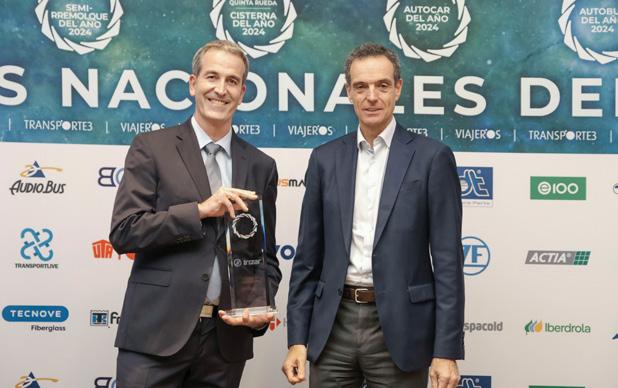
We started the H2TRUCK project for urban hydrogen vehicles in 2022.
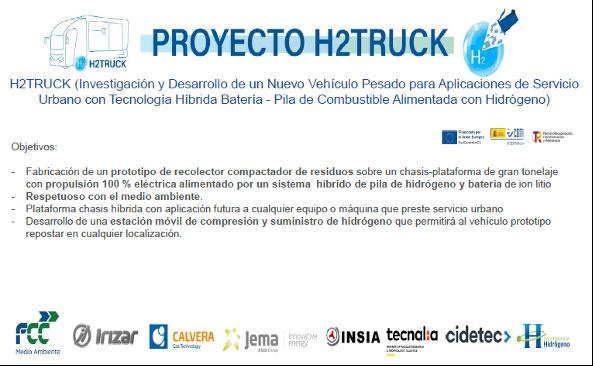
The project, called H2TRUCK for short, has been developed jointly by Irizar and FCC Medio Ambiente. It has had state recognition and support through the Sustainable Automotive Technology Programme (PTAS) in the framework of the subsidies granted by the Centre for Industrial Technological Development (CDTI) and backed by the Ministry of Science and Innovation within the Recovery, Transformation and Resilience Plan by the European Union.
The vehicle was presented worldwide in November 2024 in the framework of the 2024 Smart City Expo World Congress held in Barcelona.
The first application of the platform has been developed for a collection truck with a latest-generation side-loading body. The prototype vehicle is already in operation, and has been in work tests for a few months, with an H2 battery that makes it possible to do waste collection services without polluting emissions.
Josu Letona, Irizar ietruck project manager, highlighted that, “The hydrogen battery is going to mitigate the main inconvenience of the current purely electric vehicles with intensive work, in other words, the balance between range and productivity. Because, in the cities with more intensive work in two or three shifts back-to-back (like Barcelona, for example), the range and charging times for pure electric vehicles is a limitation. However, that inconvenience is resolved with the hydrogen battery technology platform we have developed, that provides a very good balance between useful charge, range, vehicle manoeuvrability and charging times. In summary, a significant improvement has been achieved in the efficiency of heavy municipal equipment.”
In 2024 we did tests with the truck in several cities with FCC: Goierri, San Sebastián, Madrid and Barcelona. In 2025, we kept doing tests, for the time being all in Madrid, but it will return to Barcelona and other new cities.

The Hydrogen Irizar ie Truck recognised at the 2024 World Smart City Awards
The hydrogen Irizar ietruck was the winner of the World Smart City awards in the Energy and Urban Environment category for their “Urbanservice H2-cell chassis” project developed in conjunction with FCC Medio Ambiente in the framework of the 2024 Smart City Expo World Congress held in Barcelona.
The innovative equipment presented consisted of a heavy vehicle chassis-platform for urban service applications driven by a hybrid system with a hydrogen fuel cell and lithium-ion batteries, with a low forward panoramic cab, which can be used for all urban service activities. It was the winner in competition with several very high-level projects.
3.7.1. Passenger safety comes first
Avoiding problems on the road is a strategic demand for Irizar vehicles. We invest aggressively in technology and innovation starting in the design phase in order to be leaders in the field, because we want to guarantee maximum levels of safety for drivers and passengers. https:// bit.ly/sistemas-seguridad-irizar 3.7

All Irizar brand models meet passive safety standards and have the most modern active safety systems to ensure stability and minimise risk in unforeseen circumstances.
Highlights include stability control (ESP), adaptive and predictive cruise control (ACC + PCC), advanced emergency braking systems (AEBS), involuntary lane change (LDW), detection and monitoring of tire pressure (TPTMS), full LED headlights, driver fatigue detector (DFT) and optional predictive shifting (PS), as well as video surveillance for image recording and anti-theft device. On the electric and hybrid buses we can highlight the AVAS (Acoustic Vehicle Alerting System), which is an acoustic warning system that alerts pedestrians and cyclists that a vehicle running in electric mode is nearby.
These active safety technologies also include the possibility of remote download of driver and vehicle cards and audible alerts for pedestrians in the case of silent buses and coaches.
For DSM (Driver State Monitoring), a system that detects the condition of the driver (presence, drowsiness and mobile phone usage) is installed and it reports any incident detected to the driver and, optionally, the operator.
We do awareness raising campaigns at schools so young people can learn better safety habits. And we provide continuing education to fire departments and civil protection groups to instruct them about the best way to stabilise coaches and components with risk so they're able to intervene with the agility necessary to best perform extraction manoeuvres.
For all Development projects we are adopting the ISO 26262 Functional Safety standards, which are the most demanding standards required for solutions involved assisted driving and higher levels of automated driving. That lets us provide advanced driving assistance systems in the safest way for our clients, passengers and also for pedestrians.
All our vehicles are equipped with the most advanced active safety technologies on the market in order to help, warn and assist drivers and avoid risky situations. We also offer the possibility of training on best driving practices in order to minimise distractions and contribute to safer, more efficient and more reliable driving.
Continuous developments and new active safety systems, specially designed in order to avoid critical situations, making driving increasingly safe:
• TPMS: Tyre Temperature and Pressure Monitoring System
• ABS: Anti-lock braking system
• ASR: Anti-Slip Regulation - Traction control system
• EBD: Electronic Brakeforce Distribution
• EBS: Electronically-controlled Braking System
• ESC: Electronic Stability Control
• Roll and stability tests
• ECAS: Electronically Controlled Air Suspension
• ACC: Adaptive Cruise Control
• AEBS: Advanced Emergency Braking System
• EBA: Extended emergency brake assist EBA
• Downhill speed control.
• Hill start assist
• MOIS: Moving Off Information System
• BSIS: Blind Spot Information System
• ISA: Intelligent Speed Assist
• ReIS: Reversing Information System
Drivers come first: Because driver safety, comfort and ergonomics are important.
• In the new generation of Irizar coaches, driver comfort has been improved through the adaptability the steering wheel and seat, optimised visibility in the rearview mirrors and the ability to regulate air conditioning vents independently.
• In short, these features are a way to pamper drivers, making their jobs easier and creating a sense of well-being that gets passed on to improved safety for all passengers.
• The dashboard area is especially ergonomic and has been designed to maximise driver satisfaction. The instruments and navigation screens are placed strategically to ensure easy reading, and the placement of all controls is based in ergonomic principles so they are easy and intuitive to use.
• Handling for all systems has been radically improved through the use of a joystick, quick access buttons to menus and a colour touch screen. The modern functionality of the HMI (optional on the Irizar i8) is especially notable. It has a central console with a simple quick access menu (cameras, GPS, media, telephone, climate control, etc.) that integrates all the electronic systems.
• The eCo3 air ionizer from Hispacold (Irizar Group) purifies air and minimises driver fatigue
Additional equipment options We also offer a wide range of equipment for the safety of passengers on their trips such as:
• Door and luggage compartment cover sensitivity to prevent opening and closing if there are obstacles in the way of the doors or luggage compartments.
• Breathalyser ignition interlock device.
o Starting in July 2024 the breathalyser lock interface became obligatory on all vehicles. In some markets (Spain and France, for example), installing a breathalyser is also obligatory in these cases.
• Closed circuit camera systems for detecting incidents and luggage compartment access security.
• Central footboard and complete vehicle perimeter vision camera.
Flame-retardant Materials Flame-retardant materials are used when manufacturing our coaches. Our coaches are equipped with automatic fire detection and extinguishing systems in the engine area and with smoke detectors in the W.C.
Always the Best Lighting We use the most advanced lighting technologies in order to maximise the visual field and quality both by day and at night and under any climatic situation. Thanks to these systems, we are able to improve visibility and reduce drivers' eye strain, helping them to react quickly in dangerous situations.
• LED lighting technology (light emitting diodes). Longer life and lower consumption.
o They are used in the entire Irizar line for the first time with the redesign of the Irizar model i6.
• Automatic light and rain sensor.
• LED daytime running lights with automatic ignition.
• Turn signal. This feature is activated when the vehicle is travelling at speeds below 40 km/h. The headlights illuminate the areas on both sides of the coach.
o Forwards: side corresponding to the steering wheel.
o Reverse: the opposite side to the steering wheel (the "sweep" zone).
• Headlight regulation and automatic washing system. (The automatic headlight washing system is a very exceptional option since LED lights are used, and will not be mentioned any more).
Our priority is to minimise the consequences for those persons involved in an unavoidable accident This is the objective of passive safety. To this end:
• We design the structure of our coaches taking into account resistance to roll-over, front-on collisions and crushing of the passenger compartment.
• Irizar coaches have complied with the R66/66.02 regulations on the roll-over resistance of the structure since before they came into force in 2010.
• The possibility of complying with the R29 head-on collision standard is provided, even though it is not obligatory for coaches.
• In addition to two-point belts, customers may opt for comfortable three-point seat belts, adjustable in height for all ages, and Isofix.
• We comply with European standards for PRM (persons with reduced mobility) in terms of elevator systems and wheelchair anchoring systems.
We develop seats with the comfort and safety of passengers, even
the smallest ones, in mind. Irizar seats are designed to provide safety and comfort to passengers. They undergo stringent resistance testing to reduce injuries and ensure that the minimum residual space is maintained. They comply with the most stringent new regulations, R.14 in Europe, 20G in the USA and ADR80 in Australia.
We also offer ongoing training to fire departments for the purpose of teaching them the best way to stabilise coaches and their risk components so that they can perform the best possible extrication techniques.
The air purifier deserves special attention, because it existed before the pandemic and it continues to be in high demand from our clients. The eCo3 air purifier is a device that drastically reduces fungus, bacteria, viruses, volatile organic compounds, allergens, etc. and removes bad odours. It works by generating negative ions and ozone in the appropriate proportions, increases the concentration of oxygen, thus eliminating odours, maintains healthy levels and prevents the interior air of the vehicle from becoming dirty. It is installed in the return of the climate control system of any new or currently in use bus or coach regardless of the manufacturer. The turbines in the device are what distributes the ozone through the interior of the vehicle to contribute to disinfection. In contrast to other cleaning and disinfection systems, Eco3 is designed to do its job with passengers on board and when the vehicle is moving. This solution has been widely tested on the market and its efficiency has been endorsed by SGS, a global leader in inspection, verification, testing and certification.
On the other hand, it should be noted that using climate control systems from Hispacold (an Irizar Group company) installed on the buses and coaches also contributes to preventing the transmission of infections through bio-aerosols, since they have air renewal systems that guarantee full interior air renewal every three to six minutes. The renewal can be increased if the renewal gates are kept fully open. With open nozzles there is a vertical air flow from top to bottom at a speed that makes cross contagion between passengers difficult and with closed nozzles, the design of the nozzles generates a “bubble” or “bell” effect around the passenger that creates a barrier to bio-aerosols generated around it.
In line with their strategy of alliances, Irizar reached a collaboration agreement with Mobileye from the Intel Group. Mobileye is a global leader in developing advanced digital functionalities aimed at tackling different degrees of automation. The objective of the agreement is to improve the safety, efficiency and connectivity (5G) of the Irizar Group buses and coaches.
One of those functionalities is the accident prevention system that identifies potentially dangerous situations and gives visual and acoustic signals to help the driver avoid or mitigate a collision. It acts like a “third eye that is constantly watching the road in front of the vehicle”.
This intelligent system warns of an impending frontal collision with a vehicle, including motorcycles, pedestrians and cyclists, both on the road and in the city, up to 2.7 seconds before it occurs. It helps maintain the
correct safety distance with the vehicle in front and activates audible and visual warnings if the distance becomes unsafe. It activates visual and acoustic warnings up to 2 seconds before an involuntary departure from the driving lane. It recognizes traffic signals and speed limit signs and is able to switch from high-beam to low-beam lights automatically so other road users do not get blinded.
As a result of this agreement, all Irizar integral vehicles will be equipped with these systems starting October 2019.


UN cybersecurity regulations for Vehicles 155 and 156
In 2024, we kept working on homologations to be able to keep registering vehicles produced by the Irizar Group.
The first milestone in the homologation process was to obtain the CSMS (Cybersecurity Management System) and SUMS (Software Update Management System) certifications. To achieve that, member of Idiada visited the Irizar S. Coop. and E-mobility facilities where they could show that both organisations had suitable procedures to be able to meet the requirements of the R155 and R156 standards.
The following processes were created or adopted for R155 requirements:
• PSI 8.3.1 Launching new products (rev. 9) How cybersecurity is handled when launching or adapting a product is defined in this process.
• PSI 8.3.6 Risk Analysis and Management (rev. 0) How to collect, evaluate, and manage vulnerabilities that may exist on a type of vehicle is defined in this process.
• PSI 8.3.5 Risk Handling Process (rev. 0) In this process, the way the following is explained:
• PSI 7.2.1 Training people (rev. 5) How training for people will be done in several fields, including cybersecurity, is defined in this process.
• PSI 8.4.1 Homologation of suppliers and products (rev. 8) How cybersecurity is applied when auditing suppliers and closing supply agreements is defined in this process.
• PSI 8.5.6 Cyber incident Management Process (rev. 0) How cyber incidents that occur on vehicles is defined in this process.
The following process was created to meet the various requirements of R156:
• PSI 8.5.7 Software update management process, SUMS_SCoop_v2.
With the procedures accepted by the certifying entity, the second phase of the homologation process was started in which the processes mentioned above had to be put into practice. Each process had a different degree of evolution depending on the nature of it and the field it was applied to.
“Launching new products” was applied when developing new platforms, like the I3BEV, for example.
To apply the “Risk Management and Analysis” process a risk analysis was done for every type of vehicle in the Irizar Group being certified: S. Coop. complete vehicle, letruck and complete E-mobility. Every engineering team did an analysis where the vulnerabilities of the vehicles were identified. The analysis consisted of analysing the impact and likelihood of every situation analysed occurring.
After doing the analysis and applying the process, the vehicles were audited from a cybersecurity perspective. To do that, we collaborated with the GMV (Grupos Mecánica de Vuelo) company on both defining the tests and applying them.
When defining the tests, it was necessary to take into account that they had to be based on situations appearing in our risk analysis. After doing the tests the previous analyses were updated.
In regards to “Training people” it was decided to have two kinds of training. The first is for systems developers in the Irizar Group, and the second is for all member of S. Coop. and E-mobility, to foster good habits and cybersecurity culture amongst all members of the organisation.
In regards to “Homologation of suppliers and products”, work was done in two directions in parallel: On the homologation questionnaire and supply contract. The cybersecurity perspective was added to both. With the first one, the status of the supplier in the field of cybersecurity was evaluated (culture, recover measures, etc.). With the second one, a chapter and appendix were added to state the requirements for complying with the necessary quality and security standards.
Insofar as the requirements of the RF156 standard, all the requirements of the standard were met using the “Software update management process, SUMS_SCoop_v2” process. A new way of receiving SF from suppliers, collect information about it and ship it to workshops that did the downloads was implemented here. The procedure to have traceability for which SW vehicles have on board when leaving the plant was continued, and a new one was applied to maintain traceability after the vehicles have left Irizar facilities.
The procedures for “Managing cyber incidents” and “Handling risks” were not applied, because there was no need for it.
At the time of the audit, all the evidence was presented and the tests done with GMV were replicated. After the audit, the certificates for the three kinds of vehicles mentioned above were received.
In order to confront those potential threats, in 2024 the Irizar Group continued with the CIBERBUS project (started in 2022), whose general goal is to minimise the risks of cyberattacks, for both the internal manufacturing processes of the business group and its products (buses, coaches and trucks) developing various tools to those ends that let us minimise the chances of experiencing cyber attacks and to mitigate them if the occur.
The CIBERBUS project called “Developing tools for manufacturing new lines of cybersecure, buses and coaches” was financed by the department of economic development and infrastructure of the Basque government (HAZITEK programme) and the European Regional Development Fund (ERDF) in 2022, 2023 and 2024.

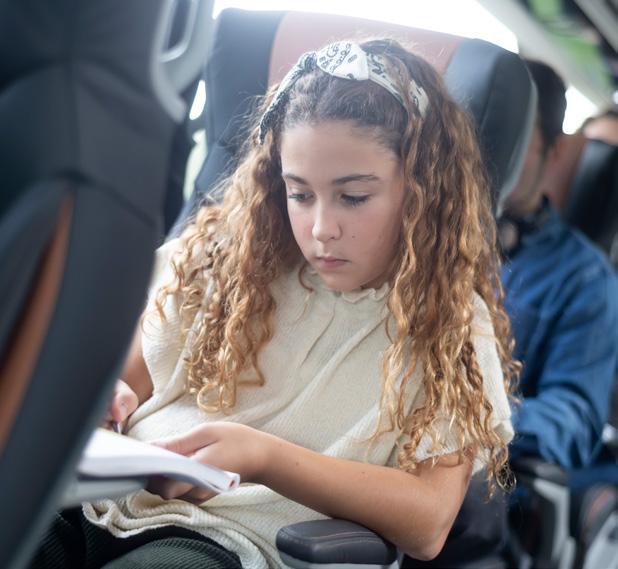
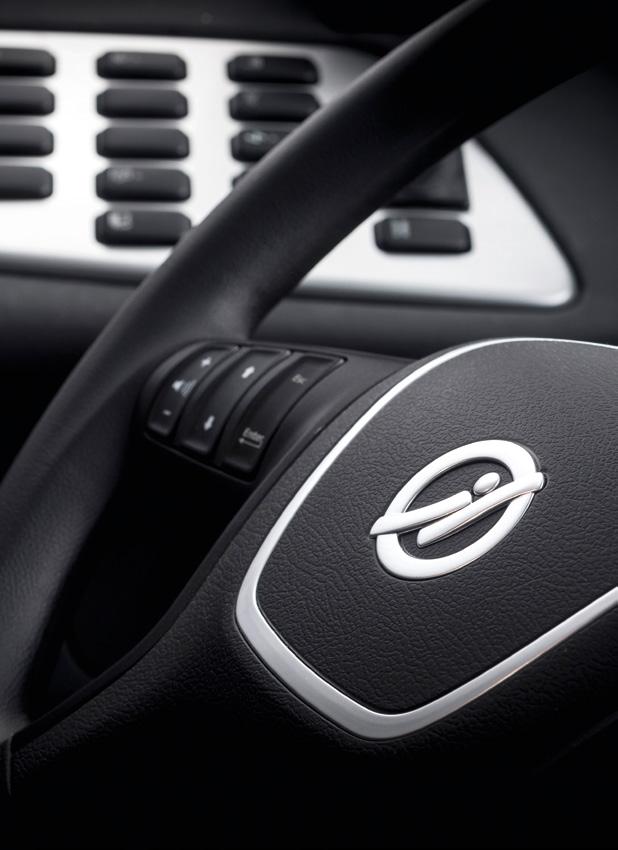
3.7.3.
Connectivity and digitalization will play a crucial role in the future of mobility. Autonomous vehicles and new and more efficient services will shape this future. At the international level, six levels (from 0 to 5) are defined to classify autonomous driving. This classification system describes the degree of automation of vehicles and the role the driver must have.
Automation levels - SAE (Society of Automotive Engineers)
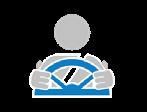

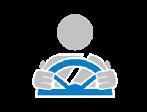
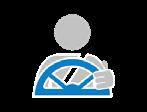


Zero driverless; the driver performs all driving tasks.
The vehicle is operated by the driver, but some assisted driving functions may be included in the vehicle design.
The vehicle has combined automatic functions, such as acceleration and steering, but the driver must remain in control of the driving system and monitor the surroundings at all times.
The controller is a necessity, but it is not necessary to monitor the environment. The driver must be ready to take control of the vehicle and must remain alert at all times.
The vehicle is capable of performing all driving functions under certain conditions. The driver has optional control of the vehicle.
The vehicle is capable of performing all driving functions in all conditions. The driver has optional control of the vehicle.
The Irizar Group is working to introduce different levels of automation for both buses and coaches. Self-driving vehicles (SDV) will progressively become a reality, as the result of a process of gradual transfer of responsibilities from driver to vehicle, until what is known as the ‘Virtual Driver’ is achieved. The depth of the transformations that will be required for the Autonomous Driving at the level of Electrical Architecture, Topologies and Domain Structure is still uncertain, but requires gradual progress.
For zero-emission urban vehicles, the Group is currently actively participating in local and European projects with the objective of reaching level 5 of driverless operation. Among those projects, AutoMOST and AUTODRIVE stood out. And now, we are continuing with the DIGIZITY and SHOW projects.
Work is also taking place on driverless medium and long-distance coaches, with investment in advanced driver assistance system (ADAS) projects. Some functions that have been developed are traffic signal detection, intelligent headlight control, signal recording, bicycle, animal and pedestrian detection, and lane change assistance, to name the primary ones.
Even though the main focus is autonomous driving, the context or justification of those projects is the implementation of the MaaS (mobility as a service) methodology. The idea is that those driverless vehicles can become an on-demand transport fleet such that users can arrange transportation services according to their needs in a totally flexible way.
Our first zero-emissions driverless bus débuted in Malaga in 2021. It was the first high-capacity bus to be used in real service in Europe. It was part of the AutoMOST project, which won important European awards and the bus was also noted by the World Economic Forum. This project, which was a major challenge for the Irizar Group, was the first solid step towards the mobility of the future; sustainable, connected, safe and autonomous mobility.
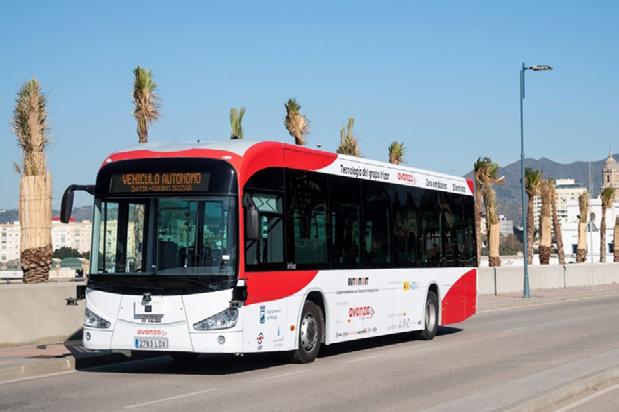
• The first 12-metre long 100% electric driverless Irizar bus was the outcome of the pioneering AutoMOST project. And it was financed
by the CDTI through the CIEN programme, which Avanza participated in as an operator alongside 11 partners, including the Irizar Group through Irizar e-mobility, and it involved putting a standard sized vehicle into circulation in a real traffic situation in a city. The Universidad Politécnica de Madrid, Insia, CEIT-IK4 and the Universidad de Vigo also participated in the project. It was a R&D+i pilot project that started five years ago and ended, as planned, in 2021.
• The project had two characteristics that made it a significant milestone, which were the capacity to transport passengers and interaction with vehicles, pedestrians and infrastructure under real traffic conditions.
• The World Economic Forum highlighted the 100% electric Irizar bus as the first European driverless bus on the road. And in 2021 they published: “This electric bus drives itself through the Spanish city of Málaga”, https://bit.ly/weforum-malaga
• AutoMOST was awarded the ITS prize for Driverless Connected Vechicles granted by ITS Spain. In 2021, the prize recognised
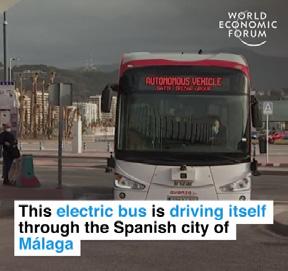
AutoMOST as the most important project in the country in the field of autonomous and connected vehicles.
• In 2020, it won the Industrial Development Prize from the IEEEITSS (Intelligent Transportation Systems Society).
• AutoMOST will be an implementation of shared control systems (dual mode) in future autonomous passenger transport vehicles that makes it possible to operate services in a more flexible and efficient way in a context of smart and connected infrastructures.
We have also participated in the AUTODRIVE project whose MAIN GOALS were to design of electronic components that are: (i) self-aware against failures (self-diagnosis), (ii) fail-safe, (iii) operational against failures (redundancy of HW and SW), and system architectures that allow the introduction of automated driving in all vehicle categories.
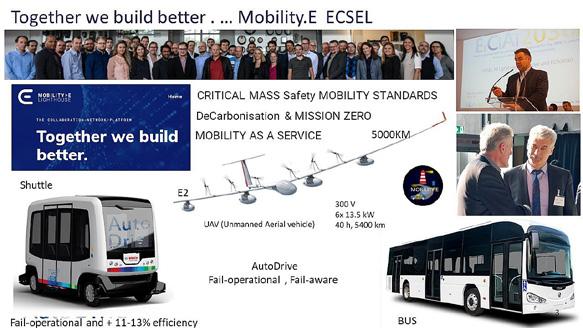
• The results of AUTODRIVE will significantly contribute to safer and more efficient mobility. The project will increase end-user acceptance and comfort by supporting driving in highly demanding situations, as well as in normal driving situations. The combination of both will reduce accidents especially in rural environments and under adverse weather conditions.
• AUTODRIVE will contribute to Vision Zero for Europe and increased efficiency. This will reinforce the leadership and increase the market positioning of all the AUTODRIVE consortium members.
• The project ended in 2020, and it has already been useful for Irizar and Irizar e-mobility to gain more knowledge about the critical challenges of autonomous driving and strengthen the relationship with our technological collaborators.
The lessons learned with AUTODRIVE made possible the design and work we have been doing on later projects.
We are still involved in various automated driving initiatives, like the ones that include the DIGIZITY project, which has a wider scope: Industrial research into innovative solutions for decarbonising, digitalising and automating urban transport with zero-emissions buses.
It is a project financed by the European Union – Next Generation EU through the 2021 Sustainable Automobiles Technology Programme tender and in the framework of the Recovery, Transformation and Resilience Plan of the central government plan for catalysing business
innovation and leadership of the 2021-22023 National Plan for Scientific Research and Innovation backed by the Centre for Technical and Industrial Development (CDTI).
Nine members participate:
• Six companies AVANZA SPAIN, S.L. (a client of ours who leads the project), IDNEO TECHNOLOGIES, S.A., S.A. TELNET REDES INTELIGENTES, S.A., INTERNACIONAL HISPACOLD, S.A., IRIZAR, S.COOP. and JEMA ENERGY. The last three are part of the Irizar Group.
• Research bodies ITAINNOVA (Instituto Tecnológico de Aragón), Fundación TECNALIA Research & Innovation y CTAG (Centro Tecnolóxico de Automoción de Galicia)
It brings together manufacturers of buses, engines, components and on-board systems, telecommunications equipment and a large fleet operator.

Watch the video: https://www.youtube.com/watch?v=pWjUyrS4Ly8
In 2022, Irizar and other representatives of the consortium had the opportunity to visit the ITAINNOVA (Instituto Tecnológico de Aragón) facilities, and a debate forum about the solutions they were working on was created on the project and the next steps within the frameowrk of the DIGIZITY project. It was a chance to realign interests between Avanza (operator) and Irizar (manufacturer). In 2022, Irizar worked on updating one of its platforms, the 12 metre Irizar ie tram, with the latest advances in safety, comfort and self-driving technology, within the framework of the DIGIZITY project.
In 2023, the Irizar Group was able to validate several solutions developed in previous years. In the first half of 2023, PHASE 1 of validations of the project was done, in which we were able to do an initial validation of the numerous systems and subsystems developed by the partners of the consortium in tests without travelling.
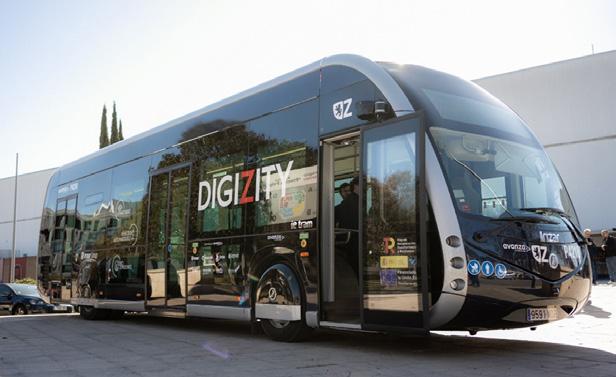
In the first tests, which were done directly in the Exceptional Area of Zaragoza (EAZ, line 40), we were able to obtain enough data to propose improvements and corrections for several systems and subsystems.
With this project, mobility 4.0 is arriving at the capital of Aragon, putting it at the vanguard of the future and of sustainability and innovation through artificial intelligence. Zaragoza will be the first city domestically or internationally to have the benefits of a pioneering project by testing more than 50 products, systems and subsystems aimed at making public transport cleaner, more efficient, safer and more comfortable. Furthermore, the city will improve the safety of Avenida San José, which is an especially sensitive traffic area.
Today, autonomous driving is making an important contribution to environmental sustainability because energy consumption can be managed more efficiently. In addition, it goes hand in hand with electrification and implementing zero-emission vehicle technologies.
The zero-emissions 12 metre Irizar ie tram automated vehicle has driving assistance that contributes to guaranteeing safety and minimises the possibility of accidents. The driving assistance does not eliminate drivers, it assists them to improve safety. It reduces accidents or incidents by reducing human error (fatigue or speeding, etc.).
The goals of the project are clear: automated and intelligent vehicle usage, 5G and WiFi 6 connectivity, technological and smart city infrastructures, artificial intelligence and latest generation solutions for users. A connected, intelligent and cybersafe vehicle was developed with this project. It is connected in real time/5G with a network that has been deployed for that purpose.
After a development period, in the second half of 2023 we did what we call PHASE 2 of validations, this time with passengers, in which we validated all the solutions together and we could obtain significant results under realistic operating conditions.
Even though the project formally ended in late 2023, the validations continued until the first quarter of 2024, because all the partners are interested in obtaining as much data as possible. The data has helped develop future solutions that bring improvements in comfort, safety and efficiency.
With this extension of the validations, the Irizar Group has also been able to continue validating the technology they expect to deploy on their vehicles and platforms in the future, as well as support the validations of the rest of the members.
We can also highlight our participation in the SHOW project (shared operation models with universal deployment) in which, coordinated by the UITP (international association for public transport), we were part of a consortium of 70 members from 13 EU countries, with collaboration expected from 11 global organisations from Latin America, Asia and Oceania (US, South Korea, Australia, China, Japan and Singapore, among others). The Technical and Innovation Director of the project is the CERTH/HIT (Hellenic Transport Institute), and it has a duration forecasted from 2020 to 2024.
The global GOALS of the project were:
1. Identify and specify priority automated urban mobility scenarios that guarantee high acceptance among users, true user demand and profitability under realistic operating conditions
2. Identify new business opportunities, develop innovative business models and products and services that are exploitable for sustainable fleet operations in urban and inter-city environments
3. Develop an open system architecture that is modular and inclusive and the tools necessary for it that make possible data gathering, analysis and meta-services between locations, between vehicles and between operators
4. Improve the functionalities needed for all kinds of vehicles: shuttles and capsules, buses and cars taking into account the local physical and digital infrastructure, the climate and traffic conditions, improving their energy efficiency and safeguarding the safety of vulnerable traffic participants using appropriate interfaces
5. Deploy demonstration fleets, infrastructure elements and connected services (DRT, MaaS, LaaS, etc.) to carry out and validate shared electric, personalised and continuous cooperative connected automated vehicle services (CCAV) for all passengers in real urban and peri-urban traffic In settings throughout Europe and through broad global international collaboration
6. Evaluate the impact of cooperative and shared automated electric fleets in cities using a holistic impact evaluation
7. Transfer the results through testing alternative operating schemes and commercial models to replication sites throughout Europe and beyond
8. Support deployment of the automation of urban traffic through replication models, route mapping, training schemes and training for the future workforce, contributions for certification and standardisation activities and policy recommendations
With this project, at Irizar we worked on R&D to continue development of the driverless connected vehicle by developing technological solutions for the future, focusing on:
• An automated bus garage: where vehicles can do manoeuvres in an automated way, like parking and going through washing tunnels
• Platooning: It is the first completely instrumented vehicle that can guide a group of vehicles. Connectivity between vehicles is absolutely necessary for that.
In May 2022 we participated in an event (which kicked off the “predemo” tests) along with representatives of the city, the EMT and the demonstrator consortium of Madrid. A forum was set up at the event to debate autonomous driving and urban mobility in the future from several points of view: political, operational, social and technical, etc.
In 2022, “pre-demo” testing at the EMT garages were started where the Irizar vehicle provided circular service in the garage without a driver, carrying drivers and technicians between key points. Watch video: https:// bit.ly/showdemo-madrid
In October 2022, Madrid hosted the third Pan-European Workshop in the framework of the SHOW project where we could demonstrate the progress made by Irizar and the EMT for the entire project consortium as well as representatives of the European commission and representatives from other projects.
We finished operations in the garages in 2023. In turn, we worked on updating the solutions on board the vehicle with assistance from the project partners, as well as entities like the UAH (Universidad de Alcalá de Henares), to adapt it to the performance and safety requirements needed for the vehicle to be able to drive under real urban setting conditions.
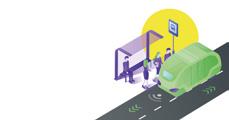

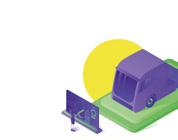


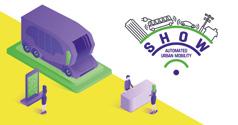
In 2023, the number of driverless operating hours in the garages increased considerably, providing circular transport services in the garages 2-3 days a week for 5-6 hours a day.
Even though doing operations in a real urban environment was planned between the end of 2023 and the first half of 2024, unfortunately it was not possible. During the first half of 2024 tests were done in a real urban environment designated for the project to make recordings with the vehicle simulating the operations that were expected to be made, but without manual driving.
That data was used to check the simulated algorithms, and very promising results were obtained. However, because it was not possible to obtain the special permits for operation with passengers in driverless mode, it was not possible to do the expected demonstrations.
In any case, the project was justified totally satisfactorily thanks to the hard work of the the members of MegaSite in Madrid, and the tests done both inside the garage (driverless) and the outings in a realistic environment (manual mode simulating the algorithms).
The Irizar Group offers intelligent driver assistance systems with a range of optional equipment to provide drivers and passengers an optimal form of mobility. Extensive experience in artificial intelligence and deep-learning enables Datik to offer fleet management, preventive and predictive maintenance. All of that is centred in our cloud. Those systems are designed and intended for the owners of buses to help them resolve daily incidents quickly and to reduce maintenance and fuel costs.
It is a perfect management tool to achieve the highest fleet profitability, as:
1. It increases productivity. The system provides control and reaction capacity valued by passengers and drivers. That capacity translates into service quality guarantees, which is directly converted into a production increase.
2. It reduces fuel use, providing the ideal scenario for meeting savings goals: data analysis, classifications, periodic comparisons and control mechanisms for manoeuvres that involve high fuel consumption.
3. It monitors maintenance. The precision of data and mapping for the active alarms of the fleet, which only this tool provides, is an invaluable advantage for monitoring, prevention and proactivity.
Last year, Irizar maintained their commitment to go deeper into the services and capacities connectivity can offer us, improving the services provided to both clients and Irizar itself to provide the highest standards possible in the fields of quality and security. .

It gives operators a context for monitoring the fleet. The attached data on incidents, alerts, conditions and position of the entire fleet outline a scenario that guarantees a quality service.
• Real-time monitoring: Geo-localised fleet with detail real time information for making decisions that increase productivity
• Reduction of consumption: Advanced consumption analysis, aimed at improvements in driving and lowering costs Identification of the appropriate vehicle model for daily operations.
• Incident management: The fleet manager has all the information so they can act effectively through the incident manager.

It allows our clients to configure maintenance plans for their fleet. They can analyse the statistics and data collected by the connectivity units on the vehicles that are dumped into the iPanel tool where the clients have access to analyse the behaviour of their vehicles.
What happens if an alarm is activated on the vehicle? The DTC (Diagnostic Trouble Codes) of the vehicles are transmitted to the manager in real time. Depending on its type, the repair urgency is suggested together with the instructions for the actions in the workshop, to minimize the downtime required for the vehicle.
If more information is needed, remote telemetry download allows detailed analysis of alarms. This analysis makes it possible to diagnose the condition of the vehicle.
• Active alerts (DTC): Real-time reception of the alerts the driver sees on the dashboard View and classify active maintenance alerts registered on all the vehicles in the fleet
• Troubleshooting: Proposed specific corrective maintenance actions to accelerate the recovery of vehicle operating capacity

Big Data applied to transport provides appropriate information at the right time. That lets operators evaluate the availability history of each vehicle alongside the energy consumption reports. Thus, the fleet management process can be optimized by increasing productivity and achieving a more profitable business.
Contributing to the SDGs and goals of the UN 2030 Agenda:

8.1 Maintain economic growth
8.2 Raise productivity through diversification, technology and innovation.
8.5 Achieve full employment and decent work
8.7 Eradicate slavery, human trafficking and child labour
8.8 Protection of labour rights and safe work

12.6 Adopt sustainable business practices
12.8 Ensure education for sustainable development


5.1 End discrimination 5.5 Ensure the full participation of women and equal opportunities in leadership
Eradicate child abuse, exploitation, human trafficking and child exploitation
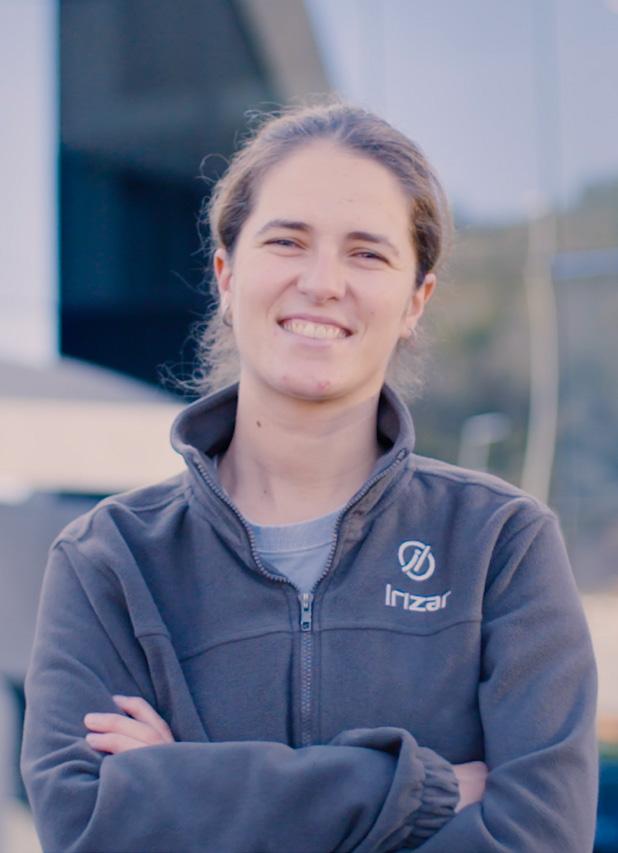

4.1
People: key actors in Sustainable Competitiveness
• Commitment to our people integrating the SDGs of the 2030 Agenda
• Social Innovation for Equal Opportunities.
4.2
Commitment to quality employment
4.2.1. Job creation and evolution of workforce
• Job creation
• Workforce distribution by gender, category and age.
• Quality of recruitment, remuneration and salary gap.
• Rotation, entries and exits (by sex and age) and dismissals.
4.2.2. Organization of work and commitment to work-life balance
4.2.3. Participation in the management and economic results
• Participation in economic profits.
• Participation in management
• Participation in Strategic Thoughts
4.2.4. Employment Promotion
4.3
Communication, transparency and participation
4.3.1. Leadership and teamwork
4.3.2. Communication and transparency
• Forums at the highest level where all personnel participate.
• Member Council, Regulation of Internal Arrangements and
4.4
Collective Agreement
• Other communication channels
Strengthening talent: Education and training
4.5
Gender equality, diversity and social inclusion
4.5.1. Gender equality
4.5.2. Diversity and social inclusion
4.6
Health and Safety
4.6.1. Occupational Hazard Prevention System
• Frequency and incident rates
• Incident rate and accidents at work with sick leave.
4.6.2. Ergonomics-Comfort Programs
• Regular activities and measures taken in recent years
• Future plans
4.6.3. Other health and well-being services
4.7
Shared leisure activities
The people are undoubtedly the key players in achieving sustainable medium and long-term results. Having high levels of satisfaction and motivation for ALL Irizar personnel (member-workers and employees) is the way to achieve a culture of excellence, Sustainable Competitiveness and the future success of the Irizar Group.
In accordance with this firm conviction, we work resolutely so that the people of Irizar want to contribute their talent to realizing both our Mission and our strategic challenges, as well as our dream of contributing to the construction of a Better and more Sustainable World.
We uphold an open and transparent culture with the firm conviction that business activities with respect for total integrity are the only basis possible for achieving sustainable success. We are convinced that the main instrument for strengthening Integrity is an Organizational Culture based on shared ethical values and assumed by all the people in Irizar, as it constitutes the best element for preventing bad practices, illegal or even criminal behaviours.
Therefore, starting with the example of the CEO and the executive team, it is VITAL to continue promoting our real commitment to ALL people:
A. We offer attractive, fair working conditions (both in human rights and labour standards) with long-term perspectives. We can affirm that our philosophy for new hires to the Irizar Group is aimed at permanence and stability.
B. We make long-term investments in talent. We work constantly to improve the quality and attractiveness of employment and to incorporate, develop, and retain qualified personnel.
C. We promote continuous training for them and the development of their personal and professional lives, strengthening the abilities of every person out of the belief that everyone and their talent are paramount. Training, the capacity for adaptation and flexibility are keys for responding to changes, uncertain situations and new challenges in the future. Digitalisation and automation are undoubtedly new scenarios to which we must adapt.
D. We promote trust, communication, leadership, participation, self-management and teamwork and provide a work environment where everybody can contribute something more to the business project in accordance with their possibilities and hopes. We understand that it is the way to encourage everybody to do the part of the process they are responsible for with responsibility, professionalism, ethics and rigour and, in short, have people who are committed to the project, mission, vision, keys and common values so we can achieve the goals that have been set.
E. We stand for equality, non-discrimination, and respect for diversity.
F. We facilitate co-responsibility and a good balance personal, family and professional life balance by making flexible working hours possible, reducing workdays and the possibility to take a leave of absence.
G. We do that to preserve their long-term health and safety.
H. Encourage everyone to actively contribute to the average environmental balance, working to minimise any impact derived from our business activities and preserving the natural environment
I. We encourage working against corruption in all forms, including extortion and bribery.
J. Making participation a reality for the design of the Company's strategy for the future beyond mere performance in daily operations.
K. We share business economic results, even with employees who are not members of the cooperative. We provide significant advantages and attractions that differentiate us from the other companies in the environments where the Irizar Group is present.
In 2022, we had to continue making a concerted effort to be able to progressively overcome the complicated situation caused by the pandemic, both in terms of prevention and designing, developing and manufacturing new models in a short space of time. The progress we made was only possible thanks to the enormous effort and hard work done by all the people who made up this project. As we saw in chapter 2, about our Sustainable Competitiveness, in 2023 we had already gotten through the worst and recovered a pre-pandemic situation.
Our goal is to keep cultivating talent at the same time we create high quality jobs. Of course, we want to do that within a company culture and approach with integrity that is guided by Ethical Principles.
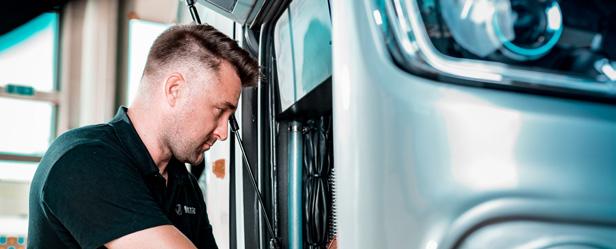
As we put forward in chapter 2 about Irizar and Sustainable Competitiveness, in 2022 we took a big step in our commitment to the 2030 Agenda SDGs by measuring our impact on priority KPIs. We have consequently decided to strengthen our creation of value for our people:
A. CLIMATE: A KPI for reducing scope 3 category 3 GHG emissions (caused by business trips and people from Irizar commuting to work). It can be seen in detail in the chapter about the environment.
C. TRUST AND INTEGRITY: two KPIs for making progress in trust and training/awareness raising for people in Irizar’s ethics and legal compliance system. All of that is handled in more detail in chapter 2 about our Sustainable Competitiveness.
D. EQUALITY: three KPIs for making progress in gender equality by increasing gender diversity, especially in senior positions and new hires and reducing the salary gap and training people in equality. That is handled in chapter 2 about our Sustainable Competitiveness and section 4.5 of this chapter.
E. DECENT WORK: four KPIs for facilitating a safe and healthy work environment, encouraging workers to become member-cooperativists, paying fair wages to everyone and increasing people’s commitment to the Irizar project.
F. EXTENDING SUSTAINABLE DEVELOPMENT: one priority KPI in training/awareness raising in sustainability for Irizar people.
That is described in detail in chapter 2 about Irizar and Sustainable Competitiveness, and it is also handled in section 4.4 of this chapter.
As we discussed in more detail in chapter 2, about our Sustainable Competitiveness, in 2023 Irizar participated in the Business & Human Rights Accelerator learning programme of the United Nations Global Compact, after deciding to drive our progress in human rights in December 2022 and to prepare ourselves for the future European due diligence directive for companies for sustainability regarding human rights and the environment in worldwide supply chains. From January to September 2023, with backing from upper management, People management and the Sustainable Competitiveness Manager participated in the Business & Human Rights Accelerator, which was designed to give companies the tools and knowledge they need to establish a continuous due diligence process regarding human rights and to guarantee they are respected. That training enabled our progress in our commitment and practices regarding human rights to prevent risks and avoid harm to people.
After the training, the Spanish UN Global Compact gave us the opportunity to belong to a continuous learning group about Human Rights. Since then, in addition to learning with experts and getting support materials, we can share experiences, knowledge and challenges with 45 other companies that are already working hard on human rights. Without a doubt, it will contribute to facilitating our progress with integrating our commitment to respecting human rights in our value chain, in strategy as well as operations.
people As the first thing to put it into action, we agreed on the first draft of the human rights policy for the Group, which was agreed upon by the president, People Management and the Sustainable Competitiveness Manager. In 2023, we shared it with the CEO of the Irizar Group to improve it and keep making progress on the following steps in 2024.
We thought that all of that would also have a positive impact on the people at Irizar, even though it will fundamentally impact progress towards a more responsible supply chain with our suppliers and other external collaborators.
At the end of 2023 we included the following in our sustainability priorities: HUMAN RIGHTS - Managing the most serious risks for
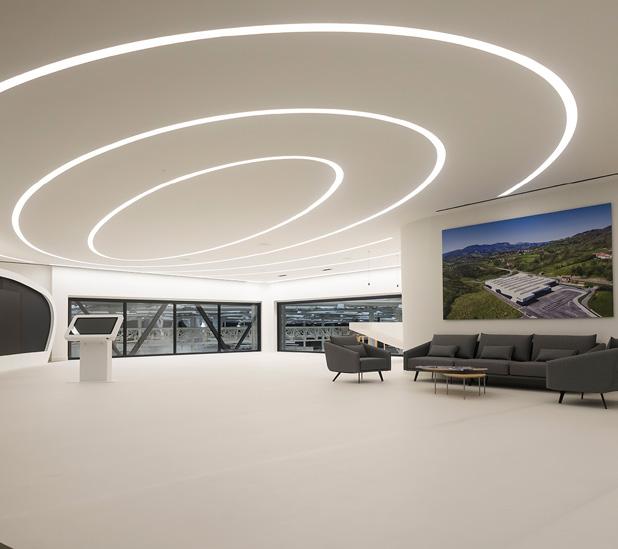
PRINCIPLES OF
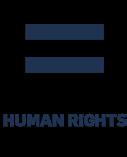

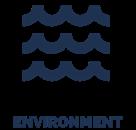

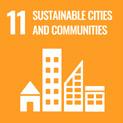
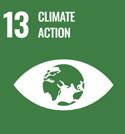
3. Reduce TOTAL GHG emissions
Includes:
Scope 1 and 2:
CATEGORY 1: Direct GHG emissions and removals
CATEGORY 2: Indirect GHG emissions caused by imported energy
Scope 3:
CATEGORY 3: Indirect GHG emissions caused by transport
CATEGORY 4: Indirect GHG emissions caused by products
Irizar uses
CATEGORY 5: Indirect GHG emissions associated with the organisation’s use of products
PRINCIPLES OF THE GLOBAL COMPACT



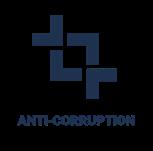





9. Level of confidence of people at Irizar to report unethical behaviour
10. Train/raise awareness of people at Irizar CULTURE ethics and legal compliance:
• Code of ethics, ethics and compliance system
• Crime prevention system
• System for protecting personal data and guaranteeing digital rights
• New hires trained in the code of ethics and ethics and compliance system
% people trained / Total % people trained / Total people in high risk areas % people trained / Total
11. Training people from companies from the Irizar Group in ethics and legal compliance:
companies trained / Total
a. Branch offices
b. Other coach companies in the Group
c. Rest of Group companies
BASE YEAR: year data in blue if shown in OBJECTIVE later
PRINCIPLES OF THE GLOBAL COMPACT


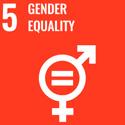




15. Increase gender diversity in:
a. hiring
b. the Management Team (group 1+2)
c. Management area/ middle management (group 4+5+6)
d. Governing council
16. Reduce the wage gap between women and men
Group 1 + 2 (CEO + Management Team)
Group 3 (management)
Group 4 (technicians)
Group 5 (administrators)
Group 6 (direct personnel)
17. Train/Raise awareness of People at Irizar in Gender equality Gender Equality Plan Harassment Protocol, etc. • New hires trained in gender equality
BASE YEAR: year data in blue if shown in OBJECTIVE later
PRINCIPLES OF THE GLOBAL COMPACT SDGs KPI INDICATOR

The International Labour Organisation (ILO) defines decent work as: “productive work for men and women under conditions of freedom, equity, safety and human dignity”.




18. Providing a safe and healthy work environment
a. Reduce the frequency rate of accidents
b. Reduce the incident rate of accidents
19. Worker partners
Differential factor compared to NONcooperatives
20. Pay ALL our workers at least a living wage
/ AVERAGE total workforce
Global Compact definition of a living wage: https://bhr-navigator.unglobalcompact.org/ issues/living-wage/ % salary / living wage
Compared with the metal collective bargaining agreement for the most common positions: - engineer or university graduate (MOI) and - product technician (MOD)
21. Increase the people’s level of commitment (Includes: Expectations, commitment and feeling) Average % value Survey / Total workforce (0-100%)
BASE YEAR: year data in blue if shown in OBJECTIVE later
PRINCIPLES OF THE GLOBAL COMPACT
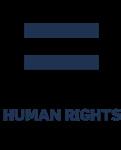
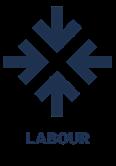
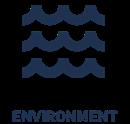









22. Train/Raise awareness of people at Irizar in sustainability
- BASIC: Definition, 10 principles and SDGs
-Human and labour rights -Environment -Etc
Prioritising
• Management Team
• Managers of: areas, processes or relevant teams
• Governing Council
• Other indirect staff
• Rest of people at Irizar
• New hires
% PEOPLE WITH BASIC TRAINING / TOTAL WORKFORCE No. people with more specific training
% people with BASIC training / total new hires
In 2019, we started a Social Innovation Project for Equal Opportunities. The main goal of the project is to give new answers to the challenges and questions we currently have from a social point of view, promoting projects that fundamentally benefit people at Irizar, at the same time they benefit the local society.
We want to generate social innovation based on participation and, for that purpose, a diagnosis of the current situation was done and a community listening process was started. Several activities were organised within this process, like open discussion sessions, interviews and group performances and surveys, among other things. Fundamentally people from Irizar participated in the listening process, in addition to some representatives from the government and social agents from Gipuzkoa.
Our main goal is to keep promoting equal opportunities for people , centring on managing:
1. gender (strengthening the equality plan)
2. diversity (race, nationality, religion, sexual orientation, inter-generationality, other skills, etc.)
3. work-life balance and
4. social inclusion.
In short, we want to strengthen our social commitment to people and, mainly, people at Irizar. We work directly and indirectly on equal opportunities to contribute to:
• Reinforcing the sense of belonging of Irizar people.
• Achieving a position as a socially innovative company.
• Being attractive to talent.
• Consolidating Irizar’s brand image in the social sphere
• Favour social transformation
• Achieving Corporate Sustainability.
• Strengthening the dialogue with stakeholders
To promote this project vigorously, a multidisciplinary Social Innovation Team has been created in which, together with an external partner, people from the different bodies of the cooperative participate and the executive team, as well as other people from the organization who are highly conscious of the project. The team will be enriched by new members to meet the goals resulting from the research being done.
In 2020, a listening process was done using interviews (50) and questionnaires (404 answered) to collect impressions about the four pillars defined in the Social Innovation Project, which are: gender equality, work-life balance, diversity and social inclusion. The main conclusions were shared with everyone in the assembly held in December 2020, where the general lines of the project for 2021 were also shared.
The work from 2020 was used as the basis for the diagnosis of gender equality we did in 2021. Based on that diagnosis, and as we will see in greater detail in section 4.5, from 2021 to 2023 we made progress with improving the equality plan and harassment protocol.
The harassment protocol was communicated to everyone in the organisation through meetings specifically designated for that purpose.

Irizar is a Cooperative Society. The main difference between a Limited Company and a Cooperative is that in the Limited Company the capital is in the hands of the shareholders, whether or not they work in it (sovereignty of capital), while in a Cooperative sovereignty resides in the work, as the members must work in it and are self-governing using the formula 1 member = 1 vote, regardless of the capital that member has in the Cooperative.
People who start working at Irizar do so as employees with employment contracts. And after several years of evaluating their professional performance, and if the evaluations are favourable, they become member-workers (cooperativists) and have the economic benefits of participation and employment security that that involves.

We understand that economic development and job creation are fundamental in the environments where we are present and to our commitment to Sustainability, even in the greatest difficulties. For that reason, as you can see in chapter “2 Sustainable Competitiveness”, the graph showing the evolution of employment at the Irizar Group is the best evidence of our social contribution and the best indicator of our strategic commitment to Sustainable Competitiveness (economic-governance, social and environmental), and it shows coherence with our mission. In spite the crisis and drop in sales in 2009 - 2010 the Irizar Group maintained employment. And in 2020-2021, despite the deep impact of Covid-19 on our business, the decrease in employment was not very significant. Fortunately, in 2022 our business and the employment lost in the hardest years of the pandemic started to recover.

In 2022, the increase in the production rate brought with it the hiring of people needed for it. In addition, the optimistic foresight for the future has made it so the positions retired people have left in recent years are covered that, because of the circumstances, have not been covered yet. Those hires were concentrated at the end of the year, so average employment creation was dampened.
In 2023 the production rate went back to being the same as we had before the pandemic. That meant that, on one hand, the same number of people we had before were hired. Furthermore, in the interest of responding to the new technological and geographical projects Irizar is taking on, it was decided to increase the staff. A steep increase in production in Morocco also made it necessary to hire people for temporary support there.
Workforce distribution by: gender, category and age
Workforce distribution by gender and
Staff distribution by sex: in 2022, 7.66% were women, while 92.33% were men, maintaining 2021 levels. Once again in 2023, we kept the same percentage values of women in comparison with previous years. In 2024, we continued with a trend similar to previous years.
While it is true we keep promoting gender equality in new hires, we are still having difficulties in that regard and the vast majority of job
candidates are men, because of the kind of industrial qualifications sought. The problem of low ratios of women in industry has already been identified by several training centres, who we have good relationships with and with whom we are in continuous contact. We hope that the Social Innovation project, discussed at the beginning of the chapter, will contribute to improving the ratios in this area. Along those lines, an effort has been made to give more visibility to the women who work at Irizar today, such that when there are visits to the company from training centres women guide the groups to show that there are role models in the industry.
Distribution by professional category: in 2022, 75.2% are MOD (with advanced training), and 24.77% are MOI (mostly with engineering, administration and business management or administration degrees). In 2023 we reached 77.2% in MOD. The increase in the number of vehicles that will be produced has a direct relationship with this percentage. In 2024, it stayed in those terms, becoming 76.9%.

Workforce
Age distribution: In recent years there has been a significant drop in the average age, due to a significant number of recruitments and the departure of several workers of retirement age. We followed the same trend, lowering the age average a little more in comparison with the previous year. The total average age stayed below 40 years old. Clearly, the contradictions from recent years help that.
Distribution by contract type
In 2023, there was already a difference between the permanent and temporary contracts for employed workers (TCA), so the table changes.
As shown by our indicators, we promote the incorporation of people to Irizar dedicated to permanence and stability. We prioritise quality in hiring, such that 98% of the workers at Irizar have a permanent contract. In 2024, that indicator went to 99%, making it clear the Irizar is committed to having a stable workforce and to the importance of the people who make up our project.
Some options for starting work at Irizar:
• Via grants and scholarships for various university majors and the option of doing your final university project with us.
• In collaboration with professional training schools in the area, we give students of them the chance to do their advanced internships with us. These are very important for students to be able to develop the skills they have acquired and so they can get first-hand experience of how a company works.
Job profile diagrams are tools that enable us to carry out periodic evaluations and monitor the performance and leadership of the personnel who join the entire Irizar Group. The evaluations are done for everybody hired, by members of the teams they work on and by other people from different areas that are in direct contact with responsibilities or assignment. These evaluations enable us to measure the development and evolution of personnel for their definitive integration into the Irizar Group.
Everybody has fair working conditions that are above average for a cooperative:
1. We compensate the work of personnel with the same principles in all countries where we are present. Salaries are determined based on qualifications and responsibilities. When establishing remuneration, we are not guided by gender or place of origin, but exclusively by the work and responsibility carried out, as well as by the surrounding conditions. The general our level of remuneration is very competitive and above the sectoral agreements of the local environment.
2. We offer significant advantages and promotions in areas related with banking, communications, insurance, travel, fuel, spending, etc., which are promoted and negotiated through the Social Council.
3. But what really makes the difference at Irizar is that, because it’s a cooperative company, the people who work there can become member-workers and after a three-year period as a regular employee they become members for a specific time. They will stay in that situation for a maximum of four years and afterwards they can become a permanent member after passing the periodic evaluations (profesiograms) that have been specified.
We’re aware that having worker partners is a differentiating factor compared with NON cooperative companies that is really attractive to people and we’re committed to paying all our workers a decent wage. As we saw in chapter 2, about Irizar and Sustainable Competitiveness, and section 4.1 of this chapter, in our contribution and impact on the 2030 Agenda SDGs we have specified our commitment to keep promoting the number of members in regards to the total number of workers and to pay a decent wage to everyone as high-priority KPIs.
We try to have everyone employed by Irizar be assigned a job with remuneration in line with their responsibilities, without any kind of differentiation based on gender. Nor is there discrimination in salary for other reasons, such as age, race, nationality, religion, disability, sexual orientation, union or political affiliation.
The deep analysis of the wage gap is one of the points dealt with in the improvements to the equality plan that was carried out.
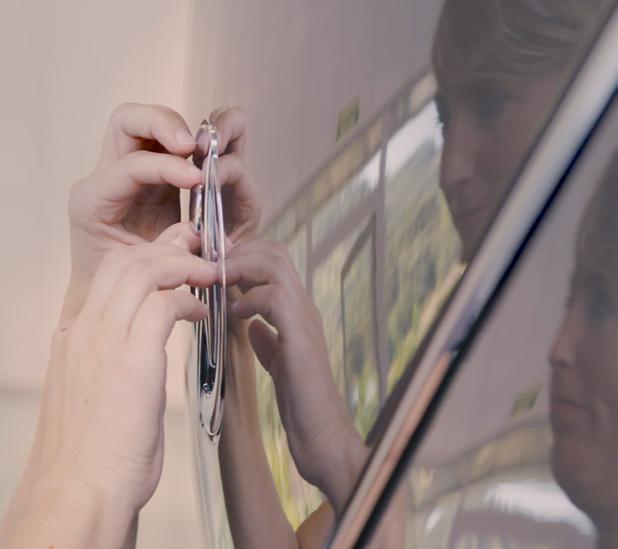
In 2023, the average total salary at Irizar for men was 99.89% of the average, while the average salary for women was 101.23% of the average. The majority of women are indirect employees (they do not work directly on the product), and because indirect salaries are above the average, it makes the average salary for women higher. In 2024, it tilted in favour of women, given that the differentiation by professional category is still apparent, as explained below.
The previous table shows the deviations between men and women, differentiated by professional category and direct or indirect labour.
• A greater wage gap can be seen between men and women in indirect positions (MOI), -17% to be specific. That difference is fundamentally caused by the majority of indirect roles with higher indices being held by men.
• In parallel, there is a wage gap between men and women in direct hire roles (MOD): -6% mainly due to the fact that employees who have greater seniority are men.
We are very aware that we have a wage gap to reduce that we are evaluating for improvement with the equality plan. And, as we saw in chapter 2 about Irizar and Sustainable Competitiveness, as well as in section 4.1 of this chapter, we have designated the reduction of the wage gap between men and women as a high-priority KPI in our contribution and impact on the 2030 Agenda SDGs.
Staff rotation rate
(*) Among other reasons, it is possible that the effect that Covid-19 has had on the economic performance of the company has influenced the decision by some people to leave the company.
Rotation rates are very low. The rate is always below the average of the countries in which Irizar operates. Undoubtedly this is further proof of the satisfaction and the motivation of our personnel. All this is mainly the result of:
1. Our firm commitment to developing people‘s capacity and talent so, with a long-term-vision, we can take on the innovation and sustianability challenges we face by creating new lines of business (electromobility, hydrogen, etc.), with the increase in demand and opening of new markets, among other things.
2. People value the quality of recruitment prioritizing permanent contracts and the possibility of becoming a member of the cooperative.
The need to fill positions in order to handle the increase in production made the number of hires very high in 2023 as well, in part due to the need to cover vacancies from 2022. In 2024, the need to have to help with production at our foreign plants joined with the complexity that our product is gaining has made our need for people increase. Furthermore, at the end of the year an MOD hiring process started to catch up with the increased pace of production expected for March 2025.
(*) Given the exceptional situation in 2020 we had to terminate the annual temporary contracts of six people.
The entrance of 260 people into the organisation in 3 years means that not everybody fits into our project. Nevertheless, only a small number of people do not achieve it, as you can see.

Since 1995, we promote a culture based on people's trust and schedule flexibility. We offer a flexible schedule where the main objective is the performance and fulfilment of the established objectives and not simply presence.
Irizar personnel have different alternatives to help find a work-life balance in addition to flexible hours within limits, shortened workdays, unremunerated break periods, or other kinds of leave. This means offering in many cases a flexibility that goes beyond what is legally established.
The pandemic contributed to promoting remote work since 2020 for all jobs where it can be done. Furthermore, given the circumstances, the continuous work day was encouraged to limit and reduce physical contact.
Work-life balance is one of the target areas of the Social Innovation project that is under way. As we mentioned in the first section, in 2020 a diagnosis of the current situation was done.
Among the first conclusions regarding work-life balance, it is clear that there is room for improvement: "In some sections there are no problems with work-life balance, but in others the working days are reduced to achieve the balance". For this reason, we must continue to make decisive progress in the approach and the work-life balance opportunities for Irizar people.
In November 2021, after analysing the surveys and interviews, new criteria was set for arriving at and leaving work that makes a healthy work-life balance easier to achieve.
1. 60 minutes of flexibility for starting work, which allows leaving before the end of the work day
2. The flexibility is increased to three hours if the person has or is a guardian of a child under 12.
3. Continuous work days are allowed on Fridays and days before bank holidays.
4. Employees can work remotely one day a week.
(*) It is impossible to know how many reductions in working hours would not have occurred without Covid-19.
Please note the workday reductions are not for complete years, they can be for months. These are the people who have had reduced workdays at some point of the year.
Of the total of 25 workers who had a reduced workday in 2022, 14 were men and 11 were women. It was already returning to -prepandemic levels.
In 2022, within the Social Innovation project we kept working on studying and analysing the work-life balance measures at Irizar, as well as in other companies in the sector and leaders in the field, in order to keep making progress and become leaders in work-life balance ourselves. This study has ended, and at the 2023 assembly some measures were decided on to improve permissions of that kind.
There was a significant increase in the people who had a reduced workday at some time in 2023. The number of men who took some kind of reduction went up, especially during periods that coincided with vacations.

Absenteeism is reflected in the rate of days lost (number of days lost based on the total number of hours worked) and the rate of absenteeism (total hours of sick leave and the total hours of accident sick leave, each based on the total hours worked).
As you can see in the break-down of the indicators, without the effects of Covid-19 on sick leave we would have had an improvement in total absenteeism in 2020 and decreased a little in 2021. We kept practically the same TDP in 2020 and it went down in 2021 Both indicators increased in 2022.
With the goal of reducing them as much as possible::
A. In late 2022, monitoring absenteeism was strengthened as a group by Dr. Personas, the medical team and the insurance provider (Lagun-Aro).
B. As also described in detail in subsection “4.6.2. Comfort-economy programmes”, in 2023, we created a multidisciplinary team to improve ergonomics with the participation of people in the workplace risk prevention area, physical therapy services, production and the industrial area.
C. There was practically no influence from Covid in 2023, and because of that the leaves of absence related with the illness decreased. Nevertheless, we are aware that absenteeism is high, which makes day-to-day management harder and that is why we keep working on activities to reduce it.
It is still a very important point for day-to-day management. The approval of new kinds of leave at the assembly in December 23' has made the rate of missed days increase, while work absenteeism has fallen, although not by much. Irizar keeps working on improving the ergonomics of several work stations, and they have also deepened their relationship with Lagun-Aro to do better monitoring of temporary disability processes.
4.2.3.
In addition to cooperative members participating in the economic results of Irizar S. Coop., in all the companies in the Irizar Group, regardless of their legal name, all workers participate in management and economic results.
The participation of everybody at Irizar in management and decision making is constant, through self-managed multi-purpose teams to tackle both strategy and day-to-day operations of the management processes they are involved in.
All personnel participate in the strategic analyses conducted periodically at Irizar, as well as in the annual assemblies, where strategy is the most important aspect. The Strategic Thoughts are reviewed every three or four years (depending on aspects of the economic and social environment, the sector, market and competitors, technological
evolution in mobility and digitisation, as well as the other internal and external stakeholders), and they are created and shared with everybody in the organisation.
The process of this analysis includes different working meetings where personnel from the management team, the Governing Council and direct and indirect personnel participate in the initial phase. And the playbook up to now includes covering aspects of external debate that influence Irizar's activities, such as the macroeconomic situation and an analysis of the sector, market and competition.
Beyond the ideas of this first analysis, a series of reflections are carried out about Irizar's internal situation as well as the SWOT (Strengths, Weaknesses, Opportunities and Threats) in order to arrive at general conclusions which, in turn, are transferred to all Irizar personnel, who have the opportunity to participate in the process by taking in suggestions and proposals which will subsequently result in actions to improve the competitive position.
We started holding meetings led by the new CEO in 2022 with the
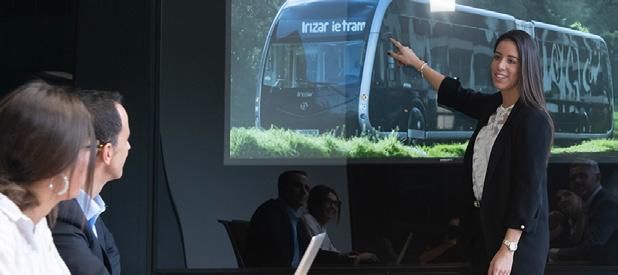
motto “Building the Irizar of today and tomorrow”, among various work areas, to think about the situation the organisation is in. At those meetings, it was once again clear that sustainability has a fundamental role, in accordance with our future strategic lines and commitment to searching for sustainable mobility. More details about the meetings can be seen in subsection “4.3.2. Communication and transparency”.
The entire integration of sustainability into our strategy and operations is handled in more detail in chapter 2 about our Sustainable Competitiveness.
We establish cooperative relationships and maintain permanent contact with vocational training centres and universities in our local environments to facilitate access to employment for young people and to incorporate the best talent.
We establish cooperation relationships and we are in contact with the Universities in Basque Country (UPV, MU, Deusto, Tecnum, etc.) through their different Employment Forums. And we collaborate on the training and incorporation of students in the job market and teaching conferences and classes in advanced Master Degrees in accordance with the university curriculum. All this enables us, on the one hand, to attract the talent of young university students to our organisation, and, on the other, to transfer the characteristics of the profiles of our organisation to universities.
The work done in 2022 and prior to the pandemic to continue with the initiatives already discussed in detail in the point about quality in hiring, was continued in 2023.
• Scholarships for different university programs.
• Option to carry out the final project.
• Possibility of internships for advanced training cycles.
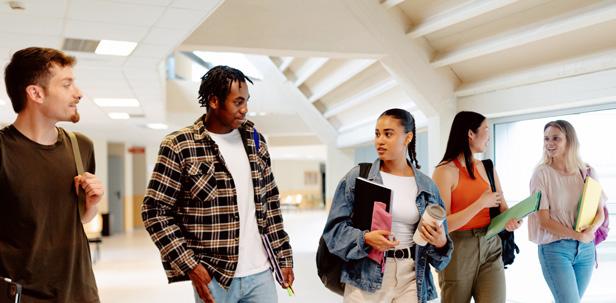
Whenever we think it is possible, at Irizar S. Coop. we open internal promotion processes to cover positions with higher responsibility or a different work area, letting the person increase their very important vision of the company. These are systematic and rigorous processes with a similar or greater level than the processes for new hires.
In 2023, eighteen people were promoted to cover organisational needs created by needing to handle new business challenges. There were eight people in 2024.
4.3 Communication, transparency and participation
4.3.1. Leadership and teamwork
Starting from the CEO and the rest of the Executive Team and reaching all levels of management, it is VITAL to promote and display a commitment to all People based on trust, communication, leadership, involvement, self-management and teamwork. This priority of our management model is basic for the motivation of people. Leadership makes it possible to create self-managed team work environments with people committed to the values, clients, strategy and excellence in management at Irizar. Leadership and teamwork are key to our future Sustainable Competitiveness.
4.3.2. Communication and transparency
Communication and transparency are the cornerstones to ensure information and knowledge about the corporate strategy, the projects, objectives and the monitoring of the daily activity, flows and is shared by all. We make the most important events, advances and
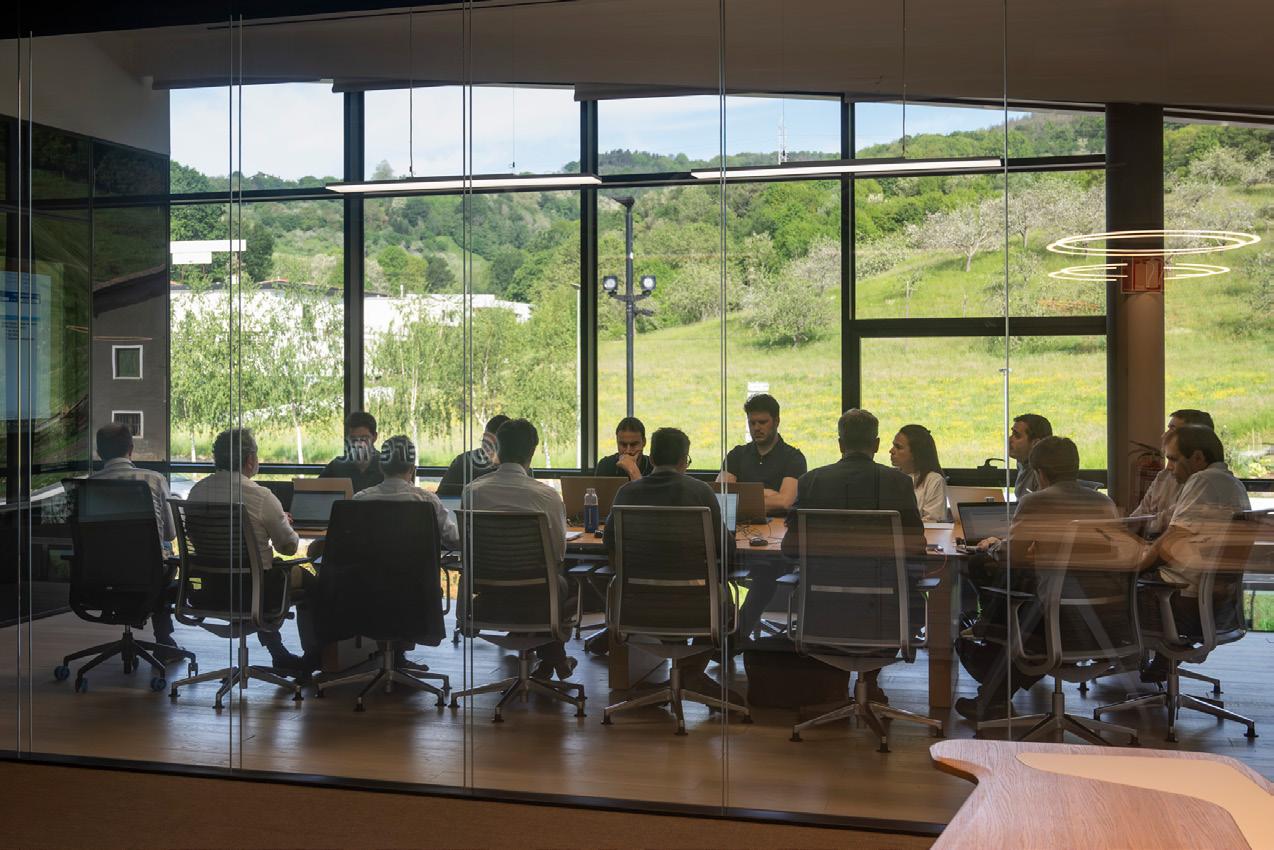
achievements of the company public (economic-governance, social, and environmental), as well as the evolution of the sector and economic and socio-cultural activities.
But fundamentally, we believe that internal communication is the way to strengthen our corporate ethics and culture, and generate integration, satisfaction, motivation, and involvement of all personnel. This communication model makes it easier for us to have personnel who are increasingly committed to Sustainable Competitiveness, while having them share in the actions and decisions that affect them.
The structure and communication channels that contribute to guaranteeing the flow of information to/from everybody, are active and subject to constant review, both in the operation of business processes and for strategic reflections (as detailed in the “Participation in Strategic Thoughts” section), taking into account the opinion of all representatives of the work teams that represent Irizar personnel, both directly and indirectly.
The continuous two-way communication dynamics are part of our management model based on self-managed multifunctional teams to address both Irizar's strategy and daily operations.
Additionally, we have complementary internal communication channels, including:
These are the main mechanisms for communication, carried out directly by the CEO and the Executive Team and where the most relevant information is posted for all Irizar personnel. The following is carried out annually:
• Two Assemblies where purely strategic issues and annual action plans and legal issues related with the cooperative are discussed. These assemblies are open to all the personnel of Irizar S.Coop., although only employee-members are able to vote.
As we saw in the chapter about “Sustainable Competitiveness”, in the assemblies we always discuss Sustainability within the global strategy and progress of the company. For example:
o Sustainability is an essential key competitiveness factor of the Irizar Group.
o The new version of the code of ethics was presented in 2020 for approval by all the members.
o In 2020, the sustainable development goals (SDGs) of the 2030 Agenda that we have chosen at Irizar as high priority and very important for increasing our future commitment to them in a strategic and operational way were presented.
o Since 2020 sustainability has been set forth as the axis around which the rest of Irizar’s strategies revolve, especially for sustainable mobility.
• Meetings of the Customer Line Team (ELC) that we have held for decades. A quarterly review of daily activities in reference to the annual goals, presented by members of the Management Team and other managers from different teams and operational areas, was done at the meetings. The CEO used the opportunity to spend time with everyone in the organisation and give them the chance to channel and express the concerns and issues that affect them as workers. All dissatisfactions, suggestions or proposals are collected so they can be analysed and action can be taken to resolve them.
The pandemic made evident, even more if it's possible, the importance of communication and transparency in organisations. That situation did not prevent Irizar from holding several ELC meetings in 2020 and 2021 where new decisions made and the market and company situation were explained in detail.
• Those meetings, as we pointed out in section 4.2.3., have been renamed since November 2022, and are now called “Building the Irizar of today and tomorrow“, with the goal of leading the redynamisation of the organisation to catalyse the development of the brand, technology and sustainability. They are led by the CEO and other members of the Management Team participate actively, DRIVING the re-motivation of the organisation to bring about an improvement in the organisation’s performance and capabilities to take on new challenges (taking sustainability into account as well as technological evolutions in mobility and digitalisation), that are going to bring about very large technological changes in products, services and the way of working.
• The Social Council is the internal representative body of the member-workers for the issues that affect the employment relationship. Its functions are:
A. To inform, advise and consult the Governing Council in matters that affect the employment relationship
B. To inform its representatives and collect contributions and opinions from them, on job roles and issues
C. To record in the minutes issues relating to daily activity and the monthly economic position, but also decisions made at the Governing Council meetings, issues related to Health and Safety, the environment and social issues
D. Make the minutes of the Social Council meetings available to all workers by publishing them and sending them by email to all workers every month.
In addition, at Irizar we extend the dynamics of the Social Council to temporary (non-member) employees to both receive their contributions and consultation and to make the minutes available online.
• Questions concerning the labour arrangements of member-workers are regulated in the Regulation of Internal Arrangements Irizar makes extends those labour arrangements to non-member employees in regards to:
o Labour organization
o Work schedule (working hours, calendars, overtime, shifts, bank holidays, vacations, leaves of absence, etc.)
o Professional classification (professional development, internal promotions, training, etc.)
• As we mentioned above, in the daily dynamics with the workers with employment contracts, the same criteria are followed as with members, even though, administratively, they are subject to the national metal worker collective bargaining agreement
• Daily meetings of every ELC (client line team): They were reactivated in 2022, after the stop caused by Covid-19, with the goal of resolving incidents in each production line. Led by the client line coordinator, they bring together a multidisciplinary group with representatives from production, quality, engineering, supplies and direct employees (MOD), from all areas of the line (framework, body, painting, finishes and electricity).
• TV screens installed in all break areas are used to complement and provide better news coverage and general information about industry news, economics, photography and videos about Irizar and people from it and their achievements, sustainability culture and strategy or visits to our facilities (by clients, institutions or the media), as well as collaborations and aid for culture, sports or NGOs, etc.
• Information centres and electronic panels: There are communication centres and electronic panels at access points and
generally visible in the facilities that show issues relating to quality, internal communication, plant images, health and safety, sustainability and the environment.
• Irinet or Irizar's Intranet, is a tool for compiling and centralizing all the information posted at Irizar. It also provides services that go beyond the daily management, including cultural activities and dictionaries.
• Direct emails: Using direct emails lets us make all relevant information available to the entire collective. It's a tool that's growing in use. More and more information is being sent through this channel.
• Social Council WhatsApp: Additionally, and prior to sending the minutes of the meetings of the Member Council, in 2021 we started sending summarised notifications of the main issues discussed by the Member Council to all Irizar workers, both members and regular employees.

In order to take on our ambitious strategic goals in terms of brand, technology and sustainability, we are aware that we must provide a response to: higher and higher technical-technological demands, the growing complexity of our business and our entire value chain (commercial, design and development, product and services execution), weaving alliances and working in collaboration with all our stakeholders.
The growing need to adapt to changes and new challenges, like staying ahead of the future, demands more and more training that is more specialised. Accordingly, Irizar works constantly in favour of quality education to empower talent.
Innovation is part of our DNA and organisational culture. We want to expand the limits of knowledge, discover new ways of making products and providing services that are truly different, and stay one step ahead and respond to the training needs that arise in our strategic reviews (annual and medium/long term), and to the ideas and suggestions of our stakeholders:
We started multidisciplinary training plans suitable for people who are eager to improve their qualifications, their background and the breadth of their skillset, and we see all that as benefiting an increase in knowledge of the quality of our products and services and improving our Sustainable Competitiveness. 4.4
Most of this training is delivered internally. Internal training courses include:
• The welcome plan for new hires that includes training-education sessions to smooth their integration into the company, knowledge of the culture and strategy of Irizar, the integrated quality and environmental systems, workplace health and safety, and other policies and internal rules.
• Training in versatility of direct personnel. This entails increasing theoretical and practical knowledge to handle working in other positions. And it facilitates being able to respond to the personal preferences of every worker, take on new market demands and improve the quality of our products and services, as well as to be able to act preventively in terms of ergonomics, and improve posture changes and other measures that help improve health and safety.
• The continuous flow of people between production plants in different countries and companies in the Irizar Group to support, drive and take advantage of the synergies between activities and actions that are done within the strategic lines and work set forth with the fundamental goal of increasing their knowledge and skills, in addition to doing constant training in the innovative issues and solutions that are incorporated into products and services, management, image, sustainability and implementing technology. Thus in 2020 and 2021, because of the tight restrictions on international travel, moving people between plants was not possible. In 2022 some exchanges of people could be done. In 2023, the movement of people between plants working in the Group and facilitating synergies increased.
• There was constant training and qualifications in critical manufacturing processes (welding, gluing and painting), for direct staff with the collaboration of our integrated suppliers or specialised external companies.
• In 2021, we could highlight the training received by everybody in workplace risk prevention issues. Many hours were invested in general issues, like role specifications, including the decalogue for handling Covid-19.
The internal training plans were complemented with continuous training programmes done by external professionals. The intensity and content of the training has more variation and it's more closely linked to changes in strategic focus, new lines of products and services we're undertaking or new markets, etc. Their qualitative evolution is shown on the table below.

Hours dedicated to training 4119. 3122. 3066. 1075. 12110. 1114. 1075. 4495. No. of people 236.
(*) The usual face-to-face external training was restricted in 2020. It could only be done for one quarter.
In 2022, we can highlight the voluntary training given with a broad focus in both cases, but adapted to the different needs and concerns of direct staff (MOD) and indirect staff (MOI):
A. Training for direct employees in management that merges concepts about quality, conflict management, team management and leadership, communication, IT and IRIZAR product-processes and new trends in mobility. It was a four-month course given by Goierri Eskola, except the last concept, which was developed internally. It was very well received by the participants.
B. There was training for indirect staff with the specialisation in cooperative business management course. It was organised by the Mondragon Unibertsitatea business school and KONFEKOOP (Confederation of Cooperatives of the Basque Country). In four months it included five personalised modules for managing cooperatives, in which participants learned about:
1 Economic-financial management
2 Strategic management
3 Marketing
4 Management skills for cooperation
5 Applied final project
This course still has practical continuity at Irizar. Because several work groups have emerged out of the people who received training that are working on improving specific aspects of management at Irizar, like digitising production management tools, analysing the viability of implementing a CRM (Customer Relationship Management) system, etc.
We have also continued with sustainability training:
• Online given by the United Nations Global Compact and other bodies (2030 Agenda and SDGs, ethics and good governance, supply chain and human rights, ESG trends, climate change, etc.).
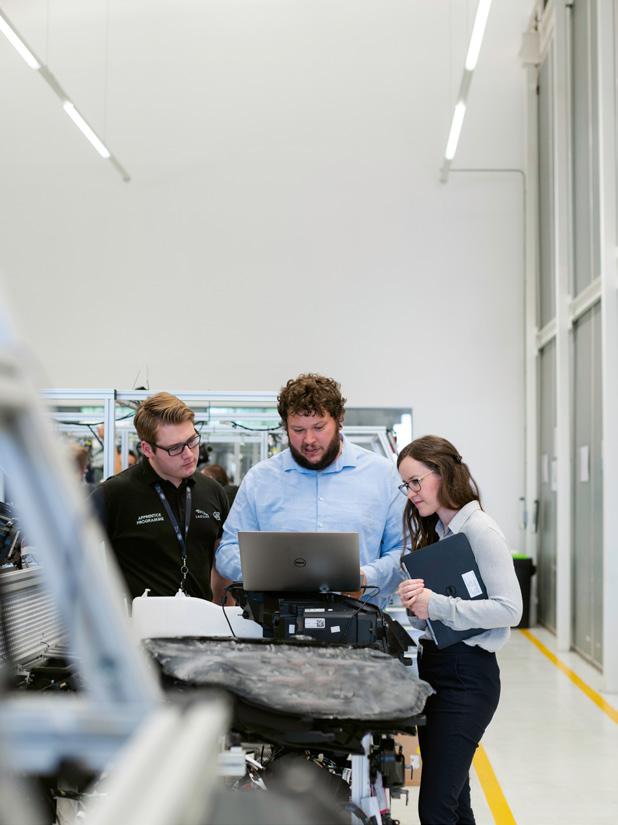
• In 2021, representatives of Irizar were trained within the SDG Ambition accelerator programme of the United Nations Global Compact, which more than 700 companies participated in internationally. It is a pioneering programme with a new methodology that helps us set ambitious SDGs (Sustainable Development Goals) and integrate them into the centre of our strategy and operations to contribute to the prosperity of people and the planet.
• From January to September 2023, and with backing from upper management, People Management and the Irizar Sustainable Competitiveness Manager participated in the Business & Human Rights Accelerator learning programme by the United Nations Global Compact, that was designed to give companies the tools and knowledge they need to create a continuous due diligence process for human rights and guarantee that human rights are respected. That training facilitates our progress with our commitment to and practices regarding human rights, to prevent risks and avoid injury to people.
• In 2021 and 2023, we trained the Management Team and President of the Governing Council in sustainability and SDGs/2030 Agenda. Every manager will keep involving people in their area of the next level of responsibility in the organisation. Commitment and involvement by the top managers at Irizar is important for reaching the future goals that have been set.
Beyond professional training, we do awareness raising and training initiatives in sustainability Among the awareness raising courses and campaigns we did in 2024, we continued with the dynamics of 2021. We can highlight:
• International Women's Day
• International Day for the Elimination of Violence against Women.
• The SDG Speaker campaign to raise awareness about the issue among our stakeholder groups.
2023 was, without a doubt, a year of opportunities. As in previous years, we continued reinforcing training, versatility, communication and flexibility for clients or the ability to adapt to change.
As we saw in chapter 2, about Irizar and Sustainable Competitiveness, and in section 4.1. of this chapter, as part of our contribution and impact on the 2030 Agenda SDGs, we have designated three high priority KPIs in training/awareness raising for people at Irizar in terms of ethics and compliance, gender equality and Sustainability.


4.5
Respect for diversity, gender equality, non-discrimination in employment, dialogue, professional development and knowledge sharing are our priorities, which is reflected in our Statutes and Strategic Thoughts.
As regards diversity, our statutes include:
“The following will not be reasons for denying admission: political, trade union or religious ideologies, (as well as the race, language, sex or marital status of the candidate) unless these are explicitly opposed to cooperative principles and organisation and to the goals, commitments, values, and principles of Irizar. S. Coop.”
Our selection processes are non-discriminatory in terms of sex, age, race, nationality, religion, disability, sexual orientation, union or political affiliation.
We do not tolerate discrimination in employment for any reason: All personnel hired at Irizar are covered by the same conditions, including salaries, as long as they are filling positions with the same level of responsibility. That principle is stated in the statutes of the cooperative and the Strategic Thoughts.
As we stated at the beginning of the chapter, in 2019 we started the Social Innovation Project for Equal Opportunities for people, focusing, among other areas, on managing: gender (reinforcing the Equality Plan), diversity (Race, Nationality, Religion, Sexual Orientation, etc.) and social
inclusion. Among the conclusions of the diagnosis (addressed in the first section of this chapter) the following are of note:
• Gender: “there is a limited presence of women in general and that is reflected in the management bodies of the cooperative”
• Diversity “there is no discrimination against LGBTI people or people with different socio-cultural backgrounds. But there are comments.”
• Social inclusion: “People with functional diversity can carry out their jobs without problems, but their presence is limited at Irizar.”
As already mentioned, the goal of the project is to continue making decisive progress in improving these aspects.
4.5.1.
In 2021 and 2023, work was continued on updating the gender equality plan.
• Because it is high priority, work was done on the protocols against sexual harassment and gender harassment in the workplace. It was approved by the top management of the organisation in 2022 and it was put into action by doing diverse specific training for people involved in the project so they can act as mediators for any need in that regard.
• The improved equality plan It was approved by the top management of the organisation and the main ideas planned in the general assembly in late 2022 were presented to the entire collective.
In 2023, we kept promoting training in gender equality in the entire
collective of people at Irizar, including the new equality plan and harassment protocol. The existence and functioning of the protocol for sexual and gender harassment in the workplace was presented to all the workers at Irizar. The harassment protocol has been part of the welcoming plan for all new hires since 2023.
Likewise, we keep cooperating with training centres in the local environment to promote and facilitate increased incorporation of university and upper training cycle students into company internships. As our Strategic Thoughts and statutes show, age is not a restriction for hiring people at Irizar.
We are very aware that we have a wage gap to reduce that we are evaluating for improvement with the equality plan. And, as we saw in chapter 2 about Irizar and Sustainable Competitiveness, as well as in section 4.1 of this chapter, we have defined three high-priority KPIs related with gender equality in our contribution and impact of the 2030 Agenda SDGs:
17 Increase gender diversity, especially in roles with responsibility and for new hires
18 Reduce the wage gap between men and women
19 Train/raise awareness of people about gender equality

4.5.2.
As an international group, diversity is part of our culture and we understand that it is an enriching value. It enables greater knowledge of the needs and desires of our stakeholders around the world to consequently adapt our products and services to their needs.
• We have personnel from our team assigned to the different production plants around the world, who interact with the Irizar Group headquarters, with closer proximity to international customers. In this way, we have strengthened the Irizar brand worldwide and make foreign projects more competitive.
• In addition to the constant flow of group personnel between bus production plants in different countries for training and to benefit from synergies, as already discussed in the section titled “Reinforcing talent: education and training”, we try to benefit from synergies that arise through the experience of Irizar and the possibilities its presence in international markets with production plants presents to carry out implementations in the rest of the companies in the group in the countries where it is present. Hispacold and Masats emerged in that way, as did the ones by Jema in Brazil, Mexico and the USA.
All our facilities are equipped to facilitate accessibility of people with disabilities. Disability is another area that is not subject to any type of discrimination.
In a complementary way, our approach is to work with external collaborators who host or hire people with disabilities (as we saw in the corresponding chapter).

4.6
This last section of the chapter, on responsibility to our personnel, is undoubtedly very important.
In terms of hygiene and ergonomic-comfort measures, at Irizar, we are at maximum levels, above the legal requirements and other cooperatives and companies in the local sector.
In 2024, we continued making serious efforts to guarantee that people in the group have the best working conditions. We always have the clear goal of surpassing the minimums set by legal requirements and give people in the group the PPE they need for protection, health and safety.
4.6.1.
The Irizar S. Coop. occupational risk prevention system (the same as in other companies in the Irizar Group) prioritises people’s safety before anything else and they dedicate the resources needed for it. It includes all measures for the prevention of accidents and illnesses related to daily work. Our basic accident prevention tool is a risk assessment of jobs and work processes.
The strategic importance of safety and health for Irizar is demonstrated by:
• it being given a high priority in all the assemblies Data are provided both on the indicators and on the actions and investments made in the year to improve health.
• The dynamics, established more than 25 years ago, of monitoring by the Health and Safety Committee of all accidents, incidents, audit results (internal and external), inspections (safety and health, industrial safety of all facilities), and proposals for improvement that affect health.
o The Committee, led by the Health and Safety manager (who reports to the Management Team), does integral management of those sections monthly.
o The members of the Committee include:
* The CEO, People Manager, Industrial Manager, Production Manager
* the President of the Governing Council,
* the risk prevention delegates who are members of the Social Council, and
* other members from different areas related with the issue of health and safety.
o The committee is open to any person at Irizar who can transmit the message they wish to the delegate for their area or any member of the committee.
o Their goal is to ensure that all the guidelines are followed, in addition to the legal requirements in terms of workplace health and safety, doing monitoring of the results of those issues.
• Inspections are done periodically Likewise, internal audits are done continuously.
• 100% of the injuries, accidents and incidents were analysed Within this framework, actions have been initiated, and the necessary investments were also made in 2024 and safety has been improved. In particular, risks that may involve serious consequences have been reduced.
The Irizar prevention service is included in the joint OSARTEN service, in which Irizar has included preventive activities in the specialities of safety, hygiene, ergonomics and psycho-sociology, while the external prevention service is managed with Quirón Prevención, in the speciality of preventive medicine.
The Health and Safety Team provides personnel with essential safety plans, instructions, and procedures focused on prevention and continuous improvement. These guidelines emphasise the obligation to act responsibly and likewise underline the fact that each person must actively participate in the measures. Personnel may access this information through various means, including computers available in all production areas.
Initiatives are also carried out to raise awareness among personnel regarding existing risks, with emphasis on the culture of work safety, training, workshops, communication campaigns, etc.
Frequency and severity rate
hours worked)
Severity index (number of days not worked due accidents at work based on the effective number of hours worked)
The frequency rate (number of accidents per hours worked) stayed the same in regards to 2021.
The severity index (result of the number of hours missed for every thousand hours worked), has increased because people are taking longer leave.
Incident rate (number of accidents per number of employees)


Fundamentally as a consequence of working on more standard vehicles, in 2024 the incident rate (number of accidents per number of employees) decreased in regards to previous years.
After the exhaustive analysis we did in 2018, in which we identified an increase in the number of accidents among new hires in comparison with the previous year, a need for a 2019-20 Health and Safety Training Plan was created for all new hires. It is a training plan based in the metal agreement, which we started to plan in 2019 and was carried out in 2020 and 2021. It is not just for new hires, but it has been extended to all workers (temporary and members). During 2021, 80% of people did the training from the metal agreement about preventing risks in the workplace.
We reassessed the format of the training in 2022 and 2023. And in 2025 we will continue with the new focus. It is our intention that, with this change, the more than evident involvement of everybody who has shown it up to now will continue. Starting in 2025, we will start with periodic training in recycling from the metal agreement. Of the newhires practically all of them have that training.
We believe we have to provide a safer and more healthy workplace. To those ends, as you can see in chapter 2 about Irizar and Sustainable Competitiveness, and in section 4.1. of this chapter, we have made it a high-priority KPI to provide a safe and healthy environment (reducing the accident frequency and incident rates) in our contribution and impact on the 2030 Agenda SDGs.
Personal ergonomics is an unwavering principle when applying any innovation to products and/or productive processes, with the primary objective of adapting the job position to personnel. It is our responsibility to start working on these aspects during the conceptual stage. Irizar is a benchmark in ergonomics and comfort: We invest what is necessary in this field in order to prevent possible injuries. To those ends, we have spent years focusing efforts on providing maximum ergonomics to all jobs with solutions, in many cases, designed and developed with the participation of the employees themselves.
The Irizar ergonomics program includes job rotations as a preventive measure, as required (physical disabilities, weakened health, ageing, etc.). We carry out continuous evaluations and job improvements that have resulted in investments in the implementation of different measures (weightless tools, handling trucks, external manufacturing, etc.) to reduce the handling of loads and repetitive movements. In the last few years, the investments have been aimed at thermal comfort in the entire company.
It should be noted that a work group has been assembled that different areas participate in with the goal of carrying out ergonomic improvements in several areas, like implements, manipulators, tools, exosuits, etc.
Below is a summary of the measures implemented in recent years. Most of these are specifically designed with the participation of the Irizar personnel with the aim of offering optimal conditions in terms of ergonomics and occupational health:
Occupational risk prevention management
• Start of the multi-year development project of the new OHP management programme and transfer of data from the current system to the new one.
• Application of corrective maintenance in the Intranet-iWeb.
• New project for registration and grouping of all climate control equipment in the existing industry files.
Psychology:
• A plan has been made to re-evaluate psychosocial issues in all departments, with a new Osarten methodology.
Ergonomics:
• Work platforms for sheet metal roof shapers.
• Turners for the manufacture of roofs and roof duct handlers.
• Installation of lifts and adaptation of their regulation systems for postural improvement in structural welding and safety improvements.
• Aluminium shapers to reduce weight.
• Manual handlers for processes involving loads in sheet metal and assembly areas.
• Handling of front and side windows with weightless systems.
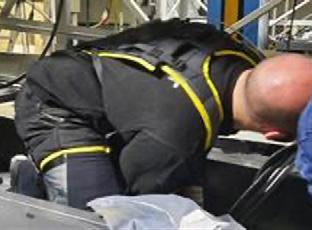
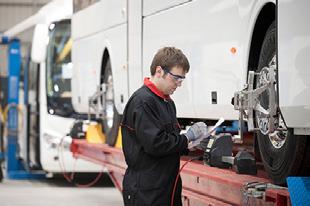
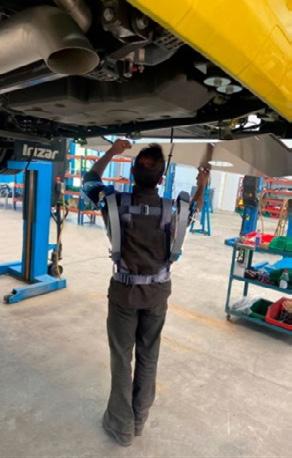
• Lifting systems using vehicle columns for ergonomic improvements.
• Handler for installation of seats inside vehicles.
• Automatic sander for preparing boxes
• Handler for front windscreens and central covers in SAT
• We've recently acquired several exosuits with the goal of including them into our production process in the plant where the final assembly of the integral coaches takes place. Ekso, Noonee and HeroWear. This latest generation technology helps reduce the physical demands for people and contributes to preventing injuries and ergonomic risks from work.
• Work on the Omer elevator, to expand the gap between platforms for better accessibility.
Hygiene:
• Investments in the manufacturing and roof assembly area aimed at thermal comfort by installing evaporative coolers.
• Storage of all APQ10 chemicals.
• Substitution of critical chemicals with non-hazardous chemicals.
• Implementation of motorised breathing equipment for all painting and framing processes with maximum protection.
• Push and pull suction equipment in critical areas with suspended suction equipment for work on vehicles.
• Heavy-duty suction equipment for sanding tasks.
• Automation improvements in cabins to minimise hygiene exposure.
• Status control for filters by automatic notification (4.0).
• Localised suction for dust exposure.
• New air conditioning control system in the production plant and offices on the ground floor.
• Plant evaporators in the sheet metal area.
• Nederman suction plate installation improvements.
• Automation of paint booths to optimize resources: SAT, parts booth and all the booths for painting structures, Painting 2
• Facilities to improve thermal comfort with evaporating plates.
• Control substitution and improvements in the suction of the reinforcement area in the plant.
Security:
• Installation of collective protections for cabin maintenance.
• Adaptation of facilities to new regulations and subsequent industry review of fire protection measures.
• Fire-fighting equipment (sprinklers) cabin painted structure finished. Warehouse for chemical products, glues and paint.
• Paint booth lifting platforms Place a chain entrapment detector at the outlet of the reducer.
• Improvements in the acoustic signalling of fire protection equipment.
• Close hydrant ring, covering the field
• Life lines
The facilities have also undergone significant improvements to reach the highest levels of ergonomics, thermal comfort, hygiene and health of personnel:
• All facilities have been air-conditioned for all jobs, with improvements to prevent currents in certain work areas for optimum temperatures and working conditions for Irizar personnel in both winter and summer.
• The lighting system has been replaced with adjustable LED technology with the aim of increasing the lumens in work areas.
• It has been equipped with general suction systems for environmental hygienic improvement.
• Installation of glue booths for all work with exposure to glue.
• Improvements to hygiene conditions in the painting section by providing all workers with protective equipment that reduces exposure to chemical agents to inappreciable levels.
• Purchase and installation of defibrillators in all areas and facilities of the Irizar headquarters.
• New transformation centre for vehicle chargers
• New hanger for gas vehicles with a refuelling point (H2 and Ch4)
Clothing and equipment:
All clothing and equipment used is compliant with the specific UNE Regulations. People participate directly in the selection and improvement of the clothing and PPE. The distribution of the latter is done using dispensing machines that are in permanent communication
with the supplier, which makes an unlimited PPE ordering system with complete traceability possible.
Digital transformation or industry 4.0:
We are continuing with the steps started in 2018 towards digital transformation, or industry 4.0, with the incorporation of:
• Team and critical process communications to areas involved with them, paint booths for painting structures, SAT, parts, retouching, Paint-2 (production lines A, B and C).
As we said at the beginning, we consider Irizar to be a benchmark in hygiene and ergonomics-comfort measures, and we hope to continue in this line, with the involvement of all workers. Likewise, among the goals plannedfor improving working conditions and facilities, we can highlight:
• A multidisciplinary team to improve ergonomics with the participation of the workplace risk prevention, physical therapy services, production and staff areas
• The implementation of a new ergonomics software application
• Continuous development of a business continuity plan in collaboration with the insurer
• Monitoring with the training of the metal collective bargaining agreement and new people who are hired at Irizar
• Creating new drive technologies: ie truck, hydrogen coach, etc.
• More ergonomic improvements in prior, SAT, bodywork areas, etc.
• Progress in automation
• Medical care for people (occupational and emergency) Irizar provides all its people with integral medical care and services. At the facilities, we have a medical service, which has the necessary means to carry out measures for the prevention of general health problems, such as occupational illnesses, maintenance of occupational health, and diagnosis and treatment of acute illnesses related to injuries and accidents.
Periodic medical check-ups are carried out with the health monitoring service according to the protocols established as a form of health prevention.
• Physiotherapy service. We also have a daily physical therapy service in the facilities as a preventive measure for postural and ageing problems.
• Additionally, people who are members of Irizar have personal health and dental insurance with leading Spanish companies that have excellent coverage. As an additional service, it offers the option of providing medical and dental coverage to direct family members under absolutely advantageous conditions.
Irizar also has integral personal medical insurance for all contract employees with more than one year of seniority until they become members.
• Periodically, Irizar engages in a continuous task of promoting healthy lifestyle habits through campaigns and counselling. The aim is to convey healthy values and help improve health, both personally and at work.
In 2024, two sessions were done with specialists from ASISA SALUD that all members of Irizar could attend:
1. Sleep better, feel better, achieve better
2. Emotional hunger The influence of emotions on nutrition In general, the evaluations of the 50 attendees were very positive, because they found the issues relevant and closely related to problems in society today. The attendees also actively participated in the sessions, and they could share experiences that were common to all of them.
• Dining area. Irizar has its own food service, offering all personnel the possibility of eating a high-quality healthy diet, including fresh products from local farmhouses and establishments. Continual improvements are made to the menu and cooking methods in the company dining area (reduced salt, oil, fried dishes, etc.). This has been extremely popular and the number of guests served in the dining area has increased significantly. Among others, consumption of salad is encouraged by setting up a salad bar in the company dining area as a complementary option to the daily menu.
Good eating habits are also promoted through TV screens in the dining area. A new communication platform to promote healthy habits is going to be installed.
• Physical activity is also encouraged, sponsoring people participating: representing Irizar in Empresen Lasterketa (business race in Donostia) or in other sporting events (Zegama Aizkorri, Ehun Milak, etc.).

Irizar encourages recreational activities outside the workplace for workers, to facilitate closeness to their families and enhance their sense of belonging.
As an example, those that took place in 2019: Photography competition, Korrika (a march held in Euskadi in support of the native language, Euskera), and the Exit to Ondarre (a hamlet for learning about the rural way of life that we have very close).
Also, we have taken the opportunity for new activities, coinciding with the first months of the pandemic in 2020, to be united with families:
• A drawing contest with the theme “Irizar and buses” with awards in three categories (up to 8, 9 to 13 and 14 to 18)
• A contest to create an Irizar logo aimed at families of all companies in the Irizar Group, which had three awards
In 2021, promoted by the Basque language group at Irizar S. Coop. (Euskara Taldea), a contest was done of summer videos, which was expanded to other bus production plants of the Irizar Group (Mexico, Brazil, South Africa and Morocco), with the goal of bringing value to language of every place. Thus videos could be sent in Euskara, in your mother tongue or in the language that is used in the place you are.
In 2022, organised by the Basque language group at Irizar S. Coop. (Euskara Taldea):
• We had a summer photograph contest Recording and sending videos
about people at Irizar internally. There were brief interviews where they talked about their hobbies, like cooking, bertsos, singing, etc.
• We participated in the 2022 Korrika and carried the baton for the kilometre in front of Irizar.
• Celebration of Basque Language Day, where an IZIR brand circular economy mouse pad was given away, which is discussed in detail in the “environment” chapter.
• A gymkhana of questions was organised with a prize (a basket of products from Errigora).
In 2023 organised by the Basque language group at Irizar S. Coop. (Euskara Taldea), we:
• Celebrated Basque Language Day at Irizar. For that reason, we also participated in a workshop organised by Ingudea, a commission Irizar participates in with other companies from the Goierri comarque (CAF, AMPO, Ederfil Becker, Eredu, and Indar-Ingeteam), and that has two main goals: that more companies in the comarque join the initiatives to normalise the use of the Basque language in the workplace, and that the companies (Irizar among them) that make up Ingudea learn from each other. At the workshop, four companies presented their goodpractices and, afterwards, they exchanged opinions, talks and a few pintxos.
• We had a summer photograph contest
In 2024 among other activities for the Irizar S. Coop, Basque plan:
• We had a meeting of companies from the Basque Country Autonomous Community, some of which are under way in normalising the Basque language and others want to get started, to share and
learn best practices, achievements and difficulties with Basque language plans.
• A procedure was approved so that final degree projects can be written in Basque, when the company, students and degree advisors think it is possible. In 2024, seven of ten students did their final project in Basque.
• The 23rd Korrika a benefit run held in Euskal Herria to support the Basque language, was held and Irizar participated when the runners passed near their facilities.
• We created an online bilingual dictionary (Spanish-Basque/BasqueSpanish), that has the terminology used most often at Iriza
• Several contests were organised during the year including a Christmas photography contest, a Tour de France pool and a gymkhana with questions that almost 120 people participated in during two weeks.
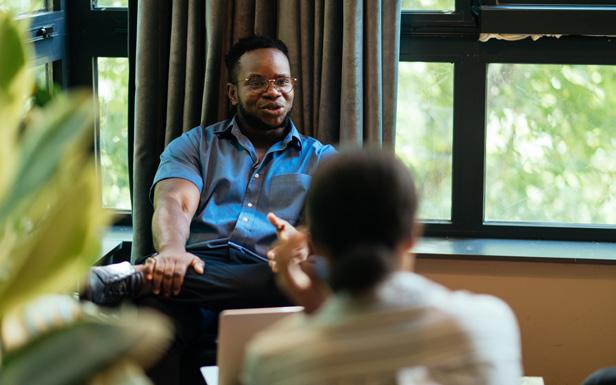
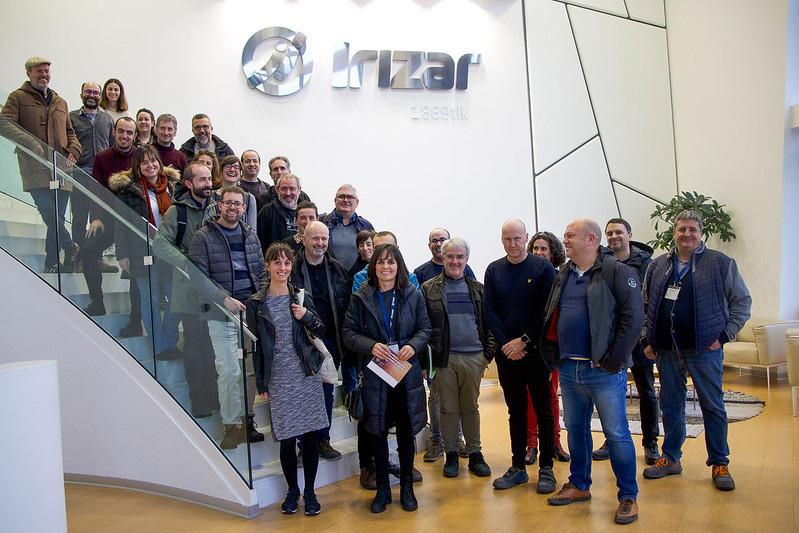
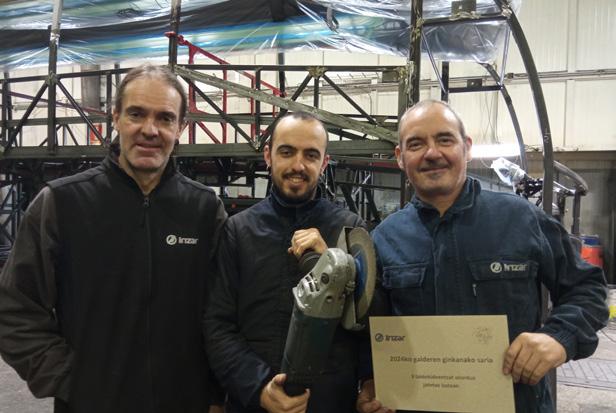

Contributing to the SDGs and the goals of UN 2030 Agenda:

8.1
8.2
8.5
8.7
8.8



9.2
9.5
11.2
11.6



12.6
12.8
12.B.


5.1
Our value chain
• Commitment to a sustainable value chain integrated with the 2030 Agenda SDGs
5.2
Distribution, sales and after-sales network
5.3
Sustainable Supply Chain
• Sustainability requirements for our suppliers.
• Supplying cells for batteries and complete battery packs
• Questionnaires about behaviour and environmental improvements for suppliers
5.4.
Purchases committed to the social surroundings
5.5
Logistics optimisation at the Group level
5.6.
More agreements and strategic alliances
• R&D - Projects for the future
• Basque Hydrogen Corridor: BH2C
• UITP (International Union of Public Transport).
• Alliances and collaboration with the environment.
• AERCE (Association of purchasing, contracting and supply professionals).
Operations at Group
As we saw in the chapter on "Sustainable Competitiveness" our entire value chain is focused on creating value for our customers and other stakeholders, raising awareness and encouraging everyone to share our commitment to sustainability, to increase the positive impact that together we can have on People and the Planet.
Consistent with our business strategy, our alliances with different outside collaborators play an important role in Sustainable Competitiveness at Irizar.
In addition to the different types of collaboration that we establish with external partners, supply chain and alliances that we discuss in this chapter, we also discuss special relationships and alliances with partners in the rest of the chapters of this Report:
• “Sustainable Competitiveness”: United Nations Global Compact And how we contribute to raising awareness about Sustainability throughout society by actively participating in various forums.
• “Clients, passengers and citizens”: Clients, the European Commission, consortiums, associations of haulers, in addition to agreements with other organisations and European research centres we share technological innovation projects with, collaboration agreements with other companies to develop products or functionalities jointly or to give a second life to batteries.
• “People”: we have agreements with universities and training centres.
• “Environment”: Foundations and organisations we collaborate with for the circular economy of production surpluses and participation on the public-private initiative for the largest solar park in the Basque Country
• “Society”: We make a record of our collaboration and sponsorship agreements with not-for-profit activities and organisations and the
Distribution and AfterSales Network
Vehicle use
End of the useful life of the vehicle
social environment both nationally and internationally.
Our goal is to continue innovating and taking on new challenges, strengthening ties and looking for collaborators with the goal of staying at the global forefront and establish relationships and alliances with those collaborators based on Sustainable Competitiveness (economic/ governance, social and environmental). We promote pioneering alternative energy projects in new fields with collaborators focused on innovation and seeking new business models that promote the collective transport of people.
To those ends, in addition to our sustainability actions internally, with clients and with society in general, our goal is to raise the ambition of our commitment to guarantee a SUSTAINABLE SUPPLY CHAIN that includes suppliers and sales and distribution companies, and service shops.
As we put forth in chapter 2, about Irizar and Sustainable Competitiveness , in 2024 we kept improving our impact on the high-priority KPIs in our commitment to the SDGs of the 2030 Agenda. Consequently, below we are showing our sustainable value contribution to our value chain in:
A. CLIMATE : Reduction of scope 3 category 3 GHG emissions (caused by upstream and downstream transport by suppliers and clients), and category 4 emissions (caused by products and products that come from suppliers that Irizar uses) It can be seen in detail in the chapter about the environment.
C. TRUST AND INTEGRITY : Three KPIs for making progress towards a responsible supply chain: one of them with a changeable goal and the rest with goals to be specified later as we make progress on improving our Ethics and Compliance System and in human rights and the due diligence process, respecting human rights and the environment in global supply chains. All of that is discussed in more detail in chapter 2 about our Sustainable Competitiveness.
F. EXTENDING SUSTAINABLE DEVELOPMENT : We continued with a KPI with our commitment to contributing to making improvements in other people and external (public and private) organisations to
contribute to spreading the “oil stain” of Sustainability beyond our organisation to our stakeholders and society at large. We share our knowledge and experience with Sustainability in numerous forums, and awareness raising and training activities.

PRINCIPLES OF THE GLOBAL COMPACT

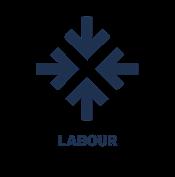




3. Reduce TOTAL GHG emissions
Includes:
Scope 1 and 2:
CATEGORY 1: Direct GHG emissions and removals
CATEGORY 2: Indirect GHG emissions caused by imported energy
Scope 3:
CATEGORY 3: Indirect GHG emissions caused by transport
CATEGORY 4: Indirect GHG emissions caused by products
Irizar uses
CATEGORY 5: Indirect GHG emissions associated with the organisation’s use of products
PRINCIPLES OF THE









12. Making progress towards a supply chain Manager with SUPPLIERS committed to sustainability
Strategic suppliers (A + B) with a SUSTAINABLE CONTRACT
a. New suppliers with SUSTAINABLE CONTRACTS
b. A+ B strategic suppliers
c. Suppliers with the most risk of infringement
o in human rights (to be specified)
o environmental (to be specified)
13. Evaluate/monitor our SUPPLIERS with higher sustainability priority
• Questionnaires ANALYSED from environmentally vulnerable suppliers
Suppliers with the highest risk of infringement:
• in human rights
• environmental
14. Making progress towards a supply chain Manager with a commitment to sustainability from other external involved parties: a. distributors
b. commercial partners
c. clients...
BASE YEAR: year data in blue if shown in OBJECTIVE later
PRINCIPLES OF THE GLOBAL COMPACT












23. Contribution to improvement in the sustainability of other external people and organisations (public and private).
Outside of Irizar S. Coop.
Sharing our knowledge of and experience with sustainability in forums and training and awareness raising activities:
• High priority stakeholders Clients, suppliers, distributors, etc.
• Group coach companies
• Other Group companies
• Students, external organisations and other people in the social environment
As we saw in chapter 3 “We create value for our clients, passengers and citizens””, we stay close to our clients through the entire value chain and we integrate them into our internal processes, for example, making them participants in creating new designs.
We have our own sales and after-sales teams And we are continuously expanding our sales, distribution and after-sales network around the world through collaborations and alliances with distributors and commercial partners in the more than 90 countries around the world where we have a presence. You can see our expansive network in detail at: https://www.irizar.com/en/after-sales-network
The development and expansion in the market of new technologies, like gas and hybrids, has gained ground through our own commercial network in Spain, Italy and France, providing reductions in consumption around 20% and reductions of CO2 emissions close to 30%. In 2024, the growth in countries like Germany and the consolidation of our subsidiary in Benelux should be highlighted.
Strengthening our presence in the public sector by winning tenders, like APT Goriza in Italy where we delivered compressed natural gas units, are a clear example of decarbonisation in urban settings.
Since 2022, irizar has been strengthening their commercial and distribution presence in several markets, like Norway, Germany and Sweden, in collaboration with Scania.
In Europe, which is the area of greatest influence of Irizar S.Coop., we are present in every country and, where we do not have our own network, we have commercial alliances with partners based on trust, ethics and the search for sustainable shared competitiveness. In the EU alone, the after-sales network has a coverage greater than 300 of their own and outsourced garages with mobile units operational 24h. The logistics network for spares distributes orders to the vast majority of Europe in 24h, which guarantees that vehicles can be repaired and back on the road quickly.
In December 2022, Irizar decided to drive progress in human rights in anticipation of the future European due diligence directive for companies regarding sustainability, respecting human rights and the environment in worldwide supply chains. In 2023 in the Business & Human Rights Accelerator programme of the United Nations Global Compact we learned, as our KPI 14, shown in the previous section, indicates we hope in the near future to add our distributors to the responsible value chain, basing our commercial relationships on the principles of the UN Global Compact (human and labour rights, anticorruption and the environment).
We gave training courses periodically to update the knowledge of the technicians at our extensive network of aftersales garages. They dealt especially with issues of safety, repairs and maintenance so they are top quality.
We have an online technical training system called itraining for training and repairing vehicles. The platform is aimed at Irizar dealers and distributors, giving them chance to do online tests and training at the same time they can contact other dealers in forums. In the last two years, new interactive content has been included that uses training courses for new systems/models that Irizar has launched on the market and that lets us transmit knowledge to the repair technicians for our vehicles with greater speed and efficiency. The tool has been judged very highly for training our repair technicians.
In order to provide the most complete services possible to our clients, at Irizar we have strengthened our repair and maintenance services and spare parts contracts with our clients. We are implementing an exclusive after-sales and warranty service in cities where electromobility and hybrid solutions are in use. Management is done in an integral and centralised way by expert technicians and people hired locally, which contributes to local wealth generation and employment. At the same time, there are collaborations with local educational organisations to provide opportunities for people finishing their studies to join an advanced technological sector like electromobility.
We keep developing monitoring solutions and remote-diagnostics solutions for Irizar vehicles using the platform where errors displayed on a vehicle's dashboard screen can be monitored remotely. The system also makes it possible to follow preventive maintenance plans in order to minimise vehicle stoppages. It is discussed in detail in the sections titled “Connectivity-Big Data” in chapter 3 about “Clients, passengers and citizens”.
Our suppliers and external partners are able to offer products and services that help us improve our brand and our competitive position, which makes them key links in our supply chain.
We enable a high level of integration with suppliers while developing our products and processes by mobilising and exchanging knowledge, specialisation, technology and resources. We encourage and promote setting up effective alliances by making the most of the various actors' experience and strategies. A noteworthy example of this is our alliances with key suppliers for integral coach components, without which the progress we have made in consolidating our strategic commitment to become manufacturers of complete coaches.
With the main suppliers, we establish what we call “logical management per coach”, for which these suppliers are integrated in the daily management of Irizar: production planning, purchase orders, merchandise received, and continuous customer revisions regarding confirmed specifications and corresponding items by coach.
Our alliances with suppliers are extended to provide services for clients during the life of their vehicle, both covering the warranty for the elements and providing the after-sales service that is needed. That is why our suppliers are present in our sales and after-sales network.
The Sustainability of the supply chain is administering the economic/ governance, social and environmental impacts over the life cycle of our vehicles and services. The goal of supply chain sustainability is to create, protect and cultivate, in the long term: the environment, social and economic value for all stakeholders that participate in bringing products and services to the market.
We are working for a sustainable management of the supply chain which allows us to:
• Establish good business practices in the markets we operate in around the world, and thus make our contribution to respecting and defending human rights, protecting the environment and climate, etc. at the same time
• we build trust with our stakeholders at Irizar as a responsible and sustainable partner, improving the reputation and image of our brand.
At Irizar, we promote and back responsible processes for acquiring services and raw materials at the same that we're committed to
reducing social, ethical and environmental risks in the supply chain. For that reason, when we start working with new collaborators at Irizar we include sustainability from the beginning of the relationship, even including it in the contracts we sign.
The goal is none other than guaranteeing that, in addition to following the law, our suppliers and their suppliers alike, must adhere to our supply chain sustainability standards based on the principles of the UN Global Compact (human and labour rights, the environment, and the anti-corruption).
In addition to establishing lasting relationships with suppliers that are competitive based on the parameters of a classic business relationship (quality, cost, service and innovation), we are committed to reducing social, ethical and environmental risks in the supply chain. We strive to work closely with suppliers and partners for compliance with our sustainability principles and also in their businesses. For us, it is essential that our suppliers and business partners have the same sustainability standards that we have established for ourselves. For that reason, at the margin of new incorporations, we are extending the purchasing contract based on the principles of the UN Global Compact (human and labour rights, anti-corruption and the environment), gradually to our strategic suppliers, even though we have had a stable relationship with them for years.

Despite the enormous problems in supply chains around the world and thanks to the high degree of integration and trust with our main suppliers, from 2020 to 2023 we were able to meet the demands of our clients without undergoing any stoppages on our production lines. It's during the hardest times when the solidity of alliances is most put to the test.
Our sustainability standards, which we began to implement in 2018, have defined the requirements our suppliers must meet, according to the contractual agreements signed. The most important requirements include the prevention of child labour, and unlawful employment, the establishment of ethical standards and anti-corruption policies, and commitment to environmental protection and selection of raw materials.
In addition to asking suppliers to present certifications of legal and regulatory compliance and a confidentiality agreement, the current contractual agreements we are offering to our strategic suppliers include the following sustainability terms that suppliers must guarantee:
• Respect for personal dignity, privacy and the rights of every individual
• No one on their staff is subject to forced or compulsory labour
• They do not tolerate or use child labour
• They do not tolerate discrimination in employment for any reason: sex, age, race, national origin, religion, disability, sexual orientation, union or political affiliation.
• They do not allow, practise or support acts of physical, verbal, sexual or psychological harassment, abuse or threats in the workplace.
• They do not tolerate human trafficking
• Their workers enjoy decent conditions
• Fair wages and benefits are provided
• They support freedom of association and collective bargaining
• They provide a safe and healthy work place for all their employees, as well as for jobs that may be done by third-parties or companies in different facilities
• They promote active policies in matters of health and safety, to ensure maximum protection against risks.
• Fighting effectively against corruption in all its forms, including extortion and bribery
Forms of corruption: Money laundering, financial manipulation, falsification of documents, fraud, payment of commissions or bribery, embezzlement, tax fraud, influence peddling, abuse of power, conflict of interest, obstruction of justice, etc.
• Avoid, or at the least, limit environmental risks and excessive resource consumption proactively This includes, among other things:
o The energy efficiency of products or services,
o reducing GHG emissions
o criteria for choosing materials,
o prohibitions of specific substances
o recovering or reusing containers or packaging
o recycling delivered components
• It operates with an environmental management system certified according to the ISO 14001, EMAS and other similar standards, (or shows they are working on getting certified).
• For products, information about the following must be provided:
a. The detailed composition of items/substances by raw materials and weights
b. The percentage of material of recycled origin in each item/substance
c. Packaging and containers used for supplying the products (material, recycled origin, reusable, returnable, etc.)
d. The situation of the substances/materials in regards to the Reach regulation in force
• They must have the carbon footprint for the products and services supplied or be working on obtaining it. Every year the supplier company must report the carbon footprint for the previous calendar year to the purchasing company in the first quarter of each year.
In 2024 we added the last two requirements in the environmental block for new contracts (information to provide for products, and the need to have the carbon footprint for products and services supplied). Given that we were having some difficulties compiling that information through environmental questionnaires (which will be discussed below), we thought including it in the contracts was a high priority.
We are driving our suppliers to meet those Sustainability requirements.
As we discussed in the first section, our objective is to raise the ambition of our Commitment to guaranteeing a SUSTAINABLE SUPPLY CHAIN, starting by enhancing what we already do with Suppliers (mainly from the Purchasing and Industrial areas). Along those lines, we are going to keep setting priorities and defining actions with the awareness that we have a long way to go. The objectives we set are focused on the establishment of a responsible, solid and rigorous management system to strengthen our involvement in sustainability issues linked to operations, products and services through the supply chain.
As we discussed at the beginning of this chapter, and more widely in chapter 2 about “Irizar and Sustainable Competitiveness”, at Irizar, in 2022, we decided to take steps towards a responsible supply chain, and establish three KPIs related with our progress in improving our ethics and compliance system, and for human rights and the due diligence process, respecting human rights and the environment in our supply chain from our suppliers.
At the Irizar Group, depending on the battery technology we put on board the electric and hydrogen vehicles with our brand and technology, we either manufacture and develop our own batteries and acquire cells with different chemicals, or we purchase complete battery packs. As these are materials whose extraction poses a potential risk of human rights violations, at Irizar e-mobility we are in constant contact with suppliers to increase the level of transparency in the cell supply chain.
Our responsibility is to ensure that the components we receive from suppliers are manufactured under sustainability principles, thus counteracting social and environmental risks in the supply chain. We encourage compliance with that among our suppliers of cells and battery packs and monitor their progress and do audits (ourselves or with third-parties) of their mineral suppliers.
We verify that all our suppliers have public commitments that enable them to have a responsible supply chain: Human Rights Policy, Environmental Policy, Code of Conduct and Due Diligence Processes
Furthermore, we make sure to know whether they adhere to international initiatives for responsible business conduct in global supply chains, and especially minerals. In 2024, we stayed with cell suppliers that are member of one of the following initiatives:
• The RMI (Responsible Minerals Initiative), which is one of the most used resources by businesses in a variety of industries that deals with problems related to responsible mineral purchasing (from areas affected by conflict and at high risk) in their supply chains. http://www.responsiblemineralsinitiative.org/about/
• The RBA (Responsible Business Alliance) It is the largest industrial coalition in the world for responsible business conduct in global supply chains. It is a not-for-profit organisation made up of electronics, retail, automotive and toy companies that is committed to supporting human rights and the well-being of workers and communities around the world who are affected by global supply chains, to back continuous improvement in social and environmental responsibility, and the ethics of their supply chains. http://www. responsiblebusiness.org



























• The RCI (Responsible Critical Mineral Initiative), which was previously called the Responsible Cobalt Initiative The RCI encourages its members to put a high priority on responsible business conduct and continuously improve their performance in managing and due diligence of their supply chain, and actively make use of industry influence and collaborate with upstream and downstream suppliers in their supply chains to build a responsible, resilient and sustainable supply chain of critical minerals.
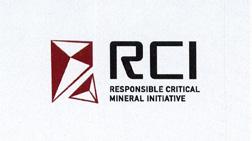
We do monitoring of all our suppliers including their own progress as well as of their mineral suppliers (through their own or third party audits). We ask our suppliers to work with their suppliers to guarantee the traceability of conflict minerals, at minimum to the foundry level, and to communicate those details using the CMRT (conflict minerals reporting template). That means our suppliers have a responsible mineral supply chain through systems of accountability for mineral acquisition and that they carry out due diligence processes with their suppliers.
After undergoing anexternal evaluation, one of our suppliers was awarded the EcoVadis gold medal in 2023. Their corporate sustainability initiatives were evaluated from four aspects: The Environment, Labour and Human Rights, acquisition of Sustainable Materials and Ethics.
Our goal for the future is to continue redesigning battery development and manufacturing processes to make them more sustainable.

The evaluation of environmental suppliers can be found in KPI 13, which is at the beginning of this chapter.
In 2021, we analysed environmental behaviour questionnaires from our suppliers that have the greatest environmental impact: suppliers of chemical products and energy resources The indicators on the supplier questionnaire included:
Environmental commitment and management of the supplier
Suppliers with environmental certification
Suppliers with SDG contributions
Suppliers with CSR
Suppliers that indicate complete legal compliance
Suppliers that indicate knowledge of IRIZAR's environmental policy and commitments
Products that include an environmental variable
Products that have some kind of ecological labelling
Suppliers that supply products in packaging with some kind of environmental criteria
Suppliers that consider the possibility that the containers/packaging for the products they supply may be returnable (reused)
Has measures implemented for reducing the environmental impacts related with the end of life of their products
Supplier organisations that consume energy from renewable sources
Supplier organisations that have specified actions/plans for lowering energy consumption
Suppler organisations that have done a carbon footprint calculation for their business activities
Supplier organisations that have verified their emissions
Supplier organisations that have specified actions/plans for reducing CO2 emissions
Supplier organisations that have specified actions/plans for offsetting CO2 emissions associated with their business activities
Waste management
Supplier organisations that have protocols for separating, labelling, storing and managing waste
Supplier organisations that indicate they have documentary registries that prove the dangerous waste they produce is managed properly
Supplier organisations that consider actions in their business to give a 2nd life to excess materials from their production
Supplier organisations that apply actions/plans for reducing, reusing and recycling their waste
Mobility
Supplier organisations that apply sustainable mobility plans for delivering their products
Supplier organisations that do a CO2 emissions calculation associated with transporting their products
Supplier organisations that apply some kind of sustainable mobility action/plan for transporting the products they supply to Irizar

We drew two conclusions from the analysis of the results:
• The suppliers were hardly dealing with environmental issues, so we had work to do for awareness raising and to keep driving progress.
• We needed to make a much simpler questionnaire with basic requirements for NON chemical suppliers.
In 2022 we continued driving suppliers of chemical product, energy resources, materials and services to improve the environmental factor in the supply chain:
1. Electrical energy We renewed the electrical energy contract until 2027 and agreed that it must be from renewable sources You can see more details in chapter 6 The Environment
2. Suppliers of products and materials: We adapted the questionnaire to the supplier type, but we decided to initially work on the
questionnaire with waste management companies and other service providers.
3. Waste management providers We requested, received and analysed the questionnaires from all the waste management providers. The indicator defined for the questionnaires takes that information into account.
4. Returning surplus materials to suppliers The suppliers with whom we keep analysing waste collection of Irizar materials was expanded, such that they can be sent to the IZIR project (it can be seen in chapter 6 about the environment), That reduces dumping waste from the supply chain into landfills and facilitates sending surplus materials to suppliers for reuse.
5. Irizar contractors
• We gave environmental training to everybody hired for paint booth maintenance and other auxiliary facilities, and we also provided a personalised good-practices manual.
• With the hazardous waste management company we analysed lower impact alternatives for managing hazardous waste dumped in a landfill with a higher volume of generation, even though the market does not offer lower impact solutions. This supplier has reported their carbon footprint since 2022, and they have committed to having their annual report included in the carbon footprint for Irizar‘s business activities.
In 2023, we kept evaluating product suppliers (P) and service providers (S) The main conclusions are:
1. More than 80% of the suppliers (P and S) have environmental management certification.
2. In regards to products supplied: 40% include the environmental
variable, 36% have packaging with environmental criteria and 16% have or are considering returnable packaging.
3. 52% of the P suppliers have calculated their carbon footprint, in comparison with 40% of the S suppliers.
4. Insofar as mobility, 38% of the P suppliers do a CO2 emissions calculation for transporting their products, while 10% of the P suppliers and 20% of the S ones do improvement actions for supplying Irizar.
As a consequence of those questionnaires, we have planned to do the following actions:
• Keep encouraging suppliers to obtain environmental certificates
• Include new environmental criteria in contracts that promote activity carbon footprint calculations for products and activities
• Encourage suppliers to use returnable packaging that are reusable or have a recycled origin
In 2024, an agreement was made with the purchasing managers to pause sending environmental questionnaires and prioritise including new environmental clauses in contracts for goods and services. As we saw in the section: “Sustainability requirements for our suppliers”.
The goal of that decision is to promote calculating carbon footprints amongst suppliers and strengthen the obligation to supply information about the composition of materials supplied, which lets us be more agile with our product LCAs.
We can highlight our high commitment to our local area, because our purchases from companies in the region of materials and services have increased in recent years. In comparison with previous years, we have slightly increased our purchases in the province of Gipuzkoa, reaching 19% of the total in 2023 and 2024.
On the other hand, we have continued reducing purchases from disant countries, like China, where our purchases have stayed below 2% since 2021.

We have stable significant relationships with suppliers with social purposes:
• KATEA: An organisation aimed at work and social integration for disabled people in Gipuzkoa. There were 55 people who worked for Irizar S. Coop. in different activities in 2024, an increase over previous years.
• IKASLAN: A foundation whose purpose is education, training and social-technical development for young people, with a preference for the Goierri regional territory. It provides metal pieces and subassemblies to Irizar.
• GUREAK: An organisation that manages work opportunities for disabled people in Gipuzkoa. They usually do battery assembly and gardening.
• HAZLAN: A social integration company that includes people in the Bidasoa region who have difficulties incorporating themselves into society into its business activities. They do sewing.
Through its logistics area, in recent years the Irizar Group has been immersed in a project to adapt and reassign routes with the primary goal of optimising resources dedicated to transporting their goods to make gains in efficiency and costs, and to minimise their environmental impact. In 2024, the analysis of the impact of all the logistics movements of Irizar S. Coop. goods and between the Irizar Group‘s plants was continued.
The same criteria for analysing emissions used in the previous year were kept in 2024.
The categorisation was maintained in the following way: maritime, air and land. Consequently, in 2024 progress was made with all modes of transport, continuing the ongoing improvement in that optimisation that began five years ago. Improvements fostered in 2023, like the majority transport operator renewing their fleet of trucks, have created a significant reduction of CO2 emissions in this category (average 5% reduction per shipment).
In 2024, work was continued on optimisation and laying down the foundations for maintaining record levels of occupation in terms of volume of the containers sent to the group‘s external plants by sea. Specifically, the average values this year are the following: 74.4%
Irizar S.Coop. SUMMARY OF RESULTS FROM TRANSPORT 2024 (includes Export Irizar to Group companies)
occupation for shipments to Irizar México and 53.9% for Irizar Brasil, which is an improvement over the 71% and 53.8%, respectively, from 2023.
The values Irizar S. Coop. emissions for maritime, land and air transport
were also analysed in 2024. With that data, we can generate a stable base of analysis from which we can evaluate our environmental impact and initiate improvement actions in consequence:
Consequently, the summary per mode of transport for 2024 in terms of total emissions is as follows:
CO2 EMISSIONS (%)
In addition, it was observed that the highest polluting mode of transport per kg moved is air, with a large difference vs. sea transport, which we promote at Irizar S. Coop.
(Kg CO2 per Kg)
With that data, 90% of the impact of the imports and exports of materials needed for transporting goods for producing coaches at Irizar S. Coop. are covered. (including maritime freight exports to the Irizar Group plants in Mexico and Brazil).
This base table will be used in the future to obtain relevant data to establish improvement actions for reducing CO2 emissions from logistics.
Lastly, work is being done on reducing single-use materials (wood). Reusable packaging for shipping goods to the Group’s plants is being designed and manufactured.

At Irizar we want to play an active role in defending our industry and its high added value to promote the recovery of the economy and the generation of employment. We must continue to innovate, rethink globalization from the local point of view and face the major challenges that we find ourselves in by strengthening ties and looking for collaborators with the aim of staying at the global forefront.
In addition to all the agreements and alliances that we have already addressed, in this or other chapters of the Sustainability Report, we can also highlight:
As we have already seen extensively in the chapter "Customers, Passengers and Citizens", we are actively engaged, together with large European brands, research and development centres in important European and national projects, in shaping the future of sustainable mobility in cities and public transport.
We have the Creatio R&D centre (Irizar Innovation Centre) at our central headquarters that is focused on enhancing applied research and technological development capabilities in cooperation with different
companies in the Irizar Group for products with its own brand as well as the main components for coaches. Projects led by CREATIO also have the collaboration of external partners.

In addition to these activities, within the Group, we collaborate with external technology and research centres to complement our knowledge and technology: CEIT, CIDETEC, CIKATEK, IDEKO, IDIADA, INSIA, IK4-AZTERLAN, IK4-LORTEK, LEARTIKER, TECNALIA, VICOMTECH, NAITEC, etc. always trying to strengthen the Group and improve Sustainable Competitiveness. This cooperative work contributes to the improvement of existing products, development of new products, and cutting-edge solutions in all the business areas in which we are present.
We should highlight the collaboration framework agreements with technological centres:
• CIDETEC: in strategic projects on energy storage that enable the business development of the Irizar Group and
• TECNALIA: mainly on power electronics and electric powertrain projects, although there is collaboration in very diverse fields like weight reduction, self-driving vehicles, thermal management and artificial intelligence.
Both agreements will strengthen Irizar's technological development and promote competitive market advantages.
TECNALIA is a top European technological research and development centre whose mission is to transform technology into GDP to improve people's quality of life by creating business opportunities for companies. It is part of the BRTA (Basque Research and Technology Alliance) It is the first Spanish private organization in contracting, participation and leadership in the Horizon 2020 programme of the European Commission and the second in applications for European patents.
Irizar became a sponsor of TECNALIA in 2020, increasing the level of collaboration we had had with them for several years to make it a more strategic model based in trust, collaboration and a shared technological strategy. Tecnalia's primary areas of work are the digital transformation, advanced manufacturing, the energy transition, Sustainable Mobility, health and the urban ecosystem.
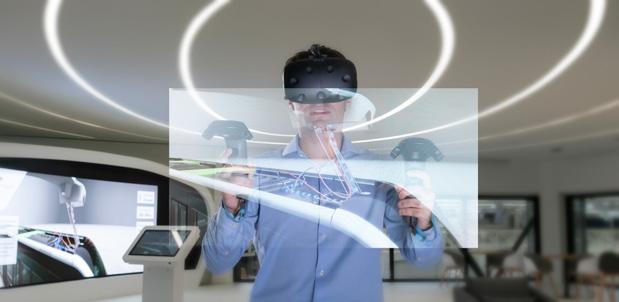
Irizar is present in the Basque Hydrogen Corridor: BH2C
In 2020 Irizar joined the initiative that will contribute to changing the economic and energy model to make progress towards decarbonising strategic sectors like energy, mobility, industry and services. It is a commitment to industry in the entire value chain of the hydrogen energy vector that was created in Euskadi by Petronor (Repsol Group).
The Basque government represented by Arantxa Tapia, councilperson for Economic Development, Sustainability and the Environment, considers it “key to the sustainable development of the territory”.
The presentation of the initiative took place in February 2021 in Bilbao with the signatures of 78 participating organisations The councilperson for Economic Development, Sustainability and the Environment, Arantxa Tapia, the Deputy General of Bizkaia Unai Rementeria, the Mayor of Bilbao Juan Mari Aburto, the president of the Bilbao Port Authority Ricardo Barkala, the president of Petronor Emiliano López Atxurra, and the project coordinator Jose Ignacio Zudaire attended the event.
The vocation of the Basque hydrogen corridor is to be a lever to transform the production fabric and maintain the status of industry in the Basque economy. The project unites economic, social, technological
and environmental issues, among others, thanks to an investment of more than 1.1 billion Euros until 2026, and it has ambitious goals: to create more than 1340 direct jobs and 6700 indirect jobs.
All of that will translate into the production of 21,000 tons of renewable hydrogen annually, which will avoid the emission of 230,000 tons of CO2 in that period, putting the focus during the first years on developing the production of renewable hydrogen, and on the infrastructures and applications needed for deploying a corridor that will mark a before and after in the Basque energy transition.
Irizar is a key participant in this initiative in the Sustainable Transport and Mobility sector.
In 2023, we participated in both of the mobility vertical meetings of the Basque hydrogen corridor. The progress of the Irizar project was presented at the first meeting.
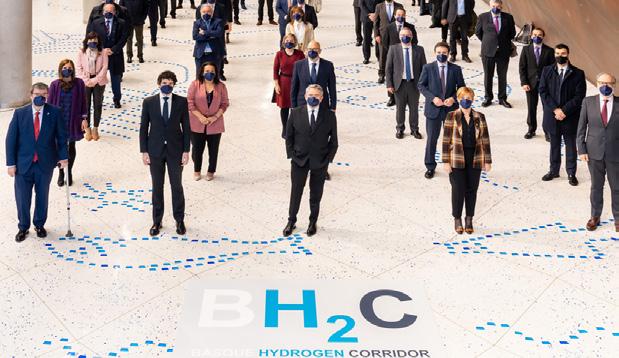
Since 2020 we have also bee members of the UITP (International Union of Public Transport), which is the International Association of Public Transport and a passionate advocate of sustainable urban mobility. Founded in 1885, with more than 135 years of history, it is the only global network that brings together all stakeholders in public transport and all sustainable modes of transport.
According to the UITP knowledge base, the bus is the most widely used mode of public transport in the world. With millions of daily trips, we know that there really is no sustainable mobility in our cities without getting on a bus. The bus has a long and rich history in the sector, and in the UITP where the bus operators work on the corresponding committee on important issues like maintenance, operations and development. The exchange and generation of knowledge for the entire sector is the main objective.
In Europe, UITP's main activity is to work closely with the institutions of the European Union, bringing together more than 450 urban, suburban and regional public transport operators and authorities from all member states. The UITP represents the perspective of local passenger transport services using all the sustainable modes, by road, rail or water.
(Vehicle, Equipment & Infrastructure Committee)
Irizar has been an active member of VEIC (Vehicle, Equipment & Infrastructure Committee) since 2016. The committee, made up of European leaders in their respective fields in the bus and rail world, is a forum for discussion where agents in the sector discuss the current and future challenges facing the industry.
It is worth mentioning that Irizar belongs to:
• Innobasque, the Basque Innovation Agency We joined Innobasque in 2020 to contribute to their vision of “positioning Euskadi as a leading region in innovation”. That is the objective of Euskadi (the European region in which Irizar S. Coop. is located) for which Innobasque works with a long-term aspiration that it shares with the public and private agents that make up the Basque Innovation System.
Their mission is "to promote, in collaboration with other agents, the development of innovation from its position as a singular agent of the
Basque Network of Science, Technology and Innovation". In its role as singular agent, it assists the Basque Government and the organizations of the system in the design, implementation and evaluation of policies related to science, technology and innovation.
The member organisations are the real protagonists of this continual drive for innovation in the Basque Country. We make local, national and international alliances and networks as a way to share experiences, provide services and gain influence and positioning at scale. Because of their diversity and number, the 902 member entities of Innobasque are a good representation of the Basque Science, Technology and Innovation System and they account for 62% of Basque R&D+i investment. Almost 85% of the member companies are SMEs, and 88.5% operate in strategic areas for the Basque Country.
Irizar is also part of the Innobasque board of directors and leads innovation strategies for the Basque Country.
considered the first automotive cluster created in Europe. Since it was created in 1993, it has evolved quickly and has contributed to making the billing of the Basque automotive industry double in the last twenty-five years. It's made up of 300 companies that bill more than 25 billion and employ more than 140,000 people around the world, of which 40,000 are in the Basque Country.

• The Mobility and Logistics Cluster of Euskadi is a private not-forprofit association. Its goal is to improve the competitiveness of its members, companies and agents in the Basque Country that work in the fields of logistics and supply chain, mobility, and infrastructures for both people and commodities. The 125 associated companies and organizations represent a turnover of 14,194 million Euros and 61,132 people around the world and allocate 429 million Euros for R&D+i.
• Automotive Cluster of Euskadi – ACICAE is a not-for-profit business association whose mission is to improve the competitiveness of the automotive industry and enable cooperation between Basque companies so they can provide a joint response to the major challenges the industry faces. It was driven by the Basque government with the methodology of professor Michael Porter. It is
At the petition of this cluster, in December 2022 Irizar participated with two speakers in the 2022 Basque Circular Summit led by the Basque government. You can see more details in the chapters about “Clients, Passengers and Citizens” and “The Environment”. In 2024, and within the ROAD TO SDG project we agreed to participate in 2024 to share our experience with Sustainable Competitiveness and integrating the SDGs into the 2030 Irizar Agenda.
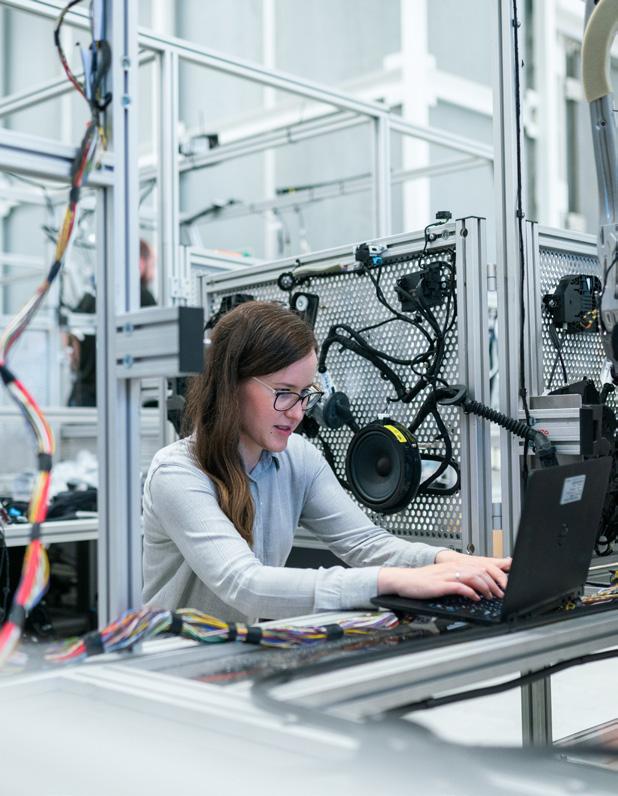

• Goierri Valley: We are a magnet company of this alliance for the industrial transformation of the Goierri region of Gipuzkoa (where Irizar S. Coop. is located), through the real and active collaboration of the member companies, sharing knowledge and innovating to guarantee industrial competitiveness and future sustainability for our local area. The companies included in this alliance have joint sales of 4,407 million Euros and we dedicate 3.3% of sales to R+D+I, have production plants in 16 countries and employ 8,100 workers dedicated to the sectors of fittings, mobility, lifting, energy, electric motor, transport, machine tool, and other sectors.
You can see details in the last chapter 7 about “Society”.

Given that purchasing management is a fundamental element to guarantee profitability and Sustainable Competitiveness, Irizar belongs to AERCE (Spanish Association of Purchasing, Contracting and Supply Professionals). AERCE is a professional association that brings together purchasing managers for medium and large companies, and whose purpose is the promotion, dissemination, and training of techniques and the application of appropriate methodologies for proper and effective management of company purchasing, contracting and procurement.
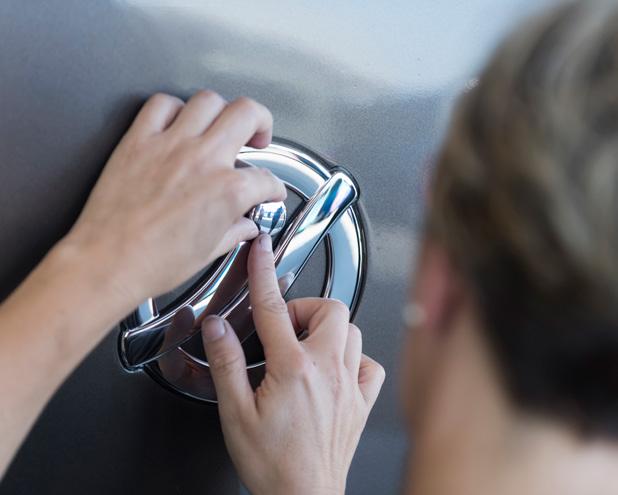
Contributing to the SDGs and goals of the UN 2030 Agenda:
Priority SDGs


9.4 Modernise infrastructure, clean technology

11.2 Provide access to public transport
11.6 Reduce environmental impact in cities

12.2. Achieving efficient natural resource use
12.4. Management of waste and chemicals
12.5. Prevention, reduction, recycling and reuse of waste
12.6 Adopt sustainable business practices
12.8 Ensure education for sustainable development
12.B. Achieve sustainable tourism
13.1 Strengthen resilience and adaptation
13.3 Improve environmental education and awareness

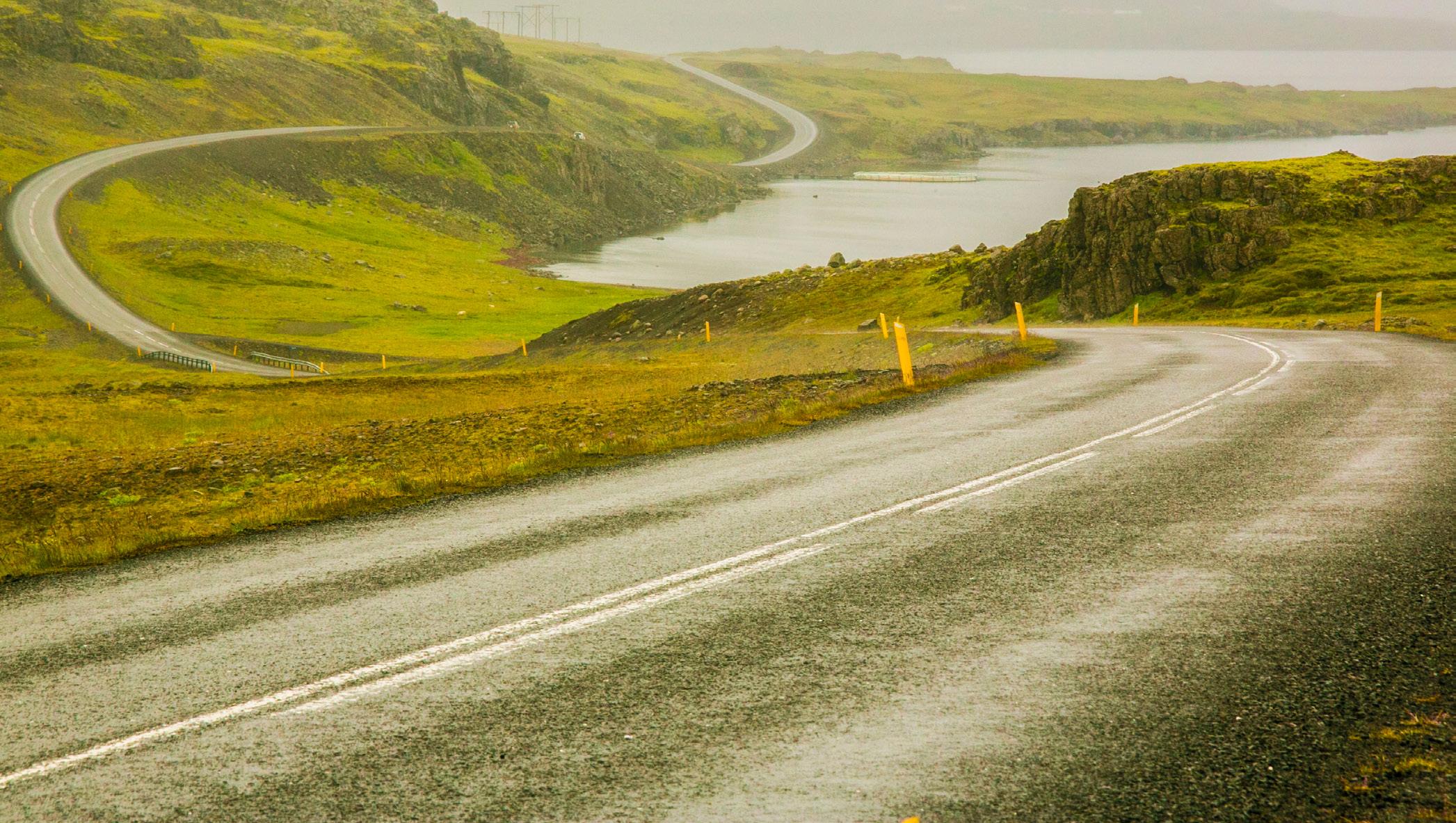
6.1. Environmental framework and priorities
• Commitment to the environment, integrated with the SDGs of the 2030 Agenda
6.2.
Sustainable Products and Eco-innovation
6.3
Environmentally responsible production
6.3.1. Resource consumption efficiency
• Consumption of natural resources
• Consumption of chemical resources
6.3.2. We reduce the generation of waste and discharges
6.3.3. We minimise soil contamination
6.3.4. Committed to the circular economy
• Reuse
• Recycle
• Innovating in circular economy implementation methodology
6.4
Management of sustainable suppliers
6.5
Committed to the struggle against climate change
6.5.1. Air Quality and Maximum Energy Efficiency
• Energy efficiency of the activity
• Irizar S.Coop. carbon footprint
• Irizar e-mobility carbon footprint
• First electromobility factory with totally renewable energy in Europe
6.5.2. We promote the sustainable mobility of people
6.6.
Contribution to environmental sustainability
6.6.1. We train and raise awareness among our personnel, customers and suppliers in the environment
6.6.2. We participate in external environmental forums
Our commitment to the environment dates back to 1998 when Irizar became the first European coach manufacturer to obtain ISO 14001 certification. In 2000 we were the first major Spanish company to win the European Quality Prize (awarded by EFQM), whose evaluation also took into account environmental criteria (use and consumption of resources, conservation, emissions into the atmosphere, waste and recycling, recyclability of coaches, etc.).
The Irizar Group’s electromobility division is, without a doubt, a clear exponent of our progress in this commitment. Irizar e-mobility likewise obtained ISO14001 certification in 2020, and is focusing its efforts on optimising consumption of raw materials and minimizing polluting substances and the impact of its vehicles on the environment.
That is why at Irizar we have evolved and increased our commitment to environmental protection and the achievement of more sustainable and efficient products and ways of working. Our continuous progress, as environmental pioneers, is reflected in this and in previous Sustainability Reports.
Among the most important principles that guide the environmental policy of Irizar are gradually reducing emissions of CO2 and other pollutants, using environmental criteria when choosing materials for designing and manufacturing their products and improving the

efficiency of the operations in our organisation, and promoting the culture and spirit of commitment to taking care of the environment, people and external collaborators.
For the Irizar Group, it is fundamental to work and focus lines of action in accordance with the interests of external stakeholders (government,
clients, suppliers, competition, society at large, etc.) and, along those lines, the challenge is to make progress along the path to Sustainability.
We are showing the latest version of our environmental policy integrated with the quality policy here. It was approved in 2023 and shows our commitment in that regard.
Environmental and quality policy
IRIZAR, Cooperative Corporation, is a BUSINESS PROJECT BASED IN PEOPLE, with a self-management and participation system that strives for business excellence through continuously satisfying clients, people, external collaborators, society and our local area, to enable growth that generates wealth and new jobs.
They design, develop, produce and provide after-sales service for integral coaches and coach bodies on chassis of different makes.
The purpose of IRIZAR is to build client loyalty by maintaining a high level of quality of their products and services and through a deep commitment to protecting the environment and continuously improving all their production and management processes. To those ends, we are committed to:
• Leadership and commitment by everyone Promoting training, awareness raising, communication, leadership, participation and commitment by everyone for integrating and meeting the goals of Irizar‘s strategy. And all of that is based in giving the organisation a suitable framework and resources and setting goals for quality and the environment.
• Monitoring and improving our value chain Integrating suppliers into the procurement chain for our clients‘ satisfaction, customer service and reducing environmental impact inherent to our business through meeting sustainability criteria to achieve a sustainable supply chain.
• Stakeholder participation The participation of our clients, suppliers and the government and society at large is important to us. Our policy provides information about our activities and awareness about actions to protect environment.
• Required information and resources Ensure that the management system has the information and resources it needs to meet the goals and challenges, including improving performance
• Legal compliance Meet all the legal requirements applicable to our business and environmental impact, as well as client demands and other requirements IRIZAR has accepted voluntarily.
• Meeting the Sustainable Development Goals (SDGs) We are aware of our global responsibility for our surroundings and all the environmental and social impacts associated with our activities and products. Because of that, we have integrated those goals into our strategy and we have aligned ourselves with the 2030 Agenda.
• Sustainable products and services Design and manufacture inhouse sustainable and eco-innovative technologies with a holistic focus to minimise environmental impact throughout the life cycle, at all times avoiding shifting adverse environmental effects to other phases of the life cycle, unless it entails a global reduction of the environmental impacts associated with the product
• Circular Economy Integrate and promote the reuse of surplus materials and waste in collaboration with other organisations
• The impact of our business activities and preventing pollution Make progress in having our impact be more neutral, focusing our efforts on minimising GHG emissions through improving energy
efficiency and using renewable energies Likewise, we integrate the commitment to optimise the resources we use into the way we work, striving for efficiency and reducing the impacts associated with generating emissions, discharges and waste. We work on acquiring products and services and designing facilities and processes that positively impact performance.
• Mobility Innovation to reduce our environmental footprint We try hard to take on the challenges associated with the entire life cycle of our mobility.


As we put forward in chapter 2 about Irizar and Sustainable Competitiveness, our commitment to the 2030 Agenda SDGs is especially evident in our impact on high-priority KPIs. We consequently decided to prioritise our sustainable value contribution to the environment.
We already dealt with environmental KPIs in three previous chapters:
• Our commitment to clients, passengers and citizens four about the CLIMATE, two about RESOURCES and one EXTENDING SUSTAINABLE DEVELOPMENT
• Commitment to our people: one about CLIMATE and one EXTENDING SUSTAINABLE DEVELOPMENT
• Commitment to a sustainable value chain: one about CLIMATE and one EXTENDING SUSTAINABLE DEVELOPMENT
We will focus here on KPIs that have not been discussed before or groups that affect several stakeholder groups.
A. CLIMATE: two KPIs One for reducing total GHG emissions to decarbonise our operations in our facilities (reduce scope 1 + 2 / category 1 + 2 GHG emissions) and to reduce indirect scope 3 GHG emissions (category 3 transport, 4 product use and 5 associated with the use of our vehicles by clients) Other KPI for electricity with a renewable origin
B. RESOURCES: Two KPIs for: increasing waste reuse and improving energy efficiency in places where we carry out business activities.
F. EXTENDING SUSTAINABLE DEVELOPMENT: Like in previous chapters, support is also given to a KPI with our commitment to contributing to improvement in external (public and private) people and organisations.
PRINCIPLES
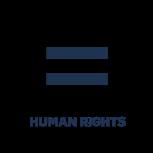
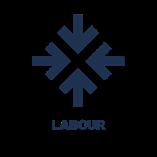
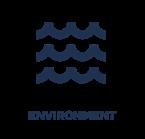



3. Reduce TOTAL GHG emissions
Includes:
Scope 1 and 2:
CATEGORY 1: Direct GHG emissions and removals
CATEGORY 2: Indirect GHG emissions caused by imported energy
Scope 3:
CATEGORY 3: Indirect GHG emissions caused by transport
CATEGORY 4: Indirect GHG emissions caused by products Irizar uses
CATEGORY 5: Indirect GHG emissions associated with the organisation’s use of products
4 Origin of electricity from renewable Renewable energy systems





7. Reclaimed waste (using reuse, recovery and recycling processes)
Sum of waste bound for waste manager and bound for our IZIR brand
renewable electrical energy consumption and/or high-efficiency cogeneration / total electricity consumption
8. Improving electrical energy efficiency in our centres Kwh consumed / working days / units billed tCO2 / working days / units billed
BASE YEAR: year data in blue if shown in OBJECTIVE later
PRINCIPLES OF
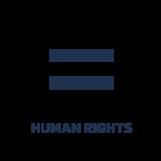
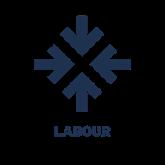

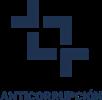








23. Contribution to improvement in the sustainability of other external people and organisations (public and private).
Outside of Irizar S. Coop.
Sharing our knowledge of and experience with sustainability in forums and training and awareness raising activities:
• High priority stakeholders Clients, suppliers, distributors, etc.
• Group coach companies
• Other Group companies
• Students, external organisations and other people in the social environment
As shown in detail in chapter 3 about "Customers, Passengers and Citizens", we develop and manufacture Premium products of our own brand and technology, with a holistic approach to protecting the environment. All our efforts are aimed at minimizing the emission of pollutants and noise and the impact of our vehicles on the environment. Among other aspects we address:
• Reduction of fuel consumption and TCO (total operating cost) for the customer, thus reducing environmental impact.
• We offer pioneering solutions to the different mobility needs of the future around the world. Reducing the impact of our vehicles and eliminating greenhouse gasses and noise emissions is our priority. All this in line with the Paris Agreement and the European Green Agreement.
• In 2017 Irizar created product category rules for the entire sector for drafting environmental product declarations.
• We do environmental impact analyses for every component on the vehicles so we can keep working on using more sustainable materials.
• In 2019, we were the first company worldwide to obtain an Environmental Product Declaration (the international EPD system), which was an important step forward in our progress to be a European leader and to be at the forefront of eco-innovation and eco-design for the entire life cycle of the product. In 2021, we were the first manufacturer of electric buses to draft an Environmental Product Declaration (EPD), specifically for the ie bus NG.
• As we mentioned at the beginning of chapter 3. (about clients, passengers and citizens), since late 2022 and during 2023, at Irizar e-mobility we have used life cycle analysis (LCA) methodologies for the Energy 54Ah and Energy 65Ah batteries with the goal of measuring the environmental impacts associated with their entire life cycle and to work on optimising them. In addition, we share the LCA reports for the batteries with clients interested in knowing about them in detail.
• We share opinions and experiences and we have discussions with clients about their sustainability (economic-governance, social and environmental) concerns.
• We deliver eco-driving courses and efficient driving manuals for our customers.
• We recycle the batteries from our electric vehicles and give them a second life
• We manage resources carefully.
• Safety is a priority in all our developments.
• We give our clients all the environmental information about the coaches.
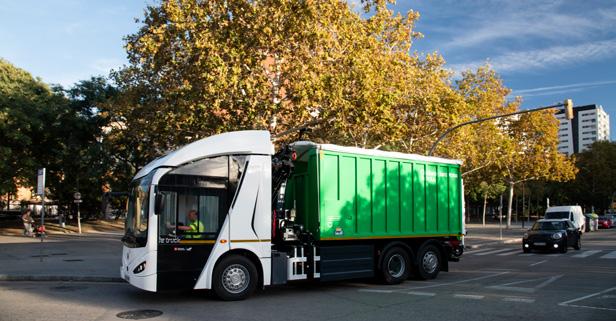
6.3 Environmentally responsible production
At Irizar not only do we think it is important to meet to the demand for more sustainable buses and coaches, we also think it is important to integrate sustainability principles into our own way of working. In this sense, we continue to focus on:
• Eco-design and eco-innovation, two approaches integrated into production
• Applying circular economy principles at the design stage like optimising processes to minimise consumption and trying to find a second life for waste and production surpluses
• Researching possible improvements for lowering the environmental impact associated with production through developing studies aimed at knowledge of the environmental impact of facilities and processes: reducing emissions, waste, competitive advantage, etc.
We measure the continuous progress of our environmental commitment by monitoring the management indicators for consuming materials and generating waste, etc. And we keep our end objective of optimising the use of resources, always trying to be efficient and reduce waste generation and discharges.
Since 2007, the Imagen project has established criteria for order and cleanliness in our facilities, with continuous analysis and monitoring from day to day, with the aim of identifying operational improvement measures, good practices and awareness. Our challenge is none other
than from the involvement of all people to guarantee quality and optimization of work resources.
Another measure we put into practice in 2016 was centred on creating specific and detailed best-practices manuals for every work area, improving and optimising the processes or operations we deemed critical, which included the ones with the greatest environmental impact.
At Irizar, we keep making progress in the Circular Economy management model as a system for using resources where eco-design, optimisation, reduction, reuse and recycling items is primary. All of that is geared towards reducing the environmental impacts associated with production. As we will see in more detail in section 6.3.4. the increase in demand for resources worldwide in the last century, due in part to the growth of the world population and emerging economies, has caused a large increase in the consumption of natural resources. This situation makes the current lifestyle, based basically on a linear economy, difficult to sustain. The circular economy proposes a paradigm shift in the use of resources and in relation to the environment: maintaining the life cycle of products and materials for as long as possible; reducing waste to a minimum; and reintroducing resources into the production cycle, creating value when goods reach the end of their service life.
We pursue optimising the selection and reduction of materials in the value chain. To those ends, we monitor the components used in each work station and adjust needs to the orders as much as possible and minimizing excess materials that may remain in the production line.
Among the main actions that we have implemented during the last decade are those that aim to reduce and optimize the consumption of products and materials used in the vehicle manufacturing process, mainly those that could have the greatest impact on the environment. For those cases, there are specific projects with actions that require detailed monitoring.
We carry out exhaustive management and monitoring of the consumption of natural resources and of the chemical products used.
Our management of energy resources (gas and electricity), although here we deal with the evolution of consumption, will be addressed in more detail in section “6.5.1. Air Quality and Maximum Energy Efficiency”.
The absolute data for electricity consumption (gas and electricity), shows a decrease from the previous year, which reflects the actions taken under our decarbonisation plan. For water there was a significant increase derived from the increase in production and expansion of the number of people hired by our project.
• Water consumption:
Water is a scarce good and at Irizar we are aware of it, so we implement measures geared towards reducing the use of it to preserve it. It is noteworthy that the production process at Irizar has low water consumption in comparison with other companies in other sectors.
The main actions carried out for more sustainable water use can be divided into two sections:
1. Consumption in the Production Process. The consumption is monitored using a system that makes it possible to analyse its evolution and take the measurements needed to control it. In recent years, work in this area has been strengthened with new implementations of closed circuits, purifying systems and water treatment that guarantee good water treatment of process water so it can be reused.
2. Internal Consumption Consumption by workers, company dining areas, cleaning facilities and similar procedures Irizar has done awareness raising campaigns for staff to try to reduce that consumption and minimise its impact. The increase in the number
of workers in 2024 has had a direct relationship with the increase in consumption associated with this use.
• Electrical power consumption:
The relative decrease in 2024 testifies to the actions put into practice since 2013 for controlling consumption that are set forth in the energy efficiency action and decarbonisation plan.
• Natural gas consumption:
It can be seen that, continuing the trend from 2023, in 2024 there was a 2% decrease in gas consumption per coach invoiced in comparison with the previous year, due to the recovery of production of manufactured vehicles. It should be noted that that decrease is largely due to the measures applied in the last year for monitoring consumption, which let us improve our energy efficiency.
Actions carried out that affect electricity and natural gas:
• In 2021energy qualification studies were done for the offices in all the plants.
• We have been monitoring the energy consumption of the main facilities since the start of 2021.
• In 2021, we analysed and corrected how the readings work and we placed metres in areas where we saw they were needed.
• In 2022 a control and detection panel was put into action in the entrance booth of the facilities that lets us detect and correct deviations in gas and electricity consumption early.
• In 2023, work was done on reducing uncertainty about the data, and on finding new points for improvement.
• The same as the year before, in 2024 work was done on applying the improvement actions to use the facilities more efficiently, and for incorporating new measurement points for more detailed detection of consumption.

This consumption is exclusive to the plant (Lezeta), which is where the main painting activity associated with this indicator is done.
• Paint consumption:
Even though in 2020 the absolute data showed a significant decrease in terms of consumption due to the effects of the pandemic, paint consumption per square metre of surface treated increased by 26.25%. That increase occurred despite the work done on implementing the paint management plan, due to different productivity factors mentioned above (primarily a decrease in highend coaches, a decrease in integral coaches, etc.).
In 2023, that consumption was reduced by 4.82%, thanks to the work done in implementing the paint management plan, as well as the various production factors mentioned above (a decrease in large coaches and specifications with a high paint content, etc.). In 2024, we achieved a 32% reduction in paint consumption as a consequence of factors discussed below.
• Solvent consumption:
The consumption of solvent per surface painted was lowered by 32% in 2024. That is due to various factors discussed in detail below.
Likewise, we believe that the solvent reduction plans started in 2007 are having positive and remarkable results and is directly contributing to reducing the emission of volatile organic compounds, such as:
o Formulating and developing new water-based technologies
o Replacing products with other ones that have less solvent content
o Establishment of a product control methodology.
o Optimising production processes
o Continuous audits by the supplier and Irizar.
o Continuous training of workers.
o Investments aimed at improving the facilities
o Renewing work equipment with more efficient equipment
In 2024, an exhaustive analysis was done of all the parameters associated with those indicators, as well as the BATs (Best Available Techniques) published on 9 December 2020 in the Official Journal of the European Union, which sets forth the conclusions about the best available technologies (BAT) for treating surfaces with organic solvents, in accordance with Directive 2010/75/UE of the European Parliament and Council regarding industrial emissions (Decision 2014/687/UE)
That analysis has led to new actions whose result has been a very significant, of 32%, reduction for both indicators.

Waste Generation (kg / coach produced)
Applying measures that guarantee more efficient consumption also enables us to act in reducing waste. To achieve this, we consider it essential to understand the materials used in each process of the manufacturing chain and, thus, to adjust the quantities of materials that we use during the production processes. In this vein, the environment area works with purchases, supplies and warehouse, to reduce the amount of packaging or commit to returnable materials.
The Image Project also manages surplus production and surplus or obsolete materials, by reintroducing them into the process or looking for another alternative way out, through exhaustive control of all the material found in the production lines. To achieve that, periodic audits are carried out for critical materials, and surplus materials are reallocated in carts on each line, etc.
In 2022, new waste was included in the collection systems in the various centres, in line with the ambitious objective set by Irizar to send zero waste to the landfill. Among the most notable waste are film, organic and urban packaging.
(*) Since 2020, unlike previous years when the indicators only showed data from the main production plant (Lezeta), data is provided for all Irizar S. Coop. production plants.

The absolute data for the generation of hazardous and non-hazardous waste shows a recovery of trends prior to the pandemic, although a decrease in the relative indicators per coach can be seen, due to diverse improvement actions implemented.
• Hazardous Waste Generation: In absolute numbers, the generation of hazardous waste fell 7% in 2024. Taking into account the ratio of hazardous waste generation per coach, there was also a 16% decrease, going from 328.49 kg of hazardous waste/coach in 2023 to 305.5 kg of hazardous waste/coach in 2024.
The greatest decreases were concentrated in waste created from maintenance, implementing improvements in preventive maintenance processes in painting booths.
At IRIZAR we keep implementing improvement actions that let us optimise processes and be more efficient at generating waste, even though they are highly conditioned to clients’ demand for products and the higher and higher quality requirements for products.
Likewise, we keep working with the waste management company and other specialised companies to find alternatives that let us minimise waste and find a way to bring value to it.
The data makes it possible to show a stable trend of waste generation, and it shows the continuous improvement in waste segregation, as well as other improvement measures that have been implemented.
• Non-hazardous waste generation In 2024, the absolute data showed a slight increase of 4.5% in the amount of non-hazardous
waste generated. Taking into account the ratio of non-hazardous waste generation per coach, there was an increase of 3.3%, going from 1,168 Kg/coach in 2023 to 1,207 Kg/coach in 2024.
It should be noted that we are still working on the environmental management plan and doing various internal and external circular economy projects with collaborations with other organisations to optimise supply, storage and the use of materials in production, and to find alternatives to dumping discarded material in the skip, and improve with separating hazardous and non-hazardous waste, which is generated and collected directly in the plant. Likewise, it should be noted that the percentage of waste that is reused is more than half, at 60.51%.
Among the circularity activities we can highlight is the circuit for returning parts removed from chassis of different brands so they can be returned and reused by the supplier, which reached 15,444.2 kg in 2024. The creation of that circularity circuit has avoided generating waste.
The increase, which is mainly linked with the increase in production, is slight thanks to several improvement measures adopted, which have been recognised and in some cases have even won awards.
• Improvements in discharges: Irizar has invested in the best available technology (BAT) for treating wastewater before discharging it and they do periodic monitoring of its quality through authorised control bodies (ACBs). Likewise, they do ongoing awareness raising campaigns for reducing consumption and discharge.
At Irizar, we have identified points of risk for soil contamination in the production area, and we have adopted specific control and prevention measures to minimise or even eliminate risk.
Likewise, in accordance with the commitment to continuous improvement, innovations and alternatives offered by the market for the inclusion of new measures in the annual action plan are reviewed and studied annually.
Among the most notable measures is using a superfloor ground treatment. The treatment makes it possible to close the pores on the surface of the ground using a mechanical treatment, which in that way reduces its permeability and minimises the risk of pollution associated with production.
There is a soil report that was done in collaboration with an accredited entity and updated in 2024 which lists the areas with the greatest risk of pollution and the detection and prevention measures for each one The report identifies possible actions that make it possible for us to improve continuously with the implementation of measures that minimise potential impacts on soil condition and groundwater.
The Circular Economy is a model that prioritizes the use of resources and the reduction of raw materials. This system thus becomes an alternative to the current extraction, production, consumption and disposal model – the linear economic model. It proposes a paradigm change in how resources are used and how we relate with the environment, lengthening the lives of products and materials for as long as possible, reducing waste to the minimum, and reintroducing resources into the production cycle (looking for a second life for waste and production surplus).
The 7Rs concept, where products are designed to be reused, is needed for that.





economy

We discussed eco-innovation (redesign) and reducing consumption and waste in the previous sections. In chapter 3. (dedicated to our customers, passengers and citizens), we talk in more detail about: ecoinnovation (we consider environmental factors as a further criterion when making decisions in the design process of our products), reducing recovering and recycling batteries. In chapter 5. (dedicated to our external partners, supply chain and alliances) we also discussed repairs.
We can highlight two other lines of work in this section: reuse and recycling.
We try to find a second life for discarded items that cannot be reintroduced into the production chain at the plant itself. Products, like leftover LED strips that cannot be used in new coaches, have been reused for LED lighting in new rooms, and with discarded seats we have created new seating in the meeting rooms.
Following along those lines of reuse, in 2020 a “2nd hand space” was created, where surplus production material is left (fabric, rugs, etc.), so the workers can reuse it for other uses outside Irizar. Since it was created, new surplus materials have been added to the space, which is very popular among people at Irizar.
As we mentioned above, after the first contacts in 2021, several meetings have been held with the chassis manufacturers to jointly analyse the possibility of returning chassis parts so they can be reused. Every year an average of 30 tn of chassis parts and accessories from several makers, mainly DAIMLER, are processed and sent to be reused in new products.
Several items have been added to the web Recircular platform (www. recircular.net), so it can be sold or donated, promoting reusing equipment etc. that is not usable by Irizar. Likewise, several meetings have been held for potential collaborations for more specific valorisation projects.
Since 2017, we have led or participated in many circular economy projects in collaboration with other organisations. We will highlight the most representative ones and all the ones still under way here.
At the Irizar Group we are convinced of the benefits of knowing how to integrate the Circular Economy concept internally and in close collaboration with other organizations. To that end, we have undertaken several projects in collaboration with other associations and bodies:
• Creation of Izir – Irizar’s Circular Economy brand: At the end of 2019, Irizar’s own brand, Izir, was created, for products created from surplus production. The Izir project (Irizar Zirkularra) has the main mission of the promotion of the commitment of all Irizar people in aspects of environmental, social and economic sustainability, and specifically, the circular economy. In 2020 we took a step further in this area, by designing the catalogue of products for merchandising, as well as another range of products aimed at protecting parts for various production processes.
There are collaborations with the EMAUS foundation and SUTARGI, which are not-for-profit organisations that do several social and environmental projects. With both collaborations a line of products is being created for merchandising using textile, wood, rubber and other kinds of waste from the factory.
Remnants from various stages of textile production from seats or interior linings, etc. are collected separately and sent to several centres belonging to both foundations where people at risk of social exclusion are employed and merchandising items with the Izir brand are produced.
Every year new materials are included in the Izir project, which lets us reduce waste by more than 50,000 kg every year. In 2023 work was continued on defining products and prototyping new samples to make new merchandising products with the brand. An example of that was in 2023 when Irizar started new collaborations with Ekomodo on designing and creating new Izir items for the merchandising catalogue and internal Irizar use.
In 2023, with the goal of giving the Izir brand greater visibility among clients and entities in the sector, a giant step was taken by creating an exclusive environmental sustainability space at the Busworld fair, where in addition to being able to see several sustainability projects and collaborations done by Irizar over the years on touch screens, several Izir brand items were displayed. Likewise, the stand at the fair was redesigned, taking new sustainability criteria into account, like using recycled materials that can be reused for later fairs. All of that can also be seen in chapter 3 about clients, passengers and citizens. Irizar received several external acknowledgements related with Izir, and they continue making a large impact in the media, where Irizar has been positioned as an industry leader in circularity
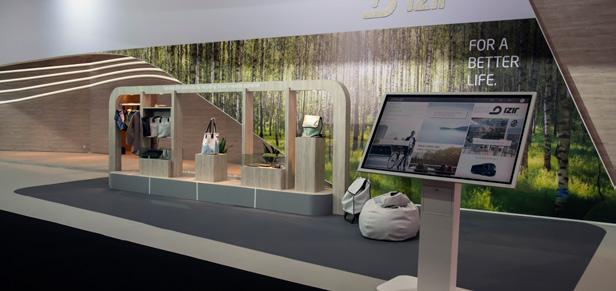
Other projects we have collaborated on recently:
• Birsortu Project - Collaboration with the EMAUS and HIK-Hasi foundations: In addition to the circular economy brand itself, we continue collaborating on this project with EMAUS and the HIK-HASI association. Waste derived from production is used and donated to partner educational centres, so that children can experiment and create with them. There are currently collaborations with pre-school and primary school students, but the goal is to expand it to secondary education and vocational training. This is where Irizar's waste is considered to have more relevance, especially in subjects related to technology and industry. In 2021 we joined the CIFP Don Bosco LHII project for experimentation in the education community, making materials discarded by the company available to students.
• Collaboration with UGLE (Alto Urola Vocational Training School), a post-compulsory social initiative education centre. Irizar continues to donate materials for reuse by students at their facilities, including work tables and shelves, which are no longer used by Irizar and go to UGLE for a second life.
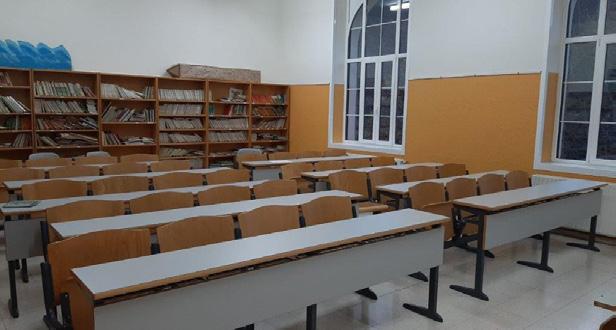
• Collaboration with Fanny Alonso, sustainable fashion designer and creator of cultural projects, since 2020 The waste donated by Irizar becomes raw material, for example:
o Textiles from roof surplus, bus parts and seats, etc.
o LED strips discarded due to defects
o Scraps of smooth wood and wood covered in scrap cloth from cuts
Two projects got under way in 2021:
1. The “Women of Cotton” exhibition project which continued in 2022
2. Clothing collection project at the autumn-winter fashion show #gkgreenfashion organised by the Environmental Area of the Regional Government of Gipuzkoa.

• Collaboration with TECNUN-University of Navarre with two projects:
o Circular Market Since 2019, we have been collaborating on developing and starting up this platform for selling or donating unused items. Circular Market is a collaborative platform to connect companies, with the aim of helping them create value in their operations. It lets the waste or by-products of one organisation become raw materials for another one, in addition to users being able to contact each other to make group purchases, and share resources and services. It facilitates lowering environmental impacts, significant cost and energy savings, and ability to create new jobs and business opportunities. www. circularmarket.es
Irizar collaborates with this new platform by hanging unused products, like concrete blocks, scraps of rubber, carpet remains, polyester scraps, etc.
o Sarea See details in section 6.6.3.
o Sustainable engineering This collaboration in 2024 included
participating in the training programme for third year engineering students at Tecnun on their sustainable engineering challenge course by presenting a challenge with using/recovering waste/surplus from IRIZAR processes and give them a second life. 60 students divided into 16 groups developed and commercialised vanity cases, bags and vests, as well as tables and desktop items using wood and other production surplus.

helburuarekin garatutakoa. Tecnungo ingeniaritzako 3. mailako ikasleek, Ingeniaritza Jasangarrirako Erronkak ikasgaian, bigarren bizitza bat eman diote Irizarko autobusen eta autokarren fabrikazioko material soberakinari. 60 ikasleek, 16 taldetan banatuta, nezeserrak, poltsak, txalekoak edota mahaiak eta idazmahairako elementuak sortu eta komertzializatu dituzte.
Este 5 de junio, Día Mundial del Medioambiente, os presentamos la última colaboración entre Irizar y Tecnun, siguiendo con nuestro objetivo de fortalecer alianzas con organizaciones externas. Los estudiantes de 3º de ingeniería de Tecnun han dado una segunda vida al material excedente de la fabricación de nuestros autobuses y autocares en el marco de la asignatura Reto en Ingeniería Sostenible. Los 60 alumnos, divididos en 16 grupos, han desarrollado y comercializado tanto neceseres, bolsas y chalecos, como mesas elementos de escritorio a partir de madera excedente.


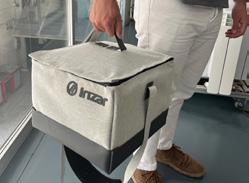
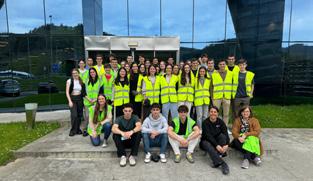
• CircularTrans Project - Collaboration with Mondragon University
Launched in 2020 together with the University of Mondragón The main objective of the project is the creation and validation of a digital platform to guide the transition of industrial organizations towards a circular economy model in Gipuzkoa. CircularTrans defines a five-step process: diagnosis, results, selection of opportunities, roadmap and action plan, thus defining a process of continuous improvement. The INMOIN Circular project is the second phase of this project, which Irizar also collaborated on in 2023.
In 2024, deriving from their close relationship, the university requested Irizar’s collaboration to identify the training needs of social
economy tractor companies in the Basque Country Autonomous Community and their supply chain to promote the environment as a competitive factor and drive their environmental commitment. This project sought to identify current and future needs to designate training modules in a training plan or curriculum that responds to the needs of tractor companies.
• FOOTPLASTIC Project: In 2021 Irizar joined this project along with Sarenet, Kaytek, Birziplastic and MIK-Mondragon for developing an IOT and blockchain platform for monitoring, evaluating and predicting plastic leaks in corporate value chains. The goal is to develop a technological solution to monitor, calculate, analyse and predict micro and macro plastic leaks in product life cycles or at a corporate level. We think this is highly relevant for plastic managers/vaporizers. The project ended for Irizar, and opened a new line of collaboration with Birziplastic for new plastic recycling projects.
• Biziberritu Proiektua /Resuscitation Project In 2021, Irizar, in conjunction with Hik-Hasi and Mondragon Unibertsitatea, started this project, which ended in 2022. Its main goal was to carry through the idea of the book “Go deep into experimentation, revitalize” and provide opportunities to go deep into experimentation and make different materials available to people and focus on experiences. To do that, the lines below were followed:
1. Relationships were made with various companies in relation to surplus materials.
2. Surplus materials were collected and made available to people and schools.
3. It was adapted to the needs of schools and a response was sought.
4. Training, ideas and experiences were proposed. https://www.youtube.com/watch?v=W-3lQNSewP8

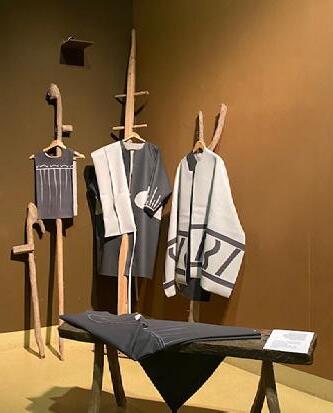
• Igartubeitia Museoa and Kotoi – European Heritage Days In 2023, we collaborated on the European Heritage Days, which focused on sustainability. We also participated in the “FROM WHERE AND TO WHERE” (DE DÓNDE Y HACIA DÓNDE) exhibition that brought value to the heritage power of Igartubeitia and sustainability, creating a dialogue about our commitment to waste reduction. It had pieces made by the sustainable brand Kotoi, who reuse waste textiles from Irizar to make us reconsider our past, present and future of sustainability actions. Several sewing workshops for adults and children where items were made using surplus textiles from Irizar’s production were held in the framework of this project. People were informed about concepts like the circular economy and sustainability, etc. through those workshops.
• In 2024, we collaborated again with Kotoi and their designer Fanny Alonso making a donation of textile materials for sewing workshops done in the framework of the Donostia Kultura courses.


• Restorable - Maialen Porroi: Maialen Porroi is a designer who we collaborated with on her fine arts thesis project called “RESTORABLE” (REHABILITABLE). It was a project that worked on fashion pattern design through textiles from a sculptural point of view. Irizar donated surplus textiles from their process of manufacturing roof linings for the project.
• Sutargi: In addition to collaborating to create Izir merchandising items, in 2024 we collaborated on their training project for people at risk of exclusion by hiring them for jobs restoring outdoor wooden spaces. The goal of the collaboration was to acquire new skills and at the same time help Irizar with the maintenance of their facilities.
In addition to the projects in collaboration with other Irizar S. Coop. organisations discussed above, for Irizar e-mobility we can highlight:
• In 2020 they started their collaboration with the Emaus social foundation with the goal of giving a second life to waste generated during the vehicle manufacturing process. For 2023 we can highlight that a second life was given to window packaging, which was used as shelving in the solidarity shop Emaus opened in Hernani. In 2024, we continued collaborating with EMAUS by collecting used clothing to give it a second life in Emaús’s charity shops. An internal collection campaign was launched using the communication screens on June to celebrate international World Environment Day.
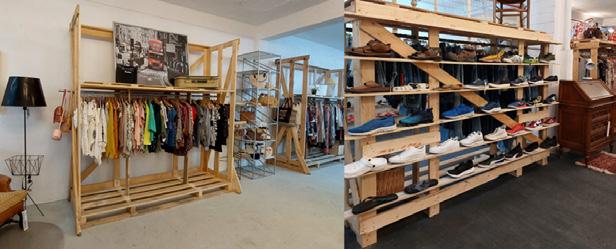
• In 2023, we collaborated with Sutargi, (an organisation that works on workplace insertion, social integration, training for employment, assistance and social services for people with mental disorders, or a physical or sensorial disability, and people at risk of social exclusion), by donating surplus production material for their carpentry workshop. The collaboration with Sutargi continued in 2024. Mobile phone stands for the IZIR merchandising line were made using wood waste from Irizar e-mobility’s activities.
Innovating in Circular Economy implementation methodology
We also made progress in innovative projects in collaboration to facilitate Circular Economy methodology and techniques in organisations.
• INMOIN Circular: This is a project financed by the Department of Economic Promotion, Tourism and Rural Areas of the regional government of Gipuzkoa together with the collaboration of Mondragón Unibersitatea and the clusters of: Mobility and logistics, Aclima-Medio Ambiente and GAIA-Knowledge and technology industries The main goal of the project was to research how to develop a model of indicators that makes it possible to integrate the circular economy (CE) into an organisation and areas or departments of an organisation (management, sales, financial, marketing, product/ service development and R&D, production, purchasing and supply, SAT, IT and general services), at the same time that it deals with the relationship with the sustainable development goals (SDGs). In 2022, 123 indicators were identified which have been related with CE strategies and solutions, life cycle and departments to be able to identify and cover the needs organisations may have. In addition, a new model of indicators was created in 2023 to be able to meet all the needs of organisations with an emphasis on all the functional areas being able to work aspects of the CE. Irizar analysed and incorporated several of those indicators for monitoring their environmental targets.
• Hazitek Sustainability Indicators Sustainability Indicators We collaborated with other companies on the HAZITEK 2021 “Life Cycle Sustainability Assessment service” project for developing a service
that can perform integral sustainability evaluations of products and services of companies throughout their entire life cycle from an environmental, economic and social point of view. In parallel, creating a certification service, where that service could be certified and accredited by third parties, was planned for 2023. Work is still being done on developing that service.
The enormous importance we give to managing sustainable suppliers at Irizar has already been shown in detail in chapter 5 about external collaborators, the supply chain and alliances - Sustainable Supply Chain:
• Sustainability requirements for our suppliers, including environmental requirements.
• Supply of cells for batteries.
• Environmental behaviour questionnaire
The purchasing team is promoting the use of raw materials from sustainable origins, with little environmental impact.
In addition, the environment area participates in environmental audits of:
• In 2020 the visit to the Urkiondo Ekolor facilities non-hazardous waste manager was notable to see their new facilities and processes and jointly analyse alternatives aimed at minimising discharging in landfills.
• No visits were made to managers in 2021 due to the Covid-19 restrictions. We started doing visits again in 2022.
• In 2022, questionnaires about environmental behaviour were sent to Ecoiruña and Bildu S.L. hazardous waste managers. The results will be taken into account when planning new improvement actions.
• In 2023, the questionnaire was sent to service companies with an environmental impact (as discussed in chapter 5 about external collaborators, supply chain and alliances), and to companies in the Irizar Group.
• In 2024, new sustainability clauses were included in the goods and services contract that make it possible to influence suppliers to extend our commitments in the supply chain.
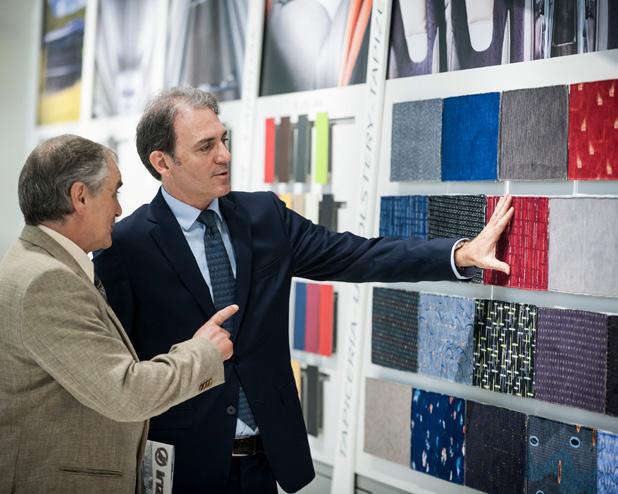
The fight against climate change is the greatest challenge of the 21st century for the health of the Earth; glaciers are melting and forests are being depleted and the biodiversity of our planet is being destroyed. But the challenge is even greater for people's physical and mental health, given that one quarter of illnesses in the world are caused by risks related with the environment. And the effects of the changing climate directly threaten the lives and livelihoods of human beings, also causing hunger and malnutrition.
Climate change is a reality and all social, economic and public agents must join forces for its mitigation. We are in a new stage of climate transition in which the Irizar Group, from its Sustainability strategy, has also been working to contribute to the fight against Climate Change.
The limited nature of traditional energy sources, energy dependence on foreign countries and environmental impact are aspects that have made us consider plans aimed at achieving the energy efficiency of our organization. Plans that, in order to be effective and reliable, cannot address reduction alone: they must show a route towards the complete transformation by following the Sustainable Development Goals of the 2030 Agenda, especially SDG13.
Our fight against Climate Change, we also address it especially in:
• In the sections of chapter 3 about clients, passengers and citizens related with decarbonisation (3.3., 3.4., 3.5. and 3.6.), where we see the reductions in fuel consumption and GHG emissions from using our vehicles depending on the kind of drive system (scope 3 downstream).
• In sections “5.3. Sustainable supply chain” and “5.5. Irizar Group level logistics optimisation” in chapter 5 about external collaborators, the supply chain and alliances: sustainability requirements for suppliers and reducing CO2 emissions from transporting goods (scope 3 upstream).
In this chapter, we will tackle energy efficiency and air quality management together as it is related with:
• Our activity at our facilities (scope 1 and 2), and
• indirect emissions caused by transport, products we use and emissions associated with the use of our products (scope 3).
All the actions that we will see here also highlight that the Irizar Group wishes to actively and decisively contribute to a sustainable and lowcarbon future.

Energy efficiency of the activity
Energy efficiency is based on optimizing energy consumption, through the implementation of measures that minimize energy losses and on adjusting energy consumption. Along those lines, the new European guidelines have set new goals that are, on one hand, focused on achieving reductions in energy consumption by promoting energy efficiency and, on the other hand, on reducing greenhouse gas emissions.
In recent years at Irizar, we have carried out various actions focused on transforming conventional forms of energy consumption with a commitment to achieving energy efficiency:
• Replacing conventional lighting with low consumption lighting,
• monitoring of our consumption,
• conducting energy audits
• installing various automation systems and devices to avoid unnecessary consumption in our facilities.
• carrying out various energy studies and analyses that allow us to identify facilities, equipment and processes in which energy consumption can be optimized.
With the goal of grouping together all the actions aligned with energy efficiency, with an external energy manager in 2021 Irizar started
implementing an uncertified Energy Management System that lets them monitor consumption in detail, minimise inefficient use and implement improvement actions. All the information related with energy management and the actions carried out or planned are centralised with the system.
All the improvements in energy consumption have lead to a reduction in total gas and electricity consumption and, consequently, the CO2 emissions associated with them, which we expect to continue in coming years.
The evolution of gas and electricity consumption can be seen in section “6.3.1 Resource consumption efficiency”.
We are firmly committed to investing in the Best Available Technologies that allow us to make our commitment to contributing to the fight against Climate Change into a reality, thus participating actively in the energy transformation.
An important point to highlight is that, since June 2021, the origin of the electrical energy supplied to all Irizar S. Coop. and Irizar e-mobility centres is 100% renewable and/or high efficiency cogeneration. The impact of that measure on CO2 emissions can already be seen in the corporate carbon footprint for 2021.
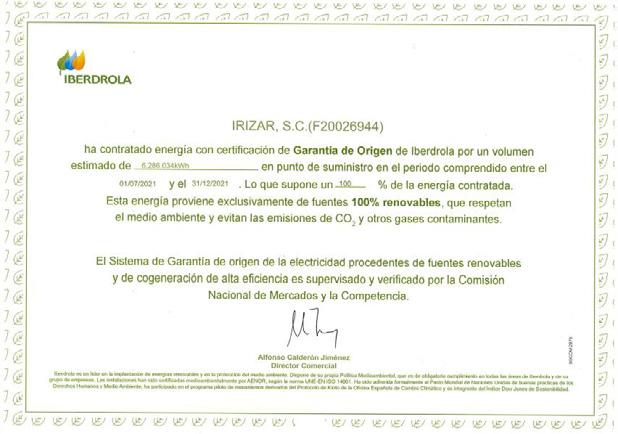
In 2024 Irizar took another step and is immersed in calculating their organisational carbon footprint for 2023 and 2024, in accordance with the requirements set forth in the ISO 14072:2024 standard with certification expected in 2025. The calculation will let Irizar know and compare, in an objective way, the affects of their activities in different categories of environmental impact and trace their cause, identify the environmental and facility aspects responsible and define actions that make it possible to advance in reducing environmental impacts, all seen as one more element in the company’s management system framework.
In 2020 and 2021 we did the calculation and verification of the carbon footprint for the business activities of Irizar S. Coop. according to the ISO14064-1:2015 standard for our main production plant (Lezeta).
Later we recorded our Carbon Footprint at MITECO (Ministry for the Ecological Transition and the Demographic Challenge). That let us know and put improvements plans into action to reduce the scope 1 and 2 GHG (greenhouse gas) emissions:
• Scope 1: Direct GHG emissions from sources that belong to or are controlled by the organisation itself
• Scope 2: Indirect GHG emissions associated with generating electricity acquired and consumed by our organisation
In our 2020 and 2021 sustainability reports we included the evolution of scope 1 and 2 emissions for our main plant (Lezeta).
In 2022, we did a study and certification of the energy qualification of all of Irizar’s non-production facilities and made an action plan to improve efficiency.
Like in 2022 and 2023, in 2024 we did the calculation and external verification of the Irizar carbon footprint according to the ISO14064-1:2019 standard, including all the categories in its scope:
• categories 1 and 2 (scopes 1 and 2) for all our facilities,
• all the categories (3, 4, 5 and 6) associated with scope 3 indirect emissions.
The change in the standard used gives us an even greater scope for measuring the impact of our GHG emissions, and it lets us evaluate the benefits that are the consequence of the actions implemented better.

Concedida a IRIZAR S COOP
ZUMARRAGA BIDEA 8 . - 20216 - ORMAIZTEGI - GIPUZKOA - ESPAÑA
Bureau Veritas Certification certifica que el cálculo de la Huella de Carbono de la Organización ha sido verificado y encontrado conforme con los requisitos del estándar:
(UNE-EN ISO 14064-1:2019)
La Huella de Carbono se aplica a:
- CATEGORÍA 1 - EMISIONES DIRECTAS DE GEI
-CATEGORÍA 2 - EMISIONES INDIRECTAS DE GEI CAUSADAS POR ENERGÍA IMPORTADA
-CATEGORÍA 3 - EMISIONES INDIRECTAS DE GEI CAUSADAS POR EL TRANSPORTE
-CATEGORÍA 4 - EMISIONES INDIRECTAS DE GEI CAUSADAS POR PRODUCTOS QUE UTILIZA LA ORGANIZACIÓN
-CATEGORÍA 5 - EMISIONES INDIRECTAS DE GEI ASOCIADAS CON EL USO DE LOS PRODUCTOS DE LA ORGANIZACIÓN
ACTIVIDADES REALIZADAS EN LOS CENTROS INCLUIDOS EN EL INFORME DE GASES DE EFECTO INVERNADERO (GEI) EN 2023 REV. 1 DE JUNIO 2024: DISEÑO, DESARROLLO, PRODUCCIÓN DE AUTOCARES INTEGRALES Y AUTOCARES SOBRE CHASIS DE DIFERENTES MARCAS. DISEÑO, DESARROLLO, PRODUCCIÓN DE AUTOCARES.
PERIODO VERIFICADO: 01 DE ENERO DE 2023 AL 31 DE DICIEMBRE DE 2023.

Número del Certificado: ES149585 1
Aprobación original: 19-06-2024
Certificado en vigor: 19-06-2024
Este certificado está sujeto a los términos y condiciones generales y particulares de los servicios de certificación
Bureau Veritas Iberia S.L. C/ Valportillo Primera 22-24, 28108 Alcobendas - Madrid, España 1/1
Later we recorded our Carbon Footprint at MITECO (Ministry for the Ecological Transition and the Demographic Challenge).
The results of the current calculation for our weighted relative carbon footprint are presented below. For the calculation we used
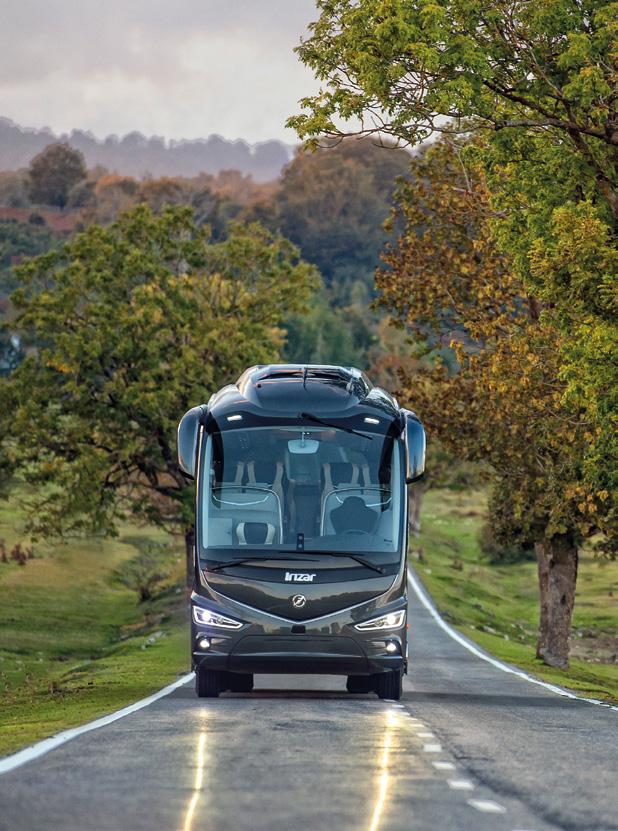
weighted data relative to vehicles billed for categories 1, 2, 3 and 4 and vehicles on the road (category 5), which made it possible to obtain the total relative carbon footprint for 2021, 2021 and 2023. At Irizar we understand that relativised data for coaches is more representative than absolute emissions (yearly totals). Based on that, we will evaluate the evolution of its impact and we will also review the goals fora KPI 13 – Reducing total GHG emissions, which was discussed in previous chapters.
With the implementation of this Carbon Footprint certification, and taking 2021 as the base year, in 2022 we redesigned an ambitious 2022-2025 Action Plan for the gradual reduction of energy consumption and the reduction of GHG gas emissions, associated with a reduction target for the first period, establishing a series of lines of action that will be fulfilled throughout this cycle. The 2022 2022 carbon footprint data, which was calculated and verified in 2023 2023, let us re-evaluate our focus and keep reducing the impact of our emissions.
The comparison of the relative data considered for GHG emissions in 2021, 2021 and 2023 is positive, because it shows a total reduction in GHG emissions in 2023 by 2.8% compared with 2021.
That is a consequence of:
• Category 5 whose importance in regards to the total carbon footprint dropped to 93.54% of the impact It is the category that includes a 3.64% decrease in emissions That decrease in GHG emissions in the use of our coaches is due to improvements in the efficiency of our coaches. Consequently, in 2023 we continued working along those lines with the development of new more sustainable models, like the lightened i4 which was being sold in 2022.
• The evolution of category 2 shows a 100% reduction of GHG emissions as a consequence of the electrical energy used in 2023 being 100% renewable, from different origins (wind, hydraulic and highefficiency co-generation).
• The data shows an increase in GHG emissions for categories 1, 3 and 4. That increase is directly related with the increase in production, days worked and mobility, (workers, materials logistics, visits, commercial trips, etc.), which is not shown in its totality in the GHG emissions data, but only partially.
You can see more information related with CATEGORY 3: Indirect GHG emissions caused by transport from:
• Upstream transport (materials to/from Irizar) is the section with the most weight and improvement of it is being worked on by the logistics area with haulers (road, ship and air). You can see more details in section “5.5. Irizar Group level logistics optimisation” in chapter 5 about external collaborators, the supply chain and alliances.
• Although it is far from the previous one, employee commutes is the second most important in this category. You can see more details in section “6.5.2. We promote the sustainable mobility of people”.
Regarding CATEGORY 4: Indirect GHG emissions caused by products Irizar uses: We are evaluating strengthening sustainability requirements for our suppliers. See details in section “5.3. Sustainable supply chain” in chapter 5 about external collaborators, the supply chain and alliances.
CATEGORY 5: Emissions Associated with using the organisation’s products. This is where 93.54% of our emissions come from, given that even though we manufacture vehicles with lower and lower emissions, we take into account the emissions made by all the vehicles we have manufactured and remain on the road. The primary strategy we use is to put more and more sustainable vehicles on the market, details about which can be seen in chapter 3. about our clients, passengers and citizens.
At the end of 2021 at Irizar we did the calculation and external verification of the carbon footprint for Irizar S.Coop. activities following the ISO14064 standard in our Irizar e-mobility facilities. Later we recorded our Carbon Footprint at MITECO (Ministry for the Ecological Transition and the Demographic Challenge). That let us know and put improvements plans into action to reduce the scope 1 and 2 GHG (greenhouse gas) emissions:
• Scope 1: Direct GHG emissions from sources that belong to or are controlled by the organisation itself
• Scope 2: Indirect GHG emissions associated with generating electricity acquired and consumed by our organisation Since the latest version of the ISO14064-1:2019 standard has been
adopted, the carbon footprint for 2021, which was calculated and verified externally, has finally been established as the base year for calculation. Expanding the scope of the verification to:
• categories 1 and 2 (scopes 1 and 2) for all their facilities
• all the categories (3, 4, 5 and 6) associated with scope 3 indirect emissions.
In 2024, we did the external calculation and verification of the carbon footprint for the business activities according to the ISO14064-1:2019 standard, and the calculation was entered into the MITECO carbon footprint registry.
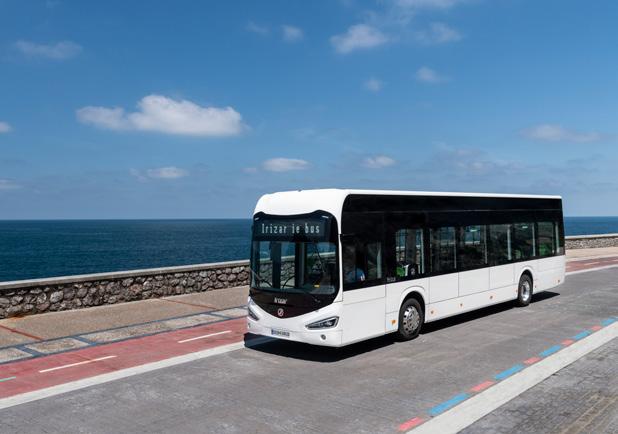

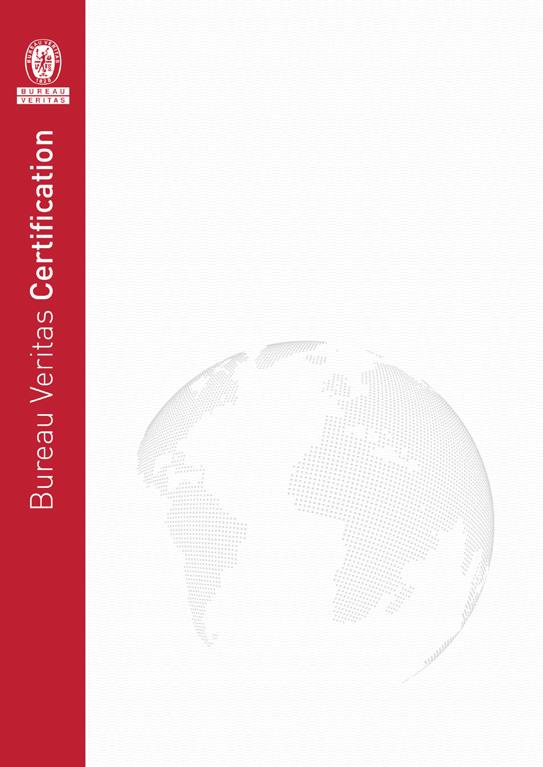
La Huella de Carbono se aplica a:
-CATEGORÍA 1 - EMISIONES DIRECTAS DE GEI
-CATEGORÍA 2 - EMISIONES INDIRECTAS DE GEI CAUSADAS POR ENERGÍA IMPORTADA
-CATEGORÍA 3 - EMISIONES INDIRECTAS DE GEI CAUSADAS POR EL TRANSPORTE
-CATEGORÍA 4 - EMISIONES INDIRECTAS DE GEI CAUSADAS POR PRODUCTOS QUE UTILIZA LA ORGANIZACIÓN
-CATEGORÍA 5 - EMISIONES INDIRECTAS DE GEI ASOCIADAS CON EL USO DE LOS PRODUCTOS DE LA ORGANIZACIÓN
ACTIVIDADES REALIZADAS EN LOS CENTROS INCLUIDOS EN EL INFORME DE CÁLCULO DE LA HUELLA DE CARBONO 2023 DE IRIZAR E-MOBILITY DE JUNIO 2024:
-DISEÑO, DESARROLLO, PRODUCCIÓN Y SERVICIO POSTVENTA DE AUTOBUSES ELÉCTRICOS.
-DISEÑO, DESARROLLO Y PRODUCCIÓN DE SOLUCIONES DE ACUMULACIÓN DE ENERGÍA.
PERIODO VERIFICADO: 1 DE ENERO DE 2023 A 31 DE DICIEMBRE DE 2023
Número del Certificado: ES149586 - 1
Aprobación original: 19-06-2024 Certificado en vigor: 19-06-2024



Registro de huella de carbono, compensación y proyectos de absorción de CO del Ministerio para la Transición Ecológica y el Reto Demográfico 2
Año de cálculo
2023
Tipo de sello Alcances
1+2 y 3
Alcance 3 incluye las emisiones provenientes del transporte (transporte aguas arriba y abajo, desplazamientos de empleados y visitas de clientes y proveedores), las causadas por productos y servicios que utiliza la organización (uso de servicios y compra de productos y materiales), así como, las asociadas al uso de los productos de la organización.
Límites
Se incluyen las actividades de diseño, desarrollo, producción y servicio de postventa de autobuses eléctricos, así como, diseño, desarrollo y producción de soluciones de acumulación de energía desarrolladas en sus dos sedes situadas en Aduna (Gipuzkoa).
22,26 % de la media de la intensidad de emisión en el trienio 2021-2023 respecto del trienio 2020-2022, para el alcance 1+2.
The results of the current calculation for our weighted relative carbon footprint are presented below. For the calculation we used weighted data relative to vehicles billed for categories 1, 2, 3 and 4 and vehicles on the road (category 5), which made it possible to obtain the total relative carbon footprint for 2021, 2021 and 2023. At Irizar e-mobility we understand that relativised data for coaches is more representative than absolute emissions (yearly totals). Based on that, we will evaluate the evolution of the impact and we will set targets.


Valvanera Ulargui Aparicio

Directora General Oficina Española de Cambio Climático Ministerio para la Transición Ecológica y el Reto Demográfico
Fecha de inscripción: 07/10/2024
Cód. huella de carbono: 2024-a2081
MITECO has awarded Irizar e-mobility the “Calculate and Reduce” seal for the 22.26% reduction of the average of pollution intensity for the three-year period from 2021-2023 in regards to the 2020-2022 period for scope 1+2.
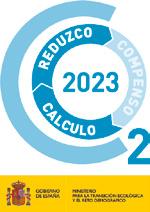
Likewise, comparing emissions from 2023 with the 2021 base year, a reduction in the weighted carbon footprint of 60.19% can be seen, which is an excellent result.
• The carbon footprint for CATEGORY 1 dropped 50.95% in weighted relative terms.
• The carbon footprint for CATEGORY 2 de creased by 89.92% in weighted relatives, prin cipally and in that order due to the increase of the proportion of 100% renewable energy consumption and lower steam consumption for climate control.
• In CATEGORY 3, the carbon footprint diminished by 64.09% in weighted relative terms due to streamlining in logistics.
• The carbon footprint for CATEGORY 4 dropped 66.62% in weighted relative terms. That is primarily due to improving the efficiency of raw materials consumption.
• The carbon footprint for CATEGORY 5 only increased by 8.04% in weighted relative terms, which is very little considering the 123.85% increase of buses on the market (there are more than double the buses in operation), a large part of which are operating in countries with an electric mix emissions factor with a greater intensity of GHG emissions. The intensity of the electric mix has increased by 2%. This category of emissions could improve:
o Given that the reduction in absolute terms of that fraction of the carbon footprint depends on the electric mix with which the buses are charged, which depends on clients, actions could be done to
raise awareness about using renewable energies.
o Insofar as the relative reduction of that fraction of emissions, the area for improvement lies in improving the efficiency of the buses. Additionally, it should be noted that electric buses have a slightly smaller carbon footprint than conventional internal combustion buses, so the more electric buses there are on the road the smaller the carbon footprint for transporting people will be.
In 2018, Irizar e-mobility was launched, the first electromobility factory in Europe It was designed and manufactured based on ecosustainability concepts with a type A energy efficiency certificate, the highest in Europe. It includes a warehouse and domestic water heating system that works by using the surplus steam from a company located in the adjoining plot.
In December 2019 it also became the first fully sustainable energy electromobility factory in Europe, thanks to the commissioning of the largest photovoltaic solar park in the Basque Country (EKIAN), where Irizar is one of the largest investors with 3 megawatts purchased. This is one more example of the importance that we give to the establishment of Alliances with other entities, as we have already addressed in other chapters of this Sustainability Report.
The EKIAN solar park is a public private initiative promoted by the Basque Energy Agency (EVE) and KREAN and has 25 investor companies. It consists of 67,000 latest generation solar panels, 355 watts each, generating total installed capacity of 24 MW, thus doubling the current solar power of the Basque Country. At full output it will

produce about 40,000 MWh per year, i.e. electricity equivalent to the electrical consumption of 15,000 families in one year and will prevent the emission of about 14,600 tons of CO2 if that energy were produced by other fossil-based energy sources.
In 2024, Irizar e-mobility has 100% self-supplied energy using solar energy. In 2023, Irizar e-mobility‘s participation in EKIAN produced 2,466,610 kWh, which is 16% of the energy that, in turn, Irizar e-mobility consumed at their production plant in 2024.
6.5.2.
In addition to our commitment to sustainable mobility through our products (as we already saw in chapters 2 and 3, customers, passengers and citizens), we also promote applying these principles in our own organization. We created a Sustainable Mobility Plan to promote best practices in transporting people that we are using at Irizar, like using collective transport and other more sustainable means (thus reducing scope 3 category 3 upstream transport GHG emissions).
In 2019, agreements with bicycle supply companies to make subsidized electric bicycles available to Irizar people at very competitive prices materialised. In 2019 we also started the IRIKLETA project where we adapted our parking facilities and loading areas for electric bicycles with solar power generation.
In 2021, we participated in several sessions of the Mobility and Logistics Cluster of Euskadi about “Workplace Commuting Plans” We reviewed and updated the work mobility plan for people at Irizar in 2022. Surveys were done related with the mode of transport used by workers that, in conjunction with other information provided by diverse areas at Irizar, made it possible to update the plan and plan future actions. Among the most notable actions of 2023 are the creation of a bicycle parking area at the Olaberria plant and the analysis of the technical and economic viability collective and shared transport alternatives.
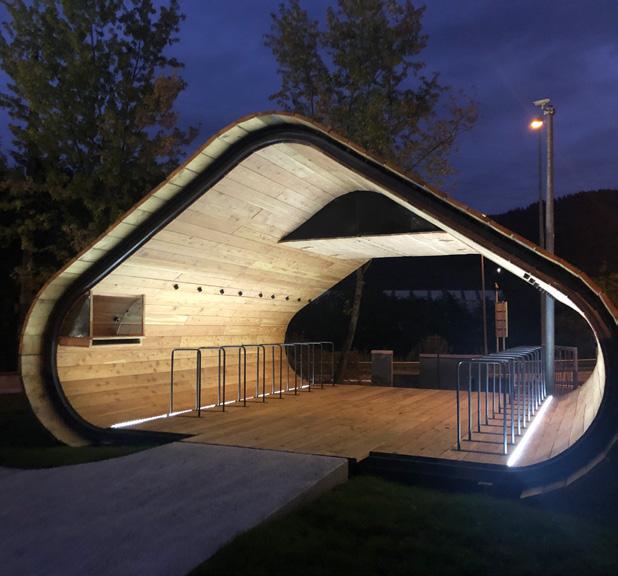

In 2024, the new parking area for electric vehicles was designed and is in development. It is expected to be operational in 2025.

6.6. Contribution to environmental sustainability
At Irizar we are convinced that we must continue to advance to achieve a world that is more sustainable and respectful of our environment as the main guarantee for future generations. It necessarily involves a change of mentality in our current forms of consumption. Hence, in addition to the continuous training of people in the environmental area, we give special importance to the development of training and awareness-raising campaigns, both internally and externally.
6.6.1.
We train and raise awareness for people, clients and suppliers about the Environment
• We periodically hold training and awareness raising sessions aimed at our workers about sustainable mobility that are promoted by EVE (Basque energy agency) and are centred around efficient driving.
• All new people who join our organization are provided with an Efficient Driving Manual, inviting them to play an active part in our commitment to sustainable mobility.
• In 2022 we held training days for the commercial area about new laws and to inform them about the main lines of action in the area of the environment, which will result in a better transfer of environmental information from Irizar to our clients and institutions.
Every year, we work on several awareness raising campaigns to keep underlining the importance of circular production and economy. Several of the campaigns that were brought to everybody at Irizar S. Coop. are listed below. As an integral part of our Circular Economy project, internal awareness campaigns are conducted for all Irizar people with the aim of optimizing sorted waste collection as much as possible so that landfill disposal is minimized.
• In 2022 we also did a personal clothing collection, where we encouraged everyone to bring clothes they no longer used so they could be given a second life.
• As we set forth in section 6.3.4. about the circular economy, Irizar also did a campaign to use surplus wood from production.
• There was an outing on the Mater boat to collect waste at sea. We are aware of the importance it has, because according to the United Nations between 19 and 23 million tons (approximately equivalent to the weight of 2000 Eiffel towers together) of plastic waste ends up in lakes, rivers and seas every year.
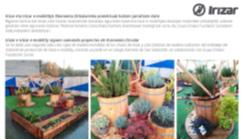
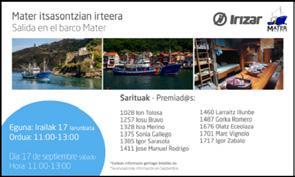


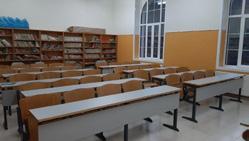

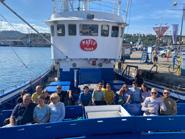














PROMOVIENDOLAECONOMMIACIRCULAR

Vamosasortearentre las personas interesadas carros ycajasdeherramientas que han quedado fuera de uso.
INCRIPCION FECHA LIMITE
Apuntarseen recepción 13Diciembre
El sorteo se hará a través de aplicación informática el día 16 de Diciembre.
El nombre de la persona premiada se publicará junto con el nº de carro/caja que ha tocado. No se puede escoger.
Los premios deben ser retirados antes de las vacaciones de navidad.




Irizarko arropa deskatalogatua eskuragarri dago



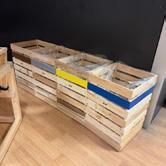
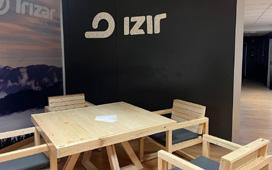
At Irizar e-mobility some notable things include internal and public messaging done in 2024 to promote environmental awareness, solidarity in the face of tragedies caused by climate events, the circular economy, and to publicise their environmental and sustainability recognitions:
• Product collection for people affected by the cold drop in Valencia: A campaign was launched to gather resources for people affected by the cold drop in Valencia.
• Clothes collection In addition, we continued with the clothing collection campaign internally, encouraging everyone to bring clothes they no longer use to give it a second life, and 170 kg of clothes have been recovered to give them a second life.
• Ecovadis: We are communicating internally and publicly the achievement of being awarded the Ecovadis Gold Medal, which puts Irizar e-mobility among the top 5% best companies evaluated in sustainable practices in the environment, labour practices and human rights, ethical behaviour and sustainable purchasing.
• “Muévete Verde” Award: The city of Madrid has awarded us the “Muévete Verde” prize in the category of decarbonising transport for our Irizar ie tram model bus, a 100% electric vehicles whose innovative design has contributed to the success of the first BusRapid line in Madrid, put in action by the city government and the Municipal Transport Company.
ORDUTEGIA 11:00 – 14:30
Gaueko txandan zabiltzatenok interesa baduzue jar zaitezte harremanetan Mari Jarit-ekin (608414494).
• World Environment Day A message was launched internally and publicly to raise awareness about the climate emergency, biodiversity loss, and pollution with the goal of raising awareness of people at Irizar e-mobility and their stakeholders about the possibility of a better world.
In chapter 3. about customers, passengers and citizens ”, we discussed:
• Eco-driving courses for our customers, and
• the efficient driving manuals that we include in all coaches.
The environment area delivers different training sessions to staff from various cleaning providers, those involved in the Image Project (see section 6.3.):
• Order and environment
• Management of hazardous waste and goods
• Training in Good Practices in different production areas
• Chemical product storage
By publicizing the work and good practices that we follow at Irizar to move towards a more environmentally sustainable world, we can encourage other organizations to join this new stage of ecological transition and a new development model. That is why we also attach importance to our participation in fairs and conferences focused on learning about the experiences of organizations doing work along those lines.
As an example of that, we can highlight:
• Collaboration with TECNUN-Universidad de Navarra, Sarea project. In 2020, we started participating to develop a set of strategies that strive to integrate the circular economy into business operations, taking into account the role of all stakeholders in accelerating this new model with an agreement with the regional government of Gipuzkoa. As the first action for this project, a workshop was organised in November with various public and private entities called “Transition Towards a Circular Economy”. In March 2021, Irizar collaborated on the interviews done with people who are pioneers in the circular economy with the goal of obtaining information that helps prioritise, mobilise and measure implementation actions under certain circular economy strategies that help accelerate the transition in the short term In collaboration with the Regional Government of Gipuzkoa, in October Tecnun published a report titled “Initiatives and actors in implementing the Circular Economy” which describes the conclusions.
• Etorkizuna Eraikiz Project - Collaboration with the University of the Basque Country UPV/EHU. It is a sustainability research project carried out by the UPV/EHU in conjunction with the regional government of Gipuzkoa. Etorkizuna Eraikiz is a model whose final goal is to carry out a public agenda though public policies derived from proposals from previous spaces and from the society of Gipuzkoa to create open and collaborative governance.
Irizar shared ideas and concepts in the focus group held in November 2020 alongside various representatives from Gipuzkoa and the mobility sector. In May 2021, they participated in another round of interviews to delve deeper into the circular economy and the mobility sector.
• In 2022, Irizar’s participation in the Basque Circular Summit 2022 held in Ficoba, Gipuzkoa led by the Basque government, with two speakers can be highlighted.

• In 2023, at the I Cooperative Companies Forum Euskadi - Navarre
To share experiences and main lines of action between cooperatives from both territories from an environmental and social point of view

• Logistics and Mobility Cluster of Euskadi (MLC ITS Euskadi)Invitation to the ChallengeMyCity project organised by the city of Vitoria in 2023 to analyse issues with urban mobility and find common ground for potential avenues for action among different sectors that affect urban mobility.
• Basque Government – PCTI 2030 (Ihobe) in 2023:
o Circular Economy - Very Important Collaborative Tractor Projects: A workshop-gathering of actors to facilitate new ideas for designing very important collaborative R&D tractor projects in the circular economy ITT.
o Eco-innovation and the Circular Economy in the Science and Technology plan for Euskadi, PCTI 2030: A workshop-gathering of actors to facilitate new ideas for designing very important collaborative tractor projects to “retain product value”.
• Participation in the exhibition of circular products made in Euskadi “ZIRKULARRAK” Circular Basque Products organised by Ihobe (Basque government). The goal of the exhibition was to support all the Basque companies that have started a process of transitioning to a more circular economic model by developing businesses whose result is putting products or services on the market with a lower environmental impact during their life cycle. All the Basque companies that have used circular economy criteria in their organisations and products or services participated in the exhibition. The products shown by the Irizar Group were: Environmental product declarations for the (100%% electric) ie bus NG by Irizar e-mobility, and the i4 integral coach by Irizar s. Coop. and the Izir, irizar zirkularra range of circular products by the Irizar Group
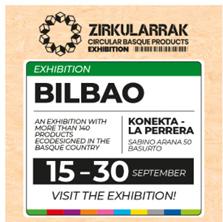
• Collaboration in 2024 with TECNUM and DEUSTO universities on two projects for building students’ skill for working on sustainability.
o TECNUM: Sustainable Engineering
o DEUSTO: Sustainable Cities

Contributing to the SDGs and goals of the UN 2030 Agenda:




8.1
8.5







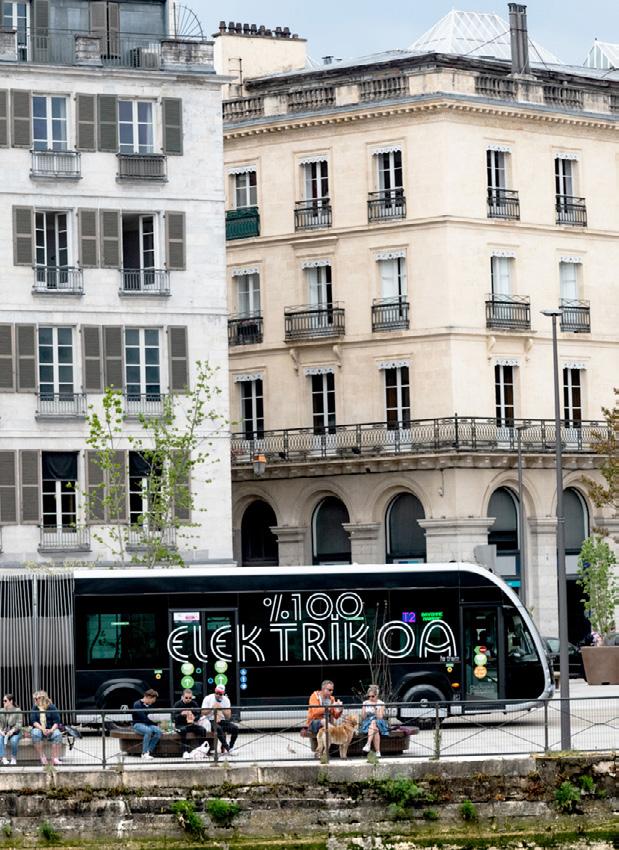
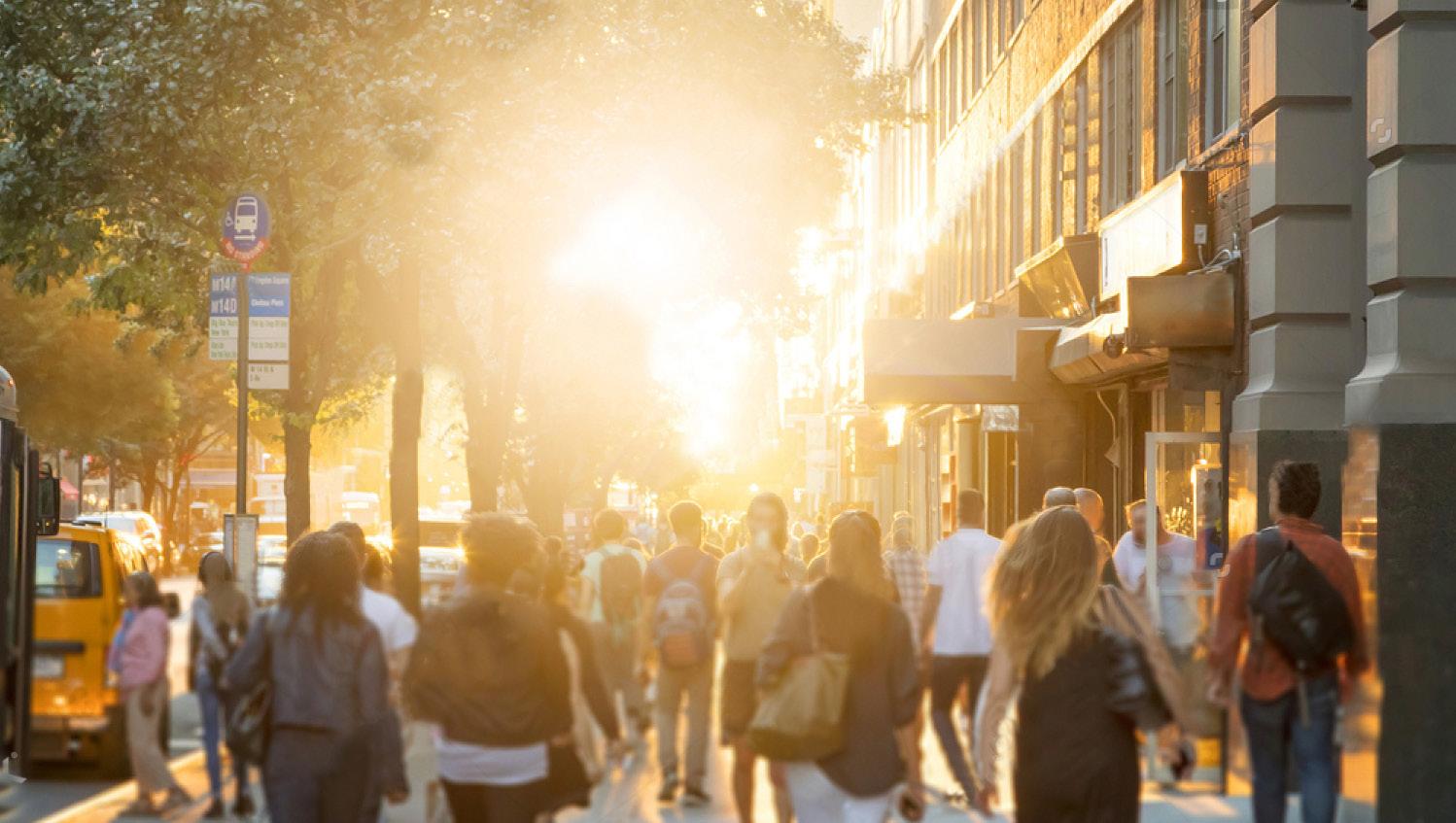
7.1.
Our commitment to society
• Social Commitment Integrated with the 2030 Agenda SDGs
7.2.
Annual tribute to retirees.
7.3
We collaborate on activities with our industry and socio-economic environment
• With local business organisations
• With industry associations
7.4
We collaborate in educational activities
7.5.
We collaborate in cultural activities
7.6.
We collaborate in sports activities
7.7.
We collaborate in development cooperation activities
• With local organizations
• With NGOs on international projects
The Irizar Group’s mission is the unequivocal commitment to the growth and creation of wealth and employment, with personnel in the local environments and countries where we are present. In addition, as you can see in more detail in the chapters about Sustainable Competitiveness and people, the best reflection of our strategic commitment in sustainability with society are the charts of the evolution and commitment to employment in the local areas where we operate.
“Our relationship with society will be respectful, open and participatory, helping to create wealth and employment, culture, education, and sport in our immediate environment, as well carrying out social work in our immediate surroundings and in the world's most disadvantaged areas.”
In addition to the commitment to society in general that we are going to reflect in this section, we have also addressed it in other chapters, such as:
• In chapter 2, about Irizar and Sustainable Competitiveness we see our commitments to sustainability and association with bodies that are global leaders. We also share our experience in different forums to contribute to increasing awareness about sustainability with our stakeholders and society in general.
• In chapter 4 about people we also saw that we work with local training centres and universities.
• In chapter 5 about external collaborators, the supply chain and alliances, also with the responsible management of our supply chain we can highlight our deep commitment to our immediate surroundings (Gipuzkoa) with the high number of purchases in the province and employing underprivileged people with the collaboration of organisations with social purposes.
• In chapter 6 about the environment we also saw our cooperation with other local organisations (fundamentally not-for-profits like the EMAUS foundation) in order to, in line with our circular economy strategy be able to give a second life to surplus production materials and share our experience to raise awareness in our area.
In the framework of our commitment to society every year we dedicate a significant sum of money to not-for-profit activities related with our industry, education, culture, sport and, primarily, social cooperation both domestically and internationally. Not only to boost global development, but also as an avenue for internal growth. In that way, social cooperation becomes a key vehicle for promoting equality and strengthening the social fabric. The criteria for selecting and specifying the duration of support according to the scope of each collaboration project are determined through the Irizar Member Council, and all employees are informed through the communication channels established for that purpose.
We didn't stop doing it despite the 2020 and 2021 pandemic. In 2023 our contribution for education and promoting cooperatives and other purposes of public interest was, like in previous years, more than 1 million Euros The amount was primarily given to not-for-profit activities.
The most significant lines of activity in recent years are listed below, particularly new initiative introduced in 2024.

As we put forward in chapter 2 about Irizar and Sustainable Competitiveness, in 2024 we took a big step in our commitment to the 2030 Agenda SDGs by measuring our impact on priority KPIs. On the Member Council we consequently decided to prioritise social contribution to cooperation development activities including: NGOs and associations that do work to benefit education, health and gender equality and to eradicate poverty, hunger and inequalities That commitment reflects our conviction that sustainable development does not just depend on improving economic conditions, but also on creating a more fair and equitable society.

PRINCIPLES OF THE GLOBAL COMPACT

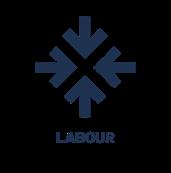
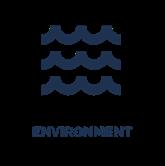









23. Contribution to improvement in the sustainability of other external people and organisations (public and private).
Outside of Irizar S. Coop.
Sharing our knowledge of and experience with sustainability in forums and training and awareness raising activities:
• High priority stakeholders Clients, suppliers, distributors, etc.
• Group coach companies
• Other Group companies
• Students, external organisations and other people in the social environment
24. Social Commitment to Cooperation Development Activities
Includes: NGOs and associations that do work to benefit education, health and gender equality and to eradicate poverty, hunger and inequalities
BASE YEAR: year data in blue if shown in OBJECTIVE later
SUSTAINABILITY REPORT 2024
Development cooperation activities
€ total designated for not-for-profit activities
Every year the retirees come to their annual event, the tribute they have been given for many years at Irizar. At the event they can enjoy a whole day in the company of their friends and former workmates, where there is never a loss for memories and anecdotes from the old days. At the same time, the retirees still have bonds with the people and knowledge of the activities that were part of their life for many years.
Beyond being a tradition, that event is also a way of strengthening the social support network between generations, promoting respect and gratitude for those who have contributed to the growth of the company.
In late September 2024, they visited the Reale Arena sports facilities where they were gifted with a drawing for some jerseys of football player’s from Real Sociedad and later they went out to eat at the Petritegi cider house. And of course, travelling together in Irizar coaches, like every year.

7.3
We collaborate on activities with our industry and socioeconomic environment
o Employment and social insertion
o Business creation
o Business continuity
o Sharing knowledge and business experience.
2024 Activity Summary
2016, We have a bus fitted out for exhibition that we altruistically loan to various social initiatives.
In addition to all the organisations and clusters we have alliances or collaboration agreements with (as seen in the chapter about external collaborators and local alliances), we can highlight these two that we collaborate with to contribute to the positive socio-economic impact at a very local level:
• In 2017 we kept actively collaborating with the Goierri Valley, initiative, which is an industrial partner in the metal-mechanic sector that is leading the industrial transformation of the Goierri valley, where Irizar S. Coop. is located).
• For many years we have also collaborated with the Gipuzkoa Chamber of Commerce financing their activities related with SDG
8 - “Promoting sustained, inclusive and sustainable economic growth, full productive employment and decent work for everyone”:
We also annually sponsor several industry associations, like Asetra, Aetram, Atuc, Fecalbus, Fenebus and Consorcio de Madrid, with the goal of promoting and positioning bus and coach transport as a mode of transportation that is necessary for the future. All of them have been working and are continuing to work to find solutions and economic support for the survival of public transport operators. A sector that in the first phase of the pandemic suffered greatly and was stigmatized given the campaign to use private vehicles to prevent the spread of the virus. What has become very clear and evident in this crisis is that
public transport plays a priority and fundamental role in the energy transition and that the bus is a key element in the new mobility and the achievement of Sustainability objectives, especially in reducing the carbon footprint.
More information about cooperation with (domestic and international) collective passenger transport associations and organisations in 2024 can be seen in section “3.2. The customer, at the heart of our strategy”, in chapter 3 (about clients, passengers and citizens ).

Irizar collaborates in various ways within the field of education:
We actively engage in activities with the objective of sharing our experience with society and generating concerns that may be reflected in the progress of other organisations, educational centres, and people. We do this through the organisation of open days at our facilities and through participation in external conferences (in universities and business schools) and discussion forums among various national and international organisations. In all these forums, it is becoming increasingly relevant and there are more and more demands for us to share how we approach Sustainable Competitiveness at Irizar.
The events and actions where we share our experience in sustainability with our stakeholders and society at large are discussed in various chapters of this report (especially chapter 2 about our Sustainable Competitiveness and chapter 6 about the environment).
We continue our yearly sponsorship of the “voyage of life” cycle of the summer courses at the University of the Basque Country. The event is a continued learning and open training cycle, as well as a reflection on the world in which we live with the aim of contributing as much as possible towards shaping a better and desirable future.
The courses we supported in 2024 were:
• Emotional relationships in the digital era Emotional relationships are part of being human. For a while now with digital and technological advances, communication has changed. In the course they discussed whether the changes are profound, essential, or merely aesthetic. We were talking about individuals and character. And ways of starting intimate relationships, or friendships, or cooperation.
• José Miguel de Barandiarán’s contribution to archaeology, ethnography and Basque mythology (ii) José Miguel de Barandiarán’s contribution was very important in several lines of research: Archaeology, ethnography/cultural anthropology, mythology, etc. We have an overview of his life, but there are lesser known issues in his life, such as his youth and training in research, or the war. He spent many years in exile. When he returned he also trained young researchers in the field of prehistoric archaeology. Their testimonies increase his image as a human and researcher. Likewise, his ethnographic research in historical times, his contribution to knowledge and his, perhaps understated, knowledge of the Basque language of the period is more important than you may think. Lastly, the collections of data gathered by him and other researchers in the Basque Country about mythology has made its expansion known so it could be compared with other European mythologies.
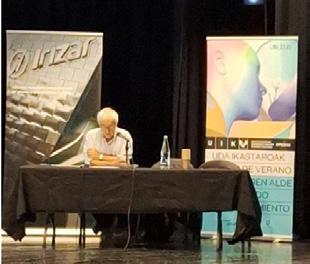
Along with town councils and other companies, we are a member of the Goierri Foundation, whose social purpose is the technical, economic and social training and development of the Goierri comarque, which is home to the town of Ormaiztegi.
We participate in the Goieki Business Incubator whose objective is to support and promote the emergence of new business initiatives in the Goierri comarque.
In 2024, for the eight consecutive year, Irizar was a mentor company for the STARTinnova teaching programme promoted by El Diario Vasco newspaper geared towards developing the entrepreneurial spirit among young people. Aimed at youth between 16 - 17 years old who are in secondary school and/or doing vocational training, the programme encourages entrepreneurial attitudes and promotes greater contact between educational centres and the business community. We sponsored students from the Urretxu-Zumarraga ikastola school, who visited our facilities and presented their projects to us.
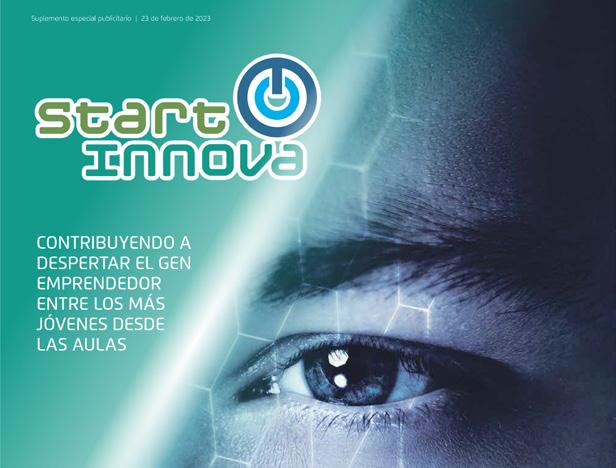
We support cultural and traditional activities in our immediate environment.
Irizar is actively involved in promoting euskera (the Basque language), to increase its use and standardisation, both internally through the Basque Language Plan, as well as socially by sponsoring different organisations and activities, including: Kontseilua, Kilometroak, Nafarroa Oinez, Ibilaldia, Araba euskaraz, etc.
We are annual sponsors of the Irizar Prize for Basque Film at the San Sebastian International Film Festival, which in 2024 was won by the film “Chaplin, espíritu gitano” (Chaplin, gypsy spirit) by Carmen Chaplin.

With the aim of contributing to the dissemination of music, Irizar collaborates with different entities, including the annual sponsorship of the Orfeón Donostiarra with which it has had a relationship for more than a decade. We also collaborate with the Euskadiko Orkestra (Symphony Orchestra of Euskadi). Basque National Orchestra) in 2024, for the fourth consecutive year, which contributed to later concerts.
There are also collaborations with traditional Basque music and dance through Euskadiko Dantza Txapelketa and Bertso jaialdiak.
For the ninth consecutive year in 2024 we collaborated with the Vasca Albaola Maritime Foundation to build historic ships in an innovative space that brings value to and revives artisanal maritime technology. In the video below you can watch how they are replicating the San Juan whaler: https://www.youtube.com/watch?v=nBMx-q0mAnM
We are continuing our collaboration with the Museo Zumalakarregi of Ormaiztegi, a service of the regional government of Gipuzkoa, whose purpose is to bring the general and specialised public closer to the 19th century in the Basque Country, a period of great social, cultural, economic, and political changes, and the beginning of the contemporary world.
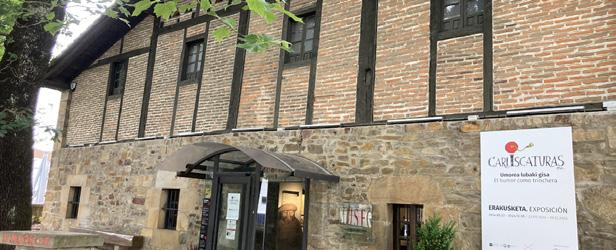
We maintain several types of annual sponsorships including:
• Fundación Kirolgi A not-for-profit entity for promoting and developing sports in Gipuzkoa, with a priority on high-performance sports.
• Top level sport in Gipuzkoa: football (Real Sociedad), basketball (Gipuzkoa Basket Saskibaloia), rubgy (Ordizia Rugby taldea), handball (Bidasoa) and women’s handball (Bera-Bera).
• Teams, trials and regional tournaments in: track and field, rural Basque sports, mountain sports, cycling and sports activities and championships held in the Ormaiztegi area.
• Lasarte hippodrome: annual sponsorship of the Irizar Award for the winner of the horse race of the inaugural session.
They are becoming more and more involved in adapted sport and women's sport, where we can highlight collaborations with:
• HEGALAK Zabalik Fundazioa: “Programme for improving the quality of life for dependent people who are disabled and/or have an illness through re-adapting physical activity in Gipuzkoa” and the “Programme for swimming without barriers on the Concha beach in San Sebastian”.
• Adapted Sports Federation of Gipuzkoa Through the “Comprehensive project of adaptive and inclusive physical activity aimed at children and young people with physical disabilities in Urola Garaia and Goierri”. “Zuzenak” wheelchair basketball.
• Bera Bera women's handball club.
• The Goierri Gorri Futbol Klub women’s football initiative that brings together and strengthens the teams above in the Goierri region.
• Laboral Kutxa TEAM women’s cycling team.
• IDK-Euskotren - Ibaeta women's basketball club.
• Itzulia - Basque Country Women (women’s bicycle race) .
• TEAM ZATIKA BIKE WOMEN (women’s cycling team)
• KEMEN sports club for differently abled people.
• MINDARA ELKARTEA, Gipuzkoa association for providing care for people with functional diversities.
• Konporta K.E, a club with more than 25 years of history that works for and with people with disabilities doing swimming and water sports in the pool or in open water.
• Ados pilota, the fist professional women’s pelota club.
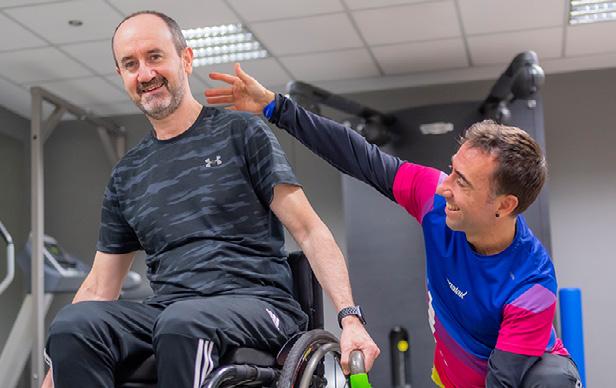


We place a high priority and make the largest economic contribution to sponsoring various not-for-profit social and assistance entities. That is why, as we indicated in section 7.1, we have a KPI with an ambitious goal for cooperation for development that we monitor closely.
We collaborate with around 30 associations that work locally and throughout the province including:
• Large associations that we collaborate with on specific projects, like the Food Bank.
• Irizar showed great agility and commitment in handling solidarity during the cold drop in Valencia. The company responded quickly to the request from the solidarity centre in Valencia by sending pallets of essential products to the Valencia Food Bank to help people affected. That action shows the spirit of collaboration and mutual aid that characterises Irizar in times of crisis. Once again, it shows the company’s commitment to the community in emergency situations.
• Provincial associations, fundamentally patient and family associations.
• From the AECC - cancer prevention association to rare disease associations, like the Inés de Pablo Llorens association The latter has the goal of providing economic assistance for research about rare and infrequent tumours.
o In the framework of the X symposium of GETTHI and, for the 5th consecutive year, GETTHI and the Inés de Pablo Llorens foundation have awarded the V Inés de Pablo Llorens - GETTHI
2024 grant for €18,000 to Ismael Ghanem Cañete at the Hospital Universitario La Paz Biomedical Research Foundation for the project: Integral analysis of the methylation profile in juvenile colorectal cancer. A translational approach.
• For the first time in 2024 we collaborated with Algaraclown “Ospitaleko Pailazoak”, who spend time with children and adults in hospitals and assisted living facilities to improve their mood.


• Associations that provide assistance to the elderly.
• In 2020 we began our collaboration with Bizipoza, a non-profit association that brings together 35 collectives from the Basque Country. The Bizipoza movement promotes values like solidarity, teamwork and life in society using Basque as the working language. Also since 2024, Irizar has collaborated on the “Kantu eta Bideoklipak” project for helping various associations.
Alongside the projects already mentioned in education and adapted sports, we can highlight that our annual support for disability support projects carried out with GUREAK Fundazioa continued in 2024.
We cooperate internationally through projects with 10 NGOs in order to contribute to the promotion of education, health, and gender equality, as well as the eradication of poverty, hunger, and inequality.
In addition to continuing with projects already mentioned in previous Sustainability Reports, we would like to present the most significant projects in which we continued to collaborate in 2024:
• Doctors without Borders Medical-humanitarian actions in Sudan due to the civil war.
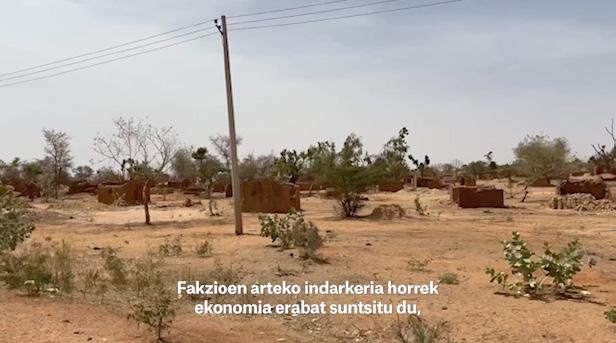
• UNICEF: Safe Schools project in Mali

Exceptionally in 2024 we helped:
• UNICEF with a contribution to handle the emergency situation in Gaza.
• ACNUR with a contribution to handle the emergency situation in Ukraine and Lebanon.
In 2024, we collaborated with many more international projects, among which we can also highlight:
• Herriak Elkarlanean.
• Dekosocial fundazioa: Promoting a sustainable and inclusive society through public-private alliances to improve the quality of life of the most vulnerable people with fewer opportunities.
• Vicente Ferrer Foundation: Childhood in Nepal: Monitoring, support and therapy for boys and girls with cerebral palsy in remote areas of Nepal.
• Humanitarian sea rescue – AITA MARI.
• Derandein Fundazioa: Sustainable alternatives in the struggle against menstrual poverty in the Karatu district, Arusha region, Tanzania.
• ICLI: Extending human rights through supplying Phase 3.4 safe water, and the second programme to promote literacy for adult women in Groupement Mpene.
• ALBOAN Foundation: Migration and forced displacement in Central America.
